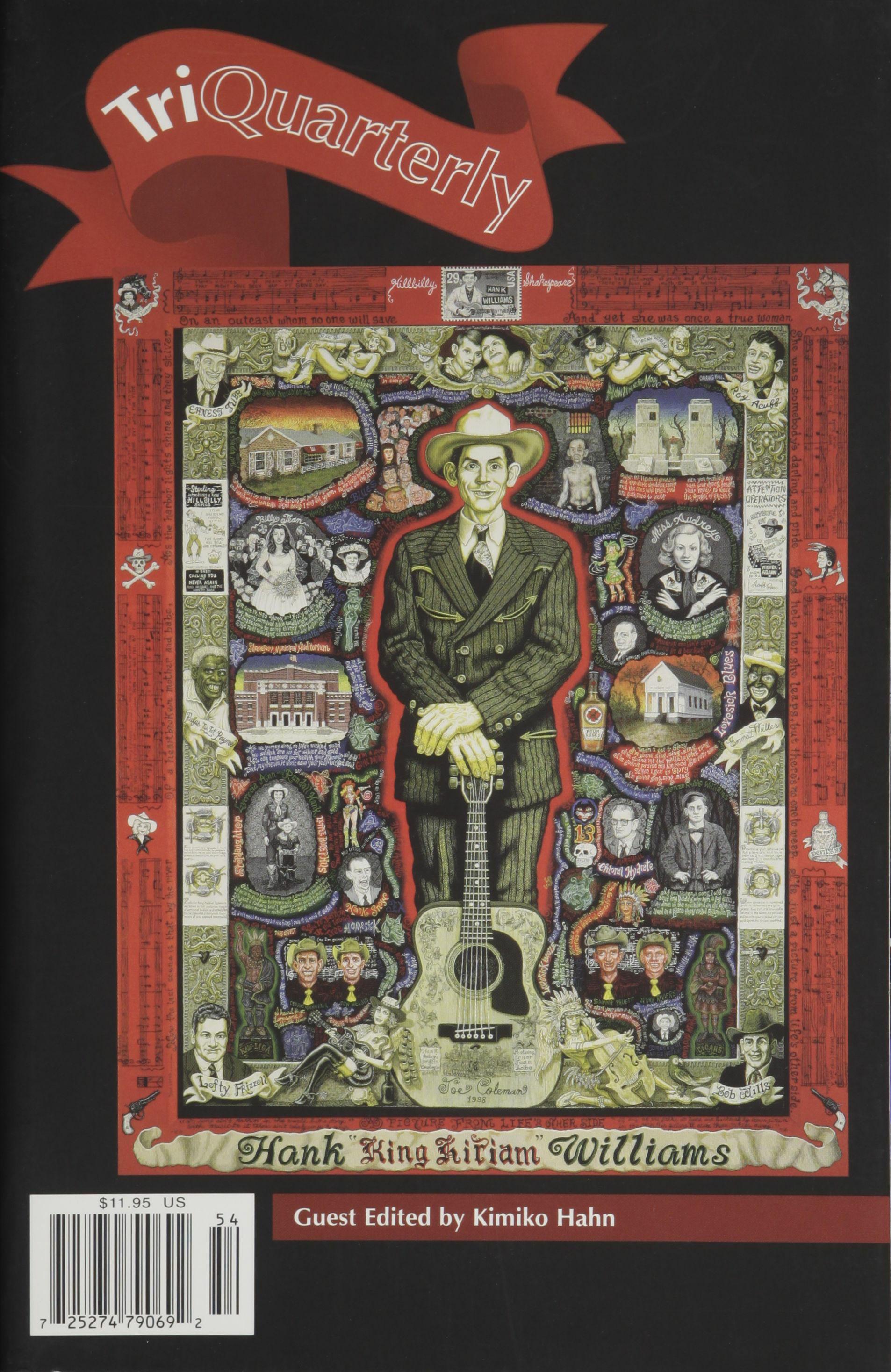


is an international journal
published
TriQuarterly TriQuarterly
of writing, art and cultural inquiry
at Northwestern University

TriQuarterly
Editor
Susan Firestone Hahn
Associate Editor
Ian Morris
Operations Coordinator
Kirstie Felland
Production Manager
Siobhan Drummond
Production Editor
Greta Polo
Cover Design
Gini Kondziolka
Editorial Assistant
Lindsay Meck
Assistant Editor
W. Huntting Howell
TriQuarterly Fellow
Sarah Mesle

Contributing Editors
John Barth
Lydia R. Diamond
Rita Dove
Stuart Dybek
Richard Ford
Sandra M. Gilbert
Robert Hass
Edward Hirsch
Li-Young Lee
Lorrie Moore
Alicia Ostriker
Carl Phillips
Robert Pinsky
Susan Stewart
Mark Strand
Alan Williamson
122
The editors wish to congratulate the following three authors who have had their work chosen for reprint in Pushcart Prize XXX: Best of the Small Presses:
Robin Behn (issue 119) for her poem "Pursuit of the Yellow House"
Lucia Perillo (issue 119) for her poem "Sad Coincidence in the Confessional Mode"
Pamela Stewart (issue 119) for her poem "A Haze in the Hills."

Richard Burgin's story "Identity Club" (issue 118) appears in the Best American Mystery Stories 2005 (Houghton Mifflin), edited by Otto Penzler.
Editor of This Issue: Kimiko Hahn

Kimiko
Walleechu; The Muse of Invention; A History; Crossing
Albert Goldbarth
23 Findings (2); Findings (3); Paintball; El Paso
Ray Gonzalez
30 Poem: The First Remove; Poem: The Second Remove; Poem: The Third Remove; Poem: The Fourth Remove; Poem: The Fifth Remove
Laurie Sheck 35 Processional; Bosporus; 2 Revelation 1:2
Michael Waters 40 Orchid; Clam; Snake Key
Carol Frost
66 14 rue Serpentine
Nicholas Christopher
70 lHay algo mas triete en el mundo, que un tren immovil en la lluvia?; ZTrabajan la sal y el azucar / Construyendo una torre blanca?; zEra verdad aquel aroma / de la doncella sorprendida?
Patricia Spears Jones
CONTENTS
introduction 8 Notes Re: Trawl/Troll
Hahn poems 13 Pink
15
Kimiko Hahn
fiction nonfiction review

83 A Young Girl in a Cheongsam; Pragmatic; Capricious
Wing Tek lum
90 The Ghost, The Mountain
Cornelius Eady
94 The Hunt; Fatherhood
Ai
I06 Private Spaces
Jill Bialosky
I I I Notebook / To Joan Mitchell
Mark Doty
132 Toxic Flora
Kimiko Hahn
44 The Captive Chronologist
Sarah Micklem
74 from Hour of the Seeds
Jeffrey Renard Allen
S3 Encountering Emily Dickinson; from Fragile Places: A Poet's Notebook
Meena Alexander
100 Preface to The General's Son
Harold Schechter
I 17 Everybody Knows, Nobody Cares, Or: Neal Cassady's Penis
John Weir
128 Forfeiting the the Self: Research and Contemporary Poetry
Ryan Black
126 R. Zamora Linmark's Prime Time Apparitions
Mihaela Moscaliuc
134 Contributors' Statements and Biographies
art

Cover and interior panels: Picture from Life's Other Side [Study of Hank Williams, the songwriter who lived only thirty years, but whose influence on singer and artists of all types remains strong today, fifty years after his death.]
Joe Coleman
Notes Re: Trawl/Troll
 Kimiko Hahn
Kimiko Hahn
10/15
Is it trolling or trawling? We argued-though he wouldn't call it thatand I am still not sure which is the huge open net that drags everything from target to unwanted prizes (dolphins, say) to old high tops. I prefer the aw sound-troll reminding me of those plastic figures, 1963, Roselle Avenue School playground. Barbara and I dug homes for them in the gnarly roots of hickory trees. Anyway.
Trawl. It reminds me of what I want to do.
10/16
Trawl: noun, I. a strong fishing net for dragging along the sea bottom; 2. trawling line, a buoyed line used in sea fishing having numerous short lines with baited hooks attached at intervals 5. To troll
Troll: verb, I. Sing or utter in full, rolling voice; 9. To fish with a moving line, working the line up and down with a rod, as in fishing for pike, or trailing the line behind a slow-moving boat; 14. a lure
10/17
Boland's section "Quarantine" from her love sequence has triggered a series of my own: I've unearthed all sorts of old clippings-mostly from the Science Times-and already have a couple dozen love poems.
Trawl and troll-facets of process.
10/22
Always enamored of exotic diction---especially from outlandish sources. I miss those afternoons as an undergrad-on a break (distraction?) from a research paper, I'd cruise down the stacks, and pull out the rattiest
8
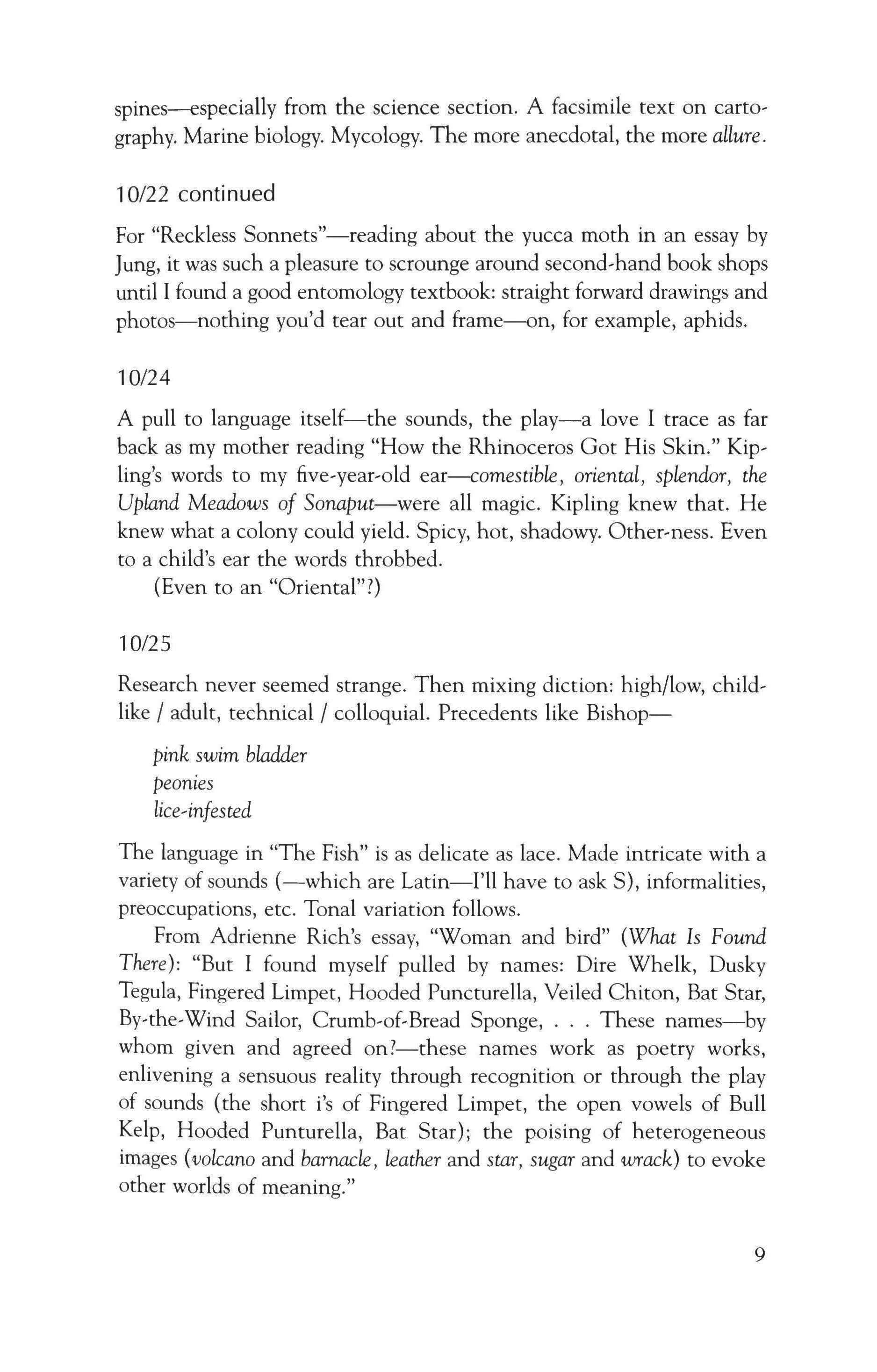
spines--especially from the science section. A facsimile text on cartography. Marine biology. Mycology. The more anecdotal, the more allure.
10122 continued
For "Reckless Sonnets"-reading about the yucca moth in an essay by [ung, it was such a pleasure to scrounge around second-hand book shops until I found a good entomology textbook: straight forward drawings and photos-nothing you'd tear out and frame---on, for example, aphids.
10/24
A pull to language itself-the sounds, the play-a love I trace as far back as my mother reading "How the Rhinoceros Got His Skin." Kipling's words to my five-year-old ear-comestible, oriental, splendor, the Upland Meadows of Sonaput-were all magic. Kipling knew that. He knew what a colony could yield. Spicy, hot, shadowy. Other-ness. Even to a child's ear the words throbbed.
(Even to an "Oriental"?)
10/25
Research never seemed strange. Then mixing diction: high/low, childlike / adult, technical/colloquial. Precedents like Bishoppink swim bladder peonies lice-infested
The language in "The Fish" is as delicate as lace. Made intricate with a variety of sounds (-which are Latin-I'll have to ask S), informalities, preoccupations, etc. Tonal variation follows.
From Adrienne Rich's essay, "Woman and bird" (What Is Found There): "But I found myself pulled by names: Dire Whelk, Dusky Tegula, Fingered Limpet, Hooded Puncturella, Veiled Chiton, Bat Star, By-the-Wind Sailor, Crumb-of-Bread Sponge, These names-by whom given and agreed on?-these names work as poetry works, enlivening a sensuous reality through recognition or through the play of sounds (the short i's of Fingered Limpet, the open vowels of Bull Kelp, Hooded Punturella, Bat Star); the poising of heterogeneous images (volcano and barnacle, leather and star, sugar and wrack) to evoke other worlds of meaning."
9
10/26
Vehicle. Tenor.
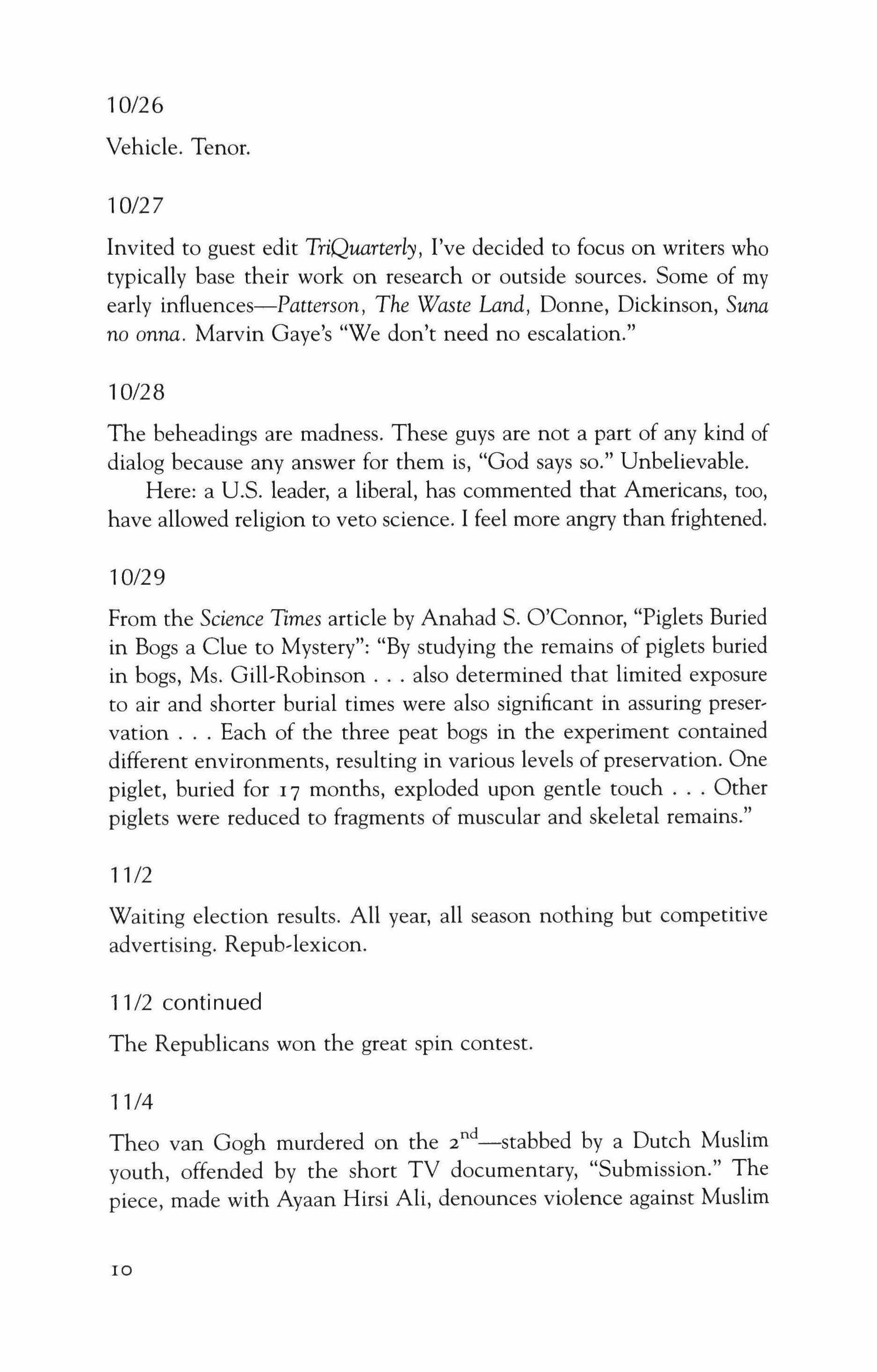
10/27
Invited to guest edit TriQuarterly, I've decided to focus on writers who typically base their work on research or outside sources. Some of my early influences-Patterson, The Waste Land, Donne, Dickinson, Suna no anna. Marvin Gaye's "We don't need no escalation."
10/28
The beheadings are madness. These guys are not a part of any kind of dialog because any answer for them is, "God says so." Unbelievable. Here: a U.S. leader, a liberal, has commented that Americans, too, have allowed religion to veto science. I feel more angry than frightened.
10/29
From the Science Times article by Anahad S. O'Connor, "Piglets Buried in Bogs a Clue to Mystery": "By studying the remains of piglets buried in bogs, Ms. Gill-Robinson also determined that limited exposure to air and shorter burial times were also significant in assuring preservation Each of the three peat bogs in the experiment contained different environments, resulting in various levels of preservation. One piglet, buried for 17 months, exploded upon gentle touch Other piglets were reduced to fragments of muscular and skeletal remains."
11/2
Waiting election results. All year, all season nothing but competitive advertising. Repub-lexicon.
11/2 continued
The Republicans won the great spin contest.
11/4
Theo van Gogh murdered on the 2nd-stabbed by a Dutch Muslim youth, offended by the short TV documentary, "Submission." The piece, made with Ayaan Hirsi Ali, denounces violence against Muslim
10

women "by filming words from the Koran written on the lacerated flesh of women."
11/5
poetsagainstwar.com
11/13
For so long I didn't appreciate Marianne Moore-didn't like her mannered aesthetic. But in searching for a way to use a varied diction (especially scientific), I returned to her Complete and found entrance. I've gotten past the "armor" which Charles points out in his book is not to shut herself up in metal, but to enable her self to set out.
Spruce�cone regularity armored/zmr-ezner uninjurable/artichoke
Her odd, clotted use of quotations: or as she put it, "Statements that took my fancy which I tried to arrange plausibly."
11/14
Is it true that [ung worked to revive the forgotten language of images -images that Freud tried to translate into logic? The poet joins [ung in matching image to impulse. Dickinson's lexicon.
11/15
Trolling. Tossing a line out of moving boat and seeing what bites. I haven't let the line stray deep enough. Too many of my new pieces feel like all craft, no bite. I'll put them aside for a while.
11/16
Work coming in. I need to ask each writer to comment on how they arrived at their sources-how or why. I am disappointed that several do not have work they can give me at the moment-Jaime is completing his book from the points of view of historical figures, two women; Jessica's last book, Dreamlungle, would have been perfect; Arthur just turned in his new manuscript, some poems having to do with knots I thinkII
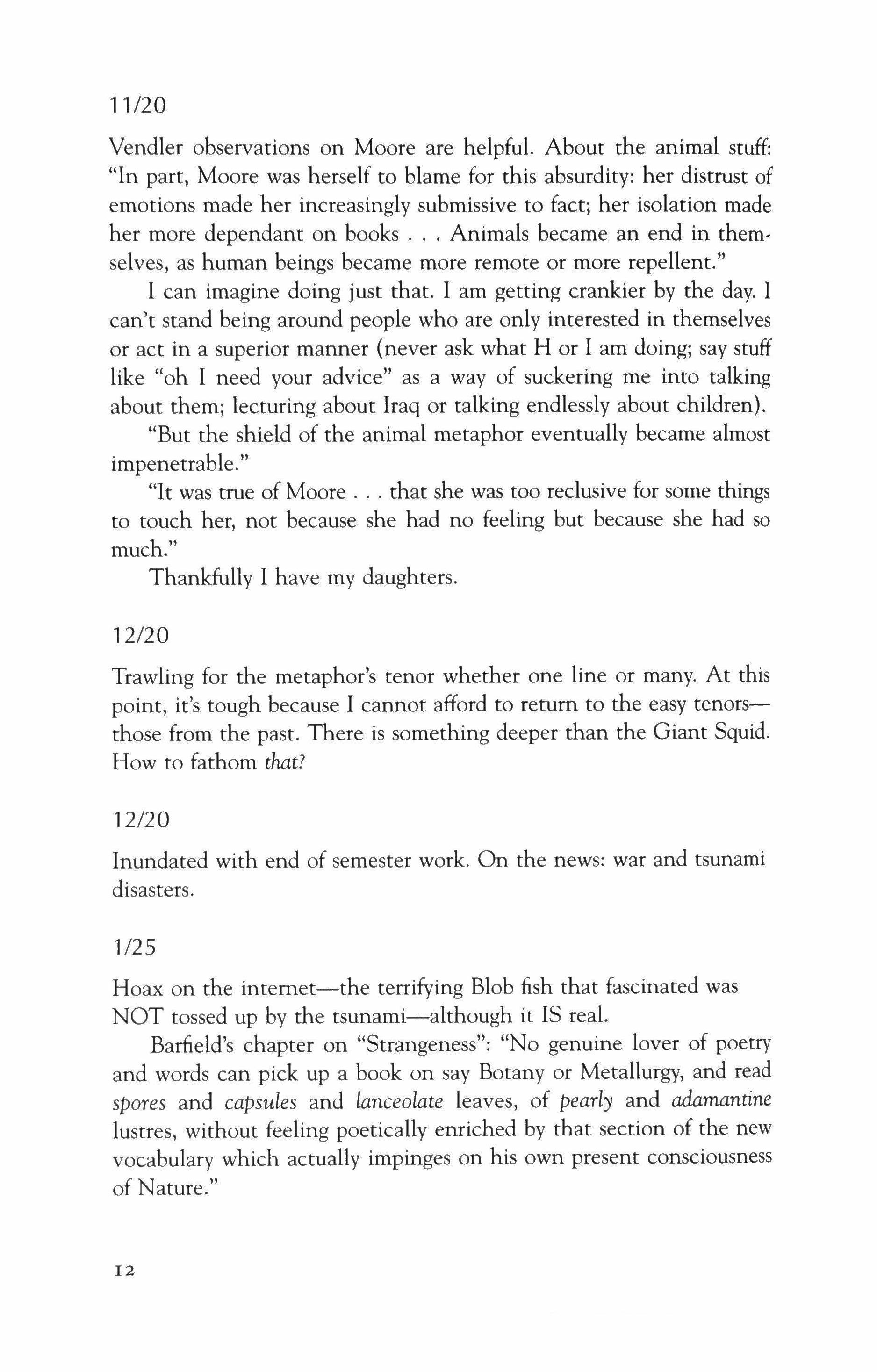
11/20
Vendler observations on Moore are helpful. About the animal stuff: "In part, Moore was herself to blame for this absurdity: her distrust of emotions made her increasingly submissive to fact; her isolation made her more dependant on books Animals became an end in themselves, as human beings became more remote or more repellent."
I can imagine doing just that. I am getting crankier by the day. I can't stand being around people who are only interested in themselves or act in a superior manner (never ask what H or I am doing; say stuff like "oh I need your advice" as a way of suckering me into talking about them; lecturing about Iraq or talking endlessly about children).
"But the shield of the animal metaphor eventually became almost impenetrable."
"It was true of Moore that she was too reclusive for some things to touch her, not because she had no feeling but because she had so much."
Thankfully I have my daughters.
12/20
Trawling for the metaphor's tenor whether one line or many. At this point, it's tough because I cannot afford to return to the easy tenorsthose from the past. There is something deeper than the Giant Squid. How to fathom that?
12/20
Inundated with end of semester work. On the news: war and tsunami disasters.
1125
Hoax on the internet-the terrifying Blob fish that fascinated was NOT tossed up by the tsunami-although it IS real.
Barfield's chapter on "Strangeness": "No genuine lover of poetry and words can pick up a book on say Botany or Metallurgy, and read spores and capsules and lanceolate leaves, of pearly and adamantine lustres, without feeling poetically enriched by that section of the new vocabulary which actually impinges on his own present consciousness of Nature."
12
Kimiko Hahn
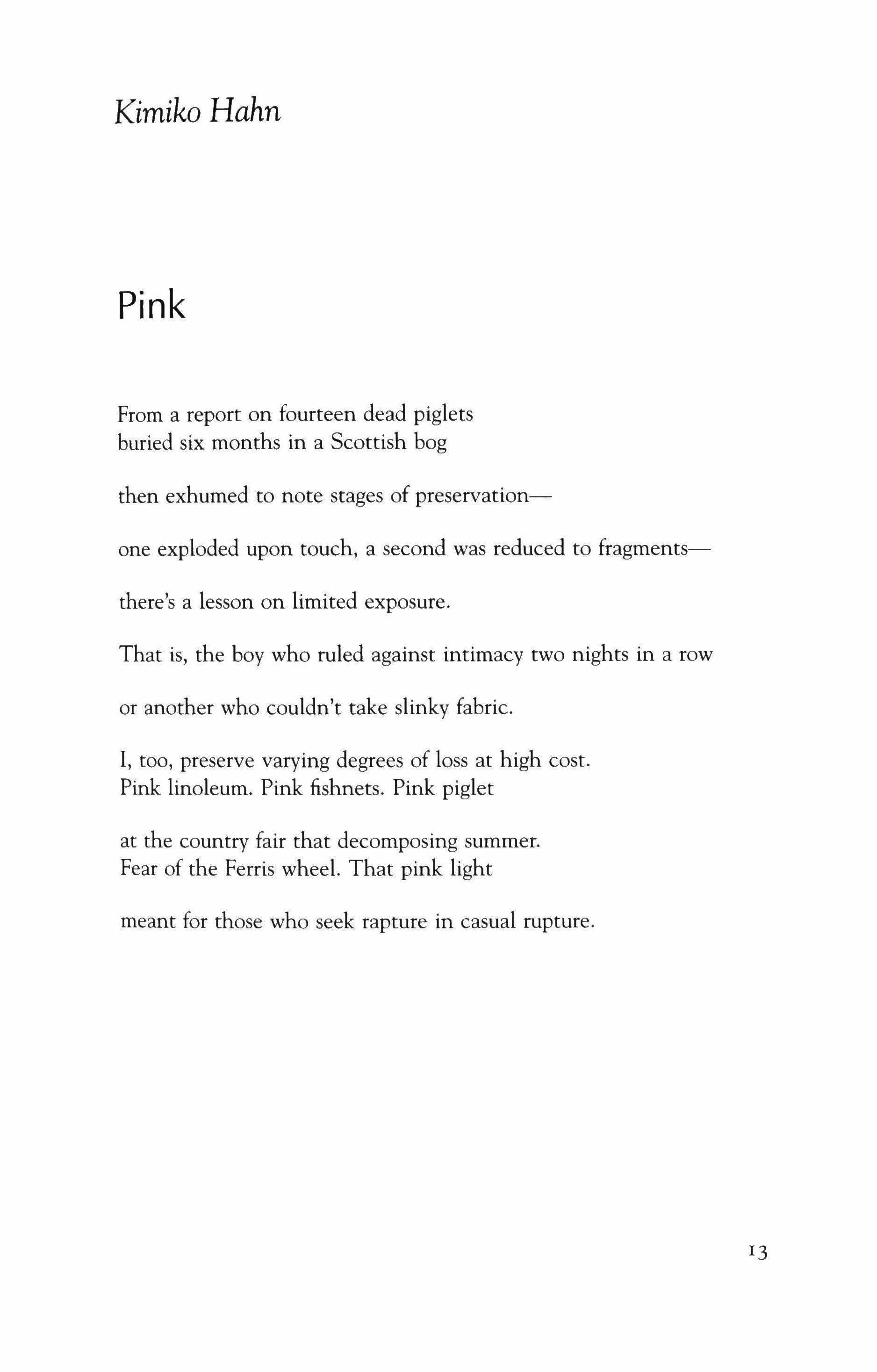
Pink
From a report on fourteen dead piglets buried six months in a Scottish bog then exhumed to note stages of preservationone exploded upon touch, a second was reduced to fragmentsthere's a lesson on limited exposure.
That is, the boy who ruled against intimacy two nights in a row or another who couldn't take slinky fabric.
I, too, preserve varying degrees of loss at high cost. Pink linoleum. Pink fishnets. Pink piglet at the country fair that decomposing summer. Fear of the Ferris wheel. That pink light meant for those who seek rapture in casual rupture.
13

Albert Goldbarth
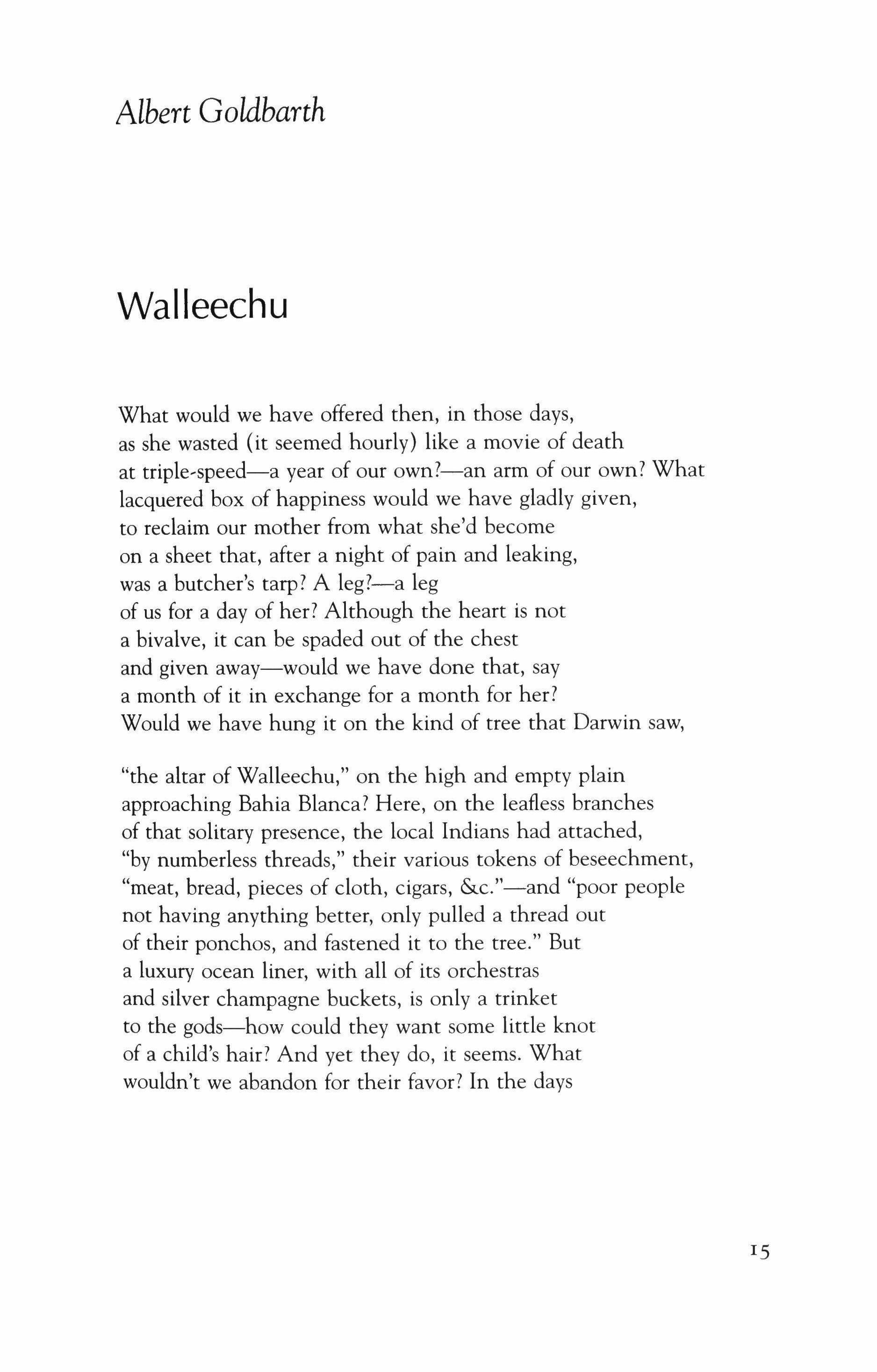
Walleechu
What would we have offered then, in those days, as she wasted (it seemed hourly) like a movie of death at triple,speed-a year of our own?-an arm of our own? What lacquered box of happiness would we have gladly given, to reclaim our mother from what she'd become on a sheet that, after a night of pain and leaking, was a butcher's tarp? A legI-a leg of us for a day of her? Although the heart is not a bivalve, it can be spaded out of the chest and given away-would we have done that, say a month of it in exchange for a month for her? Would we have hung it on the kind of tree that Darwin saw,
"the altar of Walleechu," on the high and empty plain approaching Bahia Blanca? Here, on the leafless branches of that solitary presence, the local Indians had attached, "by numberless threads," their various tokens of beseechment, "meat, bread, pieces of cloth, cigars, &c."-and "poor people not having anything better, only pulled a thread out of their ponchos, and fastened it to the tree." But a luxury ocean liner, with all of its orchestras and silver champagne buckets, is only a trinket to the gods-how could they want some little knot of a child's hair? And yet they do, it seems. What wouldn't we abandon for their favor? In the days
15

of my love-troubles, I might have offered my tongue on a salver for what it had said. Or my eye-would that do? On a fishhook and a swaying length of nerve? Another bit of human glitter for the jackdaw sensibility behind this tree. Here, take it, let it dangle and gleam in the blanched sky of this country.
The Muse of Invention

Noon: they were happy. One o'clock: they had hurt each other again. As if they couldn't tell which atmosphere they breathed in best, so needed alternation. In this, the clock complied: seemingly, the machinery of the day can grind a new emotion hourly. The bedroom sun, compacted in the gel in the jar, to the look of a shrunken head The bedroom sun, a patient, golden hand at rest on the top of the conga drum. They know that some year later on, in retrospect, the proper combination of these everyday components will be obvious-this here, and this: resentment; minus the ottoman, and with the heavy X of two crossed wrenches like the design on a crest: forgiveness-but the muse of invention is wary of committing herself too readily. Darwin, encamped on one of the southern islands of his five-year voyage -enbosomed, he wrote, for he loved this place-observed a sudden amplitude of color as the flap of flight again, and then again, and then again, in what his eyes saw as a sequence of these units as they almost, almost, blended unbroken into a ribbon of indigo shine. And even so, he didn't foresee cinema. Nor did Leonardo give the world the printing press. Amid the twigs and stickers of the forest floor, amid the city's colonnades, and especially amid the itch of the flesh, and the warring oaths that rive a human heart, they did what they needed to do, and the future took care of itself.
A History
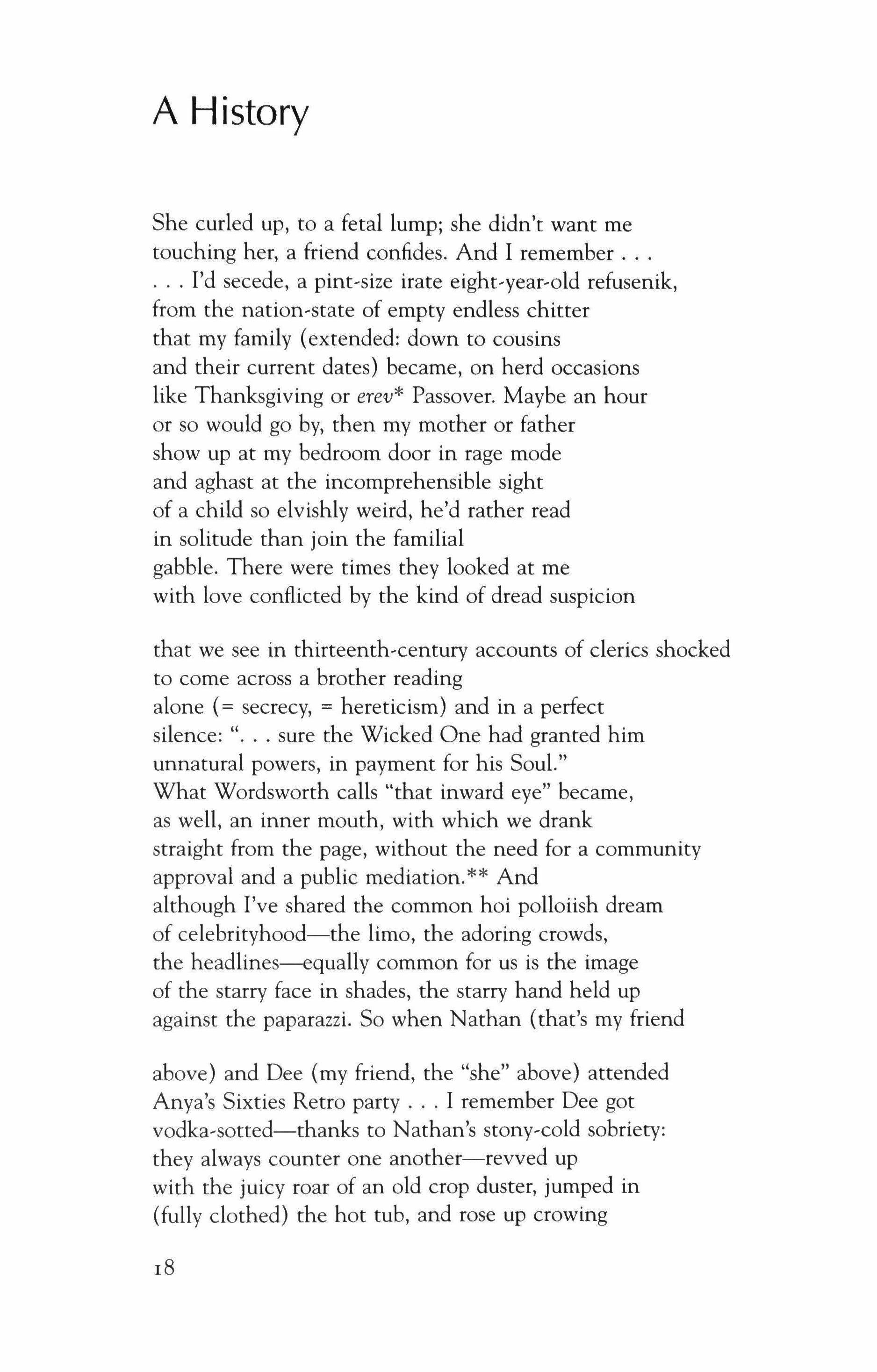
She curled up, to a fetal lump; she didn't want me touching her, a friend confides. And I remember I'd secede, a pint-size irate eight-year-old refusenik, from the nation-state of empty endless chitter that my family (extended: down to cousins and their current dates) became, on herd occasions like Thanksgiving or erev* Passover. Maybe an hour or so would go by, then my mother or father show up at my bedroom door in rage mode and aghast at the incomprehensible sight of a child so elvishly weird, he'd rather read in solitude than join the familial gabble. There were times they looked at me with love conflicted by the kind of dread suspicion
that we see in thirteenth-century accounts of clerics shocked to come across a brother reading alone (= secrecy, hereticism) and in a perfect silence: sure the Wicked One had granted him unnatural powers, in payment for his Soul." What Wordsworth calls "that inward eye" became, as well, an inner mouth, with which we drank straight from the page, without the need for a community approval and a public mediation.** And although I've shared the common hoi polloiish dream of celebrityhood-the limo, the adoring crowds, the headlines-equally common for us is the image of the starry face in shades, the starry hand held up against the paparazzi. So when Nathan (that's my friend above) and Dee (my friend, the "she" above) attended Anya's Sixties Retro party I remember Dee got vodka-sotred=-thanks to Nathan's stony-cold sobriety: they always counter one another-revved up with the juicy roar of an old crop duster, jumped in (fully clothed) the hot tub, and rose up crowing
18
into the vodka bottle like a megaphone "Leave me alone!" (= pay me attention). We're confused, we human beings. Of course. We corne from a world of 100% attachment and osmosis; we remember it subconsciously as a world of isolation. In those movies of the fetus developing there it is, lips and larynx learning their first text; reading in private.

The initiating "first night" of a Jewish holiday.
Originally in monasteries, reading was a group activity-reading was always and only a group activity. The ear required "corroboration of what the eye was seeing," says Leonard Shlain. "In order to know what he was reading, a monk had to actually hear himself." But then during the Middle Ages, Roger Chartier tells us, "one stratum of readers after another mastered the technique of silent reading. The first were the copyists working in the monastic scriptoria. Then, scholars in the universities. Two centuries later, the lay aristocracy."
Suddenly, the reader was freed from anyone else's scrutiny. This radical ability made possible the immediate internalization of script or print. The book and its oneperson audience could form a bonded unit that was separate from the outside world. Intellectual work became an intimate act. In devotional reading, silence allowed a direct relationship between the individual and God. The Bible, a love letter, these were portable now, to a sanctum: woods, bed, crawlspace. Emerging ideas of what the "self" is, and what a given person's capacity for "reflection" is, grow evident: "to be alone with my thoughts."
In many ways this makes the novel possible; and what we call "author-ity" came to reside not in the overculture ethos, but in the author-with whom the reader established an insular back-and-forth. And of course in religious, political and erotic matters, the way was paved for previously unthinkable audacities. Pepys's diary says: "Up, and at my chamber all the morning and the office, doing business and also reading a little of L'escholle des Filles, which is a mighty lewd book." And then, that silly encoding of his: "It did hazer my prick para stand all the while, and una vez to decharger."
Crossing
The Catuaro mission is situated in a very wild place. At night jaguars hunt the Indians' chickens and pigs. We lodged in the priest's house. He wanted to know what I thought of free will, of how to raise the soul from the prison of the body, and, above all, about animal souls. When you have crossed a jungle in the rainy season you do not feel like these kinds of speculations.
Alexander von Humboldt, 1799

It was difficult for anyone to travel in the Year of Our Lord 960, and unthinkable for a woman. So novitiate Theophna doesn't think, she lets her savvy honor guard of noble-household louts do that, while she attends to the unfamiliar requirements of every immediate step she takes on this dangerous journey -"to go instruct the daughters of the Count in matters Spirityl." The honor guards' conversation is little but swineherd-style cursing, as well it might be: the way is undrained bogs, and forest so thick it's like straining through the interstices of a solid. When a wolf attacks one night, and is with great pains overcome and slit, "there were found in its belly, parts of human limbs." Another night, a straggler is disemboweled by a rampaging boar. The threat of human marauders is ever present: they rape, they pluck a victim's eyes out as if lazily swiping eggs from a nest. The rivers have no bridges and the mountain demands that they crawl on all fours.
It's recorded that when Theophna arrives a week later, at midnight, chilled and starved and blistered, dreaming fish soup and a heated bath, and the governess suggests that she fly straight to meet her wards and begin their lessons in the holy mortification of the flesh, the pious Theophna is heard to utter a string of words not found in the Bible.
1.
20
2.
She'd arranged a date for 7:00 at the west side Budget Inn, a "reg," a once-a-month on business here from Omaha, with tastes that leaned toward infant nursing fantasies (both tit and bottle), normally an easy three-bill hour, but her brother is heavily dying in the paralytic increments of Lou Gehrig's disease, and outposts of her breaking heart befuddle her usually quick-click mind (and dim the responses lower down of her little purrer, her moneymaker) and jezus at the comer of 4th and Dumplestead she runs a red and smashes a parked VW van, which shatters eleven nippled bottles of Similac in the back seat, then the cops show and her goddam proof of insurance card is in her "real" purse at home and not of course in her bag with the peekaboo nightie, talcum, and pacifier (although she feels the need to fake a guarded rummaging-through), which means it's 9: I 5 when she knocks at his door with a combination of eat-me-lover sexual flair and sheer frustration breaking over her smeared face, and she's suddenly on the bed-edge damnit weeping, she's the infant, and when he asks in worried kindliness if she'd care to join him in prayer, she cracks the one good bottle of babygoo over his bald head
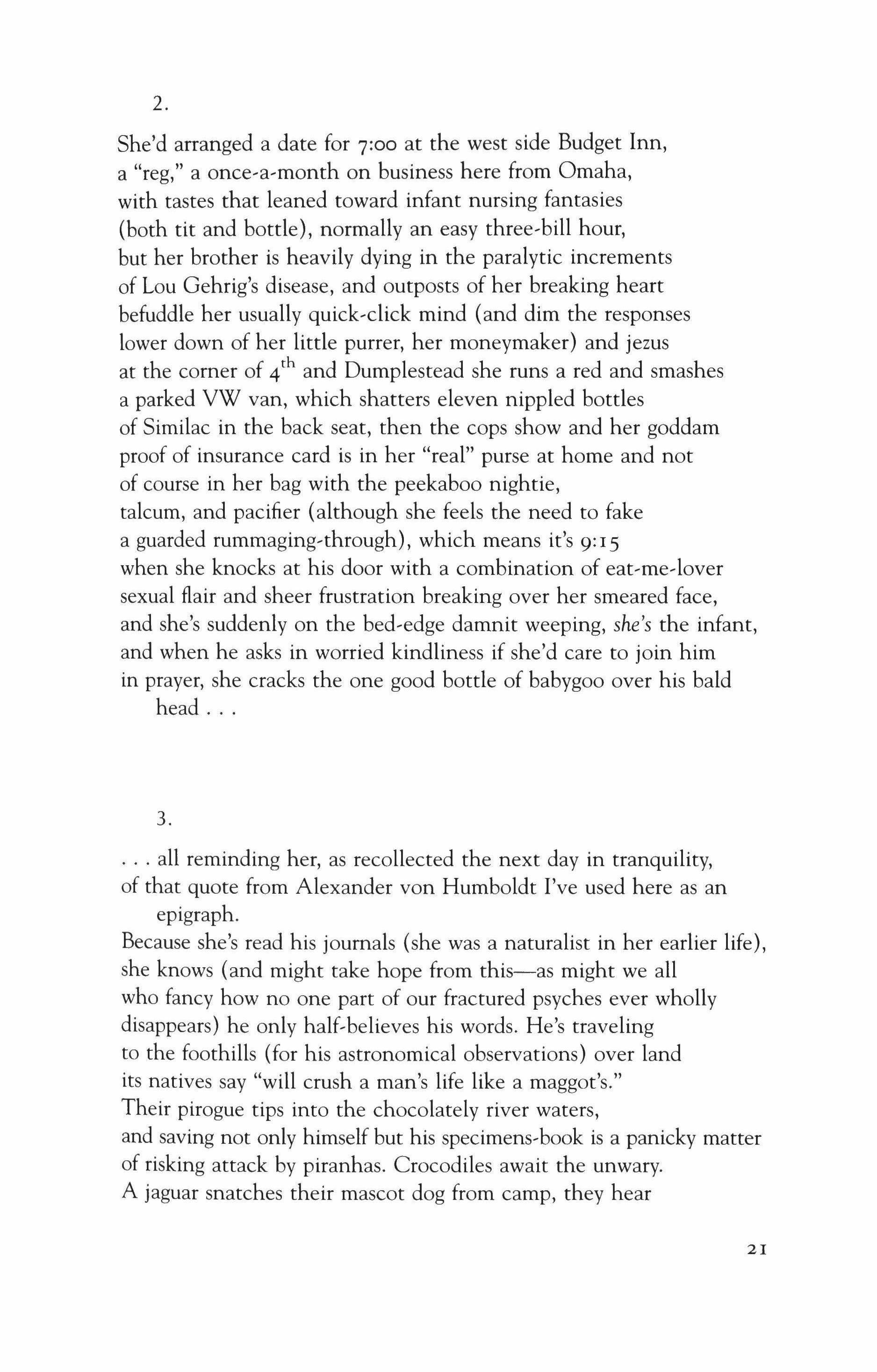
3
all reminding her, as recollected the next day in tranquility, of that quote from Alexander von Humboldt I've used here as an epigraph.
Because she's read his journals (she was a naturalist in her earlier life), she knows (and might take hope from this-as might we all who fancy how no one part of our fractured psyches ever wholly disappears) he only half-believes his words. He's traveling to the foothills (for his astronomical observations) over land its natives say "will crush a man's life like a maggot's." Their pirogue tips into the chocolately river waters, and saving not only himself but his specimens-book is a panicky matter of risking attack by piranhas. Crocodiles await the unwary. A jaguar snatches their mascot dog from camp, they hear
21

its cries of dismemberment. The heat. The waist-high pit of mud. There are so many gnats and mosquitoes that to breathe in is "to drown in gnats and mosquitoes, they so replace the air." They reach their destination, a run-down monastery, exhausted and tom. But that night, doesn't he leave his bed? -not to set up his extensive equipment, but none the less to sprawl on a hilltop, closer than on the plains to the sky and its mysteries, the sky and its burning incorporeal presence.
22
Ray Gonzalez
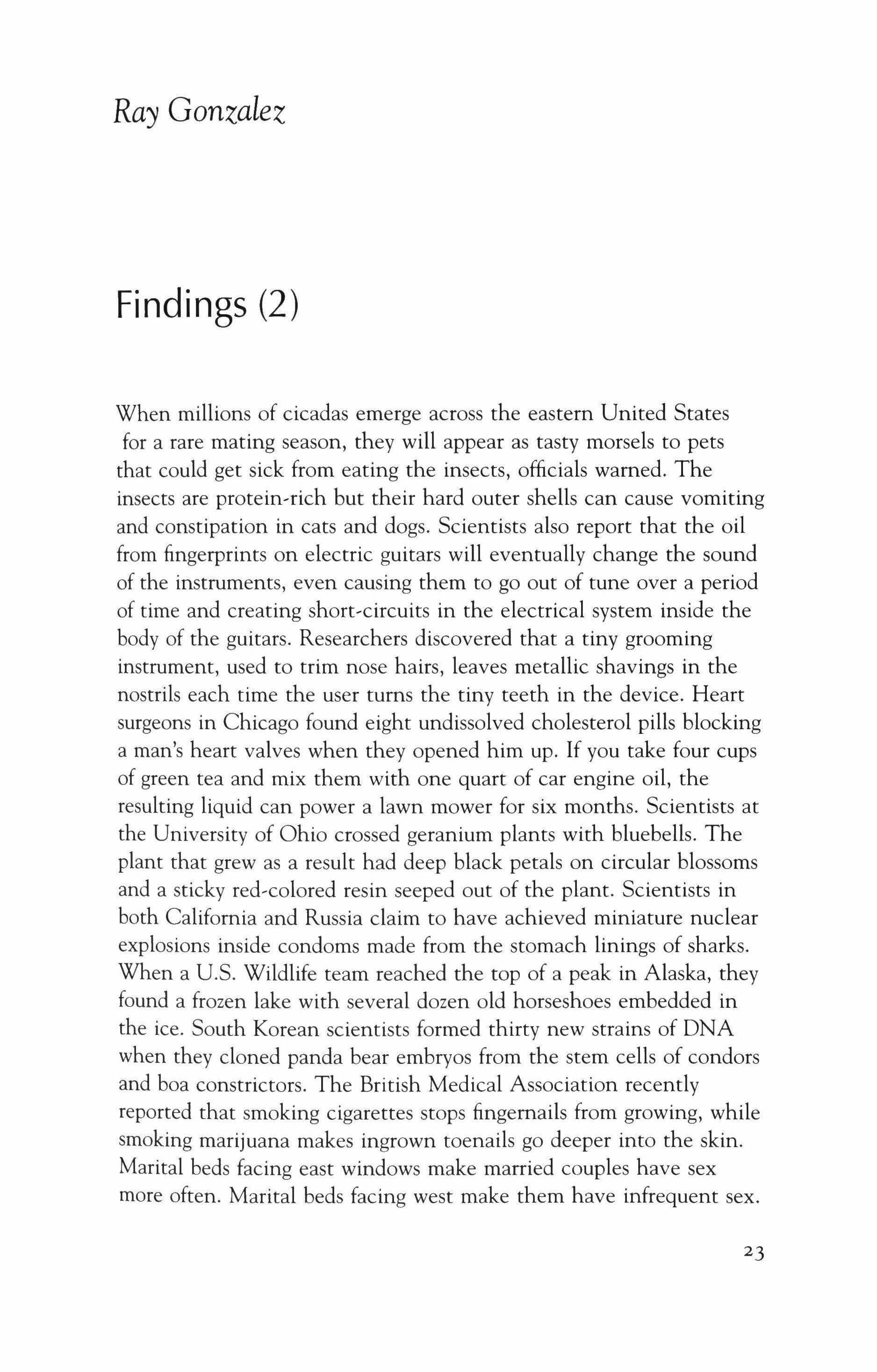
Findings (2)
When millions of cicadas emerge across the eastern United States for a rare mating season, they will appear as tasty morsels to pets that could get sick from eating the insects, officials warned. The insects are protein-rich but their hard outer shells can cause vomiting and constipation in cats and dogs. Scientists also report that the oil from fingerprints on electric guitars will eventually change the sound of the instruments, even causing them to go out of tune over a period of time and creating short-circuits in the electrical system inside the body of the guitars. Researchers discovered that a tiny grooming instrument, used to trim nose hairs, leaves metallic shavings in the nostrils each time the user turns the tiny teeth in the device. Heart surgeons in Chicago found eight undissolved cholesterol pills blocking a man's heart valves when they opened him up. If you take four cups of green tea and mix them with one quart of car engine oil, the resulting liquid can power a lawn mower for six months. Scientists at the University of Ohio crossed geranium plants with bluebells. The plant that grew as a result had deep black petals on circular blossoms and a sticky red-colored resin seeped out of the plant. Scientists in both California and Russia claim to have achieved miniature nuclear explosions inside condoms made from the stomach linings of sharks. When a U.S. Wildlife team reached the top of a peak in Alaska, they found a frozen lake with several dozen old horseshoes embedded in the ice. South Korean scientists formed thirty new strains of DNA when they cloned panda bear embryos from the stem cells of condors and boa constrictors. The British Medical Association recently reported that smoking cigarettes stops fingernails from growing, while smoking marijuana makes ingrown toenails go deeper into the skin. Marital beds facing east windows make married couples have sex more often. Marital beds facing west make them have infrequent sex.
23
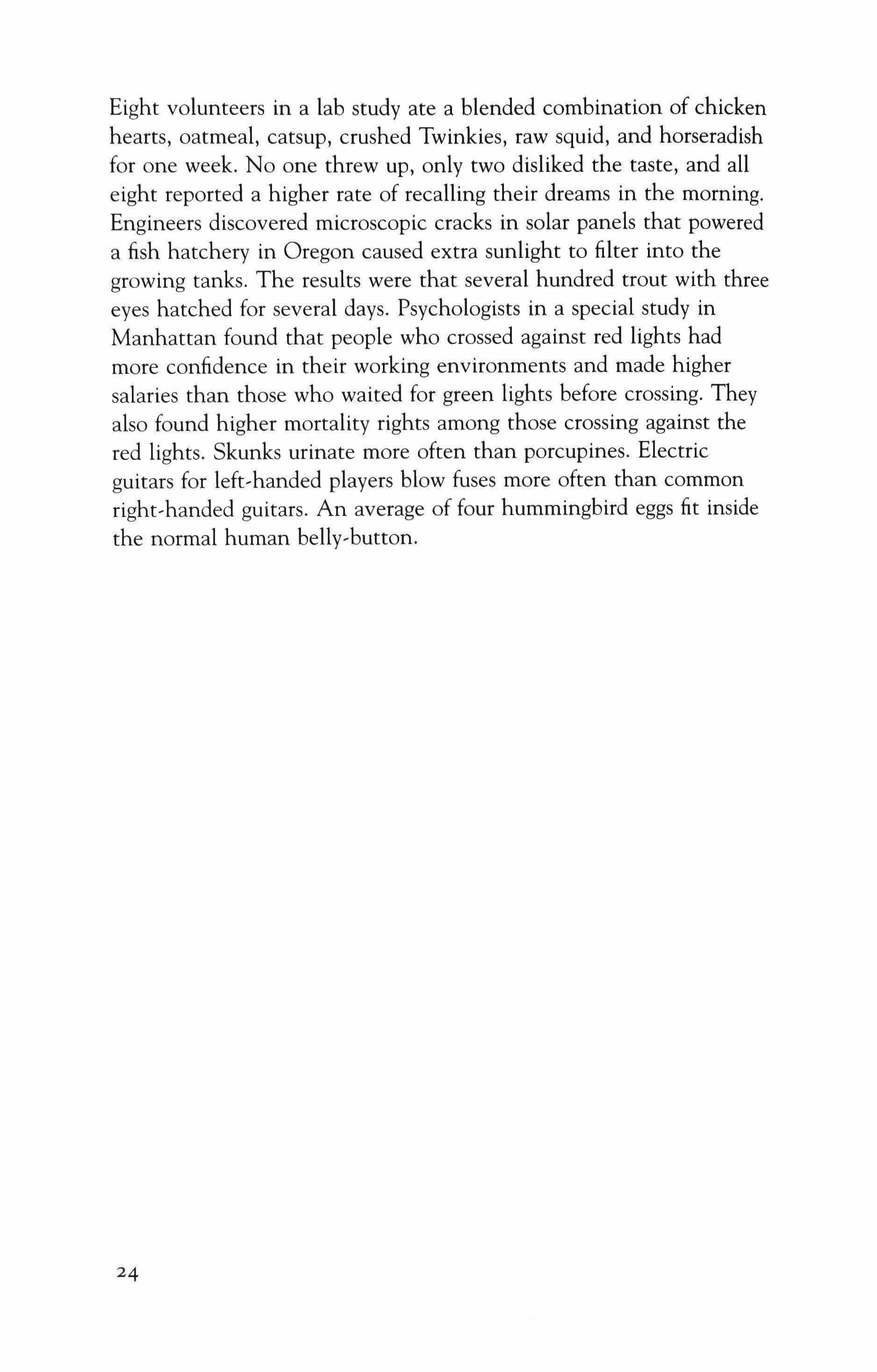
Eight volunteers in a lab study ate a blended combination of chicken hearts, oatmeal, catsup, crushed Twinkies, raw squid, and horseradish for one week. No one threw up, only two disliked the taste, and all eight reported a higher rate of recalling their dreams in the morning. Engineers discovered microscopic cracks in solar panels that powered a fish hatchery in Oregon caused extra sunlight to filter into the growing tanks. The results were that several hundred trout with three eyes hatched for several days. Psychologists in a special study in Manhattan found that people who crossed against red lights had more confidence in their working environments and made higher salaries than those who waited for green lights before crossing. They also found higher mortality rights among those crossing against the red lights. Skunks urinate more often than porcupines. Electric guitars for left-handed players blow fuses more often than common right-handed guitars. An average of four hummingbird eggs fit inside the normal human belly-button.
Findings (3)
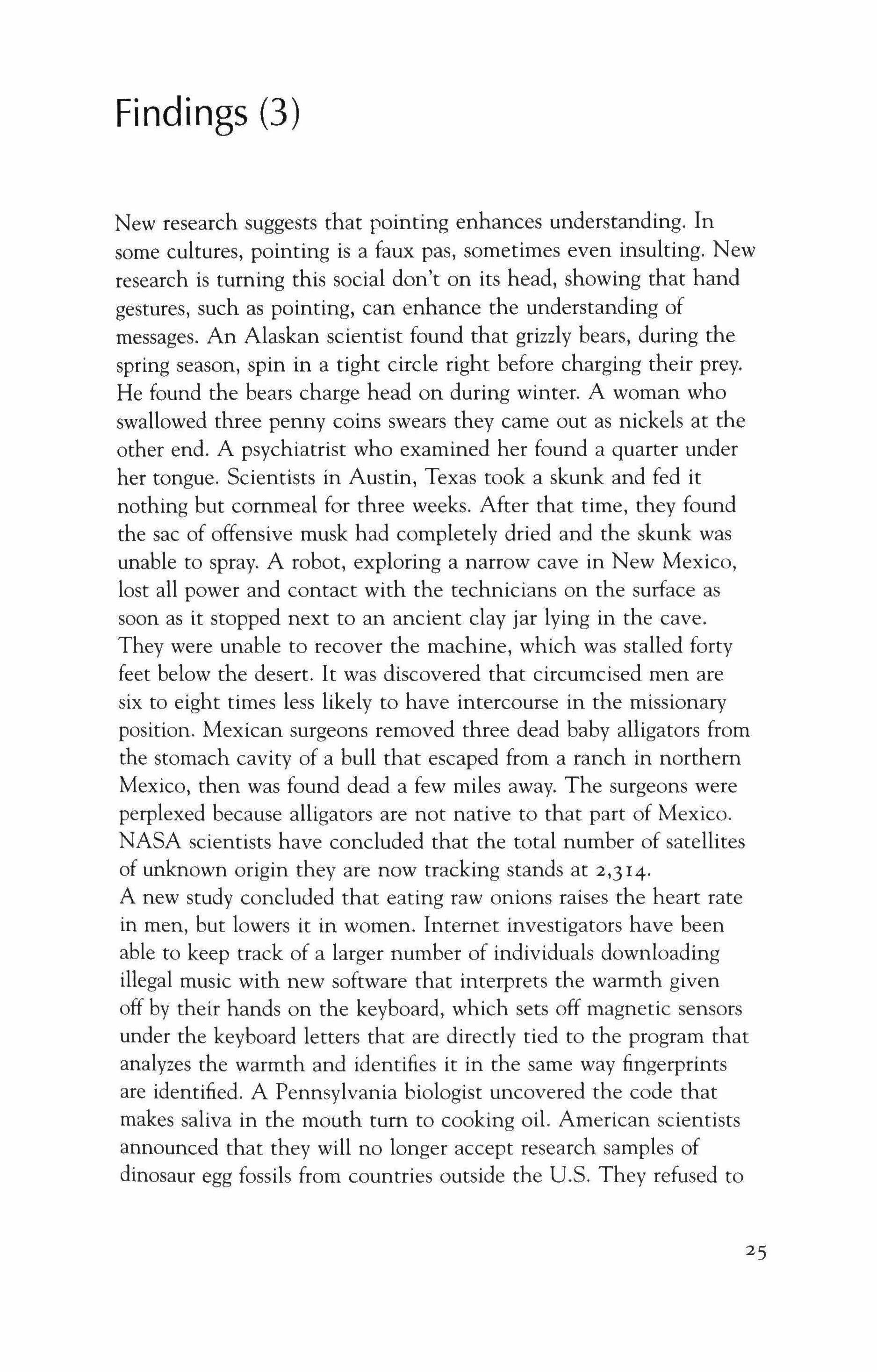
New research suggests that pointing enhances understanding. In some cultures, pointing is a faux pas, sometimes even insulting. New research is turning this social don't on its head, showing that hand gestures, such as pointing, can enhance the understanding of messages. An Alaskan scientist found that grizzly bears, during the spring season, spin in a tight circle right before charging their prey. He found the bears charge head on during winter. A woman who swallowed three penny coins swears they came out as nickels at the other end. A psychiatrist who examined her found a quarter under her tongue. Scientists in Austin, Texas took a skunk and fed it nothing but cornmeal for three weeks. After that time, they found the sac of offensive musk had completely dried and the skunk was unable to spray. A robot, exploring a narrow cave in New Mexico, lost all power and contact with the technicians on the surface as soon as it stopped next to an ancient clay jar lying in the cave. They were unable to recover the machine, which was stalled forty feet below the desert. It was discovered that circumcised men are six to eight times less likely to have intercourse in the missionary position. Mexican surgeons removed three dead baby alligators from the stomach cavity of a bull that escaped from a ranch in northern Mexico, then was found dead a few miles away. The surgeons were perplexed because alligators are not native to that part of Mexico. NASA scientists have concluded that the total number of satellites of unknown origin they are now tracking stands at 2,314. A new study concluded that eating raw onions raises the heart rate in men, but lowers it in women. Internet investigators have been able to keep track of a larger number of individuals downloading illegal music with new software that interprets the warmth given off by their hands on the keyboard, which sets off magnetic sensors under the keyboard letters that are directly tied to the program that analyzes the warmth and identifies it in the same way fingerprints are identified. A Pennsylvania biologist uncovered the code that makes saliva in the mouth tum to cooking oil. American scientists announced that they will no longer accept research samples of dinosaur egg fossils from countries outside the U.S. They refused to

state a reason for banning them. Researchers found that repeated exposure to low-level magnetic fields, such as those emitted by vibrators and VCRs lead to a higher rate of prostrate cancer in men.
Paintball

April 8, 2004 El Paso Times: Paintballs Fired into juarez Community from U.S.
In Anapra, one of the poorest neighborhoods in Juarez, Mexico, across the border from El Paso, residents claim that they are being shot at with paintballs from the U.S. On the night of Monday April 5, the attackers hit two children and three pregnant women. One child was hit in the face, near his eye. The shootings take place at night and Anapra residents say their attackers use laser scopes and night vision gear. They dress in black so as not be easily spotted. El Diario reports that they use a tan colored truck to get into position on a nearby hill. Anapra residents say that the Border Patrol has seen the paintball shooters and has done nothing to stop them. One Anapra resident told EI Diario that neighbors "will respond" if the harassment does not stop soon.
The paintball explodes on the stray dog in yellow blood, its howls mistaken for the observant coyote in the hills.
The paintball flattens against the pregnant woman in blue streaks, the shade of blue impacting on how her baby will be born, live, and die.
The paintball kisses the adobe walls and spills letters in an alphabet more villagers understand than the black and white graffiti of their long lost gang.
The paintball flies in the heat before opening in a geometric shape that changes the face of the child into an image any border justice organization would fight to place on their website.
The paintball stings the brown back of the shirtless boy with a green star that will form a scar he can never wash off.
The paintball buzzes through the swarm of flies circling the outdoor latrines, its impact against the stall sending the insects into an orange frenzy.

The paintball electrifies the Mexican flag in the plaza with a purple haze that gathers a crowd around the flagpole in the morning.
The paintball miraculously bounces off the baby in the arms of the woman before disintegrating in a pink cloud that gives the clay jars on the well a Wal-Mart competitive design.
The paintball zooms into the eye of the innocent old man, the last thing he sees turning red as if red was the only color he remembered from those days in San Luis Potosi when his mother took him to the wall of roses and showed him where his father died.
The paintball blends with the olive green Border Patrol van, whose driver mistakes the impact for a bullet and is shocked the illegals crossing the river are finally armed.
The paintball destroys the statue of La Virgen de Guadalupe, its power cracking the figure's right arm as the film of unknown color wraps the statue in a light many worshippers had been praying for.
The paintball decorates the door of La Bruja, the town witch emerging into the night with a crooked stick tied in multi-colored ribbons that send the shooters scrambling into their van.
The paintball illuminates the border in a storm of bees, the shooters running out of balls as dawn arrives to give birth to the sparkling, broken windshield on their van, the last two boys they targeted holding the warm pistol between them, their three bullets escaping into the air without giving a clue as to what color could describe them best.
The empty paintball cases add color to the desert, the rainbow dirt washed by the next sandstorm into the Rio Grande, whose radioactive waters offer more colors than the latest version of the game.
EI Paso
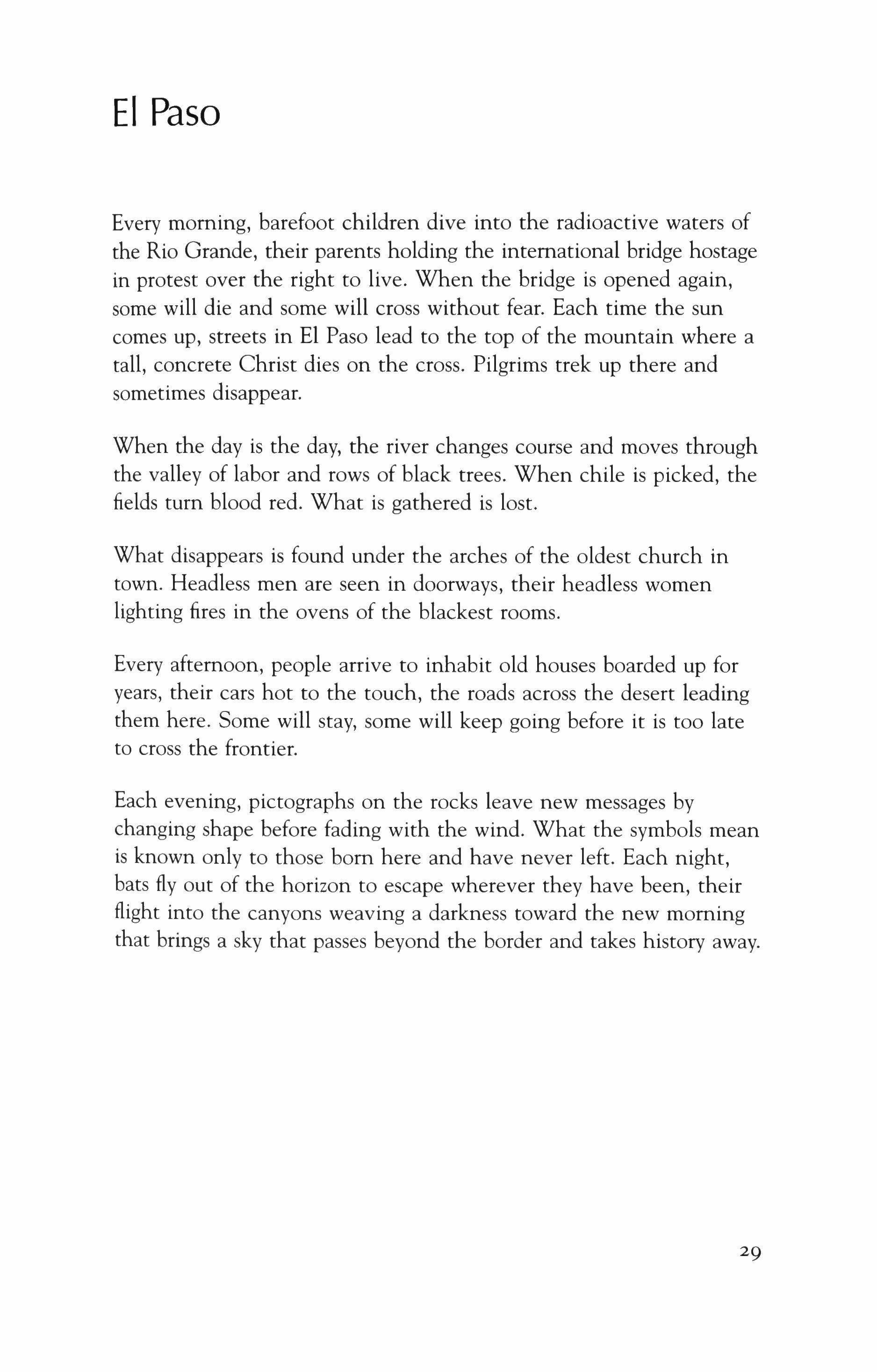
Every morning, barefoot children dive into the radioactive waters of the Rio Grande, their parents holding the international bridge hostage in protest over the right to live. When the bridge is opened again, some will die and some will cross without fear. Each time the sun comes up, streets in El Paso lead to the top of the mountain where a tall, concrete Christ dies on the cross. Pilgrims trek up there and sometimes disappear.
When the day is the day, the river changes course and moves through the valley of labor and rows of black trees. When chile is picked, the fields tum blood red. What is gathered is lost.
What disappears is found under the arches of the oldest church in town. Headless men are seen in doorways, their headless women lighting fires in the ovens of the blackest rooms.
Every afternoon, people arrive to inhabit old houses boarded up for years, their cars hot to the touch, the roads across the desert leading them here. Some will stay, some will keep going before it is too late to cross the frontier.
Each evening, pictographs on the rocks leave new messages by changing shape before fading with the wind. What the symbols mean is known only to those born here and have never left. Each night, bats fly out of the horizon to escape wherever they have been, their flight into the canyons weaving a darkness toward the new morning that brings a sky that passes beyond the border and takes history away.
Laurie Sheck
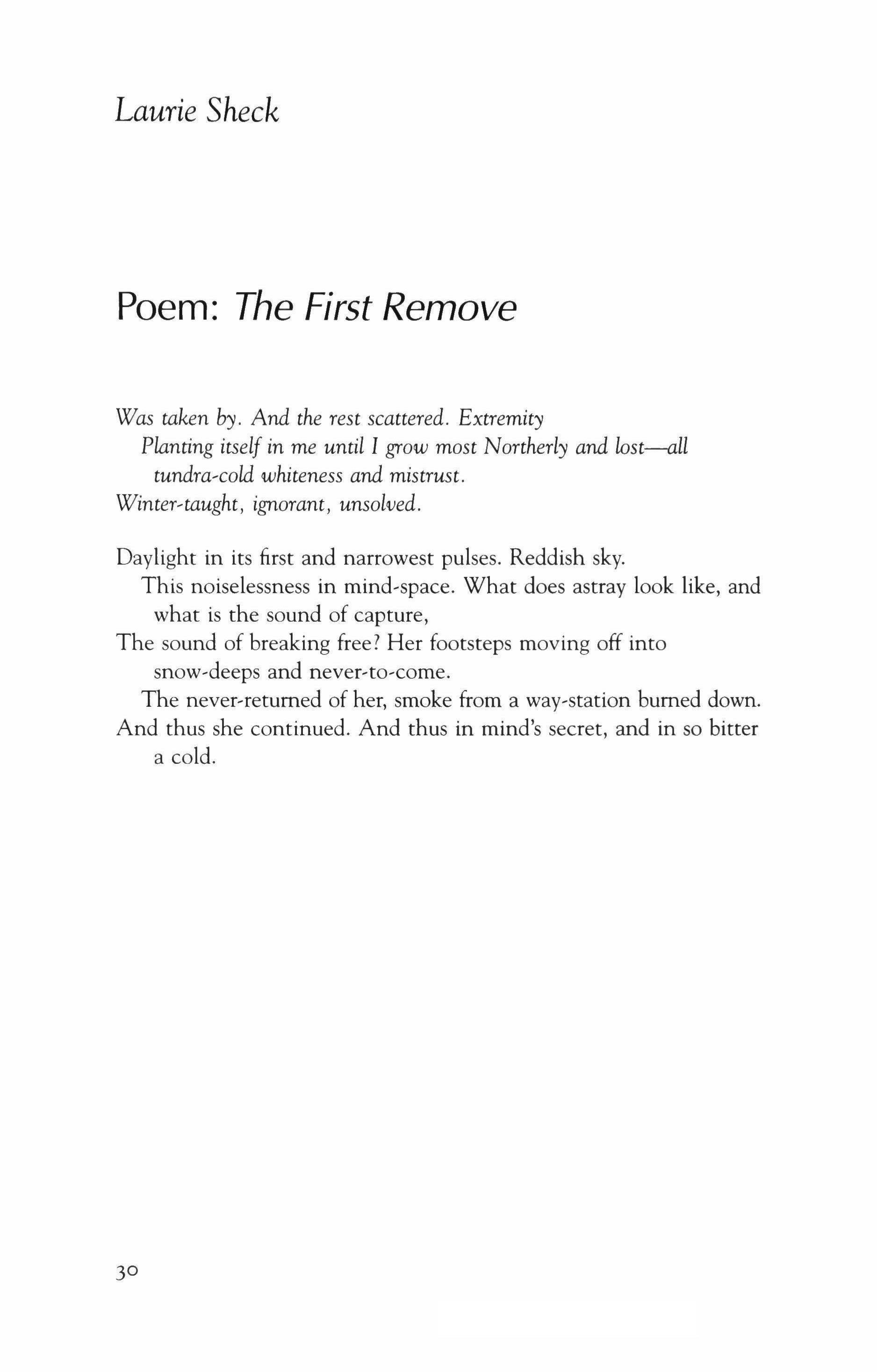
Poem: The First Remove
Was taken by. And the rest scattered. Extremity
Planting itself in me until I gTOW most Northerly and lost-all tundra,cold whiteness and mistrust.
Winter,taught, ignorant, unsolved.
Daylight in its first and narrowest pulses. Reddish sky. This noiselessness in mind-space. What does astray look like, and what is the sound of capture, The sound of breaking free? Her footsteps moving off into snow,deeps and never-to-come.
The never-returned of her, smoke from a way-station burned down. And thus she continued. And thus in mind's secret, and in so bitter a cold.
30
Poem: The Second Remove

The others hiding away when they took her. Eventually I learned other words. Assere for knives. Toras: North, Satewa: alone.
Always a breakdown of systems that will not be restored. Something cuts itself in me. It is not a question of refusal. Esteronde: to rain. Tesenochte: I do not know.
The shattered of, and then the narrowness opening where the vanished touches itThen how the mind recombines and overthrows-
31
Poem: The Third Remove
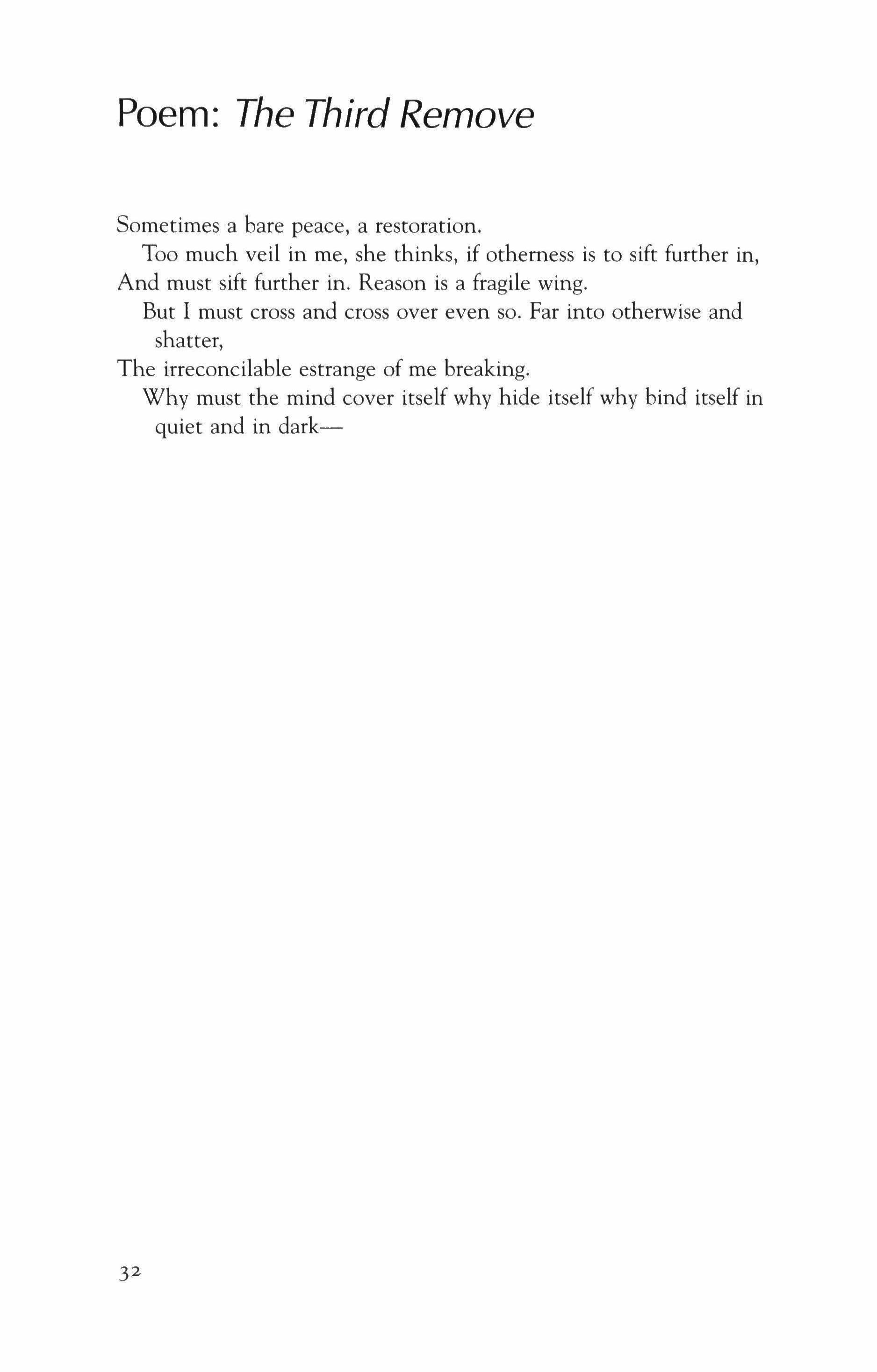
Sometimes a bare peace, a restoration. Too much veil in me, she thinks, if otherness is to sift further in, And must sift further in. Reason is a fragile wing. But I must cross and cross over even so. Far into otherwise and shatter, The irreconcilable estrange of me breaking. Why must the mind cover itself why hide itself why bind itself in quiet and in dark-
32
Poem: The Fourth Remove

But stripped of certain, how the mind hacks and starves itself
As if there were no settlement to return to anymore, Jealous of the sweeping rain and in night-season cold under it.
I went on foot and careless. She, who once was traded for a gun. She, led away into Removes. The cut thread of her, the and with bitterness I carried. And then nothing but wilderness, And being taken by, and a sorrow that cannot.
33
Poem: The Fifth Remove
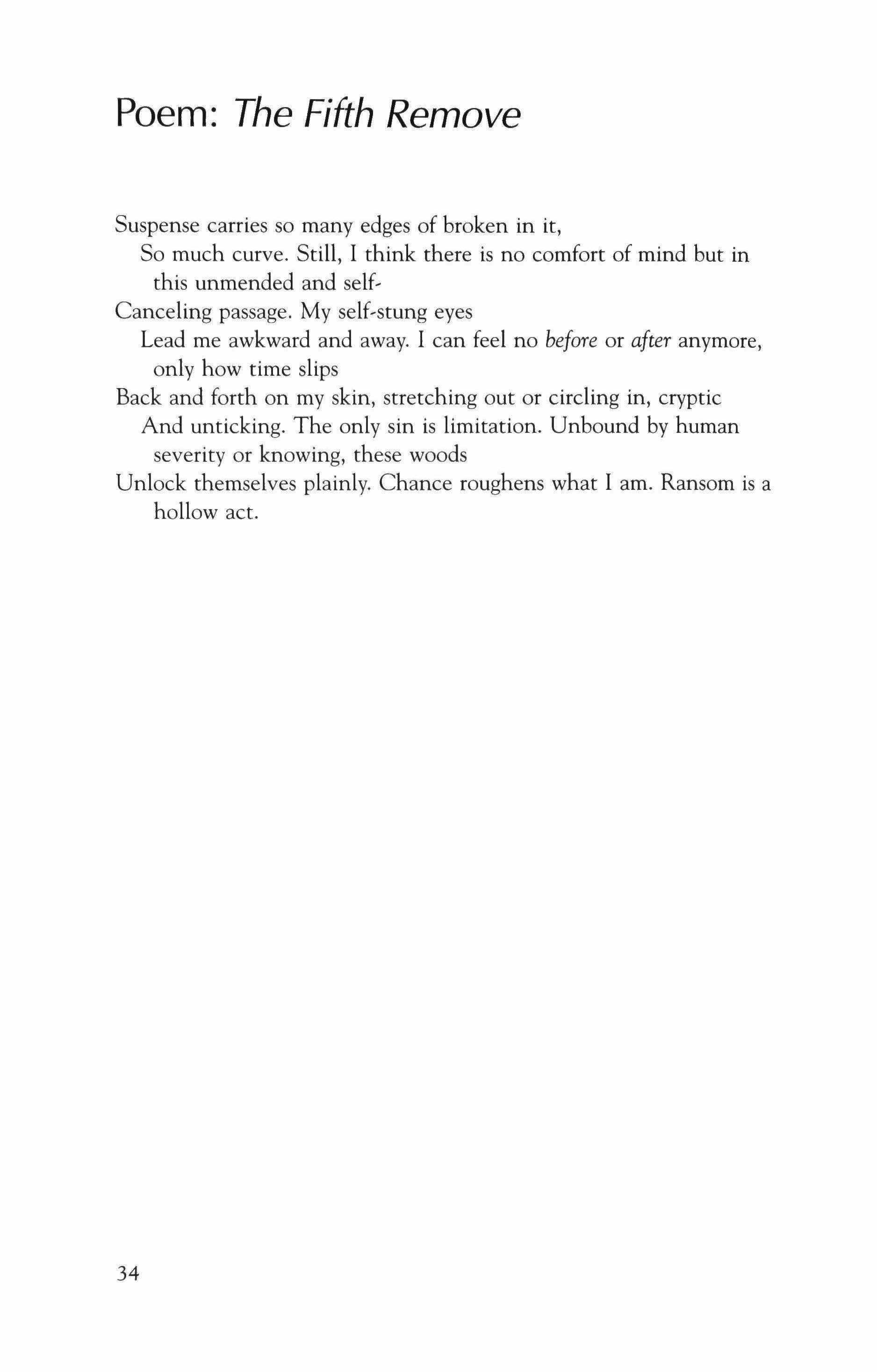
Suspense carries so many edges of broken in it, So much curve. Still, I think there is no comfort of mind but in this unmended and selfCanceling passage. My self-stung eyes
Lead me awkward and away. I can feel no before or after anymore, only how time slips
Back and forth on my skin, stretching out or circling in, cryptic And unticking. The only sin is limitation. Unbound by human severity or knowing, these woods
Unlock themselves plainly. Chance roughens what I am. Ransom is a hollow act.
34
Michael Waters
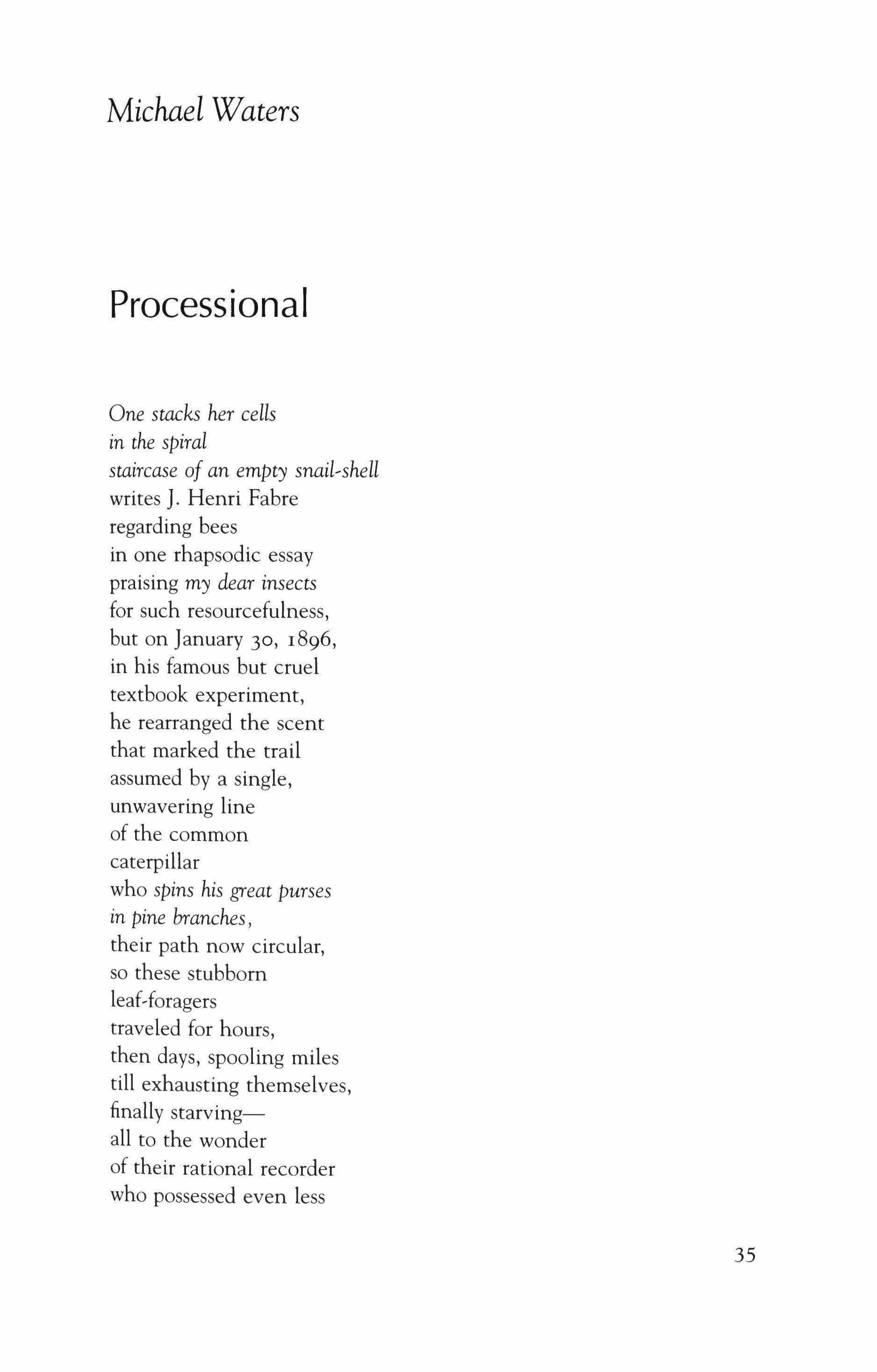
Processional
One stacks her cells in the spiral staircase of an empty snail�shell writes J. Henri Fabre regarding bees in one rhapsodic essay praising my dear insects for such resourcefulness, but on January 30, 1896, in his famous but cruel textbook experiment, he rearranged the scent that marked the trail assumed by a single, unwavering line of the common caterpillar who spins his great purses in pine branches, their path now circular, so these stubborn leaf-foragers traveled for hours, then days, spooling miles till exhausting themselves, finally starvingall to the wonder of their rational recorder who possessed even less
35

sympathy for humans, sketching in his journal the virgin's bower (Clematis vitalba), the famous beggar's herb which reddens the skin and produces the sores in request among our sham cripples.
Bosporus
for Mihaela

Zigzagging eighteen miles north from the Sea of Marmara to the Black Sea, we lean toward Europe on our left, toward Asia failing now, at dusk, on our right, two souls tugged toward each point of the compass toward the past with its previous lives, toward the future with its final, unswerving destination: death. Or not: hadn't we visited the House of the Virgin where Mary had thrummed patience after the resurrection, Christ's tomb exhaling only foreign fragrance, her son's cerements twisting in dust? Swathed in blue, she coaxed savory & dill in her garden, wheedled fierce daylilies while awaiting airy summons.
Outside the house, tourists thronged the cobblestones, knotted invocations to fence wire: Our Lady grant world peace; heal me; whisper the winning numbers into my deaf ear. They scribbled pleas on scarves, soiled bandages, underwear, streamers of toilet tissue, their thwarted desires blue-blacked in the common language of desperation, in linked sequences of DNA that conspire to keep us ordinary. Hail, Mary
Here on the Bosporus, where two continents begin their inexorable drift, their seismic fragmentation toward solitude & ruin, I consecrate my offering: that scrap tom from a battered Lonely Planet guidebook, inscribed, then crumpled & tucked into some postulant's limp panty hose, its one word faded now by sunlight, its
37

single looped prayer commencing its formal dispersal: my howl, my thirst, my tether: your name grown pale on paper, becoming breeze that salts our lips, becoming weather.
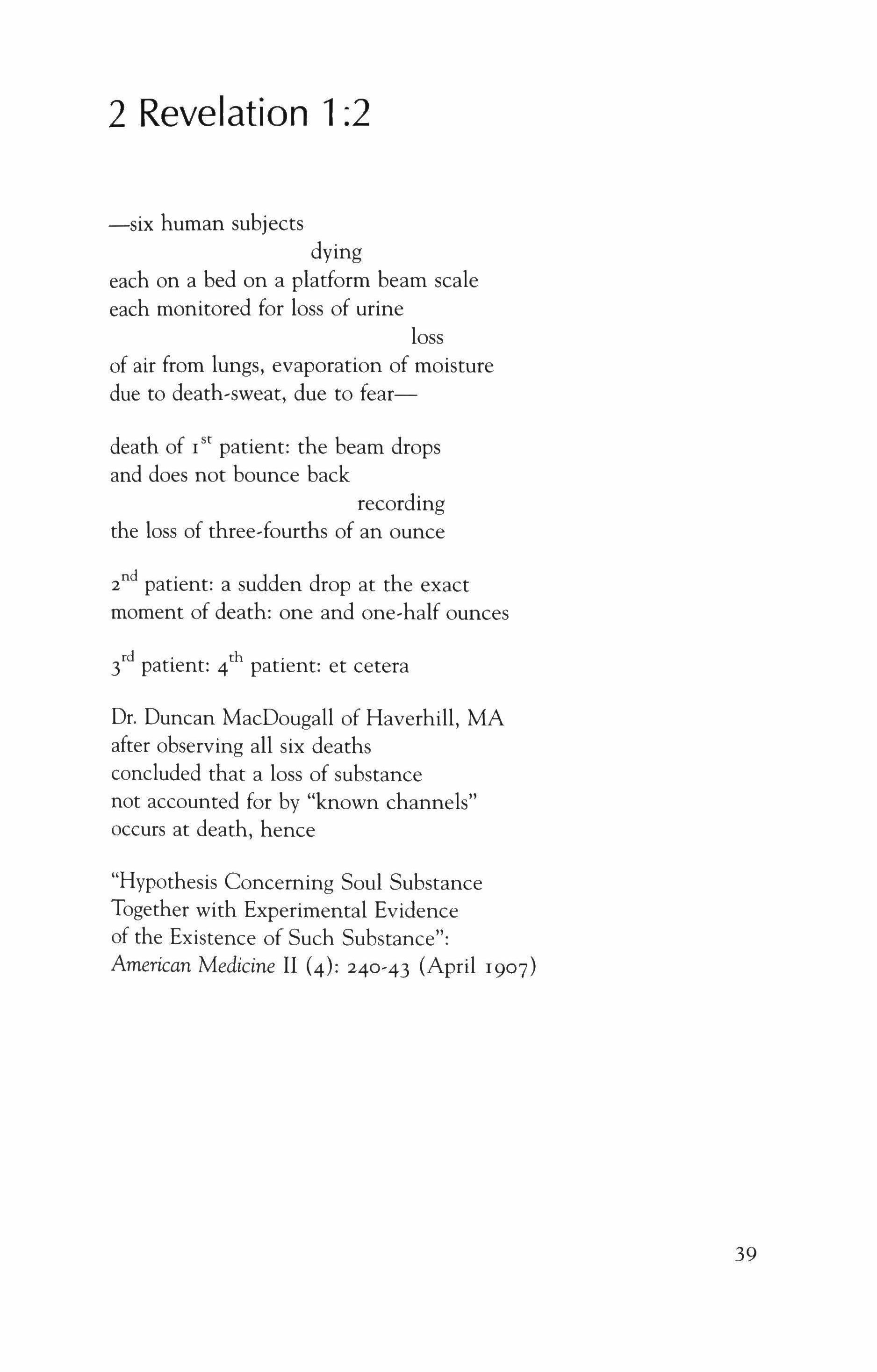
2 Revelation 1 :2
-six human subjects dying
each on a bed on a platform beam scale each monitored for loss of urine loss of air from lungs, evaporation of moisture due to death-sweat, due to feardeath of r" patient: the beam drops and does not bounce back recording the loss of three-fourths of an ounce
2nd patient: a sudden drop at the exact moment of death: one and one-half ounces rd. th 3 patient: 4 patient: et cetera
Dr. Duncan MacDougall of Haverhill, MA after observing all six deaths concluded that a loss of substance not accounted for by "known channels" occurs at death, hence
"Hypothesis Concerning Soul Substance Together with Experimental Evidence of the Existence of Such Substance": American Medicine II (4): 240-43 (April 1907)
39
Carol Frost
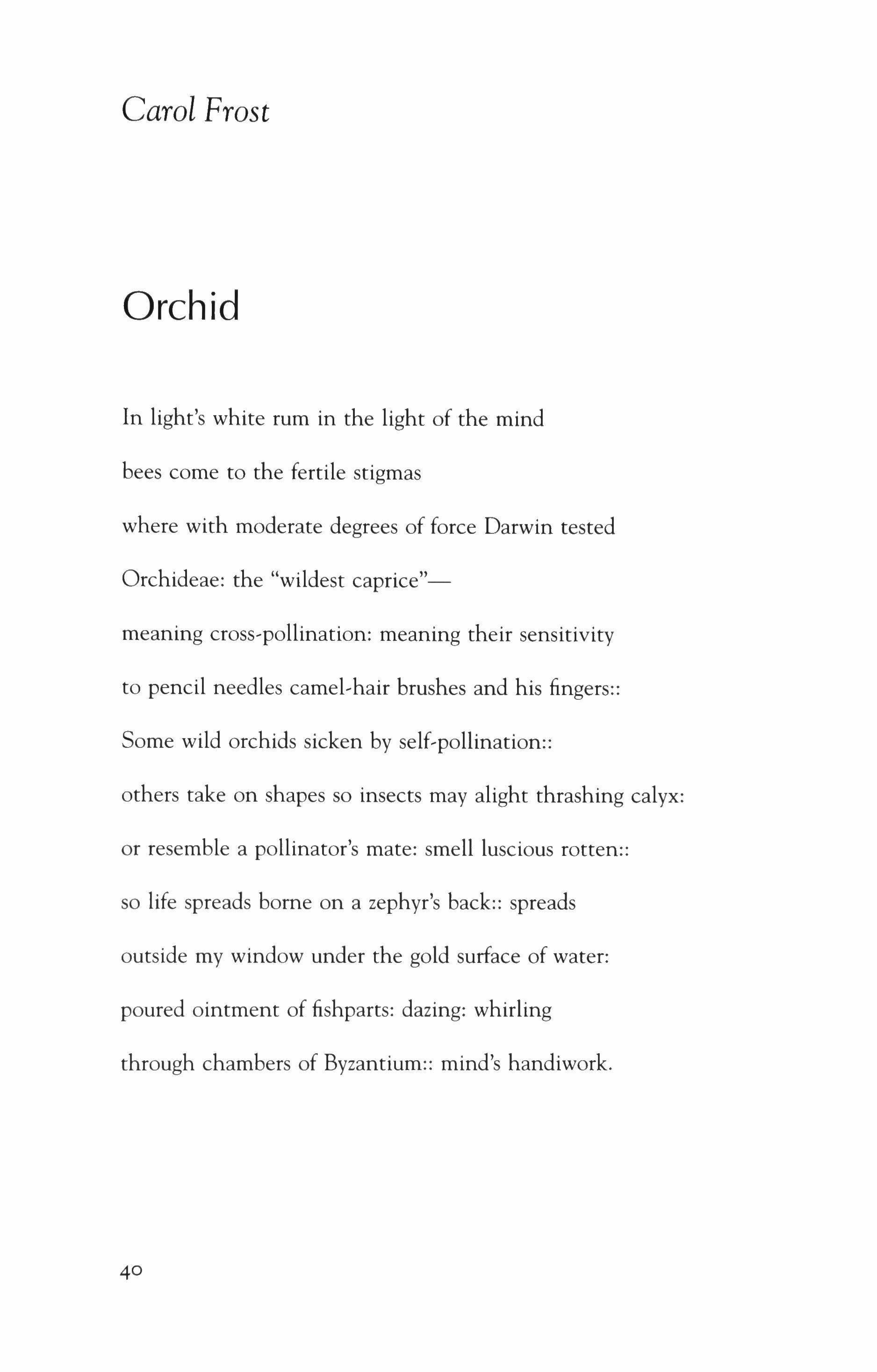
Orchid
In light's white rum in the light of the mind bees come to the fertile stigmas where with moderate degrees of force Darwin tested
Orchideae: the "wildest caprice"meaning cross-pollination: meaning their sensitivity to pencil needles camel-hair brushes and his fingers:: Some wild orchids sicken by self-pollination:: others take on shapes so insects may alight thrashing calyx: or resemble a pollinator's mate: smell luscious rotten:: so life spreads borne on a zephyr's back:: spreads outside my window under the gold surface of water: poured ointment of fishparts: dazing: whirling through chambers of Byzantium:: mind's handiwork.
Clam
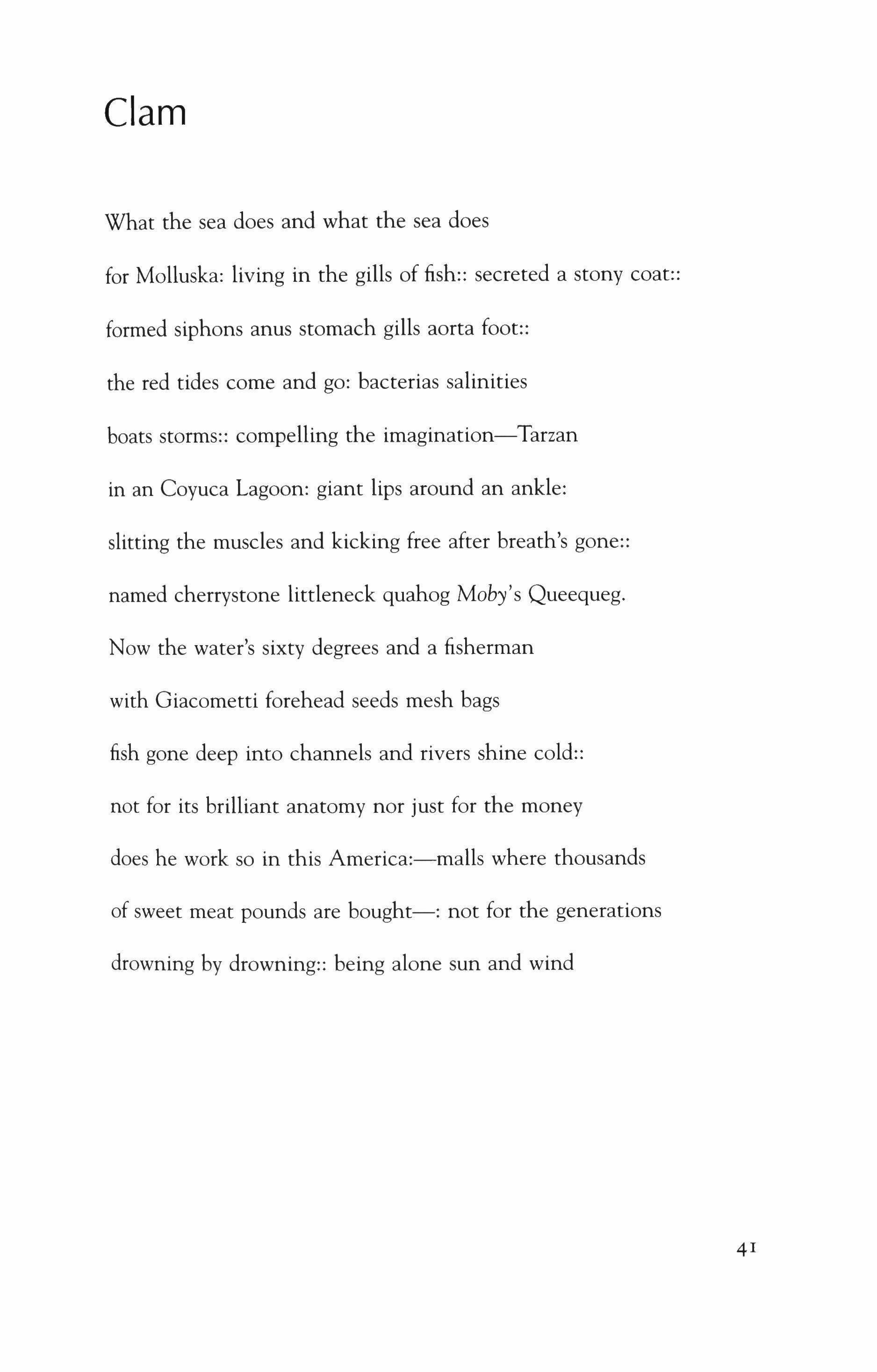
What the sea does and what the sea does for Molluska: living in the gills of fish:: secreted a stony coat:: formed siphons anus stomach gills aorta foot:: the red tides come and go: bacterias salinities boats storms:: compelling the imagination-Tarzan in an Coyuca Lagoon: giant lips around an ankle: slitting the muscles and kicking free after breath's gone:: named cherrystone littleneck quahog Moby's Queequeg.
Now the water's sixty degrees and a fisherman with Giacometti forehead seeds mesh bags fish gone deep into channels and rivers shine cold:: not for its brilliant anatomy nor just for the money does he work so in this America:-malls where thousands of sweet meat pounds are bought-: not for the generations drowning by drowning:: being alone sun and wind
41
Snake Key

Our sense of origin ourselves bedeviled:
Apollo Saturn: in the rose black garden Eve:: loving: killing:: labyrinthine the journey:: can't myth be left behind:: how it would be to start mid-kingdom:: standing by river water in marshes never colored by another's eyes: saurian ripple: flashing lances and silver spray of sunshine through eat's claw palmetto: flung paths to the coast:: Muir describes two Negroes in firelight as devils: they give him johnny cake: dire music of the ibis he recalls: there are malarias:: wind
still fevers the tide: a small skiff lifts over the bar to the outermost key: you can draw lime trees: you can collect sea-worn shells: you can count the snakes: you can: but there's no way only back where you were::
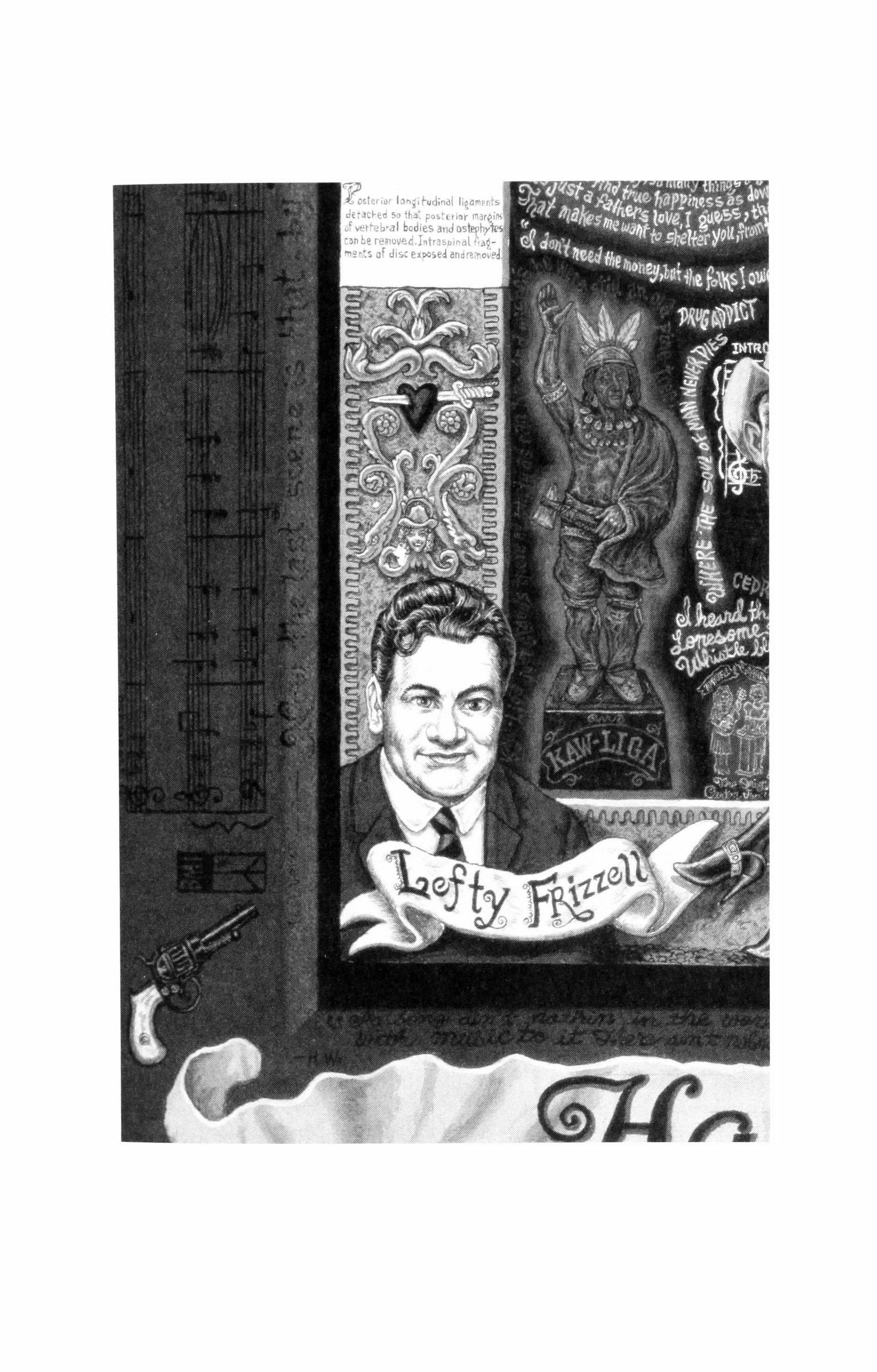
TodCriU, IOI'l�jhidjnal h�a�l'nts den'thd 50 1.h�: pOitUU't' fI1ar�iM d"",'eb-al bodies and osb>vhfli' c'n be reRloved.Intr".indl t.•�mE:r:ts of disc e,:(pO>ed andre;f!oveJ
Sarah Micklem

The Captive Chronologist
From Anticlimactic Folk Tales of Abigomas, collected and edited by Dr. Marcel Auerle
The captive horologists built a new tower and succeeded in making the clock run, after they had adjusted its astronomical parts for the change of latitude.
The Ancient Engineers, by L. Sprague de Camp, who is in no way responsible for the confabulations and fabrications in the following story.
The foremost chronologist of the Isle of Abigomas was bored. His every hour seemed to pass more slowly than the longest hour of the longest summer day, when one has plenty to do and no desire to do any of it. Thyodo had already made the finest clock in the world for his hometown of Lynka, and now he scorned such commissions as came his way, even as he executed them: middling clocks for middling places, with payment in flea-ridden fleeces or all the salt pork and fava beans he could eat for a twelvemonth. On such a diet he had been pared very thin indeed.
The clock was renowned throughout the Isle of Abigomas, but the island's inhabitants never gave a thought as to how its marvels were accomplished. Thyodo would gladly have boasted of the great water
44
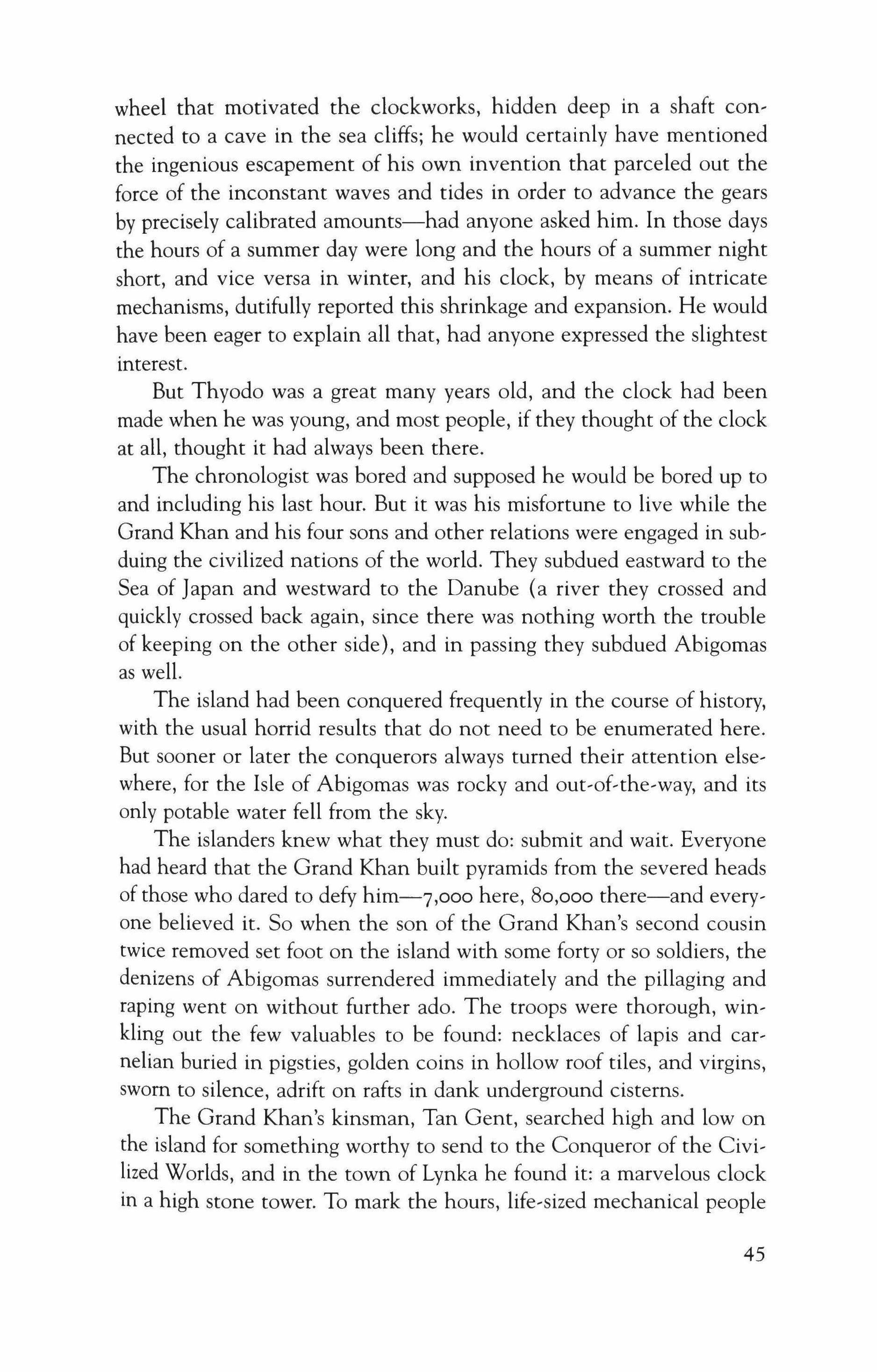
wheel that motivated the clockworks, hidden deep in a shaft con, nected to a cave in the sea cliffs; he would certainly have mentioned the ingenious escapement of his own invention that parceled out the force of the inconstant waves and tides in order to advance the gears by precisely calibrated amounts-had anyone asked him. In those days the hours of a summer day were long and the hours of a summer night short, and vice versa in winter, and his clock, by means of intricate mechanisms, dutifully reported this shrinkage and expansion. He would have been eager to explain all that, had anyone expressed the slightest interest.
But Thyodo was a great many years old, and the clock had been made when he was young, and most people, if they thought of the clock at all, thought it had always been there.
The chronologist was bored and supposed he would be bored up to and including his last hour. But it was his misfortune to live while the Grand Khan and his four sons and other relations were engaged in sub, duing the civilized nations of the world. They subdued eastward to the Sea of Japan and westward to the Danube (a river they crossed and quickly crossed back again, since there was nothing worth the trouble of keeping on the other side), and in passing they subdued Abigomas as well.
The island had been conquered frequently in the course of history, with the usual horrid results that do not need to be enumerated here. But sooner or later the conquerors always turned their attention else' where, for the Isle of Abigomas was rocky and out-of-the-way, and its only potable water fell from the sky.
The islanders knew what they must do: submit and wait. Everyone had heard that the Grand Khan built pyramids from the severed heads of those who dared to defy hirn-s-v.ooo here, 80,000 there-and every, one believed it. So when the son of the Grand Khan's second cousin twice removed set foot on the island with some forty or so soldiers, the denizens of Abigomas surrendered immediately and the pillaging and raping went on without further ado. The troops were thorough, win, kling out the few valuables to be found: necklaces of lapis and car, nelian buried in pigsties, golden coins in hollow roof tiles, and virgins, sworn to silence, adrift on rafts in dank underground cisterns.
The Grand Khan's kinsman, Tan Gent, searched high and low on the island for something worthy to send to the Conqueror of the Civilized Worlds, and in the town of Lynka he found it: a marvelous clock in a high stone tower. To mark the hours, life-sized mechanical people
45

emerged from the tower and twirled about on a platform high above the town square. Some struck tambourines, others played whistles, and one sang, every hour a different song. Tan Gent climbed round and round the spiral stairs to the very top of the tower, and there he beheld stars of pearl set into a dome of midnight-blue enamel; this firmament turned slowly upon the axis of the polar star, its motion nearly imperceptible save for the creaking of the gears. The sun, a golden lamp, made its way east to west on a revolving wheel, rising and setting at the horizon of the floor, and the wheel moved south or north according to the seasons. Another wheel carried a silver moon. Ruby planets wandered through the constellations of the zodiac. The floor, a mosaic map of the sea and its islands, with Abigomas quite naturally in the center, was cunningly suspended amidst the clockworks. Doves and bats had sprinkled it with droppings. Lovers had scattered chicken bones and greasy wrappings from their picnics, and smoky lamps had dimmed the sky's blue enamel, but this did not obscure the splendor of the clock in the eyes of Tan Gent.
Of course this clock was Thyodo's invention, and when he saw the soldiers scrambling up the tower and taking the clockworks to pieces, he screamed at them. It was fortunate that the soldiers took him for a madman, for they believed madmen were sacred and let them live, no matter how much of a nuisance they were.
Soon Thyodo understood that they were not stealing the jewels or the gold, silver, and bronze of his mechanism, but rather the whole device, and he set to chiding and scolding and bidding them to "Have a care, you dolt! You'll break it!" He felt obliged to begin dismantling the clock himself, lest it be damaged, and before another hour had paraded and sung, the chronologist came to the attention of Tan Gent. Thyodo made it known to him, with the help of an interpreter, that he had invented this marvelous clock {no better ever had been or ever could be made}, and it would never work again for there was not a man anywhere else on earth clever enough to reassemble it.
In no time Tan Gent took the chronologist captive, and sent the man and his clock, including every stone of the tower, to the Grand Khan as tribute. Thyodo's journey to the Grand Khan's summer encampment was tedious and dangerous. There is no need to dwell upon the seasickness and stenches, the bony camels, rude companions, and thieving beggars, the maggoty food, arid winds, and other torments he encountered before he came to the camp of the Grand Khan and was left there with the pieces of his clock in a heap, and not a word in

common with the ambassadors, astrologers, priests, prophets, saints, and soothsayers, not to mention the mountebanks and madmen, con, cubines, quacks, and chroniclers, who attended the Scourge of the Known Kingdoms-in short, the cream and flotsam of eight con' quered civilizations, for the Grand Khan collected people as well as plunder.
Soon Thyodo found himself, like his companions, subsisting on mice, marmots, and sheep's entrails, getting drunk by midday on the fermented mare's milk known as cosmos, and squatting by campfires of smoking horse dung in dust storms, his hands too idle, his tongue too industrious, having learned six or seven languages in which to quarrel about the nature of divinity or to wager on how long it would take the Khan's army to undermine the walls of such-and-such a city and behead its male inhabitants. Waiting for the Grand Khan to take notice.
Dreading that the Grand Khan might take notice.
The Grand Khan did not sleep above three hours a night, and accomplished more conquests in a month than most people dream of in a lifetime. He was a busy man, and yet he did not forget. Two years, three months and twenty days after arriving at his court, Thyodo received a summons to appear before him. Need I say that the chronologist's knees were knocking together, and his face was pale in spots and red in others, and sweat stained his filthy robe? The Grand Khan was used to all that, and he commanded Thyodo to rebuild his clock promptly, and gave him men and coins, as many as he could possibly need, to that end.
It would not do for the clock to reside in a fixed stone tower, for the Grand Khan had not given up his nomadic ways. Though he had by then founded his capital, with its mud brick and tall gates and endless palaces, he did not feel perfectly at ease inside any structure which was not circular, felt-covered, and capable of being picked up and moved from place to place-which was not, in other words, a yurt. He preferred his summer and winter camps, and besides was often out and about vanquishing people. Therefore Thyodo raised a clock tower of wood rather than stone, founding it not on solid earth, but rather on a wide cart such as the ones the Grand Khan's army used to carry the largest yurts from place to place. The cart had axles as thick as the masts of ships; twenty oxen strained their mightiest to draw it. The cartwheels turned the clockworks by means of Thyodo's escapement, and when the cart was parked, slaves provided the impetus instead, running inside a suspended wheel. Thyodo was a slave himself, though
47
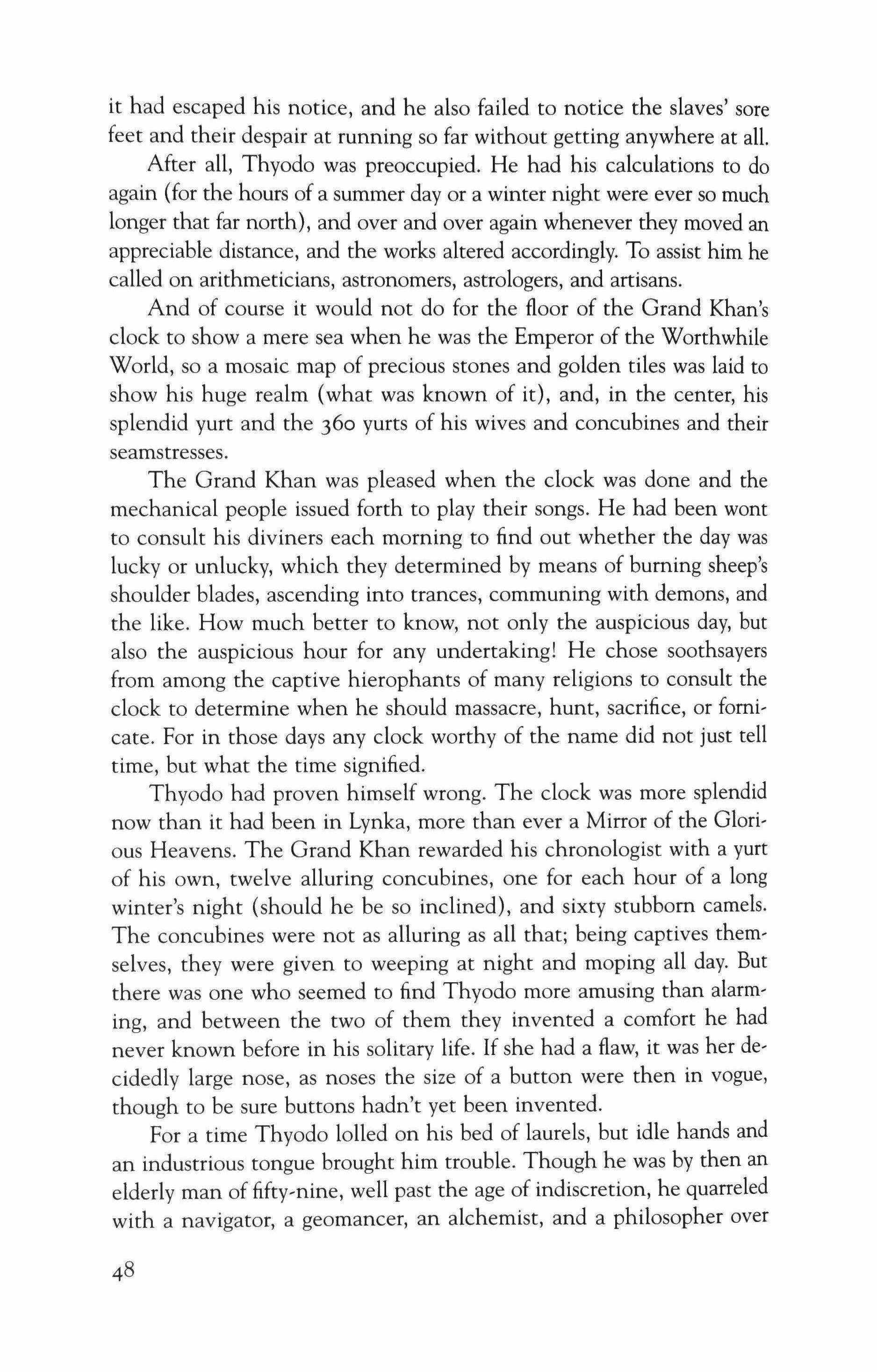
it had escaped his notice, and he also failed to notice the slaves' sore feet and their despair at running so far without getting anywhere at all.
After all, Thyodo was preoccupied. He had his calculations to do again (for the hours of a summer day or a winter night were ever so much longer that far north), and over and over again whenever they moved an appreciable distance, and the works altered accordingly. To assist him he called on arithmeticians, astronomers, astrologers, and artisans.
And of course it would not do for the floor of the Grand Khan's clock to show a mere sea when he was the Emperor of the Worthwhile World, so a mosaic map of precious stones and golden tiles was laid to show his huge realm (what was known of it), and, in the center, his splendid yurt and the 360 yurts of his wives and concubines and their seamstresses.
The Grand Khan was pleased when the clock was done and the mechanical people issued forth to play their songs. He had been wont to consult his diviners each morning to find out whether the day was lucky or unlucky, which they determined by means of burning sheep's shoulder blades, ascending into trances, communing with demons, and the like. How much better to know, not only the auspicious day, but also the auspicious hour for any undertaking! He chose soothsayers from among the captive hierophants of many religions to consult the clock to determine when he should massacre, hunt, sacrifice, or fornicate. For in those days any clock worthy of the name did not just tell time, but what the time signified.
Thyodo had proven himself wrong. The clock was more splendid now than it had been in Lynka, more than ever a Mirror of the Glorious Heavens. The Grand Khan rewarded his chronologist with a yurt of his own, twelve alluring concubines, one for each hour of a long winter's night (should he be so inclined), and sixty stubborn camels. The concubines were not as alluring as all that; being captives themselves, they were given to weeping at night and moping all day. But there was one who seemed to find Thyodo more amusing than alarming, and between the two of them they invented a comfort he had never known before in his solitary life. If she had a flaw, it was her decidedly large nose, as noses the size of a button were then in vogue, though to be sure buttons hadn't yet been invented.
For a time Thyodo lolled on his bed of laurels, but idle hands and an industrious tongue brought him trouble. Though he was by then an elderly man of fifty-nine, well past the age of indiscretion, he quarreled with a navigator, a geomancer, an alchemist, and a philosopher over

the nature of Time. The navigator held that Time moved in a circle, and in another 5,667 years everything would begin again, and in 1,533 more years they would all be sitting around the fire and making exactly the same arguments; the geomancer claimed Time proceeded in a helix, offering as proof the seasons, which always returned but were never exactly the same; the alchemist postulated that Time would go on in a straight line until it reached its end when man was perfected, which he calculated would occur in 777 years; the philosopher argued that Time did not exist, for nothing ever changed, and all notions to the contrary were illusions. Thyodo set out to prove that Time was complete and unmoving; it held every moment that ever had been and ever would be, and we merely crept along it like ants on a long blade of grass, unable to see the beginning or the end. In the ensuing brawl, the philosopher died, pierced by Thyodo's blade, which was not at all illusory. The chronologist was sorely wounded by the geomancer, and he languished on a bed of lamb's wool while his injuries healed and his concubines nourished him on cosmos from the Grand Khan's own mares. It was summer and the hours were long. Flies buzzed about Thyodo's yurt and settled in the corners of his eyes, and his favorite concubine occasionally waved her hand to send them buzzing away again. He had time and more time and more and more time to mull over the splendor and cruelty of the Grand Khan. He was not angry with his master. What use? One might as well be angry at an earthquake or a gale. Still, he hoped his dearest great-niece had escaped ravishment, and that his amiable sister still sat at her loom, weaving the softest woolens on the island. He thought of the town of Lynka fondly, more fondly than when he lived there, and wondered if anyone had fed his cats. He waited upon the song of the clock to tell him another hour had passed, and the song didn't come. Time, which sometimes had seemed to rush by (as a road rushes by under the wheels of a jiffy drawn by fast horses), and sometimes to dawdle, now stood still. Or he stood still in it. How many breaths to an hour, how many heartbeats to a breath? It occurred to Thyodo that an hour could be divided into intervals, and each of those intervals subdivided, and those subdivisions divided and so on and on. Was there a smallest instant, the tiniest possible iota of duration? Or was Time infinitely divisible? If he were slow enough, or maybe fast enough, he might pass the time, not from one moment to the next, but from one moment to the next smallest, and thereby experience eternity in an hour. The concubine dozed; the flies dozed. Thyodo's breathing slowed and still the clock did not sound.
49
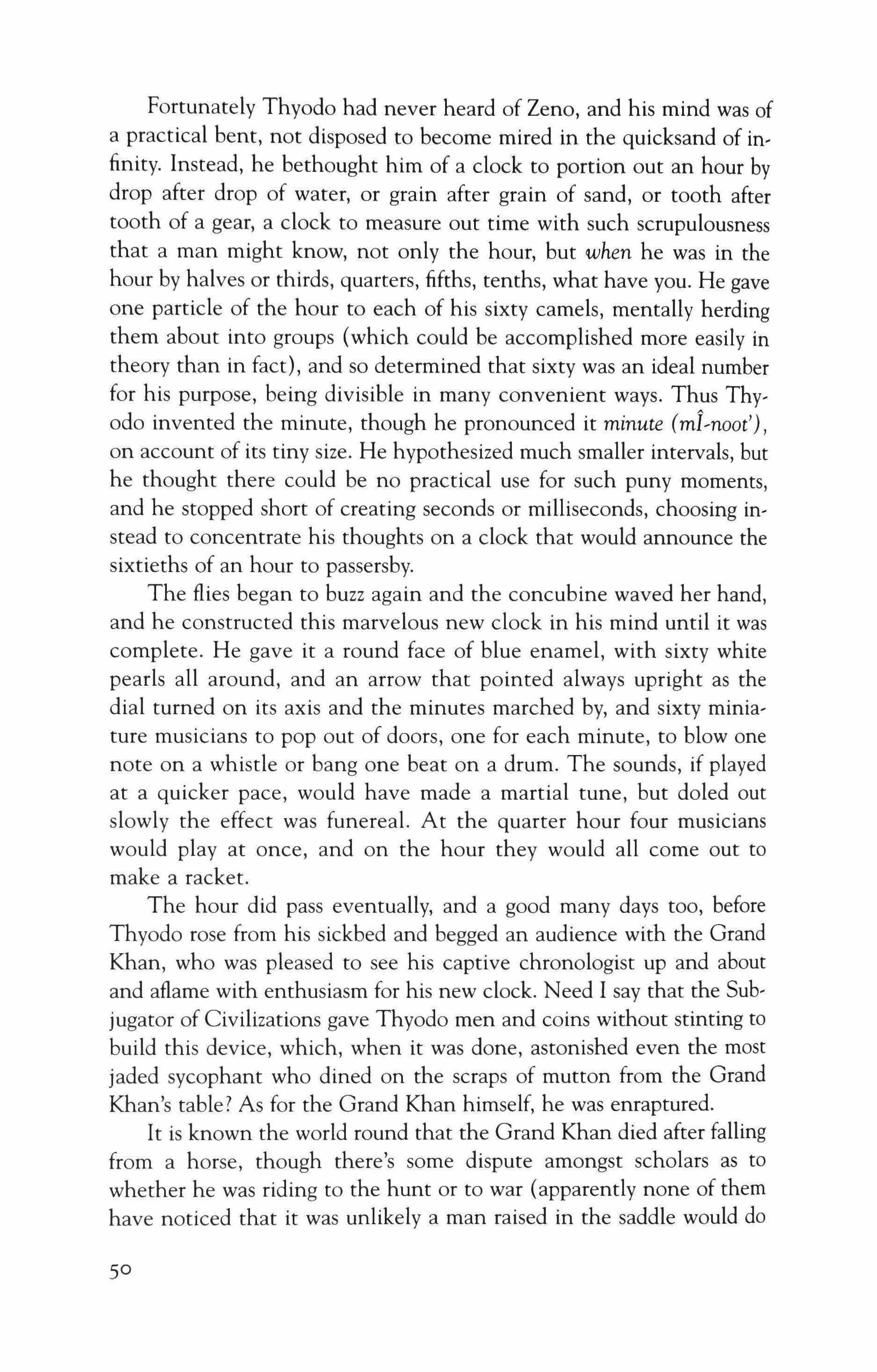
Fortunately Thyodo had never heard of Zeno, and his mind was of a practical bent, not disposed to become mired in the quicksand of infinity. Instead, he bethought him of a clock to portion out an hour by drop after drop of water, or grain after grain of sand, or tooth after tooth of a gear, a clock to measure out time with such scrupulousness that a man might know, not only the hour, but when he was in the hour by halves or thirds, quarters, fifths, tenths, what have you. He gave one particle of the hour to each of his sixty camels, mentally herding them about into groups (which could be accomplished more easily in theory than in fact), and so determined that sixty was an ideal number for his purpose, being divisible in many convenient ways. Thus Thyodo invented the minute, though he pronounced it minute (mI-noot'), on account of its tiny size. He hypothesized much smaller intervals, but he thought there could be no practical use for such puny moments, and he stopped short of creating seconds or milliseconds, choosing instead to concentrate his thoughts on a clock that would announce the sixtieths of an hour to passersby.
The flies began to buzz again and the concubine waved her hand, and he constructed this marvelous new clock in his mind until it was complete. He gave it a round face of blue enamel, with sixty white pearls all around, and an arrow that pointed always upright as the dial turned on its axis and the minutes marched by, and sixty miniature musicians to pop out of doors, one for each minute, to blow one note on a whistle or bang one beat on a drum. The sounds, if played at a quicker pace, would have made a martial tune, but doled out slowly the effect was funereal. At the quarter hour four musicians would play at once, and on the hour they would all come out to make a racket.
The hour did pass eventually, and a good many days too, before Thyodo rose from his sickbed and begged an audience with the Grand Khan, who was pleased to see his captive chronologist up and about and aflame with enthusiasm for his new clock. Need I say that the Subjugator of Civilizations gave Thyodo men and coins without stinting to build this device, which, when it was done, astonished even the most jaded sycophant who dined on the scraps of mutton from the Grand Khan's table? As for the Grand Khan himself, he was enraptured.
It is known the world round that the Grand Khan died after falling from a horse, though there's some dispute amongst scholars as to whether he was riding to the hunt or to war (apparently none of them have noticed that it was unlikely a man raised in the saddle would do
50
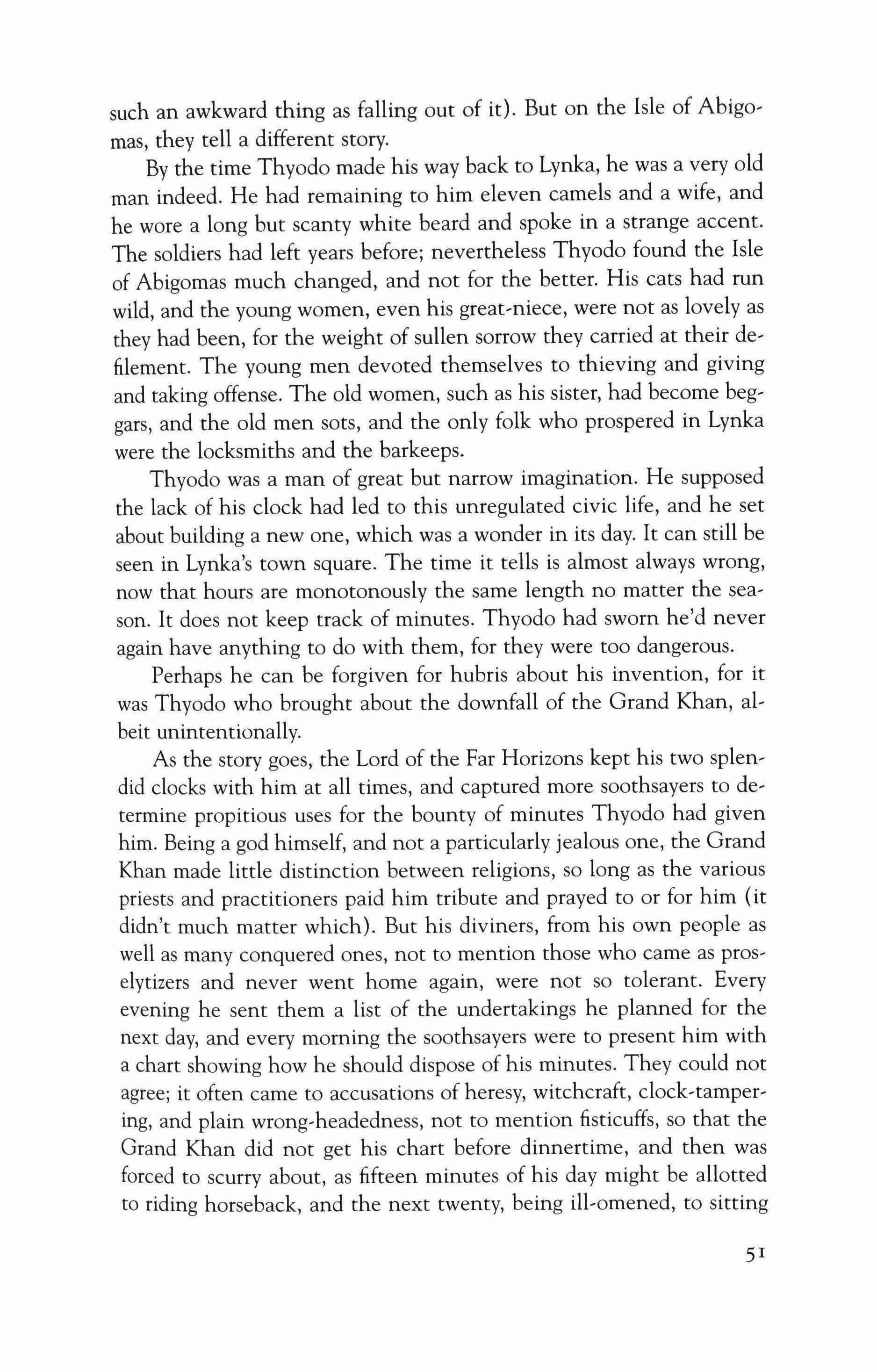
such an awkward thing as falling out of it}. But on the Isle of Abigomas, they tell a different story.
By the time Thyodo made his way back to Lynka, he was a very old man indeed. He had remaining to him eleven camels and a wife, and he wore a long but scanty white beard and spoke in a strange accent. The soldiers had left years before; nevertheless Thyodo found the Isle of Abigomas much changed, and not for the better. His cats had run wild, and the young women, even his great-niece, were not as lovely as they had been, for the weight of sullen sorrow they carried at their defilement. The young men devoted themselves to thieving and giving and taking offense. The old women, such as his sister, had become beggars, and the old men sots, and the only folk who prospered in Lynka were the locksmiths and the barkeeps.
Thyodo was a man of great but narrow imagination. He supposed the lack of his clock had led to this unregulated civic life, and he set about building a new one, which was a wonder in its day. It can still be seen in Lynka's town square. The time it tells is almost always wrong, now that hours are monotonously the same length no matter the season. It does not keep track of minutes. Thyodo had sworn he'd never again have anything to do with them, for they were too dangerous.
Perhaps he can be forgiven for hubris about his invention, for it was Thyodo who brought about the downfall of the Grand Khan, albeit unintentionally.
As the story goes, the Lord of the Far Horizons kept his two splendid clocks with him at all times, and captured more soothsayers to determine propitious uses for the bounty of minutes Thyodo had given him. Being a god himself, and not a particularly jealous one, the Grand Khan made little distinction between religions, so long as the various priests and practitioners paid him tribute and prayed to or for him (it didn't much matter which). But his diviners, from his own people as well as many conquered ones, not to mention those who came as proselytizers and never went home again, were not so tolerant. Every evening he sent them a list of the undertakings he planned for the next day, and every morning the soothsayers were to present him with a chart showing how he should dispose of his minutes. They could not agree; it often came to accusations of heresy, witchcraft, clock-tampering, and plain wrong-headedness, not to mention fisticuffs, so that the Grand Khan did not get his chart before dinnertime, and then was forced to scurry about, as fifteen minutes of his day might be allotted to riding horseback, and the next twenty, being ill-omened, to sitting
51

safe in his yurt, and then twelve to meeting ambassadors from backward reaches of the world, such as Paris, and so forth. His night too was broken into smallish pieces: five minutes in the third hour after midnight deemed beneficial for impregnating his twentieth wife, followed by forty minutes in which he would surely dream a prophetic dream, and yet he must stay awake for the next ten, lest a nightmare come calling.
The Grand Khan was the hardiest of a hardy people. He could ride day and night, through four changes of mount, and then bind a cloth tight about his ribs to keep him upright and ride another day and night. He could live on the blood and milk of his horses, and his horses could live on the scantiest of grasses, and so he and his herds and his army never gave much thought to provisions. Some chronicles maintained that they lived on air.
But the Grand Khan, who had never yet been defeated for long, was defeated for good by his new regimen. He went from fatigue to weariness to a peevish and listless exhaustion. The chase lost its savor when he must hunt three quarters of an hour but no longer, lest he come upon an unfortunate minute while on horseback. His wives and concubines complained, and bribed the diviners in order to receive more {or less} of his attention. The Ruler of Far-Flung Lands discovered that the smaller his time was minced, the less he seemed to have of it. Moment by moment he was diminished from a great man to a petty one, until, in an unlucky hour that the soothsayers failed to predict, he succumbed to a surfeit of minutiae. He was the first person on earth to have done so, but by no means the last.
His sons and grandsons went on conquering without him. Then they fell out, and the empire divided and subdivided again until what was left of it no longer recognized itself. But that's neither here nor there.
If an Abigoman tells you this tale, you will see him shrug when he reaches the end, as if to say, "I know you won't believe it, but there it is." And if you then wonder aloud what became of Thyodo, the storyteller will take you to see his grave, which lies under weeds and an everlasting bronze sundial. The sundial can no longer do its work, being overshadowed by a spreading yew and twelve tall cypresses. If you ask, politely, why the grave is untended, your guide will shrug again. Presumably Thyodo does not mind, for he no longer creeps along the weary road of Time, but rests in eternity. And presumably Time takes no notice of whether we measure it or not-any argument to the contrary is the province of theoreticians, not collectors of tales.
Meena Alexander
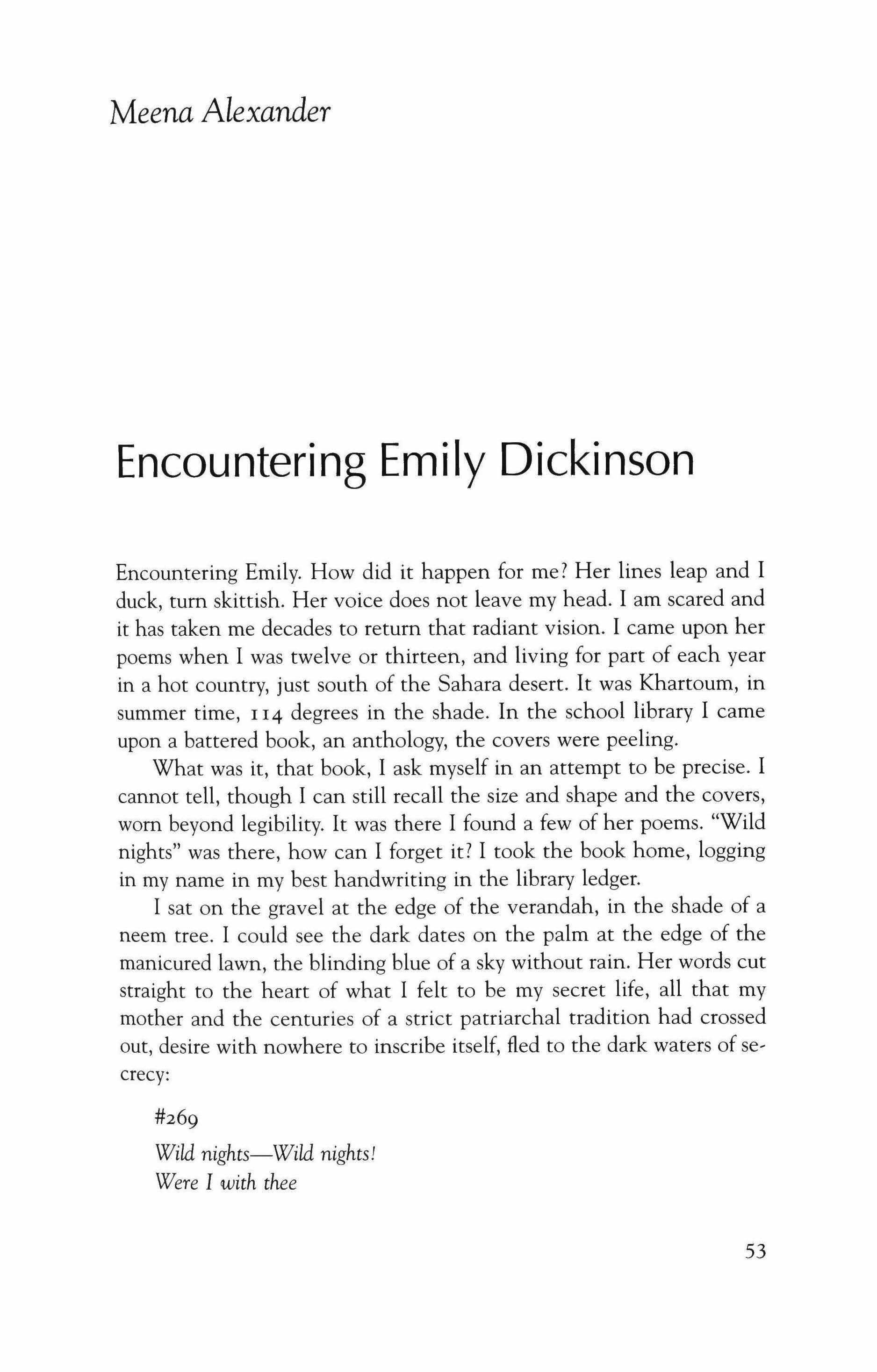
Encountering Emily Dickinson
Encountering Emily. How did it happen for me? Her lines leap and I duck, tum skittish. Her voice does not leave my head. I am scared and it has taken me decades to return that radiant vision. I came upon her poems when I was twelve or thirteen, and living for part of each year in a hot country, just south of the Sahara desert. It was Khartoum, in summer time, 114 degrees in the shade. In the school library I came upon a battered book, an anthology, the covers were peeling.
What was it, that book, I ask myself in an attempt to be precise. I cannot tell, though I can still recall the size and shape and the covers, worn beyond legibility. It was there I found a few of her poems. "Wild nights" was there, how can I forget it? I took the book home, logging in my name in my best handwriting in the library ledger.
I sat on the gravel at the edge of the verandah, in the shade of a neem tree. I could see the dark dates on the palm at the edge of the manicured lawn, the blinding blue of a sky without rain. Her words cut straight to the heart of what I felt to be my secret life, all that my mother and the centuries of a strict patriarchal tradition had crossed out, desire with nowhere to inscribe itself, fled to the dark waters of secrecy:
#269
Wild nights-Wild nights! Were I with thee
53

Wild nights should be Our luxury!
Futile-the winds
To a Heart in port
Done with compass
Done with the chart!
Rowing in Eden
Ah-the Sea!
Might I but moor-tonight
In thee! 1
"Futile-the Winds." I loved the pause there, after the word "futile," and I murmured the words to myself, they entered my inner ear. I learned that poem by heart. I was used to learning poems by heart, Wordsworth, Verlaine, Shelley, Rimbaud, all manner of lyrics that my strict colonial education led me to, in the girl's school that housed my early years. And Emily Dickinson's poems seemed so well suited for "by hearting," as it was called in that other life I had led in India, where a portion of a good upbringing was learning to memorize the classic, bits of Tagore, Vallathol, Mirabai, Psalms from the Bible.
Though Dickinson as an American poet had played no part in the classical world that was laid out for me as an inheritance, and perhaps even in part because of this lack, I clung to her. She was my secret. I glimpsed the life of a grown girl forced to tum inwards, in a poise so fierce that it fled what commonly passed for decorum. And through her I touched a lyricism that imploded the bounding lines of grammar.
I say this for in those early years when I wanted so very much to be a poet, and nothing but, the peculiar fixity of a given language seemed to be designed quite precisely to keep me from myself.
In my dreams, much as a swimmer might, I dove under the dividing lines of languages, Malayalam my mother tongue, Hindi, English, French, Arabic and then I swam very fast. And Emily was my secret swimming companion.
Now there was no way I could possibly have formulated what passed through my head in the way I have put it down here. Far from it, but these were truths dimly sensed. So true, though I had no words for them. In those days, my great concerns were how to escape my mother's designs to lead me into life through the portals of an arranged marriage, and my father's designs to teach me the truths of Newtonian
54
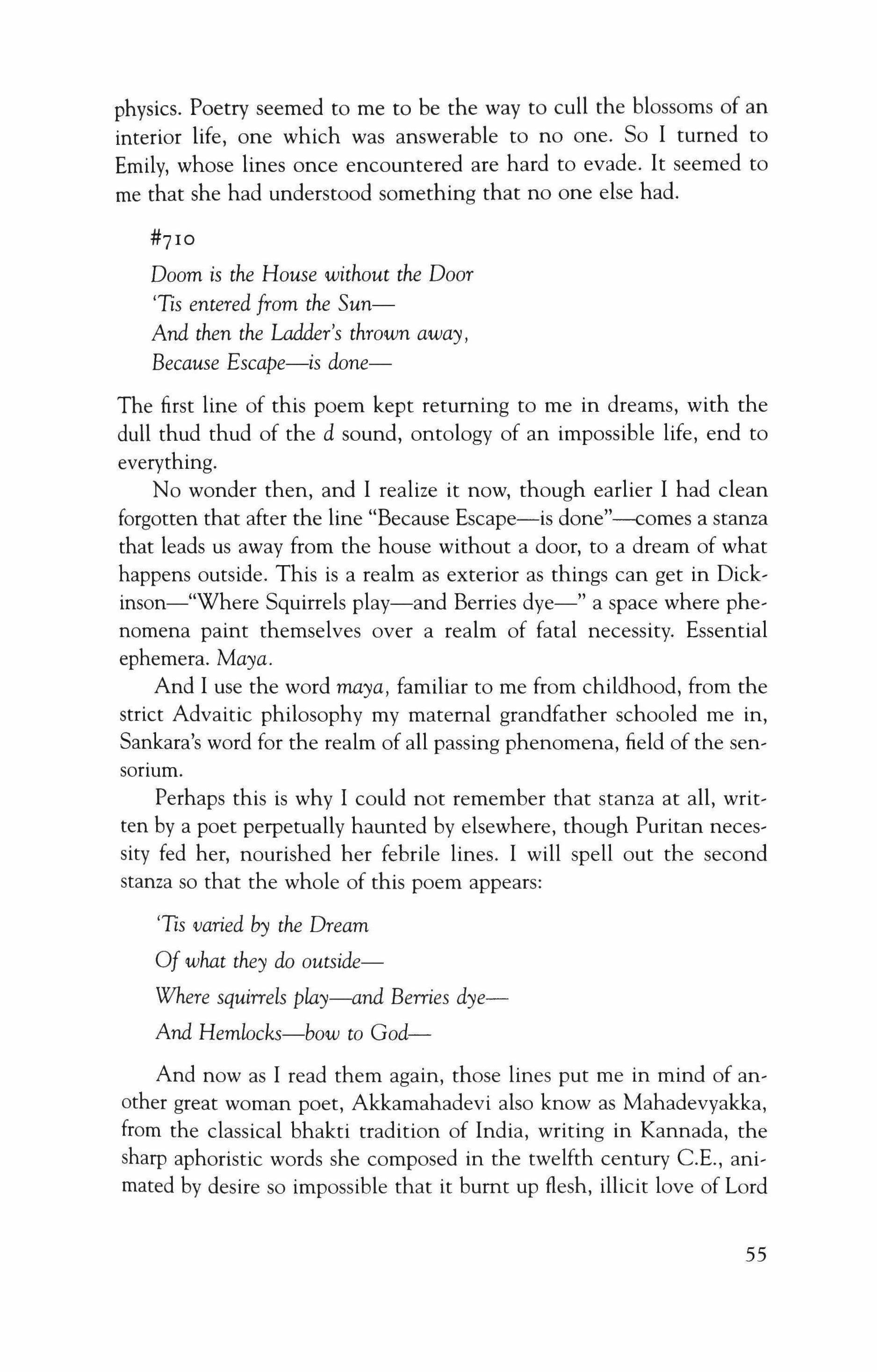
physics. Poetry seemed to me to be the way to cull the blossoms of an interior life, one which was answerable to no one. So I turned to Emily, whose lines once encountered are hard to evade. It seemed to me that she had understood something that no one else had.
#710
Doom is the House without the Door
'Tis entered from the Sun-
And then the LuU1er's thrown away, Because Escape-is done-
The first line of this poem kept returning to me in dreams, with the dull thud thud of the d sound, ontology of an impossible life, end to everything.
No wonder then, and I realize it now, though earlier I had clean forgotten that after the line "Because Escape-is done"-comes a stanza that leads us away from the house without a door, to a dream of what happens outside. This is a realm as exterior as things can get in Dick, inson-"Where Squirrels play-and Berries dye-" a space where phenomena paint themselves over a realm of fatal necessity. Essential ephemera. Maya.
And I use the word maya, familiar to me from childhood, from the strict Advaitic philosophy my maternal grandfather schooled me in, Sankara's word for the realm of all passing phenomena, field of the sen, sorium.
Perhaps this is why I could not remember that stanza at all, writ, ten by a poet perpetually haunted by elsewhere, though Puritan necessity fed her, nourished her febrile lines. I will spell out the second stanza so that the whole of this poem appears:
'Tis varied by the Dream
Of what they do outside-
Where squirrels play-and Berries dye
And Hemlocks-bow to God-
And now as I read them again, those lines put me in mind of an, other great woman poet, Akkamahadevi also know as Mahadevyakka, from the classical bhakti tradition of India, writing in Kannada, the sharp aphoristic words she composed in the twelfth century C.E., ani, mated by desire so impossible that it burnt up flesh, illicit love of Lord
55
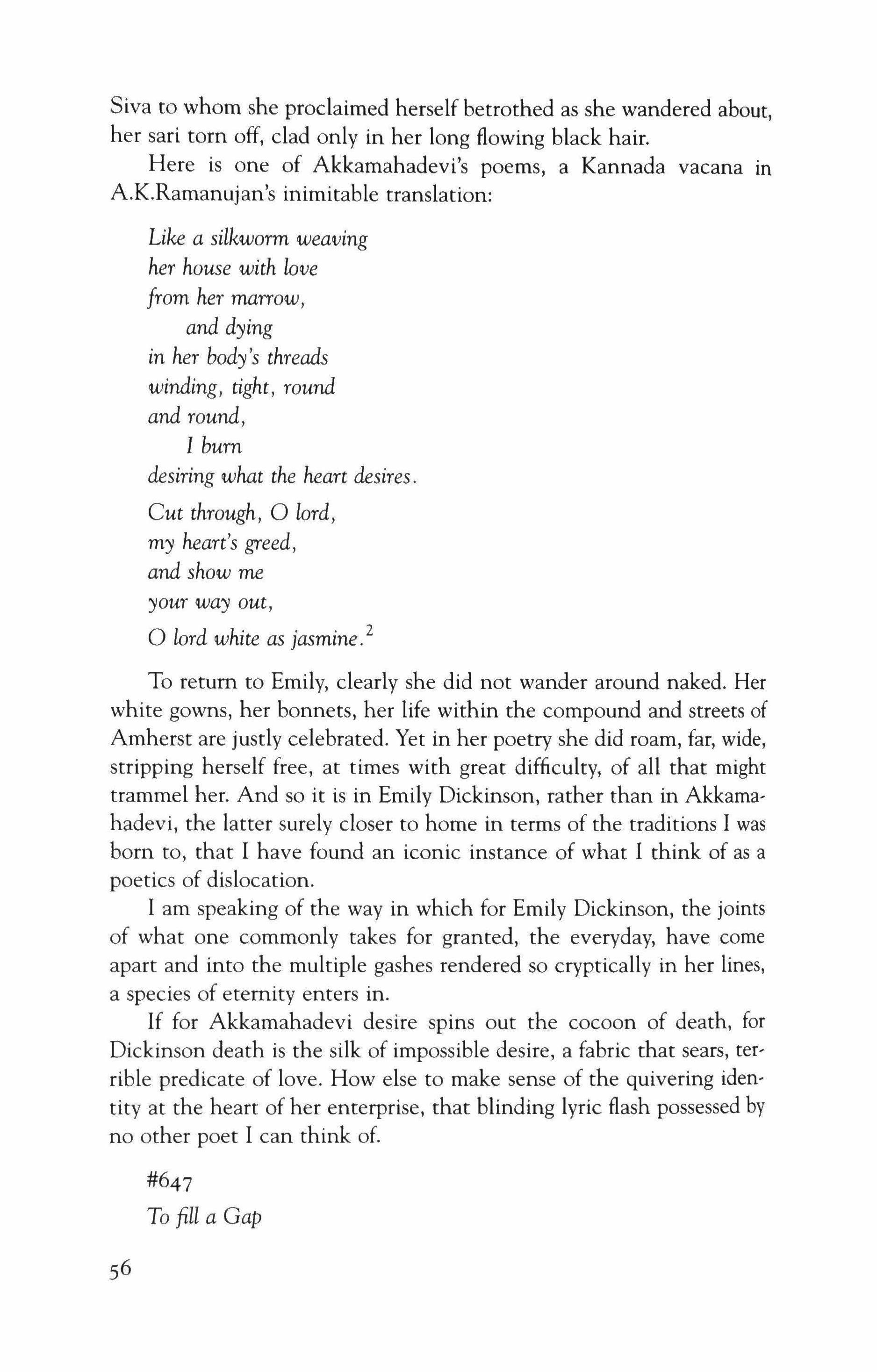
Siva to whom she proclaimed herself betrothed as she wandered about, her sari torn off, clad only in her long flowing black hair.
Here is one of Akkamahadevi's poems, a Kannada vacana in A.K.Ramanujan's inimitable translation:
Like a silkworm weaving her house with love from her marrow, and dying in her body's threads winding, tight, round and round, I bum desiring what the heart desires.
Cut through, 0 lord, my heart's greed, and show me your way out, o lord white as jasmine. Z
To return to Emily, clearly she did not wander around naked. Her white gowns, her bonnets, her life within the compound and streets of Amherst are justly celebrated. Yet in her poetry she did roam, far, wide, stripping herself free, at times with great difficulty, of all that might trammel her. And so it is in Emily Dickinson, rather than in Akkamahadevi, the latter surely closer to home in terms of the traditions I was born to, that I have found an iconic instance of what I think of as a poetics of dislocation.
I am speaking of the way in which for Emily Dickinson, the joints of what one commonly takes for granted, the everyday, have come apart and into the multiple gashes rendered so cryptically in her lines, a species of eternity enters in.
If for Akkamahadevi desire spins out the cocoon of death, for Dickinson death is the silk of impossible desire, a fabric that sears, terrible predicate of love. How else to make sense of the quivering identity at the heart of her enterprise, that blinding lyric flash possessed by no other poet I can think of.
#647
To fill a Gap
Insert the thing that caused itBlock it up
With other-and twill yawn the more
You cannot solder an Abyss with Air.
All that is solid peels away and the soul is left haunted by an unerring sense of what she calls elsewhere "the bright Absentee" first cousin surely to Mallarme's "Absente de tous bouquets."
To round off, I tum to a few lines composed by Emily Dickinson in 1862, just a year after "Wild Nights," a poem in which the present ex, ists as a figment, a slash of light without which we could not live, and underpinning it, a spiritual longing touched by despair, rendering an art of extremity as sharp and clear as anything the mortal mind is capable of conceiving. As I read the poem again I think of how these lines have an eerie connection to our lives at the edge of the twenty, first century. They seem to me, utterly contemporary.
There is a journey, she calls it "our journey" and almost at a fork in the road where eternity starts, the speaker halts. Before the cities which one imagines filled with people, comes the "Forest of the Dead." No explanation is given, for this strange and yet seemingly natural tum of topology in a time of war.
#453
Retreat--was out of Hope
Behind-a Sealed Route
Eternity's White Flag-BeforeAnd God-at every Gate
In a mystical transformation, wounds have turned into gates, sites of perpetual surrender, portals to divinity.
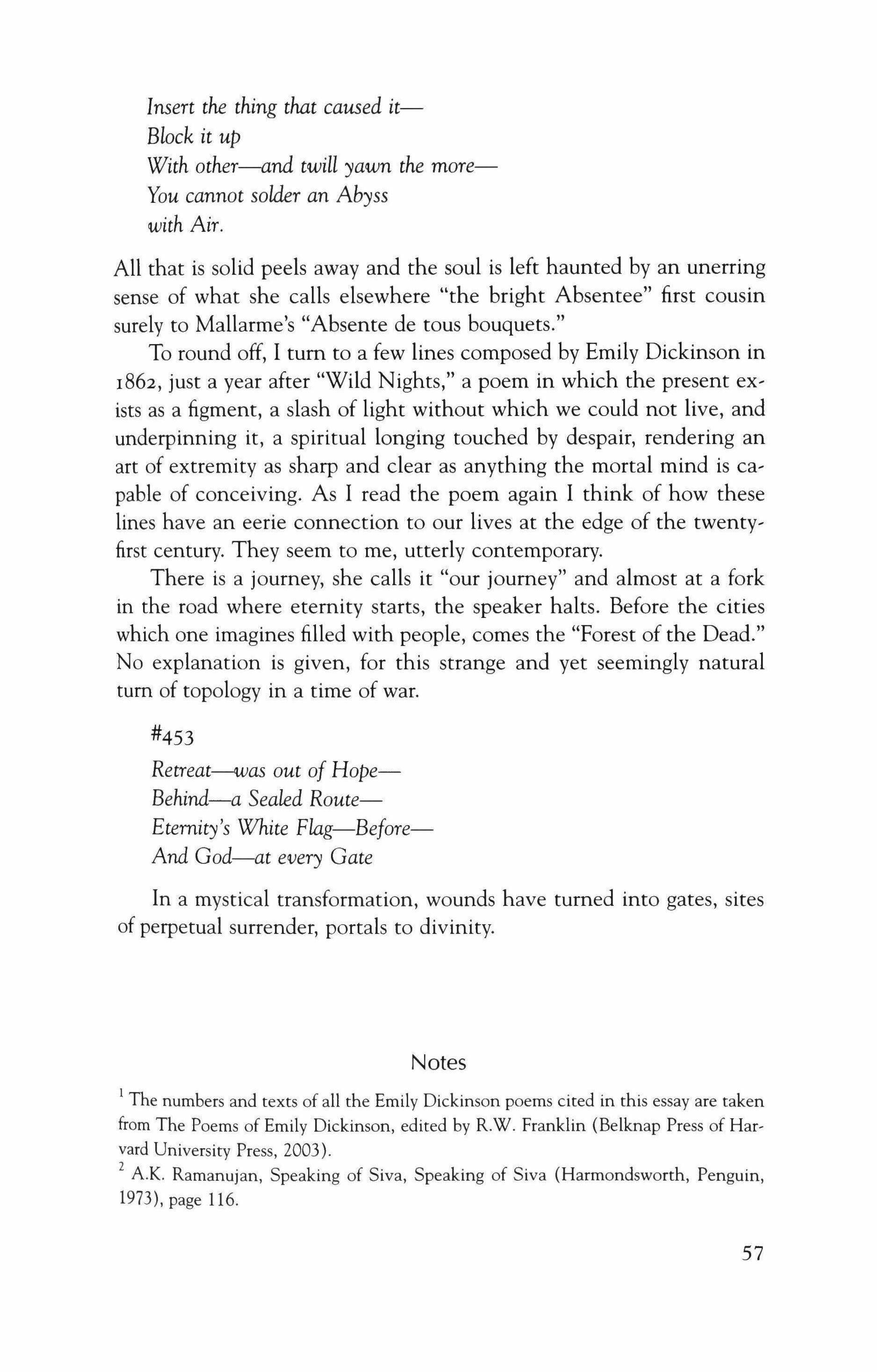
Notes
I The numbers and texts of all the Emily Dickinson poems cited in this essay are taken from The Poems of Emily Dickinson, edited by R.W. Franklin (Belknap Press of Harvard University Press, 2003).
2 A.K. Ramanujan, Speaking of Siva, Speaking of Siva (Harmondsworth, Penguin, 1973), page 116.
57
from Fragile Places: A Poet's Notebook

Triptych in a Time of War
I searched on the Internet for lines by Enheduanna, the great poet of Mesopotamia, the first poet in recorded history. Afterwards, I could not bear the windowless office I had been given at the Graduate Center and so I walked up to the eighth floor atrium and opened my eyes and on a high wall saw the Dove of Tanna, Frank Stella's piece filled with light. I had first seen the image, in that way, at that angle, lit by the sun, a week or so earlier when David Harvey had addressed a few of us and listening to his words I had turned my eyes to the bright talisman of peace on the wall.
Back in my office I wrote lines in which I felt the beginnings of a poem. But because the printer in the English Department was out of order I emailed the lines to myself so that I could retrieve them in the safety of my home. Later as I sat and wrote I thought of bombs that burst roofs and walls, a woman poet who did not have the luxury of sitting at her desk and writing, a poet flung out of her home, forced to cross the shattered street. This is some part of the email I sent myself. There is in it, I think, some impatience with myself and also some real awareness of the limits of the poem.
Friday March 07,2003,4:26 pm
Dear Meena
you are not so far today. why must you email these messages ,as ifpen and paper were hard to find, or a printer. On the Dove of Tanna the artist cut up bits of aluminum and painted them over into the dove's tail, the arrow's flight, the green bough that signifies the lifting of the waters While you're at it why not think of the door you have opened, perhaps portal would be a better word, onto the layering offragile places whose petals spurt scents from Paris and Istanbul and Rome. Or blood spurting from the cut aorta. Wrapping it in raw silk will do no good The rest of the email contains lines that incorporate what was to come, lines I had to sculpt into shape to make the bare bones of the poem I began in the building 365 Fifth Avenue.'
58

May 18, 2003. I went to the Met to see the First Cities exhibit. The darkness of the silk that draped the walls sent out a pervasive gloom, but the ancient artifacts, bird and spouted vessel and golden ram prancing in a flowering thicket snared the heart.
I found myself in a comer of an inner room and there in front of me was an alabaster disc. Its thickness amazed me, at least six inches in depth, that creamy stone onto which was cut the figure and face of Enheduanna, leading the array of priests, an image I had only seen on the Internet. Without knowing what I was doing I made the sign of the cross, an instinctive thing I have carried with me from early childhood, a sign I make in the presence of something sacred. As if in a dream I gazed at her face, the cheekbones scooped away, damage hurting her throat but the profile incised there, the hands held out, the precious poem.
I took my friend Gauri to face the alabaster disc and I said to her, I will stand here to take darshan. And I stood there for a long time.
59
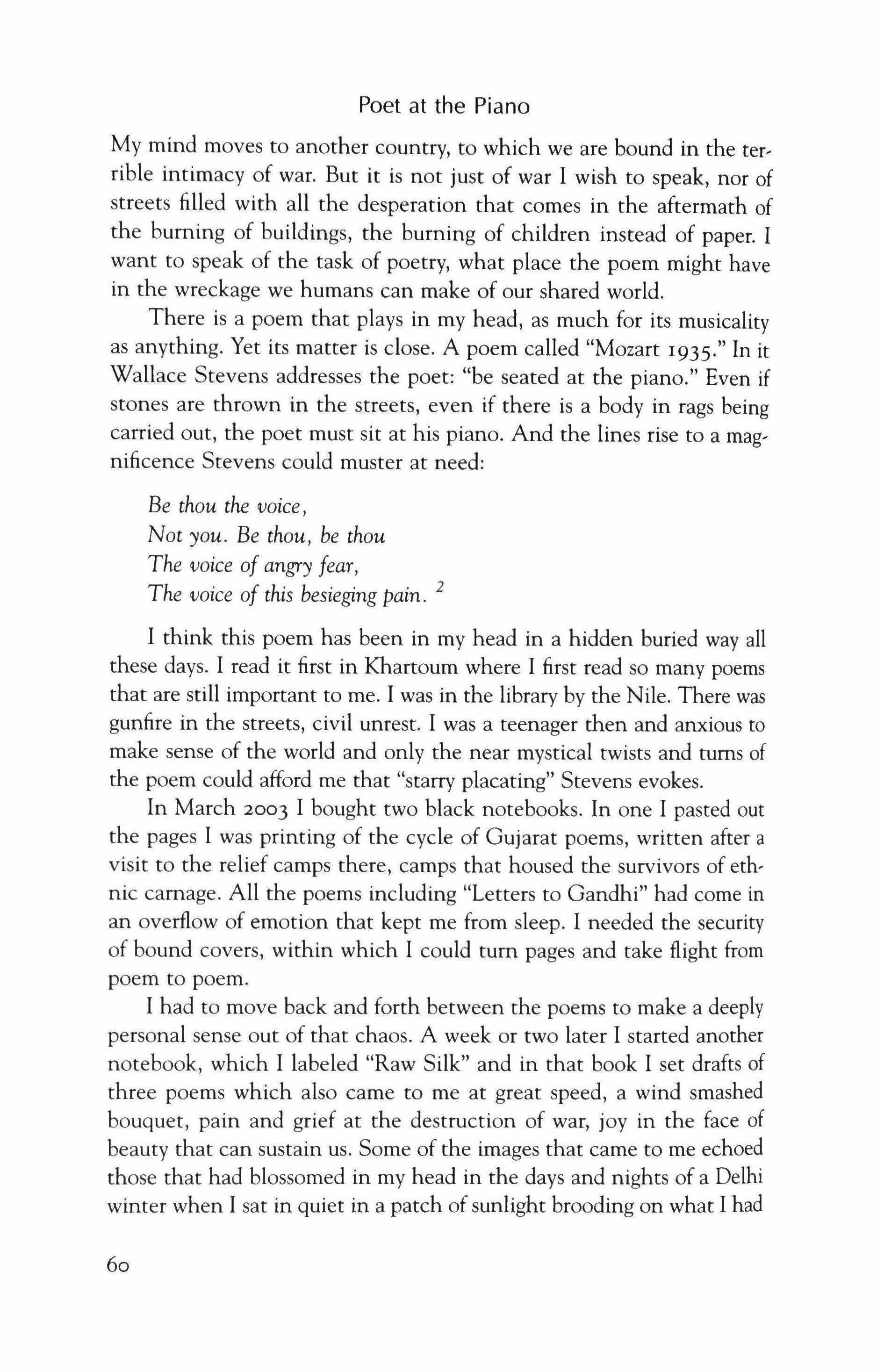
Poet at the Piano
My mind moves to another country, to which we are bound in the terrible intimacy of war. But it is not just of war I wish to speak, nor of streets filled with all the desperation that comes in the aftermath of the burning of buildings, the burning of children instead of paper. I want to speak of the task of poetry, what place the poem might have in the wreckage we humans can make of our shared world.
There is a poem that plays in my head, as much for its musicality as anything. Yet its matter is close. A poem called "Mozart 1935." In it Wallace Stevens addresses the poet: "be seated at the piano." Even if stones are thrown in the streets, even if there is a body in rags being carried out, the poet must sit at his piano. And the lines rise to a magnificence Stevens could muster at need:
Be thou the voice,
Not you. Be thou, be thou
The voice of angry fear,
The voice of this besieging pain. 2
I think this poem has been in my head in a hidden buried way all these days. I read it first in Khartoum where I first read so many poems that are still important to me. I was in the library by the Nile. There was gunfire in the streets, civil unrest. I was a teenager then and anxious to make sense of the world and only the near mystical twists and turns of the poem could afford me that "starry placating" Stevens evokes.
In March 2003 I bought two black notebooks. In one I pasted out the pages I was printing of the cycle of Gujarat poems, written after a visit to the relief camps there, camps that housed the survivors of ethnic carnage. All the poems including "Letters to Gandhi" had come in an overflow of emotion that kept me from sleep. I needed the security of bound covers, within which I could turn pages and take flight from poem to poem.
I had to move back and forth between the poems to make a deeply personal sense out of that chaos. A week or two later I started another notebook, which I labeled "Raw Silk" and in that book I set drafts of three poems which also came to me at great speed, a wind smashed bouquet, pain and grief at the destruction of war, joy in the face of beauty that can sustain us. Some of the images that came to me echoed those that had blossomed in my head in the days and nights of a Delhi winter when I sat in quiet in a patch of sunlight brooding on what I had
60

seen and heard in the relief camps in Gujarat. So into my notebook I pressed the images that came to me, through layer after layer of sense.
Running my fingers through the notebook I see lines I have writ, ten in my squiggly hand. They are lines that tell of how I had tried to make a pure lyric out of the title poem of my new book "Raw Silk" but without my knowing it, a border was crossed.
March 20, 2003
What happens in my poetic production is that almost without knowing it, the violence of history enters in. Creeps in through the back door as it were, enters my consciousness, so that in the poem "Raw Silk" which will be the title poem of the new book I started off by wanting to write a simple poem about a scrap of raw silk that my mother gave me from her mother's sari (and about the mulberry patch my grandmother planted after her return from China) and instead, into that entered the soldiers, the tear gas, the grenades of a childhood in Sudan, just as no doubt in my daughter's con, sciousness the war (now), the bomb drills in school, all enter in.
So it was that writing the poem once again I used lines that I emailed back to myselffrom my office at the Graduate Center. And in opening the email with the halffinished lines I sensed that I was in search of an answer to the oldest ofquestions-Who are you? The lyric is a response.

Crossing the Sabermati
On September I I, 2002 I found myself in Ahmedabad in Gujarat. The city of Ahmedabad lies on the banks of the river Sabermati. It is where Gandhi, the father of Indian independence, the creator of non,violent action, had chosen to set his ashram. In the clear morning light, in the company of a dear friend, I crossed the river over the main bridge. My friend and I found a decrepit three,wheeler that dropped us off in Shahpur, a poor neighborhood. With the help of a Dalit activist"Dalit" is a term of resistance used by those who were previously called Untouchable-we made our way to a large relief camp, Quraish Hall, that in better times had been used for weddings.
How had this all come about? A bare bones telling. In February 2002 a Muslim mob had allegedly torched a train carrying Hindu activists and fifry-nine people lost their lives. The aftermath of Godhra -a single word suffices to summon up that tragedy-was carefully or, chestrated by right-wing Hindu groups. The plundering and burning of Muslim properties, the killing and mutilation of men, and the mass rape of women all showed signs of meticulous planning.
As we sat, two women in our cotton kurtas on the low wooden stools in the courtyard, the people pressed around us. They were the survivors of the killings in Naroda Patiya, a neighborhood of Ahmed, abad. Svati explained that she was collecting information for PUDR, the People's Union for Democratic Rights, as part of their project of documenting human rights violations. I don't have anything material to give you, Svati said, but please tell us what happened. People pressed forward. There was a terrible hunger to tell their stories.
Afterwards, I could not sleep, hearing those voices. A thin, elderly woman in an orange sari told us how her daughter-in-law Kausar Banu, nine months pregnant, was set upon by armed Hindu men, her belly ripped open, the unborn child pierced by a sword, thrown into the fire. A small dark man, Bashir Yusuf, had survived by hiding under dead bodies. He showed us the marks on his back from knife blades where the Hindutva men had attacked him. He had to run for his life from the Civil Hospital-you are a Muslim, a doctor said to him, I won't help you live.
Then a tiny child, barely two, was raised up in the arms of a thin woman. The child's name was Yunus. He was dressed in a tom green shirt, and the woman who was carrying him and said she was his mother turned him around and lifted his shirt and we saw the bum marks on his
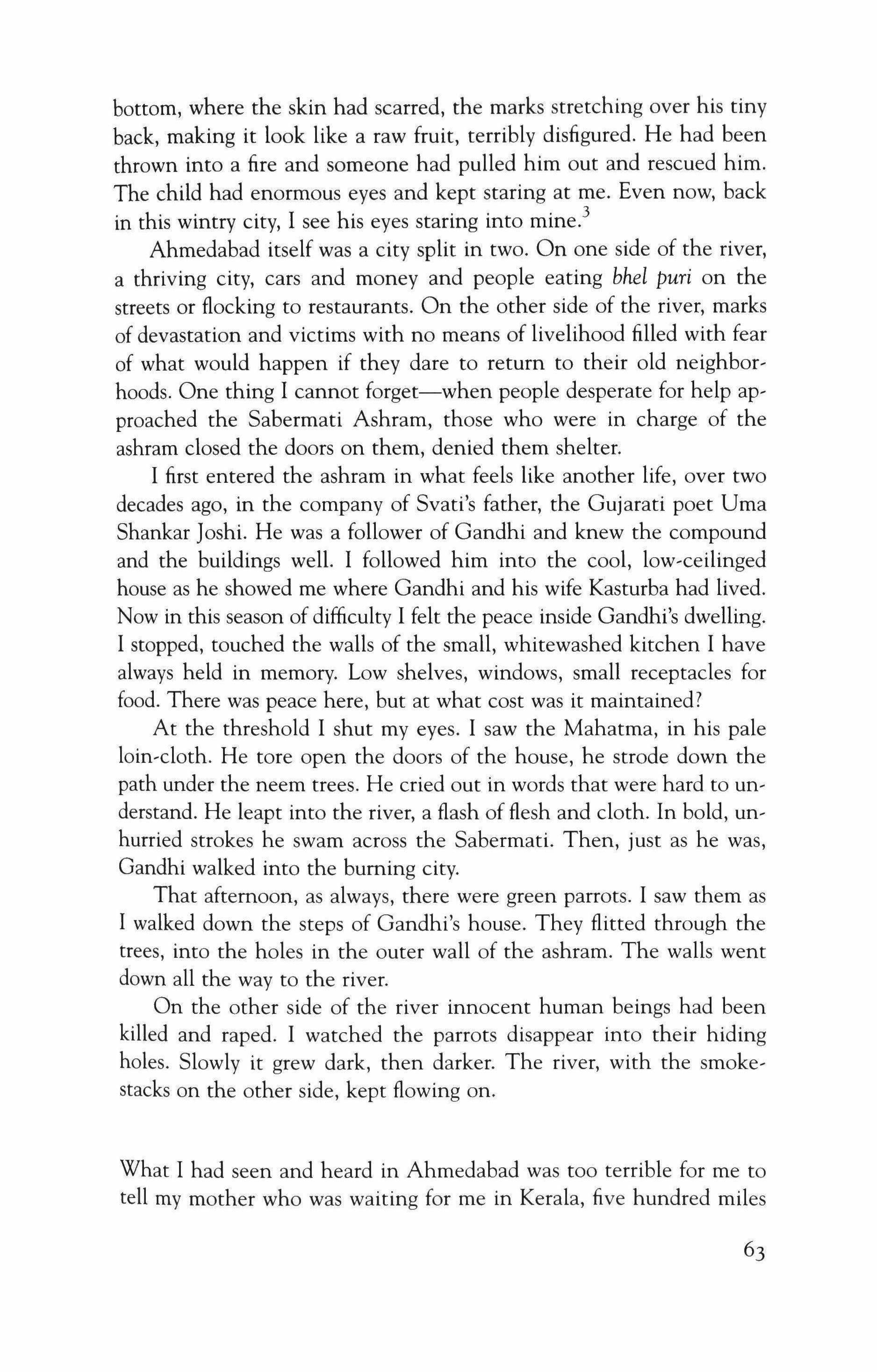
bottom, where the skin had scarred, the marks stretching over his tiny back, making it look like a raw fruit, terribly disfigured. He had been thrown into a fire and someone had pulled him out and rescued him. The child had enormous eyes and kept staring at me. Even now, back in this wintry city, I see his eyes staring into mine.'
Ahmedabad itself was a city split in two. On one side of the river, a thriving city, cars and money and people eating bhel puri on the streets or flocking to restaurants. On the other side of the river, marks of devastation and victims with no means of livelihood filled with fear of what would happen if they dare to return to their old neighborhoods. One thing I cannot forget-when people desperate for help approached the Sabermati Ashram, those who were in charge of the ashram closed the doors on them, denied them shelter.
I first entered the ashram in what feels like another life, over two decades ago, in the company of Svati's father, the Gujarati poet Uma Shankar Joshi. He was a follower of Gandhi and knew the compound and the buildings well. I followed him into the cool, low-ceilinged house as he showed me where Gandhi and his wife Kasturba had lived. Now in this season of difficulty I felt the peace inside Gandhi's dwelling. I stopped, touched the walls of the small, whitewashed kitchen I have always held in memory. Low shelves, windows, small receptacles for food. There was peace here, but at what cost was it maintained?
At the threshold I shut my eyes. I saw the Mahatma, in his pale loin-cloth. He tore open the doors of the house, he strode down the path under the neem trees. He cried out in words that were hard to understand. He leapt into the river, a flash of flesh and cloth. In bold, unhurried strokes he swam across the Sabermati. Then, just as he was, Gandhi walked into the burning city.
That afternoon, as always, there were green parrots. I saw them as I walked down the steps of Gandhi's house. They flitted through the trees, into the holes in the outer wall of the ashram. The walls went down all the way to the river.
On the other side of the river innocent human beings had been killed and raped. I watched the parrots disappear into their hiding holes. Slowly it grew dark, then darker. The river, with the smokestacks on the other side, kept flowing on.
What I had seen and heard in Ahmedabad was too terrible for me to tell my mother who was waiting for me in Kerala, five hundred miles
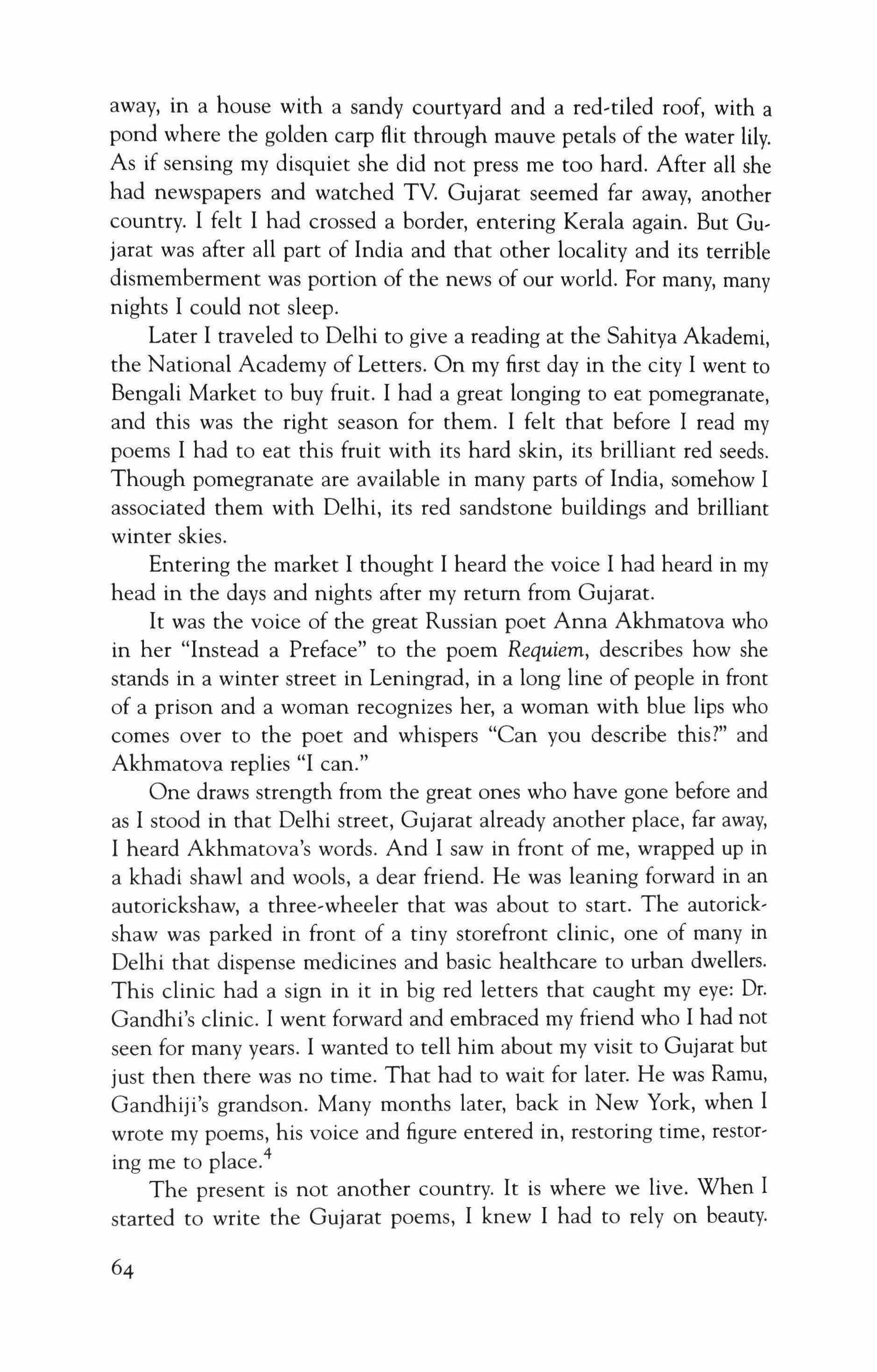
away, in a house with a sandy courtyard and a red-tiled roof, with a pond where the golden carp flit through mauve petals of the water lily. As if sensing my disquiet she did not press me too hard. After all she had newspapers and watched TV. Gujarat seemed far away, another country. I felt I had crossed a border, entering Kerala again. But Gujarat was after all part of India and that other locality and its terrible dismemberment was portion of the news of our world. For many, many nights I could not sleep.
Later I traveled to Delhi to give a reading at the Sahitya Akademi, the National Academy of Letters. On my first day in the city I went to Bengali Market to buy fruit. I had a great longing to eat pomegranate, and this was the right season for them. I felt that before I read my poems I had to eat this fruit with its hard skin, its brilliant red seeds. Though pomegranate are available in many parts of India, somehow I associated them with Delhi, its red sandstone buildings and brilliant winter skies.
Entering the market I thought I heard the voice I had heard in my head in the days and nights after my return from Gujarat.
It was the voice of the great Russian poet Anna Akhmatova who in her "Instead a Preface" to the poem Requiem, describes how she stands in a winter street in Leningrad, in a long line of people in front of a prison and a woman recognizes her, a woman with blue lips who comes over to the poet and whispers "Can you describe this?" and Akhmatova replies "I can."
One draws strength from the great ones who have gone before and as I stood in that Delhi street, Gujarat already another place, far away, I heard Akhmatova's words. And I saw in front of me, wrapped up in a khadi shawl and wools, a dear friend. He was leaning forward in an autorickshaw, a three,wheeler that was about to start. The autorickshaw was parked in front of a tiny storefront clinic, one of many in Delhi that dispense medicines and basic healthcare to urban dwellers. This clinic had a sign in it in big red letters that caught my eye: Dr. Gandhi's clinic. I went forward and embraced my friend who I had not seen for many years. I wanted to tell him about my visit to Gujarat but just then there was no time. That had to wait for later. He was Ramu, Gandhiji's grandson. Many months later, back in New York, when I wrote my poems, his voice and figure entered in, restoring time, restor, ing me to place."
The present is not another country. It is where we live. When I started to write the Gujarat poems, I knew I had to rely on beauty.
Otherwise the rawness of what had happened, the bloody bitter mess would be too much to take. The poem can take a tiny jot of the horror but evoke grief, restore tenderness so that we are not thrust back into an abject silence. As if we have heard and seen nothing.
After the poems were completed, I sent them to a friend at the TImes of India and he in tum sent them onto a friend at the Hindu with the thought that they might publish them on the Sunday literary page. The editor at the Hindu wrote back to me, a few lines about my poems that made me stop in my tracks: Dear Meena I am, frankly, amazed by the poems provoked by the pogrom and its aftermath in Gujarat, by the way they weave terror and disturbance with beauty and elegance of form in the way that sometimes makes people who are distrustful of the claims of art suspicious ofpoetry and its intentions.
He was a poet himself and I valued his words but what did he mean by the distrust of beauty? He had touched a nerve and I wrote back the same day, March 18, 2003, by email: Dear R., Beauty and terror-we must speak of all that sometime. I needed beauty there to work so that the pity of it would strike the reader. too much horror, raw, the mind cannot take-and here beauty can work for us, for the good, so I dare to believe as a poet.
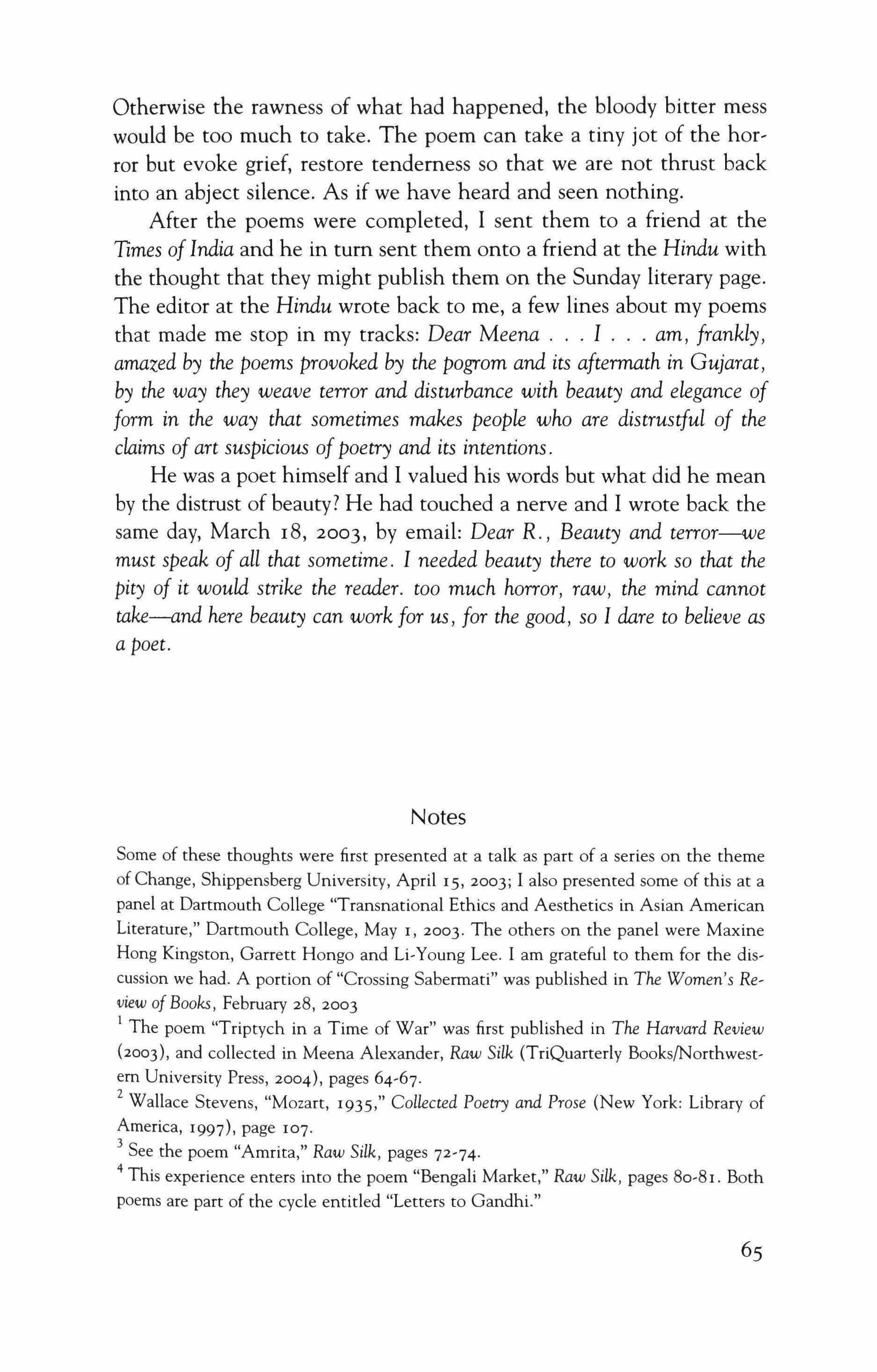
Notes
Some of these thoughts were first presented at a talk as part of a series on the theme of Change, Shippensberg University, April 15, 2003; I also presented some of this at a panel at Dartmouth College "Transnational Ethics and Aesthetics in Asian American Literature," Dartmouth College, May I, 2003. The others on the panel were Maxine Hong Kingston, Garrett Hongo and Li-Young Lee. I am grateful to them for the discussion we had. A portion of "Crossing Sabermati" was published in The Women's Review ofBooks, February 28, 2003
1 The poem "Triptych in a Time of War" was first published in The Harvard Review (2003), and collected in Meena Alexander, Raw Silk (TriQuarterly Books/Northwestem University Press, 2004), pages 64-67.
2 Wallace Stevens, "Mozart, 1935," Collected Poetry and Prose (New York: Library of America, 1997), page 107.
3 See the poem "Amrita," Raw Silk, pages 72-74.
4 This experience enters into the poem "Bengali Market," Raw Silk, pages 80-81. Both poems are part of the cycle entitled "Letters to Gandhi."
Nicholas Christopher
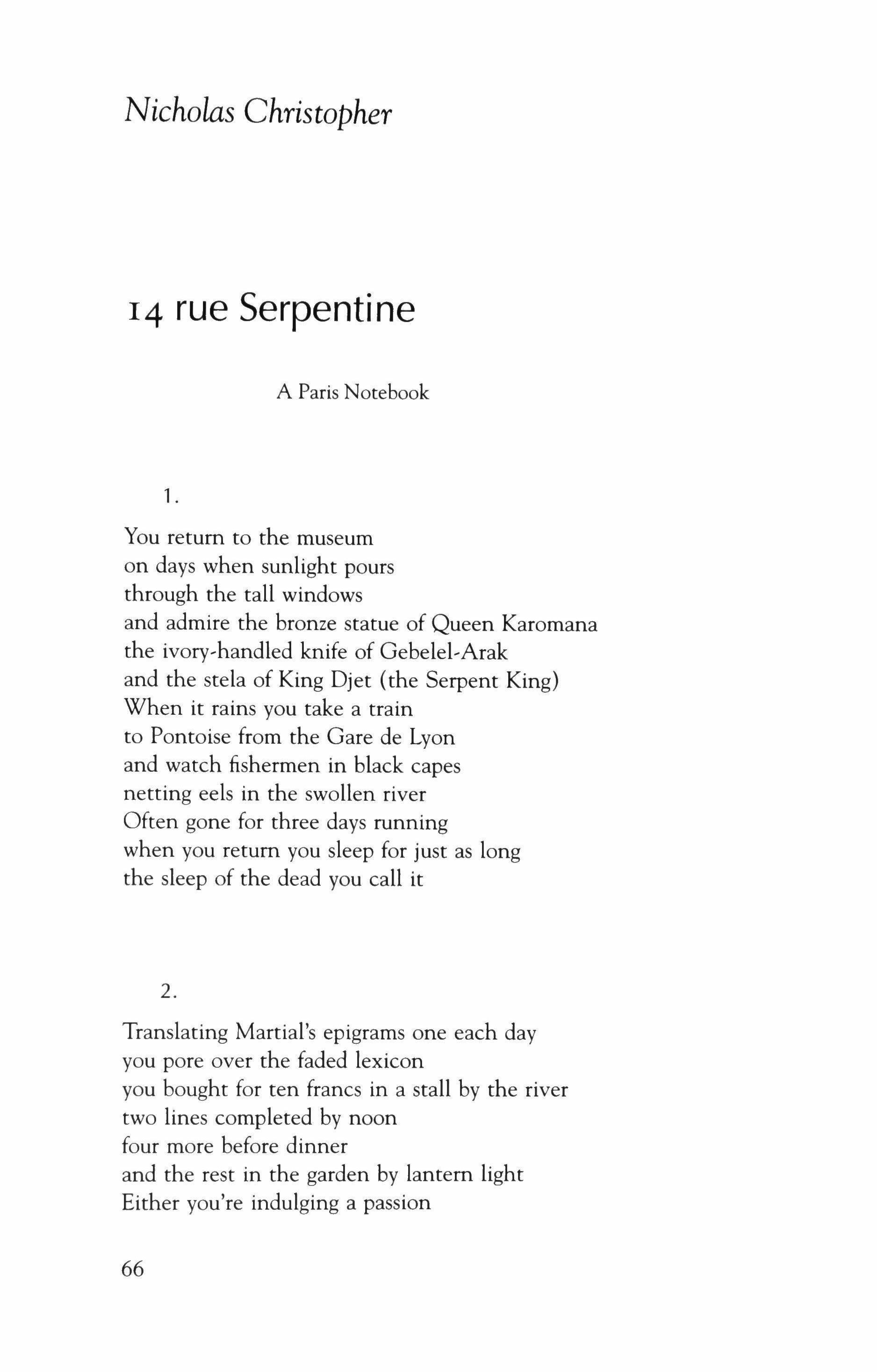
14 rue Serpenti ne
A Paris Notebook
1.
You return to the museum on days when sunlight pours through the tall windows and admire the bronze statue of Queen Karomana the ivory-handled knife of Gebelel-Arak and the stela of King Djet (the Serpent King) When it rains you take a train to Pontoise from the Gare de Lyon and watch fishermen in black capes netting eels in the swollen river Often gone for three days running when you return you sleep for just as long the sleep of the dead you call it
2.
Translating Martial's epigrams one each day you pore over the faded lexicon you bought for ten francs in a stall by the river two lines completed by noon four more before dinner and the rest in the garden by lantern light Either you're indulging a passion
66
for miniatures for precision or you're in a holding pattern ceaselessly juggling another man's words
The sandstone pages erode inward sleep pulls at you like an ebb tide Would any man delay who truly knew how to live?
3.
An ancient messenger in a modem uniform arrives on a bicycle with a packet of poison-pen letters
The lines in his palm are twisted into a noose the coins lining his pockets embossed with the visages of corrupt kings and queens descendents of Justinian codifier of laws he himself broke and Theodora his empress who kept chained panthers in her bedroom and slept with teams of wrestlers only to have them beheaded at dawn
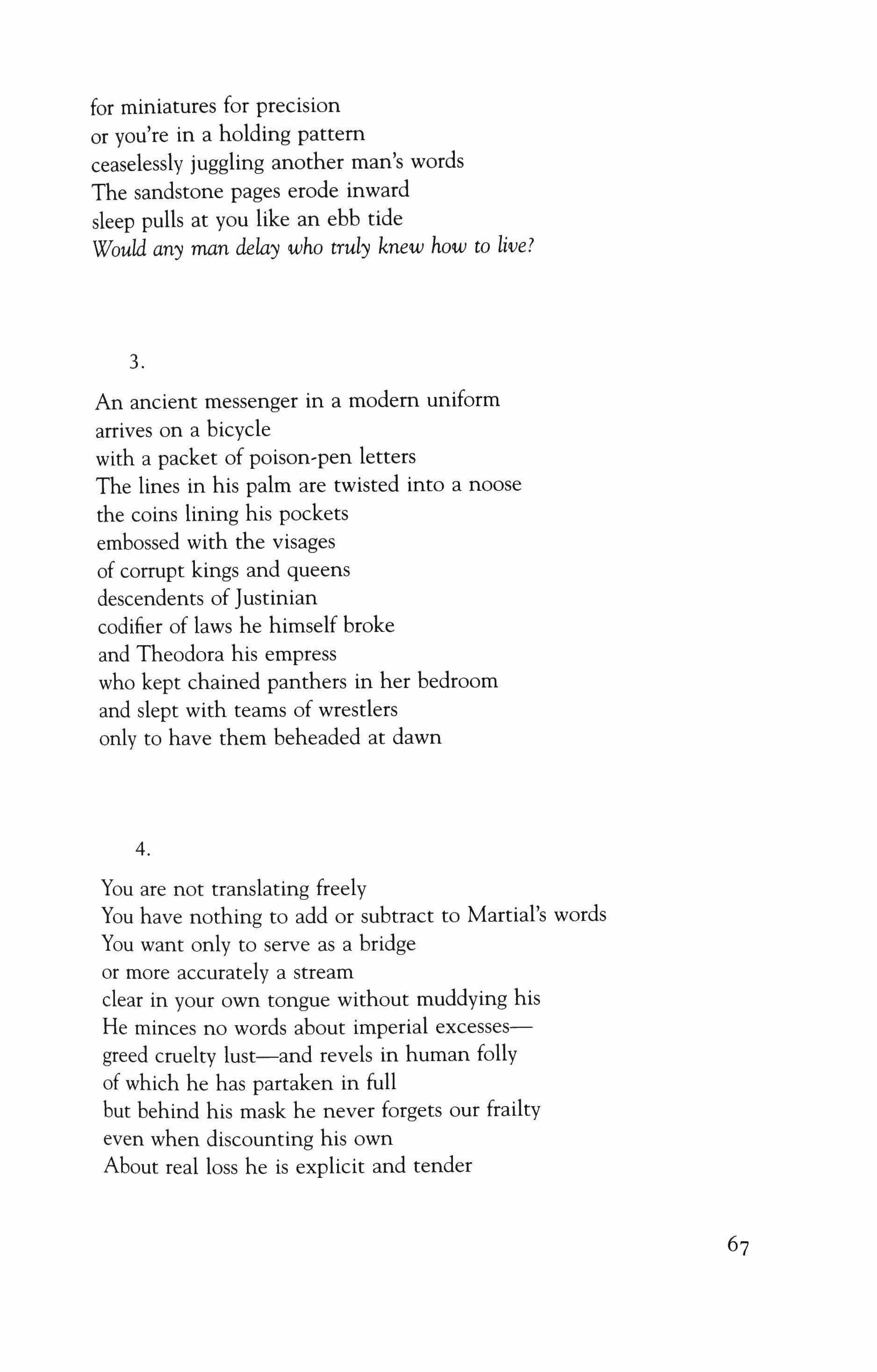
4.
You are not translating freely
You have nothing to add or subtract to Martial's words
You want only to serve as a bridge or more accurately a stream clear in your own tongue without muddying his He minces no words about imperial excessesgreed cruelty lust-and revels in human folly of which he has partaken in full but behind his mask he never forgets our frailty even when discounting his own
About real loss he is explicit and tender
Whatever you love, pray it doesn't please you too much
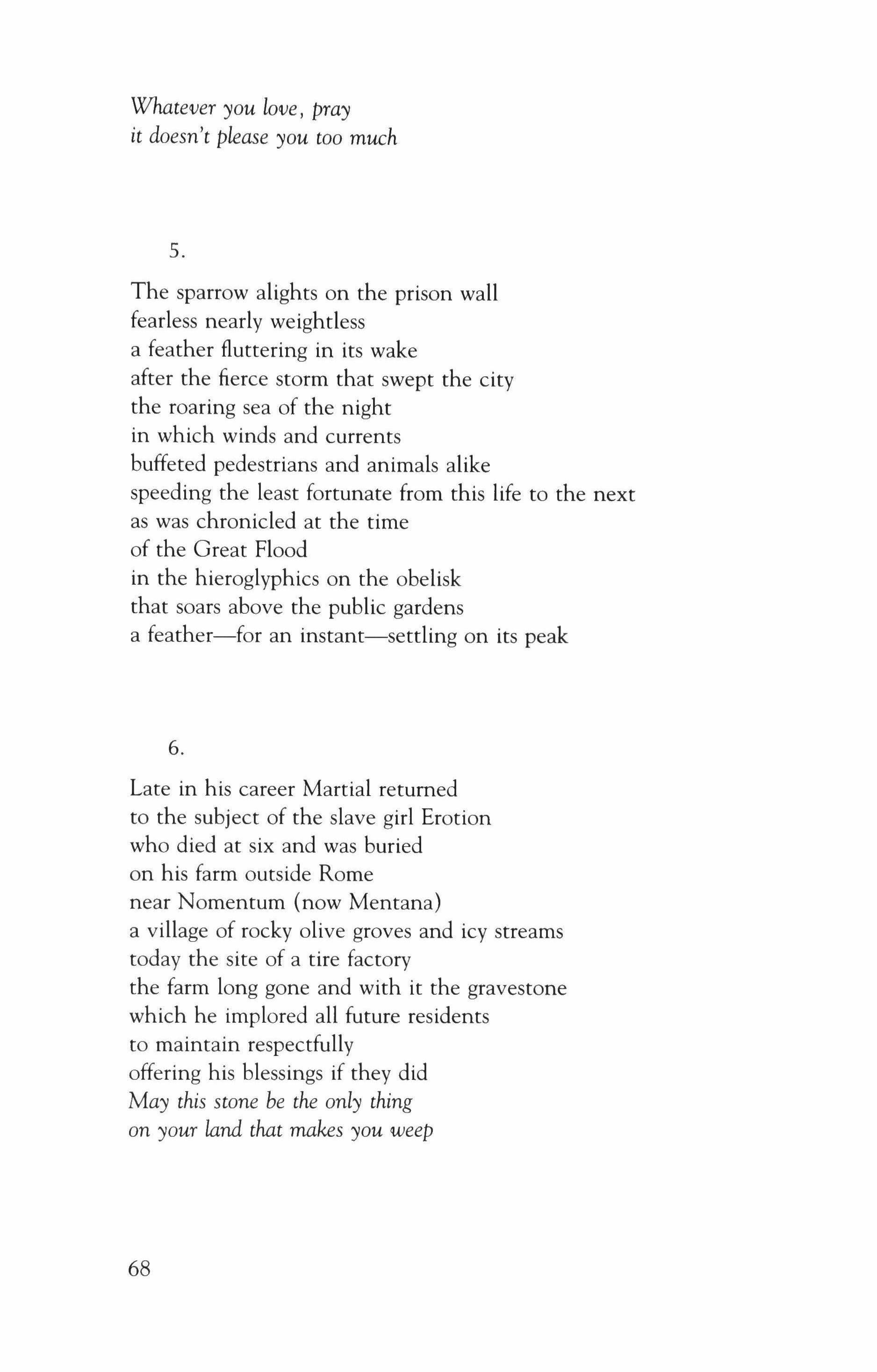
5.
The sparrow alights on the prison wall fearless nearly weightless a feather fluttering in its wake after the fierce storm that swept the city the roaring sea of the night in which winds and currents buffeted pedestrians and animals alike speeding the least fortunate from this life to the next as was chronicled at the time of the Great Flood in the hieroglyphics on the obelisk that soars above the public gardens a feather-for an instant-settling on its peak
6.
Late in his career Martial returned to the subject of the slave girl Erotion who died at six and was buried on his farm outside Rome near Nomentum (now Mentana) a village of rocky olive groves and icy streams today the site of a tire factory the farm long gone and with it the gravestone which he implored all future residents to maintain respectfully offering his blessings if they did May this stone be the only thing on your land that makes you weep
68

When you visit the Serpent Priestess in her roof garden she examines a snake scale with a magnifying glass and divines your fortune insisting this was the preferred method of Cleopatra and Antiope the Amazon queen and Clytemnestra plotting her husband's murder From ragged clouds the first snow spins onto the river path beaten centuries ago by foxes and their prey where you stroll now mulling over the priestess's words information that might have been useful to you back when you cared about the future a long time ago
7.
Patricia Spears]ones

iHay alga mas triste en el mundo, que un tren immovil en la IIuvia?
What is sadder than a train standing in the rain?
Sentiment overflows the track's shallow rails rampages the baggage area, whips the dining car waiter into positions catalogued in the Kama Sutra.
Oh surely the harvest moon will clarify where the road bends and birds with vulgar plumage strike elaborate poses; where uniformed guards walk gingerly from one locked door to the other as if they could offer protection from the witching hours
Propensity to dispense violence: relentless slaps to faces, arms, chests. Poke in the eye, bite on the thigh, a pistol's report, that leap from the 30th floor a dangling man's chair turned over, this young girl's bleeding hands, love malformed.
Old love magazines, new drug store novelas, illustrate a language of loss. Boy girl, man woman, mother child, old man his young self, status useless.
Pain is pain and trains in rain are sad, Senor Neruda.
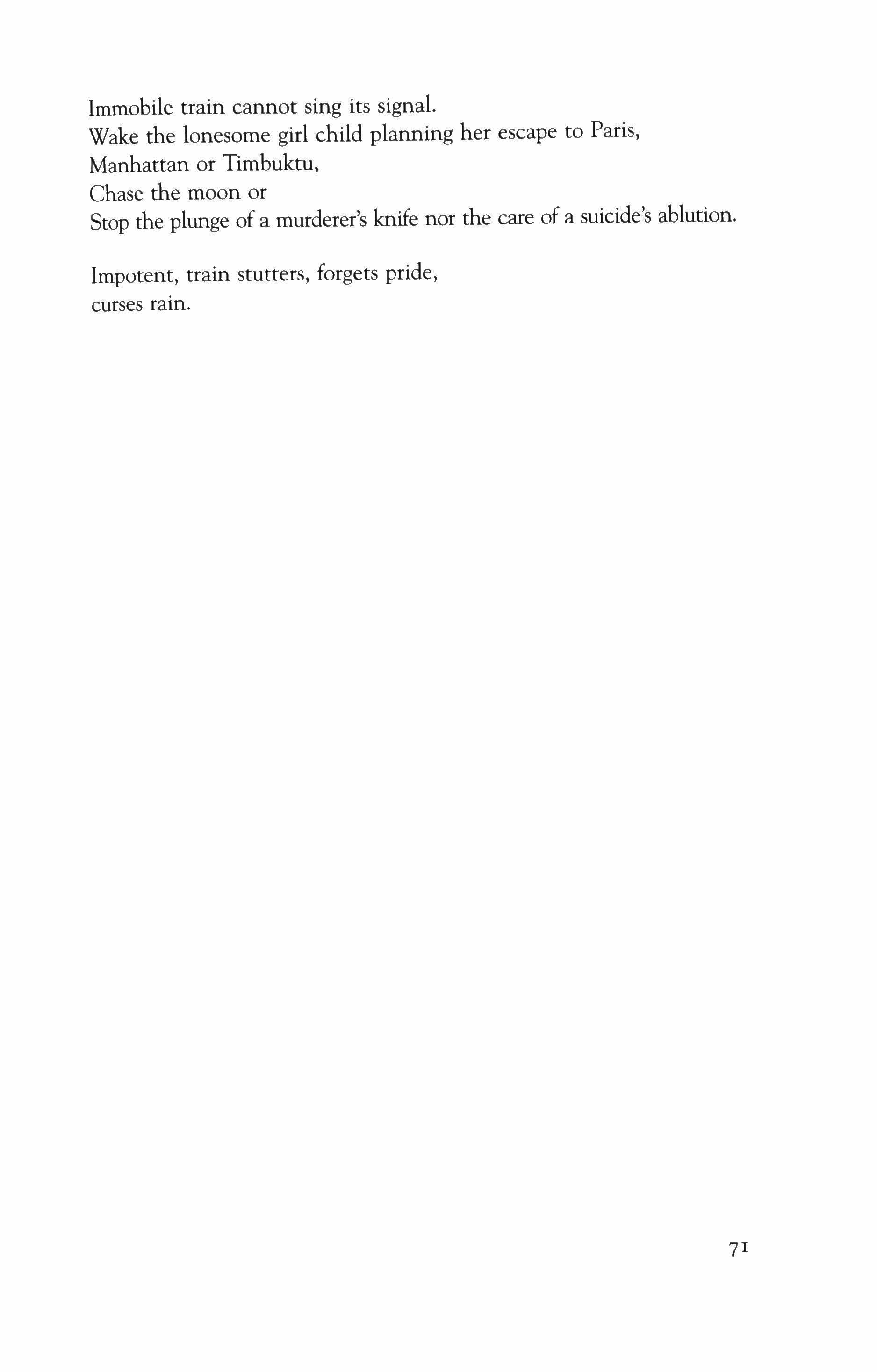
Immobile train cannot sing its signaL Wake the lonesome girl child planning her escape to Paris, Manhattan or Timbuktu, Chase the moon or Stop the plunge of a murderer's knife nor the care of a suicide's ablution.
Impotent, train stutters, forgets pride, curses rain.
71
i. Trabajan la sal y el azucar / Construyendo
una torre blanca?

Do salt and sugar work to build a white tower? No, they do not speak to each other.
Salt and pepper are masons building the perfect blank a beautiful stark
White on white walls thick-whole cities surrounded with lustrous black roadways-jeweled paths daunt
It is curiosity Senor Neruda that forms the white foundations that rise platform after platform floor by floor into air-
Towers as look out. What is seen-the enemy approaching? Or
Lot's wife dissolving-myth and punishment elevator and aperture-the eye apparent.
But where are their tools? put aside for dazzle 2.
Sugar tastes like sex, surprise
Salt and pepper become sun and water or lobby and floor.
Oh these white towers spiced with story, precarious platform after platform, floor by floor falling into ruin, reverieblanco, negro, mustard, sienna, and beryl.
lEra verdad aquef aroma / de fa donceffa sorprendida?
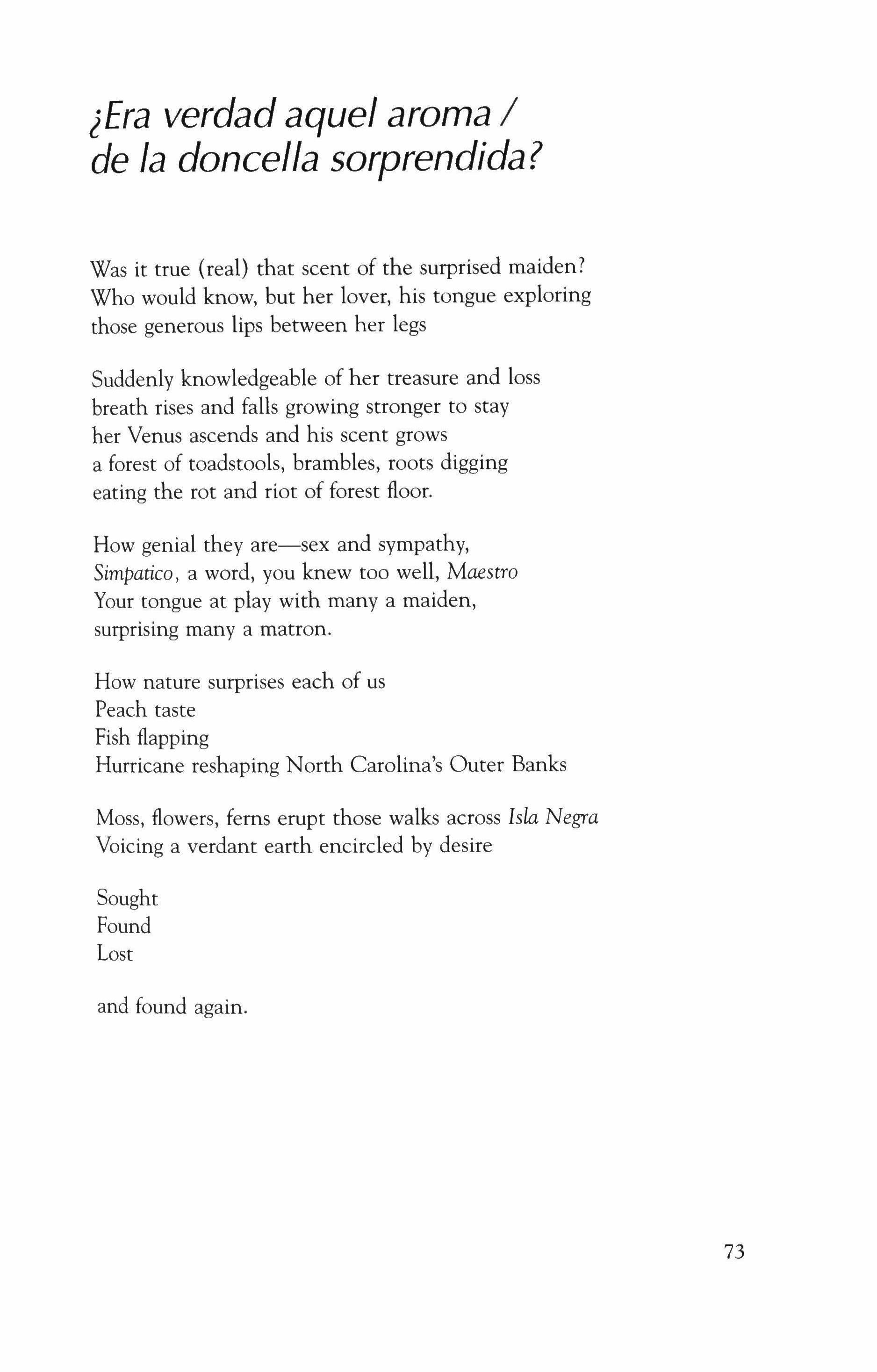
Was it true (real) that scent of the surprised maiden? Who would know, but her lover, his tongue exploring those generous lips between her legs
Suddenly knowledgeable of her treasure and loss breath rises and falls growing stronger to stay her Venus ascends and his scent grows a forest of toadstools, brambles, roots digging eating the rot and riot of forest floor.
How genial they are-sex and sympathy, Simpatico, a word, you knew too well, Maestro Your tongue at play with many a maiden, surprising many a matron.
How nature surprises each of us Peach taste Fish flapping Hurricane reshaping North Carolina's Outer Banks
Moss, flowers, ferns erupt those walks across Isla Negra Voicing a verdant earth encircled by desire
Sought Found Lost and found again.
73
]effery Renard Allen
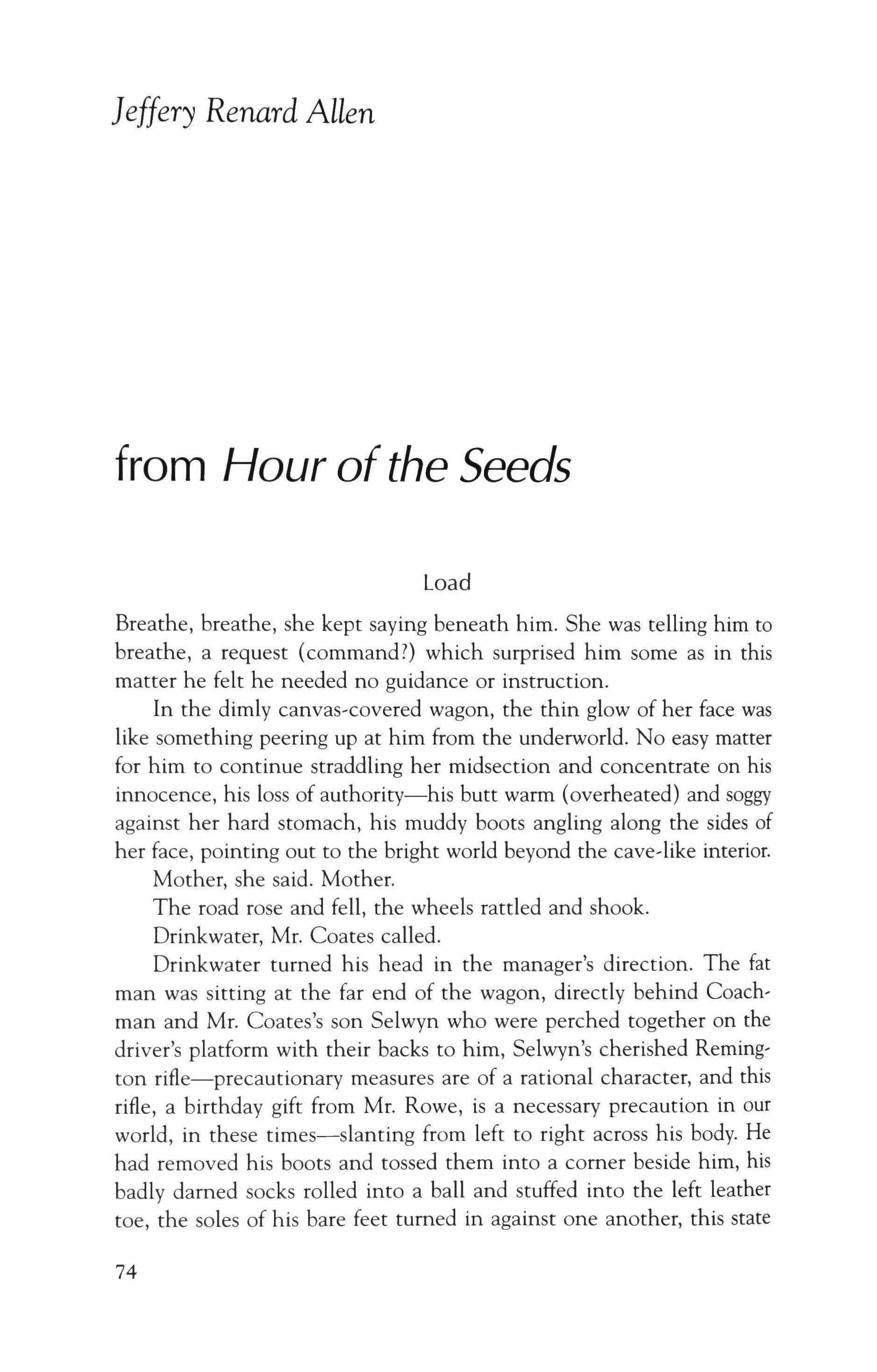
from Hour ofthe Seeds
Load
Breathe, breathe, she kept saying beneath him. She was telling him to breathe, a request (command?) which surprised him some as in this matter he felt he needed no guidance or instruction.
In the dimly canvas-covered wagon, the thin glow of her face was like something peering up at him from the underworld. No easy matter for him to continue straddling her midsection and concentrate on his innocence, his loss of authority-his butt warm (overheated) and soggy against her hard stomach, his muddy boots angling along the sides of her face, pointing out to the bright world beyond the cave-like interior.
Mother, she said. Mother.
The road rose and fell, the wheels rattled and shook.
Drinkwater, Mr. Coates called.
Drinkwater turned his head in the manager's direction. The fat man was sitting at the far end of the wagon, directly behind Coachman and Mr. Coates's son Selwyn who were perched together on the driver's platform with their backs to him, Selwyn's cherished Remington rifle-precautionary measures are of a rational character, and this rifle, a birthday gift from Mr. Rowe, is a necessary precaution in our world, in these times-slanting from left to right across his body. He had removed his boots and tossed them into a corner beside him, his badly darned socks rolled into a ball and stuffed into the left leather toe, the soles of his bare feet turned in against one another, this state
74
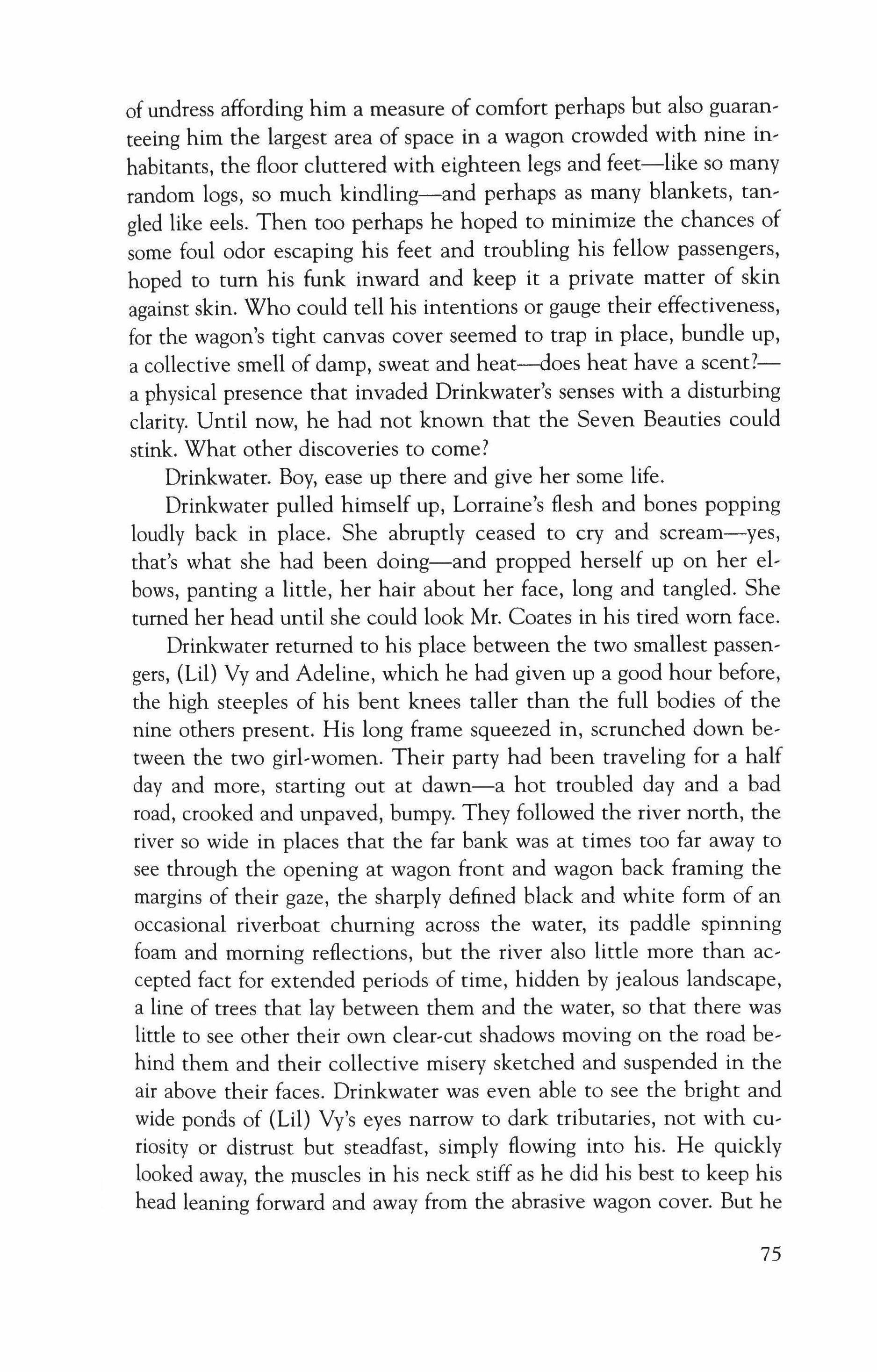
of undress affording him a measure of comfort perhaps but also guaranteeing him the largest area of space in a wagon crowded with nine inhabitants, the floor cluttered with eighteen legs and feet-like so many random logs, so much kindling-and perhaps as many blankets, tangled like eels. Then too perhaps he hoped to minimize the chances of some foul odor escaping his feet and troubling his fellow passengers, hoped to turn his funk inward and keep it a private matter of skin against skin. Who could tell his intentions or gauge their effectiveness, for the wagon's tight canvas cover seemed to trap in place, bundle up, a collective smell of damp, sweat and heat--does heat have a scent?a physical presence that invaded Drinkwater's senses with a disturbing clarity. Until now, he had not known that the Seven Beauties could stink. What other discoveries to come?
Drinkwater. Boy, ease up there and give her some life.
Drinkwater pulled himself up, Lorraine's flesh and bones popping loudly back in place. She abruptly ceased to cry and scream-yes, that's what she had been doing-and propped herself up on her elbows, panting a little, her hair about her face, long and tangled. She turned her head until she could look Mr. Coates in his tired worn face.
Drinkwater returned to his place between the two smallest passengers, (Lit) Vy and Adeline, which he had given up a good hour before, the high steeples of his bent knees taller than the full bodies of the nine others present. His long frame squeezed in, scrunched down between the two girl-women. Their party had been traveling for a half day and more, starting out at dawn-a hot troubled day and a bad road, crooked and unpaved, bumpy. They followed the river north, the river so wide in places that the far bank was at times too far away to see through the opening at wagon front and wagon back framing the margins of their gaze, the sharply defined black and white form of an occasional riverboat churning across the water, its paddle spinning foam and morning reflections, but the river also little more than accepted fact for extended periods of time, hidden by jealous landscape, a line of trees that lay between them and the water, so that there was little to see other their own clear-cut shadows moving on the road behind them and their collective misery sketched and suspended in the air above their faces. Drinkwater was even able to see the bright and wide ponds of (Lil) Vy's eyes narrow to dark tributaries, not with curiosity or distrust but steadfast, simply flowing into his. He quickly looked away, the muscles in his neck stiff as he did his best to keep his head leaning forward and away from the abrasive wagon cover. But he
75
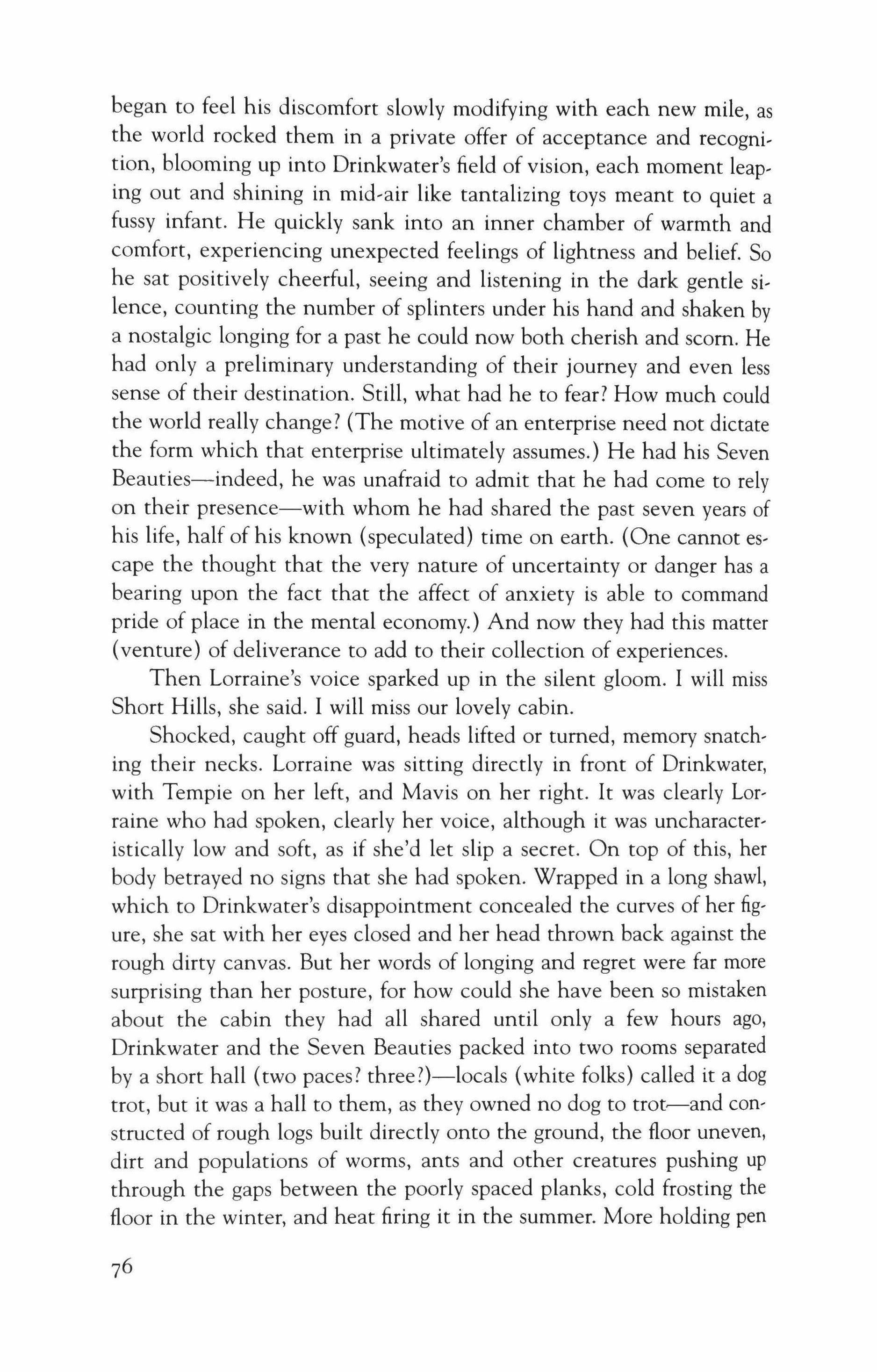
began to feel his discomfort slowly modifying with each new mile, as the world rocked them in a private offer of acceptance and recognition, blooming up into Drinkwater's field of vision, each moment leaping out and shining in mid-air like tantalizing toys meant to quiet a fussy infant. He quickly sank into an inner chamber of warmth and comfort, experiencing unexpected feelings of lightness and belief. So he sat positively cheerful, seeing and listening in the dark gentle silence, counting the number of splinters under his hand and shaken by a nostalgic longing for a past he could now both cherish and scorn. He had only a preliminary understanding of their journey and even less sense of their destination. Still, what had he to fear? How much could the world really change? (The motive of an enterprise need not dictate the form which that enterprise ultimately assumes.) He had his Seven Beauties-indeed, he was unafraid to admit that he had come to rely on their presence-with whom he had shared the past seven years of his life, half of his known (speculated) time on earth. (One cannot escape the thought that the very nature of uncertainty or danger has a bearing upon the fact that the affect of anxiety is able to command pride of place in the mental economy.) And now they had this matter (venture) of deliverance to add to their collection of experiences.
Then Lorraine's voice sparked up in the silent gloom. I will miss Short Hills, she said. I will miss our lovely cabin.
Shocked, caught off guard, heads lifted or turned, memory snatching their necks. Lorraine was sitting directly in front of Drinkwater, with Tempie on her left, and Mavis on her right. It was clearly Lorraine who had spoken, clearly her voice, although it was uncharacteristically low and soft, as if she'd let slip a secret. On top of this, her body betrayed no signs that she had spoken. Wrapped in a long shawl, which to Drinkwater's disappointment concealed the curves of her figure, she sat with her eyes closed and her head thrown back against the rough dirty canvas. But her words of longing and regret were far more surprising than her posture, for how could she have been so mistaken about the cabin they had all shared until only a few hours ago, Drinkwater and the Seven Beauties packed into two rooms separated by a short hall (two paces? three?)-locals (white folks) called it a dog trot, but it was a hall to them, as they owned no dog to trot-s-and constructed of rough logs built directly onto the ground, the floor uneven, dirt and populations of worms, ants and other creatures pushing up through the gaps between the poorly spaced planks, cold frosting the floor in the winter, and heat firing it in the summer. More holding pen
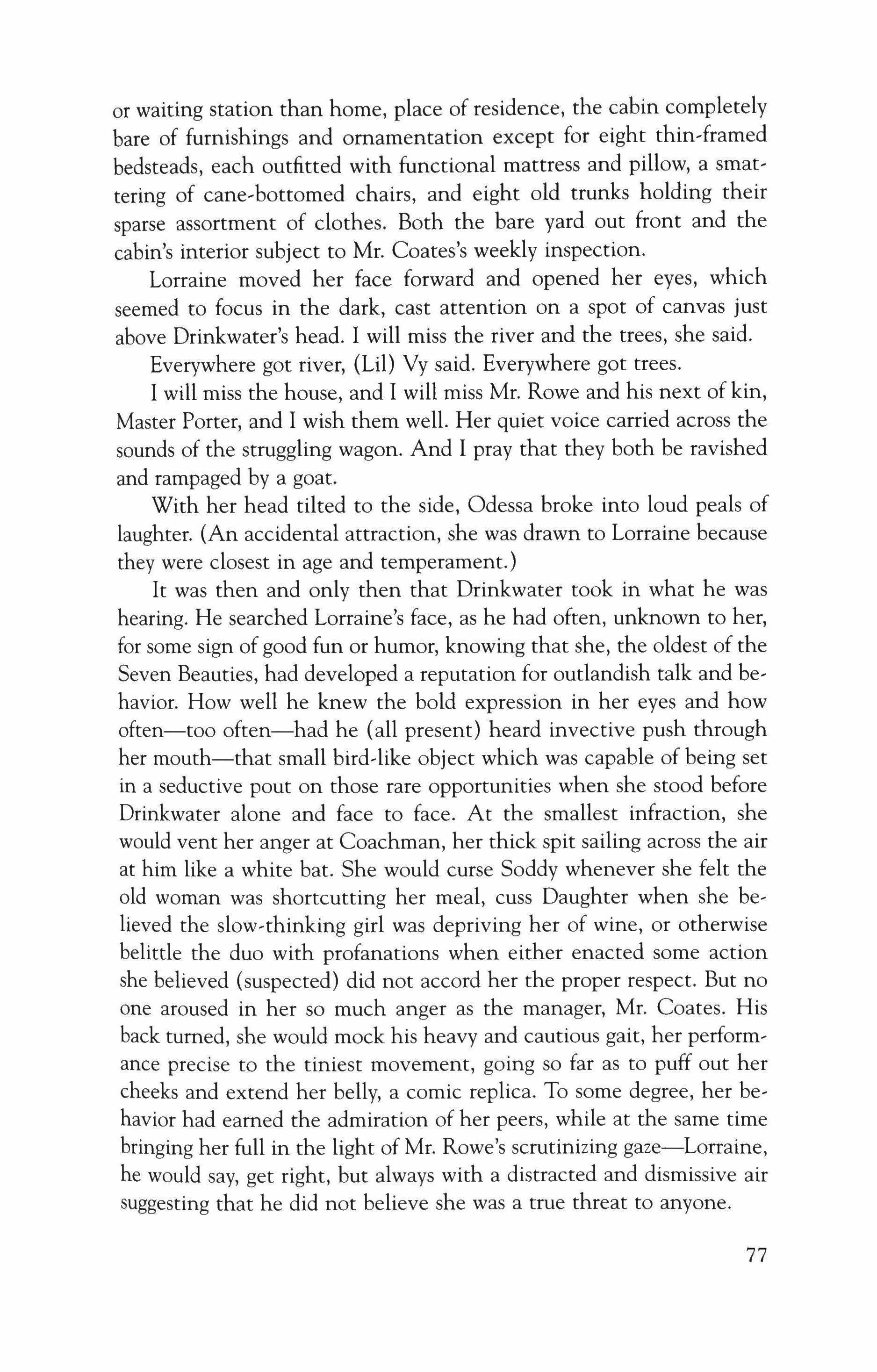
or waiting station than home, place of residence, the cabin completely bare of furnishings and ornamentation except for eight thin-framed bedsteads, each outfitted with functional mattress and pillow, a smattering of cane-bottomed chairs, and eight old trunks holding their sparse assortment of clothes. Both the bare yard out front and the cabin's interior subject to Mr. Coates's weekly inspection.
Lorraine moved her face forward and opened her eyes, which seemed to focus in the dark, cast attention on a spot of canvas just above Drinkwater's head. I will miss the river and the trees, she said.
Everywhere got river, (Lil) Vy said. Everywhere got trees.
I will miss the house, and I will miss Mr. Rowe and his next of kin, Master Porter, and I wish them well. Her quiet voice carried across the sounds of the struggling wagon. And I pray that they both be ravished and rampaged by a goat.
With her head tilted to the side, Odessa broke into loud peals of laughter. (An accidental attraction, she was drawn to Lorraine because they were closest in age and temperament.)
It was then and only then that Drinkwater took in what he was hearing. He searched Lorraine's face, as he had often, unknown to her, for some sign of good fun or humor, knowing that she, the oldest of the Seven Beauties, had developed a reputation for outlandish talk and behavior. How well he knew the bold expression in her eyes and how often-too often-had he (all present) heard invective push through her mouth-that small bird-like object which was capable of being set in a seductive pout on those rare opportunities when she stood before Drinkwater alone and face to face. At the smallest infraction, she would vent her anger at Coachman, her thick spit sailing across the air at him like a white bat. She would curse Soddy whenever she felt the old woman was shortcutting her meal, cuss Daughter when she believed the slow-thinking girl was depriving her of wine, or otherwise belittle the duo with profanations when either enacted some action she believed (suspected) did not accord her the proper respect. But no one aroused in her so much anger as the manager, Mr. Coates. His back turned, she would mock his heavy and cautious gait, her performance precise to the tiniest movement, going so far as to puff out her cheeks and extend her belly, a comic replica. To some degree, her behavior had earned the admiration of her peers, while at the same time bringing her full in the light of Mr. Rowe's scrutinizing gaze-Lorraine, he would say, get right, but always with a distracted and dismissive air suggesting that he did not believe she was a true threat to anyone.
77

Lorraine would turn away from him, defeat wedged in the bitter corners of her lips. Now, she looked Odessa straight in the eye, silencing her, waited until her would-be cohort stopped laughing before she went on. Blessings to that long-britched Mr. Rowe and his cockeyed next of kin Master Porter. Perhaps they'll bathe now that we gone. Stank summons flies as fresh shit will. But should they bathe, that would be a sin against water and make soap unholy.
So began her long string of imprecations, inventing words against Mr. Rowe and Porter, ghosts who could no longer exercise any physical hold on the world. Drinkwater and his beauties listened on with interest, satisfaction perhaps, the merest crossing of glances causing Adeline to start laughing into her perfectly cared-for hands. Mr. Coates looking up now and again from his bare feet to Drinkwater's face. (Drinkwater caught Odessa examining the manager's fat body rather disgustedly.) At that precise moment and for the first and only time, Drinkwater detached himself from this girl-woman whom he had known for all these many years and suddenly saw at a distance from himself another Lorraine. Now and again, he even stopped listening in order to study the hard inevitable movements of her mouth, and the steady shine of her eyes. Then she turned against Soddy and Daughter, relating in detail the suffering that their ugliness caused her eyes, the duo so low in her judgment she refused to single them out separately for condemnation, satisfied to lump them together into a single repulsive entity.
And she went on that way, the Seven Beauties (minus one, herself) the next to corne under attack, Lorraine presenting to each one of them the brave set of her head as anger, bitterness, joy crashed into words, vindictive that mocked even their most insignificant physical defects-Vy's little nose, Adeline's overbite (how had Drinkwater not noticed it all these years?), Tempie's overextended froglike fingers, Mavis's freckles and blemishes, Jean's high forehead (indeed}-and the fleeting movements and expressions of face and body, Lorraine building up an accumulation of petty insults that seemed to burden the wagon and slow its progress. Odessa keeping up a tittering chorus, seeking Lorraine's approval, somehow believing that her own imperfections had escaped notice. (Had Lorraine not commented on Odessa's big nose? Yes. A snotty chute, she had called it.) Mr. Coates turned his head and fixed on Drinkwater's face, inquisitive and anxious. A reluctant witness, Drinkwater would have liked to take Lorraine by the shoulders, stare into her eyes and cause her to realize the

damage she was causing. For these were his Seven Beauties, their accidental characteristics, distinguishing features of no importance to him. (Nobody built you. Design yourself.) The girls didn't look particularly alike; perhaps they did. As it were, he had thought little beyond the steady continuum of their skin tone-seven redbone beauties, each colored some shade of tan, beige, or yellow-and the longing that their faces and bodies caused him. (If he had been pressed to think about it, cornered into confessing, he would admit that Jean was no beauty, her plain features and quiet disposition spaces of absence where longing could fill in whatever it so desired.)
The Seven Beauties fought backLorraine, you talk too much. You need to shut your mouth.
You're one to boast. Look at your udders.
Think you heaven sent?
You ain't born of woman.
Nor nigger or man.
(Lil) Vy exhaled a powerful breath.
-but Drinkwater remained silent, hoping that, like a gloated mosquito, Lorraine would quit of her own accord. (Every excess carries within itself the seeds of its own surcease.) But she did not quit, went on for what seemed like hours, her eyes closing at one point as if she had settled into a trance. Mr. Coates checked her with a gesture, which she could not have missed or mistaken. She did not stop. Drinkwater took pride in her small triumph, even buried his face in his lapel and smiled a quick fugitive smile. He caught Mavis laughing too in her customary fashion, buckling forward a little with her hand covering her mouth. But their joy was short-lived, provisionalhis at least-Drinkwater sensing a gathering response in Mr. Coates, a response which in turn would demand something of him. The manager's face had assumed a reddish tint, the waxy fat glowing from inside like a low lamp and his bare feet trembling from a source of locomotion separate and apart from the moving wagon.
Lorraine turned her face so that her eyes met Drinkwater's eyes. And he felt a certain relief once he understood that she would spare him. (Could it be that he failed to satisfy her craving? Drinkwater questioning himself with a certain sense of disappointment.) She turned her insults elsewhere-to Selwyn, the manager's son. If Selwyn heard-Odessa gave another snort of laughter, two-he gave no indication, offering nothing more than an adjustment of his shoulders, a
79
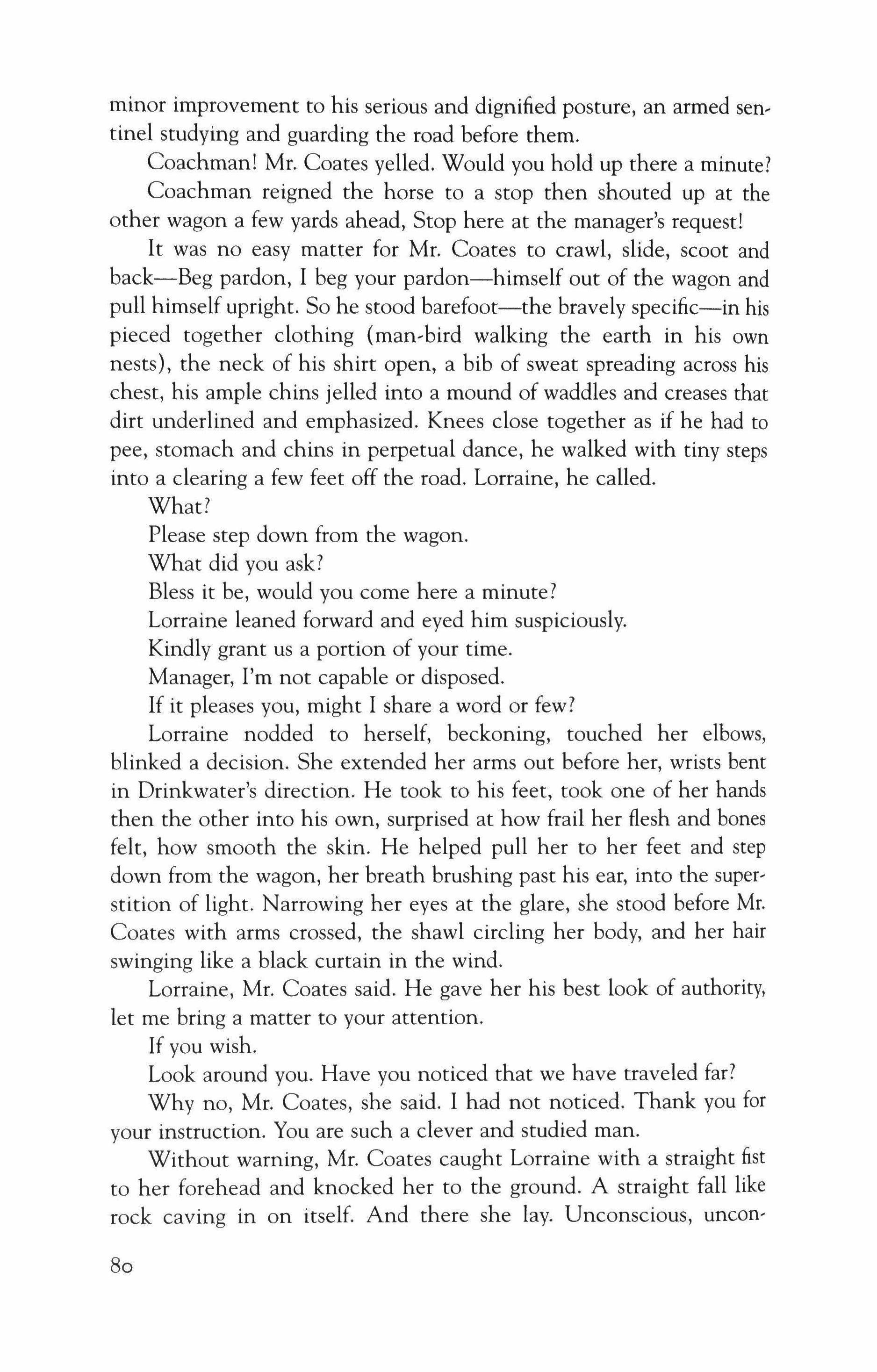
minor improvement to his serious and dignified posture, an armed sentinel studying and guarding the road before them.
Coachman! Mr. Coates yelled. Would you hold up there a minute?
Coachman reigned the horse to a stop then shouted up at the other wagon a few yards ahead, Stop here at the manager's request!
It was no easy matter for Mr. Coates to crawl, slide, scoot and back-Beg pardon, I beg your pardon-himself out of the wagon and pull himself upright. So he stood barefoot-the bravely specific-in his pieced together clothing (man-bird walking the earth in his own nests), the neck of his shirt open, a bib of sweat spreading across his chest, his ample chins jelled into a mound of waddles and creases that dirt underlined and emphasized. Knees close together as if he had to pee, stomach and chins in perpetual dance, he walked with tiny steps into a clearing a few feet off the road. Lorraine, he called.
What?
Please step down from the wagon.
What did you ask?
Bless it be, would you come here a minute?
Lorraine leaned forward and eyed him suspiciously.
Kindly grant us a portion of your time.
Manager, I'm not capable or disposed.
If it pleases you, might I share a word or few?
Lorraine nodded to herself, beckoning, touched her elbows, blinked a decision. She extended her arms out before her, wrists bent in Drinkwater's direction. He took to his feet, took one of her hands then the other into his own, surprised at how frail her flesh and bones felt, how smooth the skin. He helped pull her to her feet and step down from the wagon, her breath brushing past his ear, into the superstition of light. Narrowing her eyes at the glare, she stood before Mr. Coates with arms crossed, the shawl circling her body, and her hair swinging like a black curtain in the wind.
Lorraine, Mr. Coates said. He gave her his best look of authority, let me bring a matter to your attention.
If you wish.
Look around you. Have you noticed that we have traveled far?
Why no, Mr. Coates, she said. I had not noticed. Thank you for your instruction. You are such a clever and studied man.
Without warning, Mr. Coates caught Lorraine with a straight fist to her forehead and knocked her to the ground. A straight fall like rock caving in on itself. And there she lay. Unconscious, uncon-
80
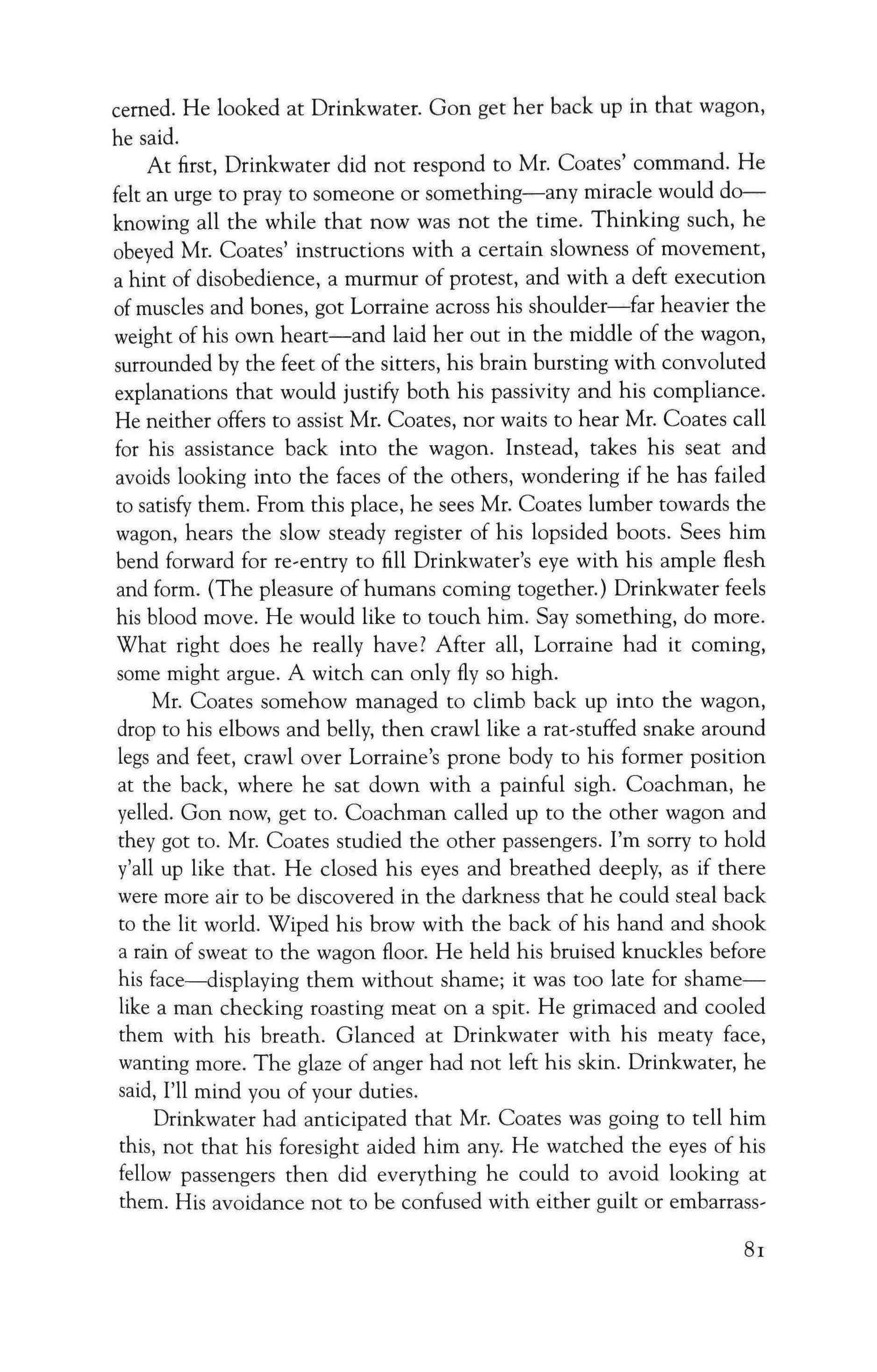
cemed. He looked at Drinkwater. Gon get her back up in that wagon, he said.
At first, Drinkwater did not respond to Mr. Coates' command. He felt an urge to pray to someone or something-any miracle would doknowing all the while that now was not the time. Thinking such, he obeyed Mr. Coates' instructions with a certain slowness of movement, a hint of disobedience, a murmur of protest, and with a deft execution of muscles and bones, got Lorraine across his shoulder-far heavier the weight of his own heart-and laid her out in the middle of the wagon, surrounded by the feet of the sitters, his brain bursting with convoluted explanations that would justify both his passivity and his compliance. He neither offers to assist Mr. Coates, nor waits to hear Mr. Coates call for his assistance back into the wagon. Instead, takes his seat and avoids looking into the faces of the others, wondering if he has failed to satisfy them. From this place, he sees Mr. Coates lumber towards the wagon, hears the slow steady register of his lopsided boots. Sees him bend forward for re-entry to fill Drinkwater's eye with his ample flesh and form. (The pleasure of humans coming together.) Drinkwater feels his blood move. He would like to touch him. Say something, do more. What right does he really have? After all, Lorraine had it coming, some might argue. A witch can only fly so high.
Mr. Coates somehow managed to climb back up into the wagon, drop to his elbows and belly, then crawl like a rat-stuffed snake around legs and feet, crawl over Lorraine's prone body to his former position at the back, where he sat down with a painful sigh. Coachman, he yelled. Gon now, get to. Coachman called up to the other wagon and they got to. Mr. Coates studied the other passengers. I'm sorry to hold y'all up like that. He closed his eyes and breathed deeply, as if there were more air to be discovered in the darkness that he could steal back to the lit world. Wiped his brow with the back of his hand and shook a rain of sweat to the wagon floor. He held his bruised knuckles before his face-displaying them without shame; it was too late for shamelike a man checking roasting meat on a spit. He grimaced and cooled them with his breath. Glanced at Drinkwater with his meaty face, wanting more. The glaze of anger had not left his skin. Drinkwater, he said, I'll mind you of your duties.
Drinkwater had anticipated that Mr. Coates was going to tell him this, not that his foresight aided him any. He watched the eyes of his fellow passengers then did everything he could to avoid looking at them. His avoidance not to be confused with either guilt or embarrass-
81
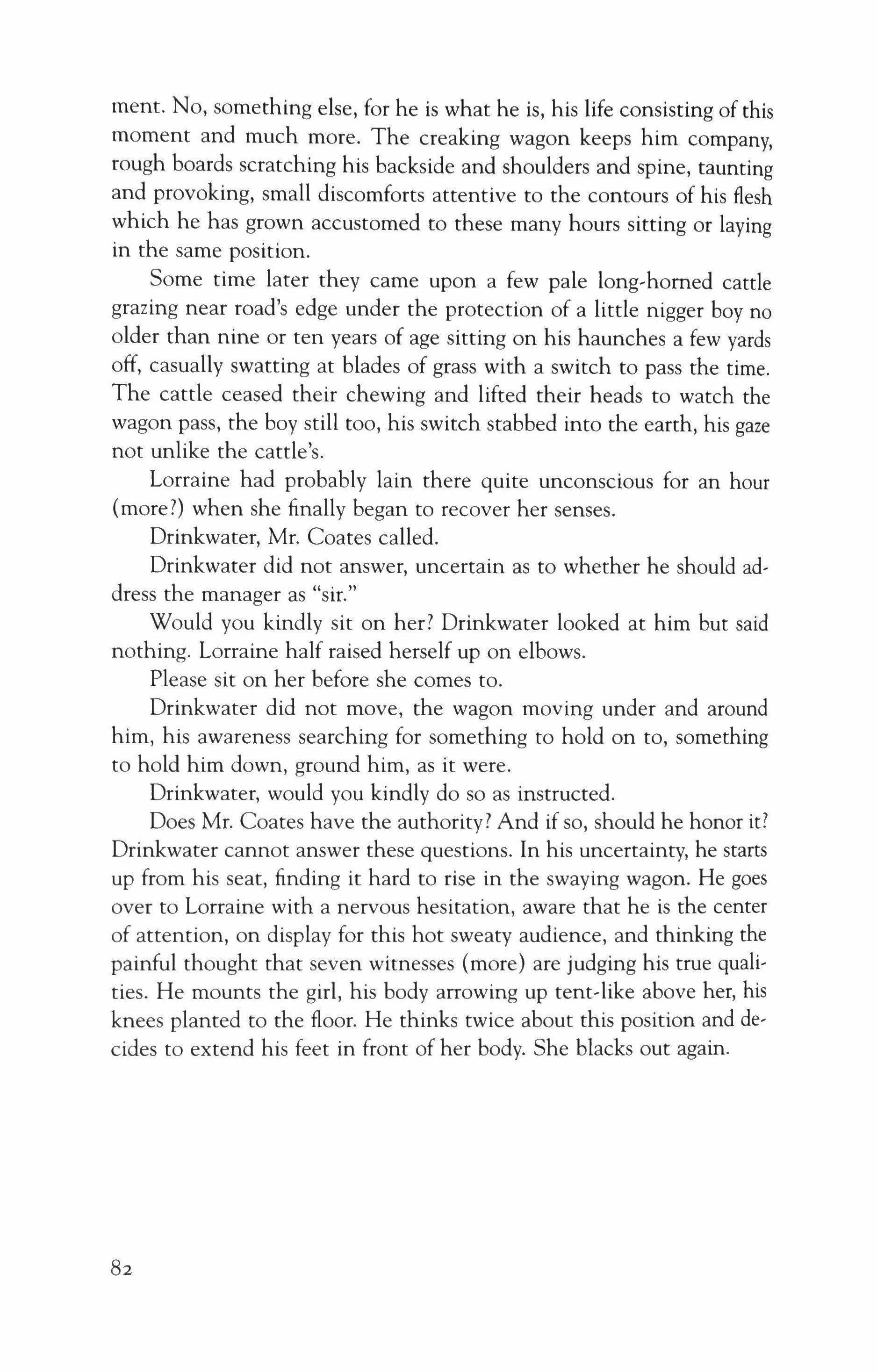
ment. No, something else, for he is what he is, his life consisting of this moment and much more. The creaking wagon keeps him company, rough boards scratching his backside and shoulders and spine, taunting and provoking, small discomforts attentive to the contours of his flesh which he has grown accustomed to these many hours sitting or laying in the same position.
Some time later they came upon a few pale long-horned cattle grazing near road's edge under the protection of a little nigger boy no older than nine or ten years of age sitting on his haunches a few yards off, casually swatting at blades of grass with a switch to pass the time. The cattle ceased their chewing and lifted their heads to watch the wagon pass, the boy still too, his switch stabbed into the earth, his gaze not unlike the cattle's.
Lorraine had probably lain there quite unconscious for an hour {more?} when she finally began to recover her senses.
Drinkwater, Mr. Coates called.
Drinkwater did not answer, uncertain as to whether he should address the manager as "sir."
Would you kindly sit on her? Drinkwater looked at him but said nothing. Lorraine half raised herself up on elbows.
Please sit on her before she comes to.
Drinkwater did not move, the wagon moving under and around him, his awareness searching for something to hold on to, something to hold him down, ground him, as it were.
Drinkwater, would you kindly do so as instructed. Does Mr. Coates have the authority? And if so, should he honor it?
Drinkwater cannot answer these questions. In his uncertainty, he starts up from his seat, finding it hard to rise in the swaying wagon. He goes over to Lorraine with a nervous hesitation, aware that he is the center of attention, on display for this hot sweaty audience, and thinking the painful thought that seven witnesses {more} are judging his true qualities. He mounts the girl, his body arrowing up tent-like above her, his knees planted to the floor. He thinks twice about this position and decides to extend his feet in front of her body. She blacks out again.
WingTekLum

A Young Girl in a Cheongsam
Based on a photograph from James Yin and Shi Young, The Rape ofNanking: An Undeniable History in Photographs
She is sitting with her cheongsam pulled up around her waist. She grimaces, eyes downcast, her face is near black. But her hands and legs in this photograph appear bleached out. Her cunt in the shadows of her crotch is a dark blur spread open by her fingers her nails neatly trimmed glinting in the sunlight. The outline of her inner lips stands out -two parts of an inverted Ywith the ridge of her clitoris protruding like a promontory overlooking a ravished valley.
Her cheongsam is the kind that so many other young girls also wore in those old days in China: the high collar, side opening, side slits at the hem. It is the kind of dress which my mother wore

when she was also young a dress slightly padded and with long sleeves for the winter a kind of dress that fills the photograph album that my mother brought with her when she came to Hawaii to be married before the war before the Japanese invaded.
There is an apocryphal story that my mother at one time interrupted her studies to visit relatives in Nanjing because of fighting in Shanghai. I do not know whether it was the Japanese then, more likely the warlords instead. There are still photographs of her stay in her album: younger cousins it seems crowded about her.
All the girls wear cheongsam some brighter than others some more distinctly patterned. Their faces are smiling, even glowing. How many were there ten years later? How many survived The Rape?
My mother died before I was aware of all the horrors in the world. I knew there had been a war, I knew she had been lucky to escape it. But those who were raped and those who were killed like this young girl spread out before me I would never have dared to contemplate.
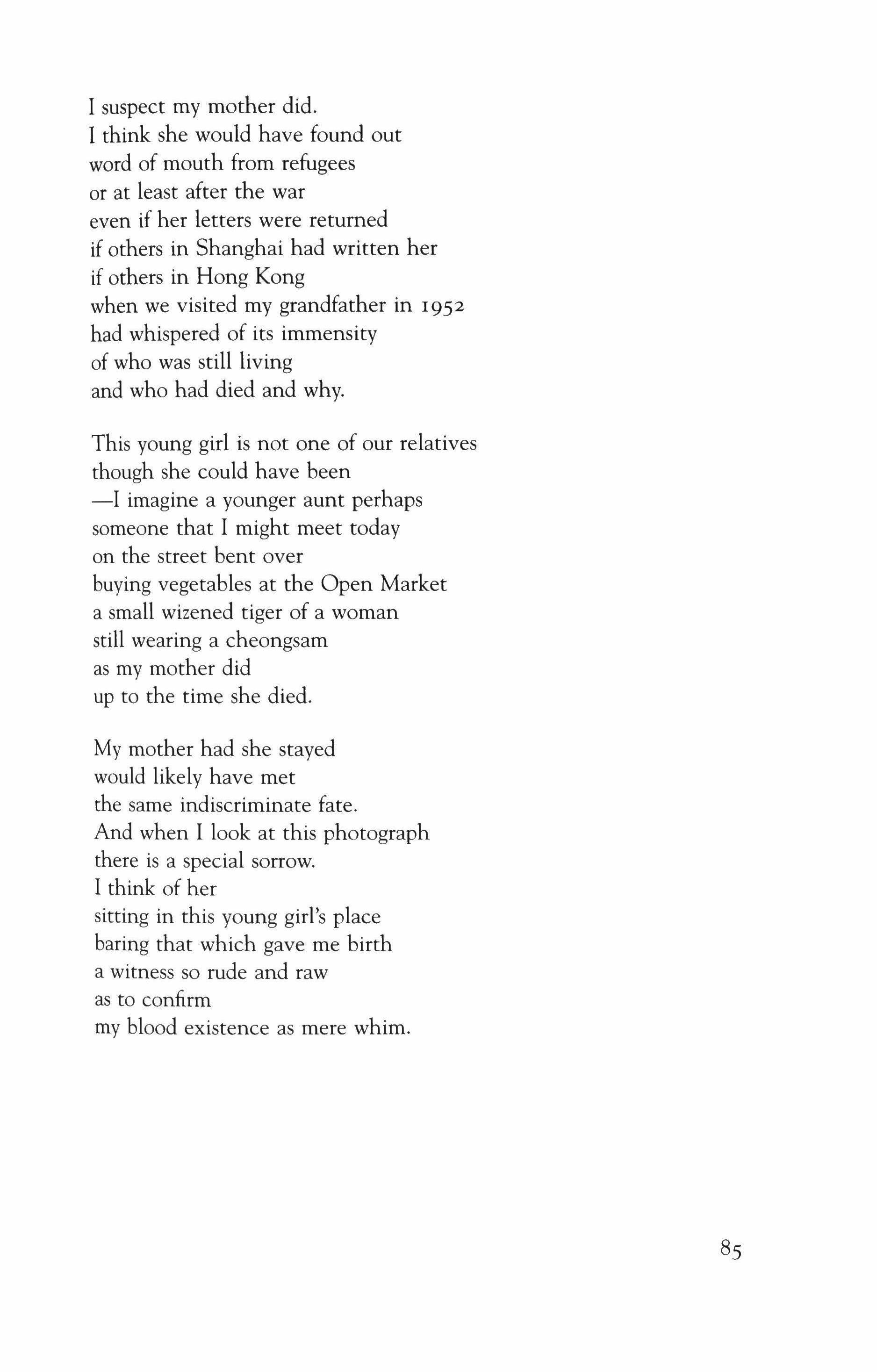
I suspect my mother did. I think she would have found out word of mouth from refugees or at least after the war even if her letters were returned if others in Shanghai had written her if others in Hong Kong when we visited my grandfather in 1952 had whispered of its immensity of who was still living and who had died and why.
This young girl is not one of our relatives though she could have been -I imagine a younger aunt perhaps someone that I might meet today on the street bent over buying vegetables at the Open Market a small wizened tiger of a woman still wearing a cheongsam as my mother did up to the time she died.
My mother had she stayed would likely have met the same indiscriminate fate. And when I look at this photograph there is a special sorrow. I think of her sitting in this young girl's place baring that which gave me birth a witness so rude and raw as to confirm my blood existence as mere whim.
85
Pragmatic

Inspired by an observation in R. J. Rummel, China's Bloody Century Ammunition and supplies need to be carried. Men from the village are press ganged. When a few drop from exhaustion, they are killed, and others are quickly found to take their places. Farmers are forced to wade through a manure pit to retrieve hidden valuables; though nothing is found, half of them freeze to death. When army rations taste bland, a family's cellar is plundered. A small town needs to be cowed, so the elders are beheaded in a square, the townspeople beseeching. A resistance fighter is caught; information must be tortured out of him. Too many prisoners of war have surrendered like cowardly dogs. There is no place to keep or feed them, so they are slaughtered en masse. New draftees need to practice bayonet charges, so prisoners are tied to stakes and stabbed repeatedly. When a machine gun needs to be tested, other prisoners are rounded up as targets. Factory workers are sent across a field that must be cleared of mines. When a teacher fails to bow, an officer as an example pummels him senseless. The watchdogs are hungry, and a man is bound to a tree, his flesh sliced off, strip by strip, to feed them. Young soldiers roaming the city need diversions: they raid homes for women to rape. A brother tries to protect his elder sister; he is summarily shot. Those women who protest or resist are killed as bothersome; the others who succumb are also killed to prevent them from speaking up. Some women that are kidnapped are kept in a hospital to wash clothes by day; throughout the night they are also raped. Houses are looted indiscriminately -money, food, jewelry, clothing, furniture-to be worn or sent back home. To hide the evidence, the houses
86
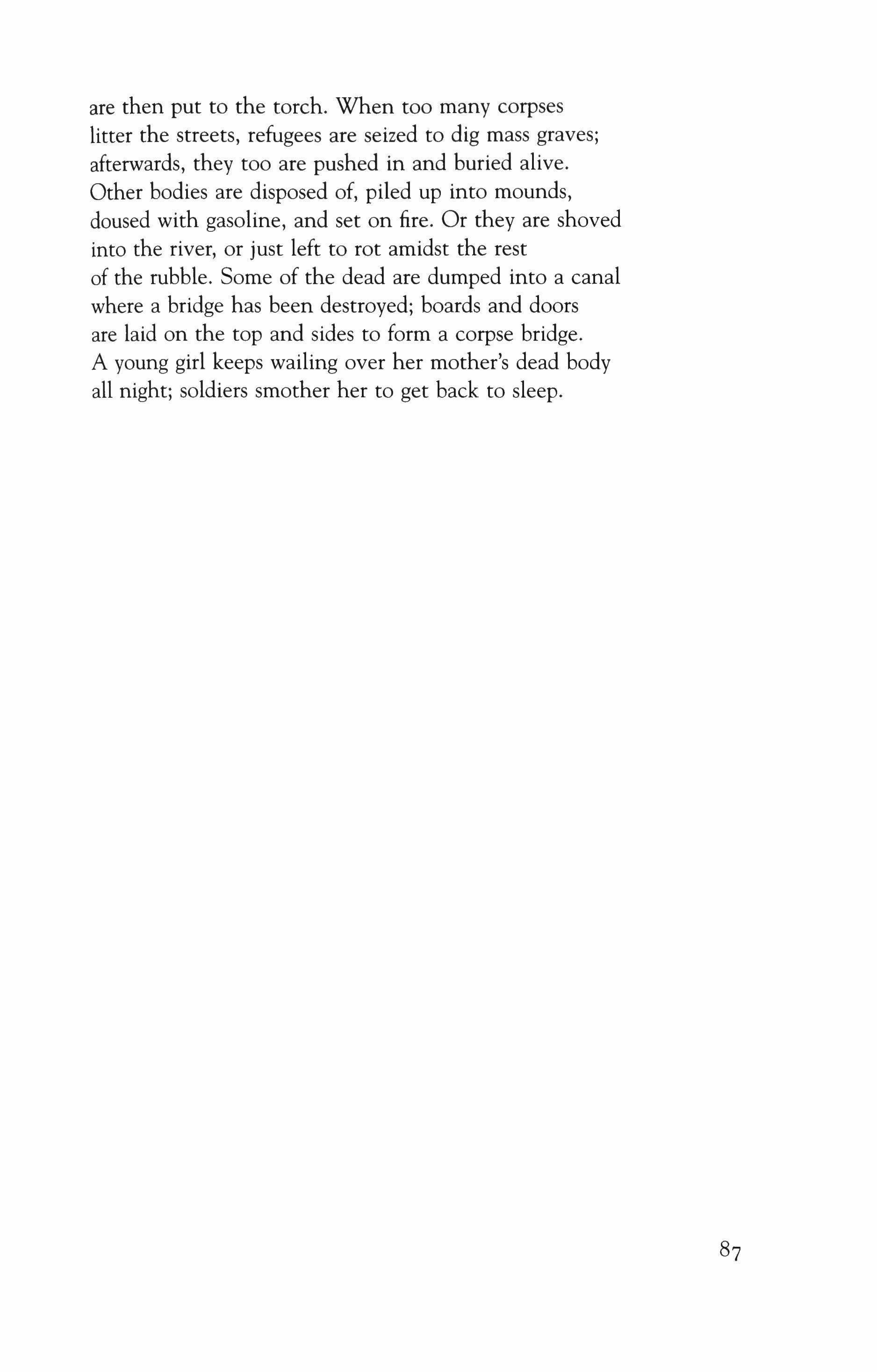
are then put to the torch. When too many corpses litter the streets, refugees are seized to dig mass graves; afterwards, they too are pushed in and buried alive. Other bodies are disposed of, piled up into mounds, doused with gasoline, and set on fire. Or they are shoved into the river, or just left to rot amidst the rest of the rubble. Some of the dead are dumped into a canal where a bridge has been destroyed; boards and doors are laid on the top and sides to form a corpse bridge. A young girl keeps wailing over her mother's dead body all night; soldiers smother her to get back to sleep.
Capricious
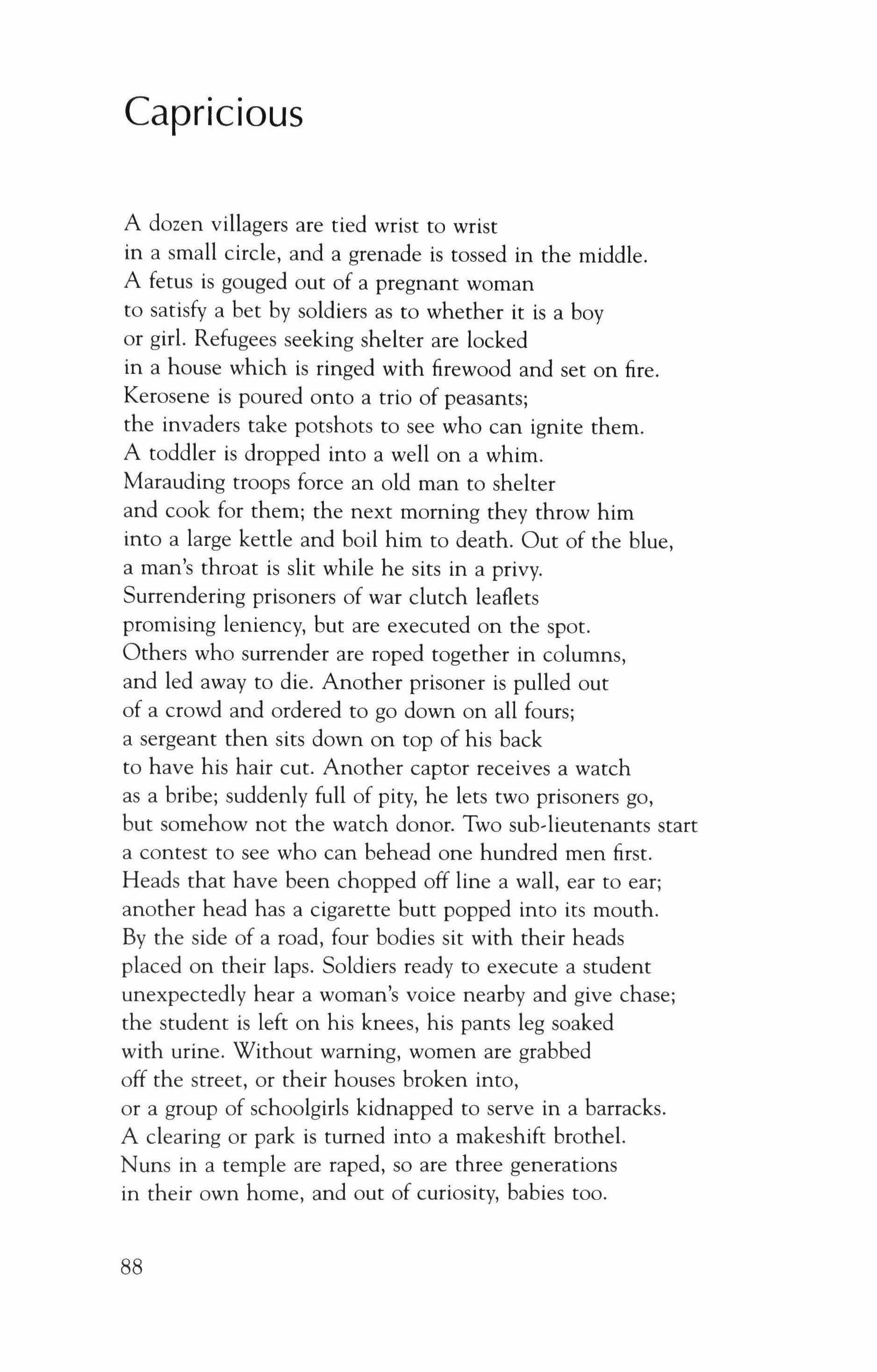
A dozen villagers are tied wrist to wrist in a small circle, and a grenade is tossed in the middle. A fetus is gouged out of a pregnant woman to satisfy a bet by soldiers as to whether it is a boy or girl. Refugees seeking shelter are locked in a house which is ringed with firewood and set on fire. Kerosene is poured onto a trio of peasants; the invaders take potshots to see who can ignite them. A toddler is dropped into a well on a whim. Marauding troops force an old man to shelter and cook for them; the next morning they throw him into a large kettle and boil him to death. Out of the blue, a man's throat is slit while he sits in a privy. Surrendering prisoners of war clutch leaflets promising leniency, but are executed on the spot. Others who surrender are roped together in columns, and led away to die. Another prisoner is pulled out of a crowd and ordered to go down on all fours; a sergeant then sits down on top of his back to have his hair cut. Another captor receives a watch as a bribe; suddenly full of pity, he lets two prisoners go, but somehow not the watch donor. Two sub-lieutenants start a contest to see who can behead one hundred men first. Heads that have been chopped off line a wall, ear to ear; another head has a cigarette butt popped into its mouth. By the side of a road, four bodies sit with their heads placed on their laps. Soldiers ready to execute a student unexpectedly hear a woman's voice nearby and give chase; the student is left on his knees, his pants leg soaked with urine. Without warning, women are grabbed off the street, or their houses broken into, or a group of schoolgirls kidnapped to serve in a barracks. A clearing or park is turned into a makeshift brothel. Nuns in a temple are raped, so are three generations in their own home, and out of curiosity, babies too.
88

A company marches back to their bivouac: interspersed within a sea of uniforms the pale white flesh of their captives stands out. Vaginas are stuffed with all manner of objects, even grenades; breasts are cut off. Flesh from a woman's thigh is used as filling for dumplings. A live heart is cut out as an appetizer to be served with wine. A guard is insulted seeing a young woman smoking in public; he forces her to strip naked, her hands bound behind with her belt. Returning home, she commits suicide. An old woman with bound feet is forced to stand on a tree stump for hours; each time she falls off she is propped back up.
Cornelius Eady

The Ghost, The Mountain
In the summer of 1999, Joe Wood, a young AfricanAmerican free-lance journalist, disappeared while taking a break at a conference to go bird-watching on Mount Rainier. Joe's writings were mainly concerned about racial identity in the United States, who we are - and the ways we perceive ourselves.
for Joe Wood
Where is he? Now that the woods are quiet, and the snow, April-thawed, has carved a bit more from the rocks
Now that the grass has spiked underfoot
Where is the young black man in his freshly-bought jacket and his Urban shoes, the city kid who loves birds?
Poetically speaking, in Heaven, surrounded With how the world works, Deep in the noise
Of transformation,
Swimming the way a rock Moves through time.
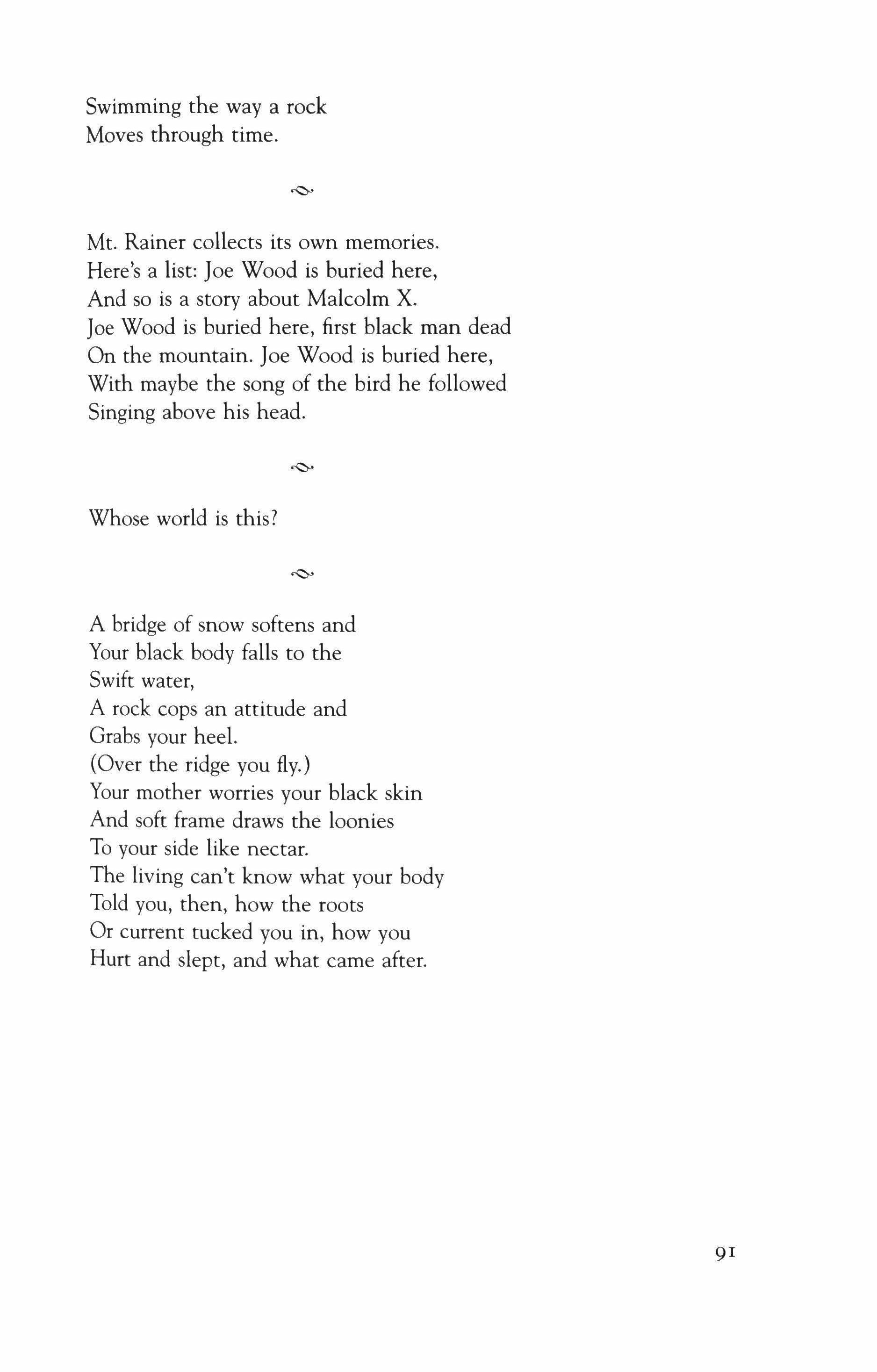
Mt. Rainer collects its own memories. Here's a list: Joe Wood is buried here, And so is a story about Malcolm X. Joe Wood is buried here, first black man dead On the mountain. Joe Wood is buried here, With maybe the song of the bird he followed Singing above his head.
Whose world is this?
A bridge of snow softens and Your black body falls to the Swift water, A rock cops an attitude and Grabs your heel. (Over the ridge you fly.)
Your mother worries your black skin And soft frame draws the loonies
To your side like nectar. The living can't know what your body Told you, then, how the roots Or current tucked you in, how you Hurt and slept, and what came after.
91
A ranger says: This ain't Central Park. What to do with you?
They want you to be anyone, but the nuances Won't sit still:
A black man disappears on a perfect afternoon Into thin, high air; now history worries into A slow day's work. They hope snowmelt Will confirm your plain dumb luck.

If a black man falls in the forest?
The tom-torn cries, and the tom'tom laughs. On a ridge
Your ex-lover buries her earring and ring. Her scent to keep you company. The tom'tom cries, and the tom'tom laughs. At home
Your mother boxes your things, won't Eat the fruit you left behind, wonders How you were evicted.
Where is the young black man?
There is a blues that says Gone, never coming back.
Where is the young black man?
There is a blues to rise the spirits, Another to keep them off your door.

Where is the young black man?
There is a blues that says Rambling, can't keep still, But longs for four walls, And arms that can hold you, Keep you steady.
Where is the young black man?
There is a blues that howls the way The wind howls through the trees.
Where is the young black man?
There is a blues that tells us Somebody doesn't have a home, Following the engine's high whistle, Falling to sleep beneath those pines.
93
The Hunt

Yellow Dog Pete came to greet me teeth bared, hair standing on end like he seen the devil but he just seen the slaves run off and was trying to warn me that's all.
I called Black Bob, Issum, Laura and Florabelle, but hell and damnation, they were gone, leaving me two useless babies and no mammy to nurse 'em.
I knew what had happened, knew the minute those Seminoles came to Indian Territory with their slaves. 'Gave them too much freedom if you ask me. "Now see," I said to Florence, my Choctaw wife and helpmate, "now we got to go get 'em."
She didn't say a word almost like she hadn't heard what I told her, but she was like that. Already had her sun hat on, pants on under her skirt, six guns strapped to her like a man. She said, "hand me that whip" and I did it. I always did what she said. I knew from experience where I stood when she was set on doing something. It was no good trying to change her mind,
Ai
94

so I climbed on my horse and we rode over to her uncle's. There we met up with some Paddy Rollers the Cherokees had sent to catch their slaves. They were Irish like me, but redhaired foulmouthed and foul smelling and their Cherokee companion couldn't hide his disdain each time they claimed to be experts at hunting slaves. All the same, we went along with them to find our property. Had to catch 'em before they got clean to Mexico before they got free.
If you ask me, freedom's overrated, but I never been a slave, unless you consider marriage a form of slavery. Marriage to Florence was give and take. Mostly I gave for harmony's sake. She was royalty, or something, I don't know, but they all owned slaves, all those civilized tribes in Indian Territory, and that bunch of Choctaws and Cherokees in Texas where Florence came from, all of 'em kept cattle and chattel, horses, hogs, chickens, and dogs for hunting. In other words, they were rich in their fashion, so I didn't see anything wrong with marrying an Indian. Why everybody thought the slaves were mine, but they were hers and she was going to bring them back. I knew just looking at how she sat her horse she was determined and I was too, just not as much. I tried to stay awake, but finally, after twenty-four hours in the saddle, I cried "for Chrissakes, stop and take a rest, take a shit, or something as long as we get off these horses." Miraculously, they listened to me, the Paddy's and Florence, but I could tell she was mad, but that went away when I pinned her down and had my way. Then I went to sleep.
95

When I woke up, she was gone. Left me a note on the back of a runaway slave poster. Yes, she could read and write. She'd been taught by white Methodists. Anyway, the note said she'd be back directly. A Cherokee had sent a message about where the slaves might be and she was going to have a looksee. She took the others with her.
I was relieved. I didn't want to see the slaves' faces when they got caught, didn't want to whip 'em though I knew I ought to being the master and all.
'Bout midday, I saw riders coming my way. Pretty soon, I knew who they were because I recognized Florence's skirt flapping in the wind.
When they got close, I could see Laura, Florabelle and three slaves who must have belonged to the Cherokees. Florence didn't say much, just told me the rest of 'em got away. We rode home in silence, except for Laura crying and carrying on. When she screamed she'd run away again, Florence turned her horse around got off and whipped Laura to the ground. That's when I found my manhood, grabbed that whip and threw it down.
My horse trampled it. When I was finished, I helped Laura up and she staggered toward home, as we followed, resigned to our fates, masters and slaves, bound to each other by the iron chains of race.
Fatherhood

I am at the "Great Brooklyn Irish Fair" of 1978, sitting on a curb with my husband eating boiled potatoes, when a stocky, red-faced man standing nearby asks, "are they good?"
We answer, "yes," in unison and the man smiles, nods and staggers away. This is supposed to be a celebration of Irish heritage, but to me, it's a combination flea market, street fair and drunken family picnic with food stalls, where people sell funnel cakes, hot dogs and Polish sausages, things we might eat at another time but do not speak to us today, thus when we find the stall that advertises only boiled potatoes, we stop and purchase two without butter.
My husband, Lawrence Michael, at least looks Irish. He's dark haired, pale skinned, bums easily in the sun, but rarely drinks alcohol, or beer and doesn't fit the Irish stereotype, While I am multiracial with some Irish on my mother's side. I come from a family of heavy drinkers and tale tellers and I am Catholic, but I don't look Irish at all, yet fall under the umbrella of Irishness, especially with a potato in my hand.
I guess the man smiled at us because we weren't ashamed to admit the potatoes tasted good, or maybe because it proved we were Irish or something like it.
Perhaps he divined in me a story
97
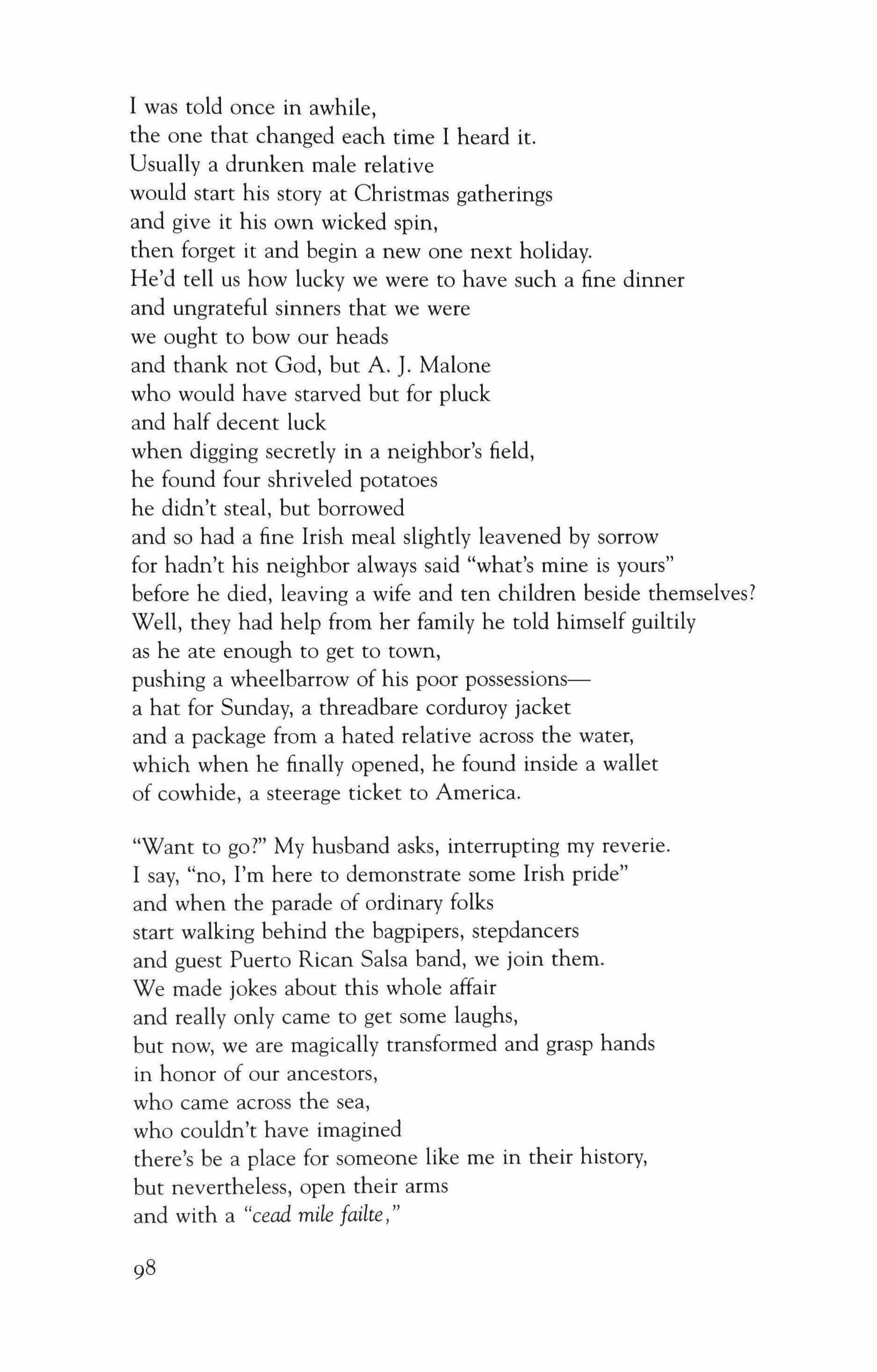
I was told once in awhile, the one that changed each time I heard it. Usually a drunken male relative would start his story at Christmas gatherings and give it his own wicked spin, then forget it and begin a new one next holiday. He'd tell us how lucky we were to have such a fine dinner and ungrateful sinners that we were we ought to bow our heads and thank not God, but A. J. Malone who would have starved but for pluck and half decent luck when digging secretly in a neighbor's field, he found four shriveled potatoes he didn't steal, but borrowed and so had a fine Irish meal slightly leavened by sorrow for hadn't his neighbor always said "what's mine is yours" before he died, leaving a wife and ten children beside themselves? Well, they had help from her family he told himself guiltily as he ate enough to get to town, pushing a wheelbarrow of his poor possessionsa hat for Sunday, a threadbare corduroy jacket and a package from a hated relative across the water, which when he finally opened, he found inside a wallet of cowhide, a steerage ticket to America.
"Want to go?" My husband asks, interrupting my reverie. I say, "no, I'm here to demonstrate some Irish pride" and when the parade of ordinary folks start walking behind the bagpipers, stepdancers and guest Puerto Rican Salsa band, we join them. We made jokes about this whole affair and really only came to get some laughs, but now, we are magically transformed and grasp hands in honor of our ancestors, who came across the sea, who couldn't have imagined there's be a place for someone like me in their history, but nevertheless, open their arms and with a "cead mile failte,"

welcome the great, great, great granddaughter of A. J. Malone who traveled long ago from Derry to the Texas prairie to marry, beget nine children and grow old, having sown his green seeds among half-breeds, who bore his name in pride and shame, knowing that whatever they became, they would remain his children. I can hear him whispering to me, above the music and the noise of this conglomeration, "Aisling, Aisling." In Gaelic, that means vision, or dream. It means I see him staggering away, having given me this day my daily bread among the living and the living dead.
99
Harold Schechter
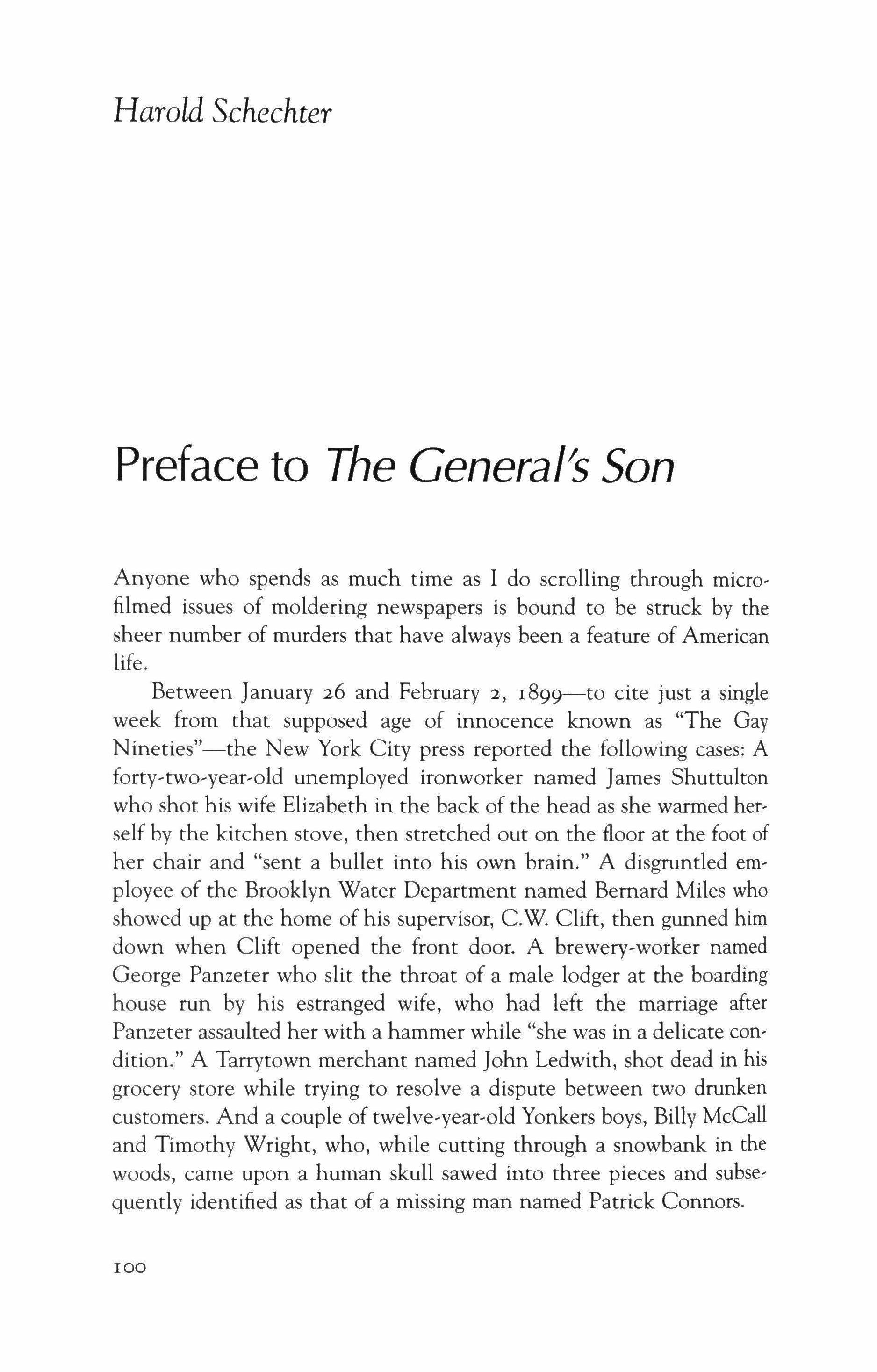
Preface to The General's Son
Anyone who spends as much time as I do scrolling through microfilmed issues of moldering newspapers is bound to be struck by the sheer number of murders that have always been a feature of American life.
Between January 26 and February 2, 1899-to cite just a single week from that supposed age of innocence known as "The Gay Nineties"-the New York City press reported the following cases: A forty-two-year-old unemployed ironworker named James Shuttulton who shot his wife Elizabeth in the back of the head as she warmed herself by the kitchen stove, then stretched out on the floor at the foot of her chair and "sent a bullet into his own brain." A disgruntled employee of the Brooklyn Water Department named Bernard Miles who showed up at the home of his supervisor, C.W. Clift, then gunned him down when Clift opened the front door. A brewery-worker named George Panzeter who slit the throat of a male lodger at the boarding house run by his estranged wife, who had left the marriage after Panzeter assaulted her with a hammer while "she was in a delicate condition." A Tarrytown merchant named John Ledwith, shot dead in his grocery store while trying to resolve a dispute between two drunken customers. And a couple of twelve-year-old Yonkers boys, Billy McCall and Timothy Wright, who, while cutting through a snowbank in the woods, came upon a human skull sawed into three pieces and subsequently identified as that of a missing man named Patrick Connors.
100

And those were just the local homicides. During the same span of time, forty-four-year-old Bradford Knights of Gardiner, Maine shot and killed his twenty-two-year-old sister-in-law, Miss Mamie Small, when she "repelled his attentions." A young man named Frank Blair, crazed by jealousy, gunned down his ex-girlfriend, Mary Anderson, and her new beau, Edward Brovard, in Lima, Ohio. Another Ohioan, a farmer named John Gifford, fired a shotgun into the face of his neighbor, Edward Kuch, killing him instantly. A man named H. Wurster, the night telegraph operator of the Philadelphia and Reading Railway Company, was slain at his Bethlehem home during a robbery. And the bodies of Mrs. John Gilbert and all four of her children (a nine-year-old boy and three girls aged three, five, and seven) were found dead in their home in Clay Center, Kansas.
There is, I suppose, some perverse comfort to be derived from old crime stories like these: a reassuring sense that-contrary to popular belief-we do not live in uniquely degenerate times. Any latter-day Miniver Cheevys who pine for the ostensible graces of a bygone age would do well to spend a little time poring over old "penny papers" and turn-of-the-century tabloids. As Cheevy's creator, the poet E.A. Robinson, understood, violence and corruption were no less rife in the past than in the present. Indeed, when such commonplace nineteenthcentury horrors as Southern lynchings and assorted frontier butcheries are factored in, it can be argued that things were a great deal worse in the supposed "good old days."
It's not surprising, of course, that most people have no idea just how violent American life was in the last century. For one thing, we are all prone to mythicize the past as a vanished Golden Age. For another, most murders, even exceptionally brutal ones, received very little publicity. To be sure, they were generally reported in the news. The journalistic aphorism "If it bleeds, it leads" has always been the guiding principle of the popular press-at least since the time ofJames Gordon Bennett, founder of the first unabashedly sensationalistic newspaper, the New York Herald.
Bennett knew, however, that a murder had to possess certain special attributes to really hold the interest of his readers. "Men who have killed their wives and committed other such every-day matters have been condemned, executed, and are forgotten," he declared in 1842. "But it takes a deed that has some of the sublime of horror about it to attract attention, rally eloquence and energy, and set people crazy."!
Bennett was wrong about one thing, though. Depending on circumstances, even a crime as commonplace as wife-murder can gener-
101

ate an enormous degree of public fascination-as, in our own time, the sorry saga of o. J. Simpson proves. What turns a case of homicide into a cultural phenomenon isn't simply its quality of what Bennett calls "sublime" horror-the sheer, hair-raising awfulness of the crime. The annals of murder in this country are full of atrocities that few people, beyond forensic specialists, have ever heard of-a fact that can be easily confirmed (for those with the necessary degree of morbid curiosity, as well as extremely strong stomachs) by a glance at such texts as J. Paul de River's The Sexual Criminal (1949) and Vernon J. Geberth's Sex-Related Homicide and Death Investigation (2003). Carl Panzram-a pitiless hardcase who lived by the motto "Rob 'em all! Rape 'em all! Kill 'em all!"-cheerfully confessed to nearly two-dozen homicides before his execution in 1930. And yet, apart from aficionados of serial murder, no one has ever heard of him.
To be sure, there are serial killers who have become grim household names: Dahmer, Bundy, Gacy, Manson. By and large, however, the murder cases that became bona fide sensations during the past centurythat "set people crazy," in James Gordon Bennett's phrase--did not involve wholesale slaughter. During the 1920S, for example, a maniac named Earle Leonard Nelson conducted a cross-country killing spree, leaving twenty-two strangled women in his wake. Though his depredations received widespread news coverage, it wasn't the "Gorilla Murderer" (as the tabloids dubbed him) that became the object of a nationwide obsession, but rather a pair of pampered young sociopaths, Nathan Leopold and Richard Loeb, who fatally bludgeoned a single victim.
A few years later, the entire country was riveted by the sordid tale of a wayward Queens housewife named Ruth Snyder and her hapless lover-boy, a mild-mannered corset salesman named Judd Gray, who conspired to bump off Snyder's husband. Another Jazz Age sensation was the Hall-Mills murder case whose victims, a 41-year-old Episcopal minister and his choir-girl mistress, were found brutally slain in a New Jersey apple orchard-a crime for which the reverend's elderly widow, along with her two brothers and a male cousin, were eventually tried and acquitted.
Though these cases possessed plenty of prurient interest, it wasn't the sex and violence per se that turned them into cultural phenomena. After all, other contemporary crimes were at least as lurid-like that of Clara Phillips (aka the "Tiger Woman"), a former showgirl who used a clawhammer to bludgeon to death the mistress of her stockbroker husband in 1922. No, what made Leopold and Loeb et al so transfix-
102

ing was the way these cases seemed to embody the cultural preoccupations of the day. In these real-life melodramas of college-age "thrill killers," oversexed housewives, and adulterous clergymen, the Jazz Age public saw reflected the free-floating fears, fantasies, and obsessions of the era: issues having to do with the wild excesses of the young, the threatening freedoms asserted by the "New Woman," the breakdown of traditional morality. In short-with their titillating stories, emblematic characters, and resonant meanings-these crimes made for irresistibly compelling theater.
Like all theater, of course, these and other once-sensational crimes have met different fates. Some have become enduring classics. Interest in the Leopold and Loeb case, for example, never seems to wane (three movies and a bestselling novel have been based on it); while the Ruth Snyder-Judd Gray case lives on in the transmogrified form of the great film noir, Double Indemnity. The Halls-Mills case, on the other handlike Abie's Irish Rose, George White's Scandals, Al Jolson's The Singing Fool, and other pop sensations of the Roaring Twenties-has longsince faded from public memory.
For at least one culture critic, however, the Hall-Mills murder case possesses a significance that outstrips even that of its better-known counterparts. In his 1998 book, Life the Movie, Neal Gabler examines the way the American media has turned every aspect of realitycrime, politics, even art and literature-into a "branch of show business, where the overriding objective is getting and satisfying an audience." For Gabler, this "conversion of life into an entertainment medium" is the defining feature of our time: "the single most important cultural transformation in this country in the twentieth century." And a watershed event in that process, according to Gabler, was the HallMills murder case, which he describes as "the longest-running" real-life crime drama in America up to that point. "No trial heretofore had been as dramatically staged or as heavily exploited as Mrs. Hall's," he writes.2
As it happens, Gabler's point was anticipated by a critic named Charles Merz who, in a 1927 article for Harper's Monthly Magazine, argued that the sensational murder trial had become our nation's favorite form of media spectacle-"our Roman circus," offering the ordinary American "a vicarious thrill in other people's vices" and a chance to "revel in strange crimes." 3
For Merz, as for Gabler, modem innovations-from the newsreel camera to the electronic switchboard-made it possible for the media
103
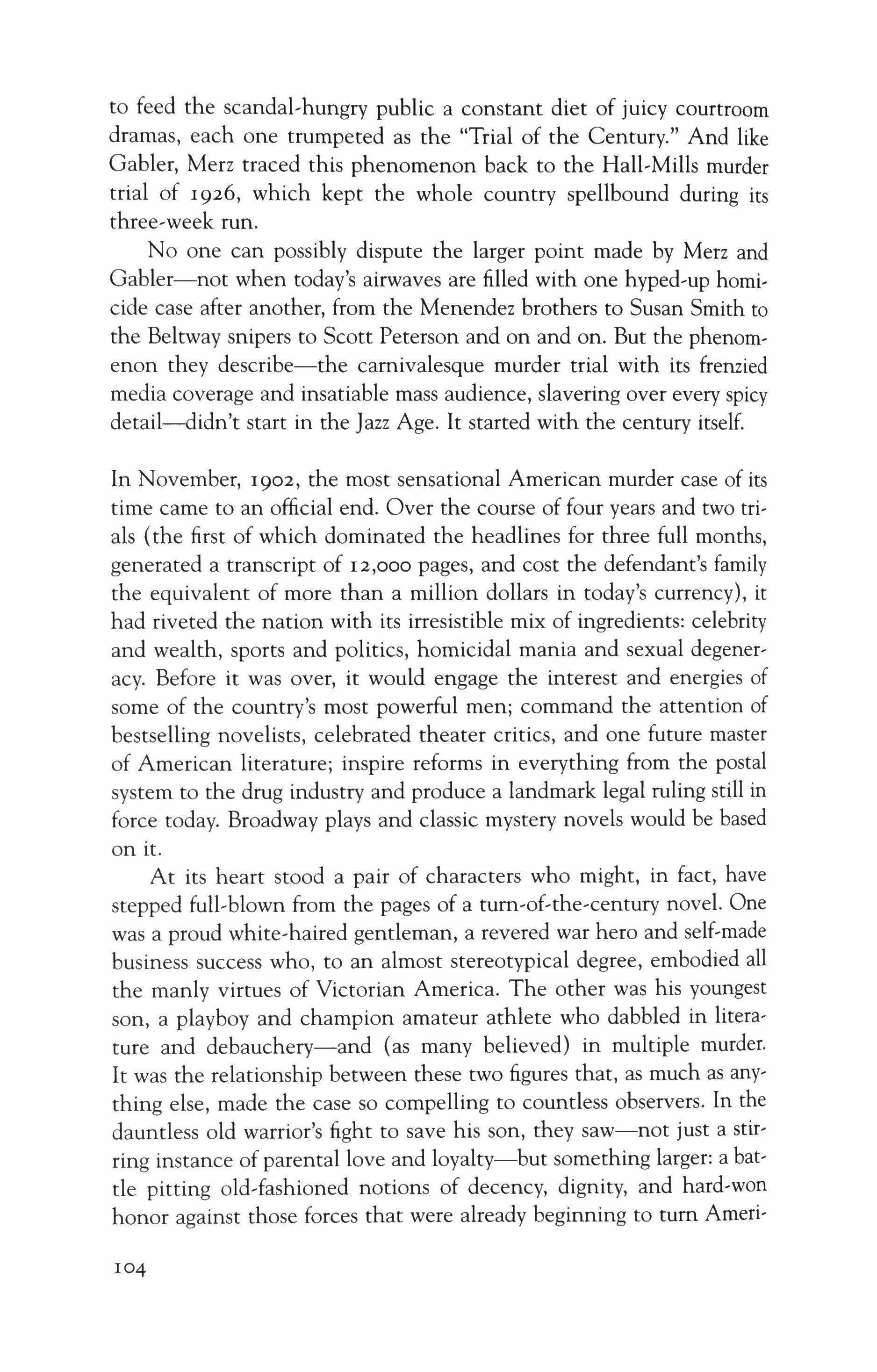
to feed the scandal-hungry public a constant diet of juicy courtroom dramas, each one trumpeted as the "Trial of the Century." And like Gabler, Merz traced this phenomenon back to the Hall-Mills murder trial of 1926, which kept the whole country spellbound during its three-week run.
No one can possibly dispute the larger point made by Merz and Gabler-not when today's airwaves are filled with one hyped-up homicide case after another, from the Menendez brothers to Susan Smith to the Beltway snipers to Scott Peterson and on and on. But the phenomenon they describe-the carnivalesque murder trial with its frenzied media coverage and insatiable mass audience, slavering over every spicy detail-didn't start in the Jazz Age. It started with the century itself.
In November, 1902, the most sensational American murder case of its time came to an official end. Over the course of four years and two trials (the first of which dominated the headlines for three full months, generated a transcript of 12,000 pages, and cost the defendant's family the equivalent of more than a million dollars in today's currency), it had riveted the nation with its irresistible mix of ingredients: celebrity and wealth, sports and politics, homicidal mania and sexual degeneracy. Before it was over, it would engage the interest and energies of some of the country's most powerful men; command the attention of bestselling novelists, celebrated theater critics, and one future master of American literature; inspire reforms in everything from the postal system to the drug industry and produce a landmark legal ruling still in force today. Broadway plays and classic mystery novels would be based on it.
At its heart stood a pair of characters who might, in fact, have stepped full-blown from the pages of a turn-of-the-century novel. One was a proud white-haired gentleman, a revered war hero and self-made business success who, to an almost stereotypical degree, embodied all the manly virtues of Victorian America. The other was his youngest son, a playboy and champion amateur athlete who dabbled in literature and debauchery-and (as many believed) in multiple murder. It was the relationship between these two figures that, as much as anything else, made the case so compelling to countless observers. In the dauntless old warrior's fight to save his son, they saw-not just a stirring instance of parental love and loyalty-but something larger: a battle pitting old-fashioned notions of decency, dignity, and hard-won honor against those forces that were already beginning to turn Ameri-
104
can society into a nonstop media circus of scandal, gossip, and fifteenminute fame. Spanning the years from 1898 to 1902 (and reverberating far beyond), the case not only straddled two eras but presaged the cultural transformation to come as the nineteenth century gave way to the modem age.
It was known as "The Molineux Affair"-and, in more ways than one, it was the crime that ushered in the twentieth century.
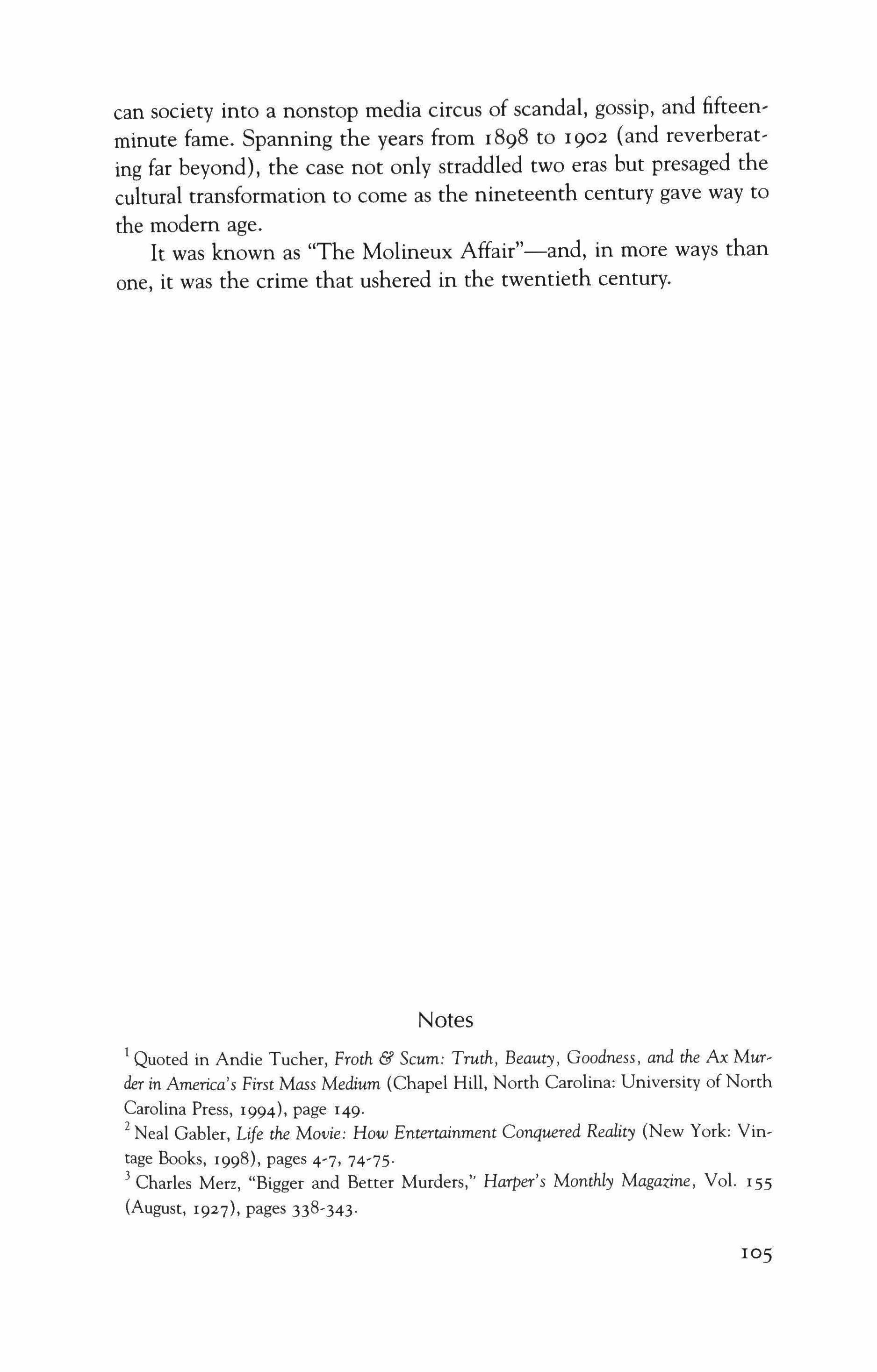
Notes
1 Quoted in Andie Tucher, Froth & Scum: Truth, Beauty, Goodness, and the Ax Murder in America's First Mass Medium (Chapel Hill, North Carolina: University of North Carolina Press, 1994), page 149.
2 Neal Gabler, Life the Movie: How Entertainment Conquered Reality (New York: Vintage Books, 1998), pages 4-7, 74-75.
3 Charles Merz, "Bigger and Better Murders," Harper's Monthly Magazine, Vol. ISS (August, 1927), pages 338-343.
Jill Bialosky
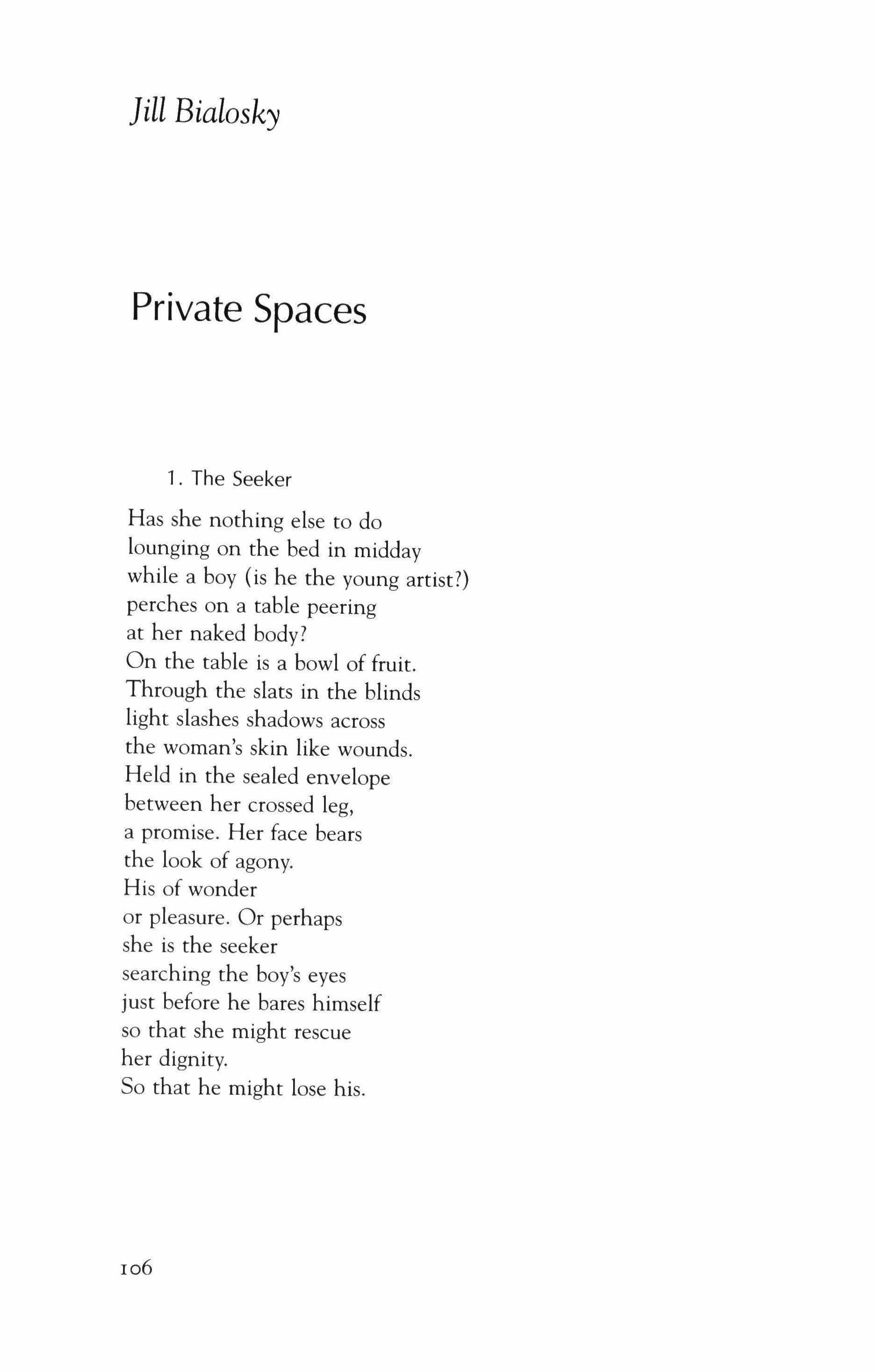
Private Spaces
1. The Seeker
Has she nothing else to do lounging on the bed in midday while a boy (is he the young artist?) perches on a table peering at her naked body?
On the table is a bowl of fruit. Through the slats in the blinds light slashes shadows across the woman's skin like wounds. Held in the sealed envelope between her crossed leg, a promise. Her face bears the look of agony. His of wonder or pleasure. Or perhaps she is the seeker searching the boy's eyes just before he bares himself so that she might rescue her dignity. So that he might lose his.
106
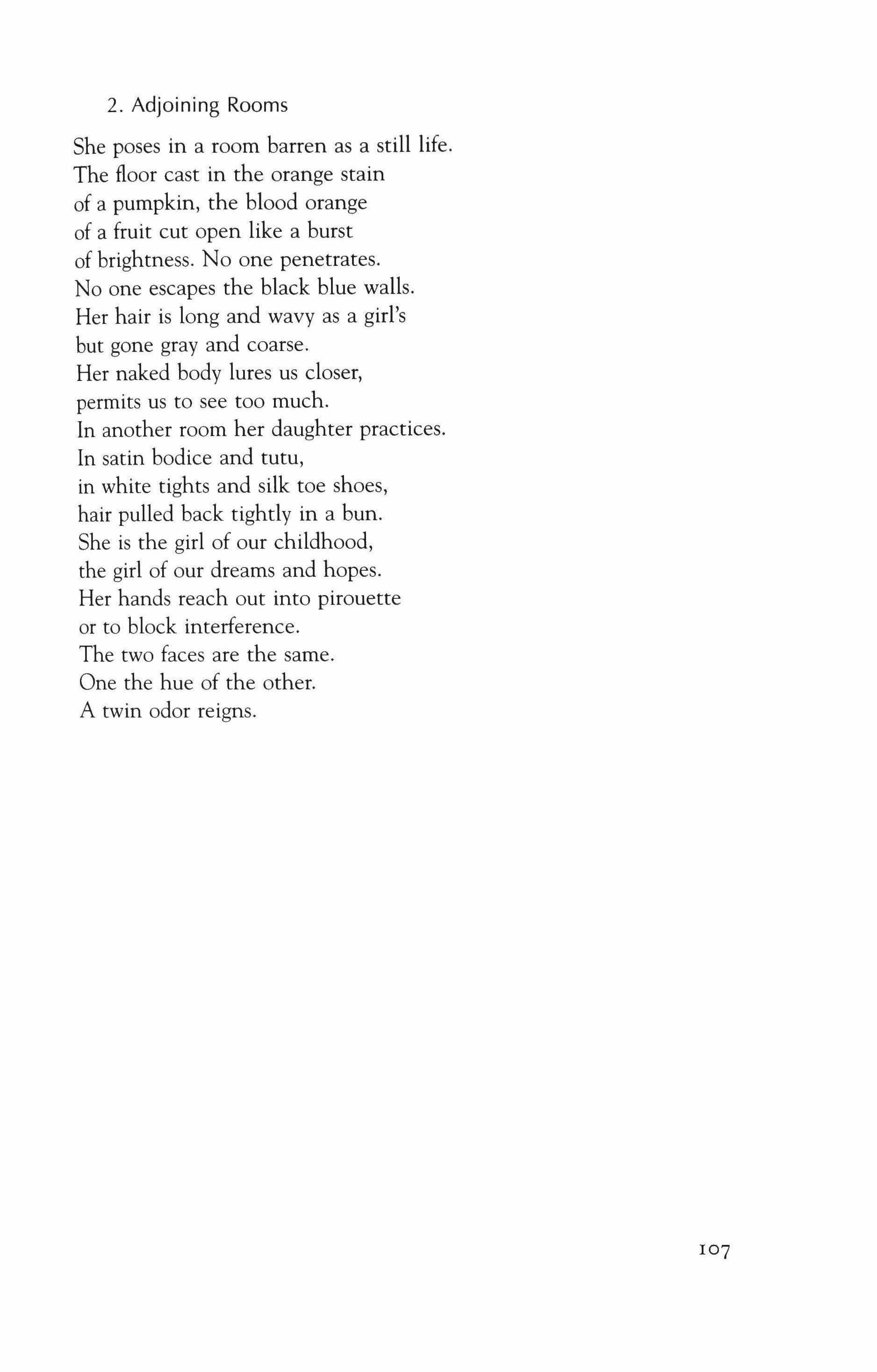
2. Adjoining Rooms
She poses in a room barren as a still life. The floor cast in the orange stain of a pumpkin, the blood orange of a fruit cut open like a burst of brightness. No one penetrates. No one escapes the black blue walls. Her hair is long and wavy as a girl's but gone gray and coarse. Her naked body lures us closer, permits us to see too much. In another room her daughter practices. In satin bodice and tutu, in white tights and silk toe shoes, hair pulled back tightly in a bun. She is the girl of our childhood, the girl of our dreams and hopes. Her hands reach out into pirouette or to block interference. The two faces are the same. One the hue of the other. A twin odor reigns.
107
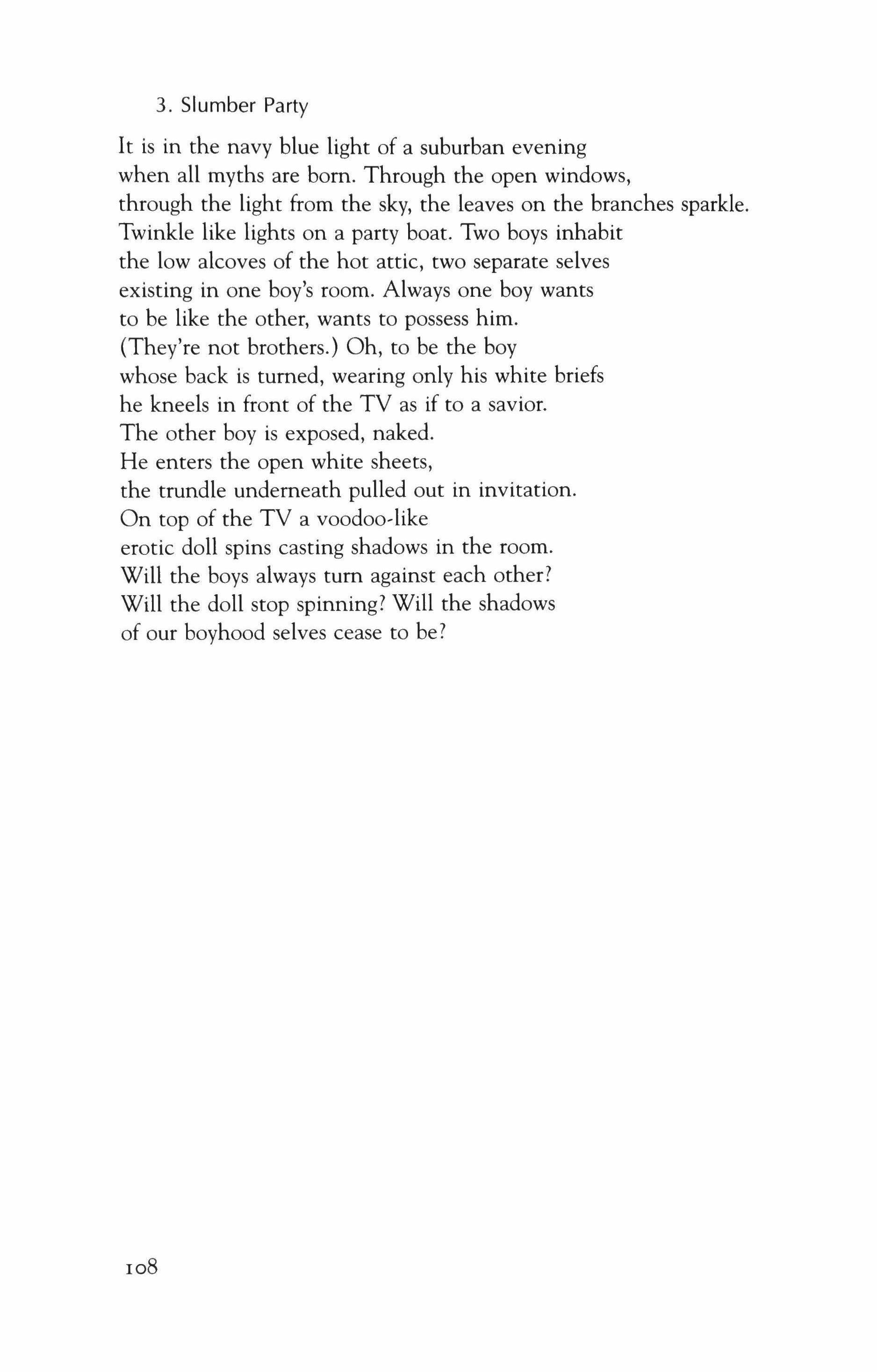
3. Slumber Party
It is in the navy blue light of a suburban evening when all myths are born. Through the open windows, through the light from the sky, the leaves on the branches sparkle. Twinkle like lights on a party boat. Two boys inhabit the low alcoves of the hot attic, two separate selves existing in one boy's room. Always one boy wants to be like the other, wants to possess him. (They're not brothers.) Oh, to be the boy whose back is turned, wearing only his white briefs he kneels in front of the TV as if to a savior. The other boy is exposed, naked. He enters the open white sheets, the trundle underneath pulled out in invitation. On top of the TV a voodoo-like erotic doll spins casting shadows in the room. Will the boys always tum against each other? Will the doll stop spinning? Will the shadows of our boyhood selves cease to be?
108
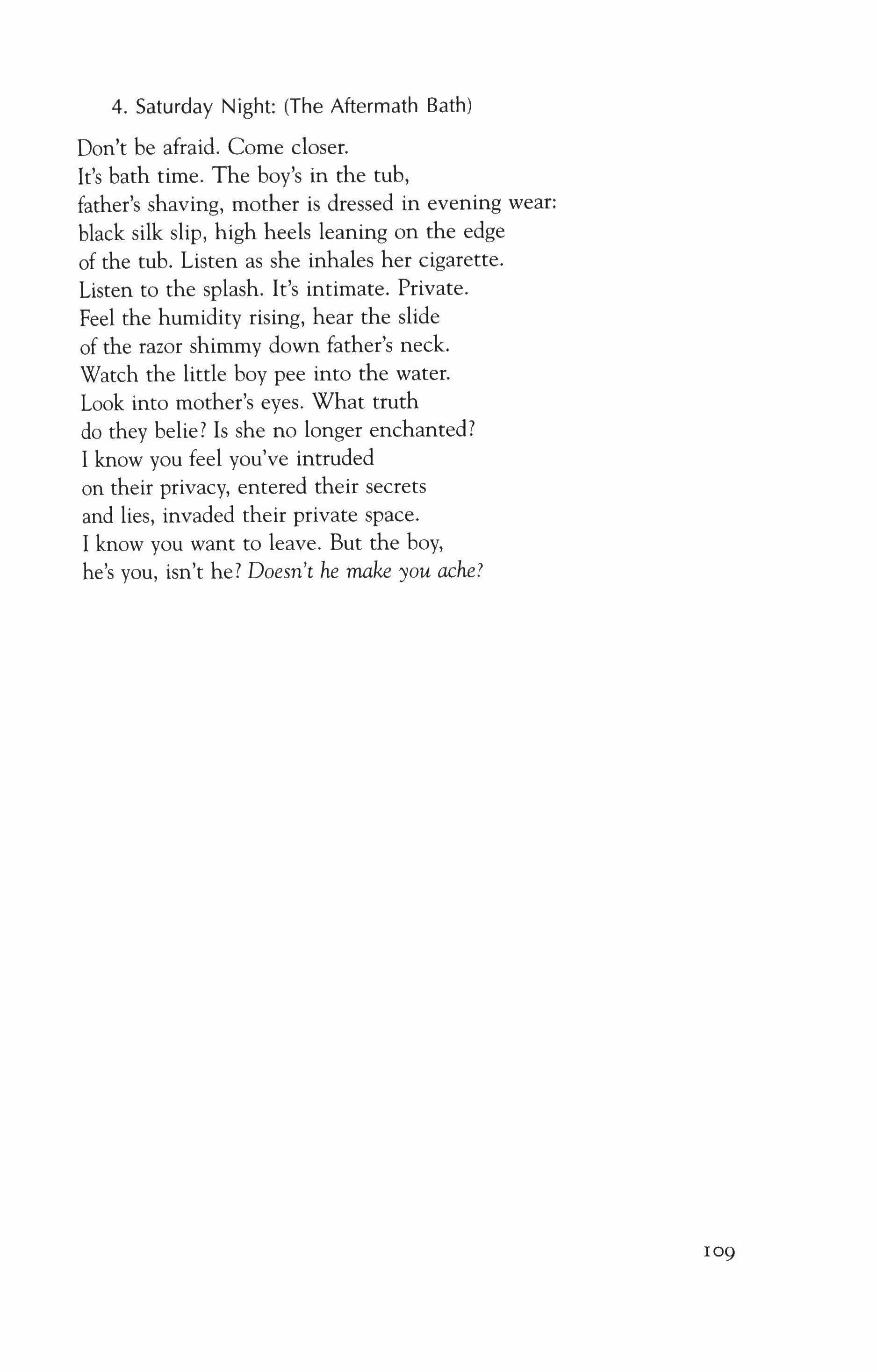
4. Saturday Night: (The Aftermath Bath)
Don't be afraid. Come closer. It's bath time. The boy's in the tub, father's shaving, mother is dressed in evening wear: black silk slip, high heels leaning on the edge of the tub. Listen as she inhales her cigarette. Listen to the splash. It's intimate. Private. Feel the humidity rising, hear the slide of the razor shimmy down father's neck. Watch the little boy pee into the water. Look into mother's eyes. What truth do they belie? Is she no longer enchanted? I know you feel you've intruded on their privacy, entered their secrets and lies, invaded their private space. I know you want to leave. But the boy, he's you, isn't he? Doesn't he make you ache?
I09
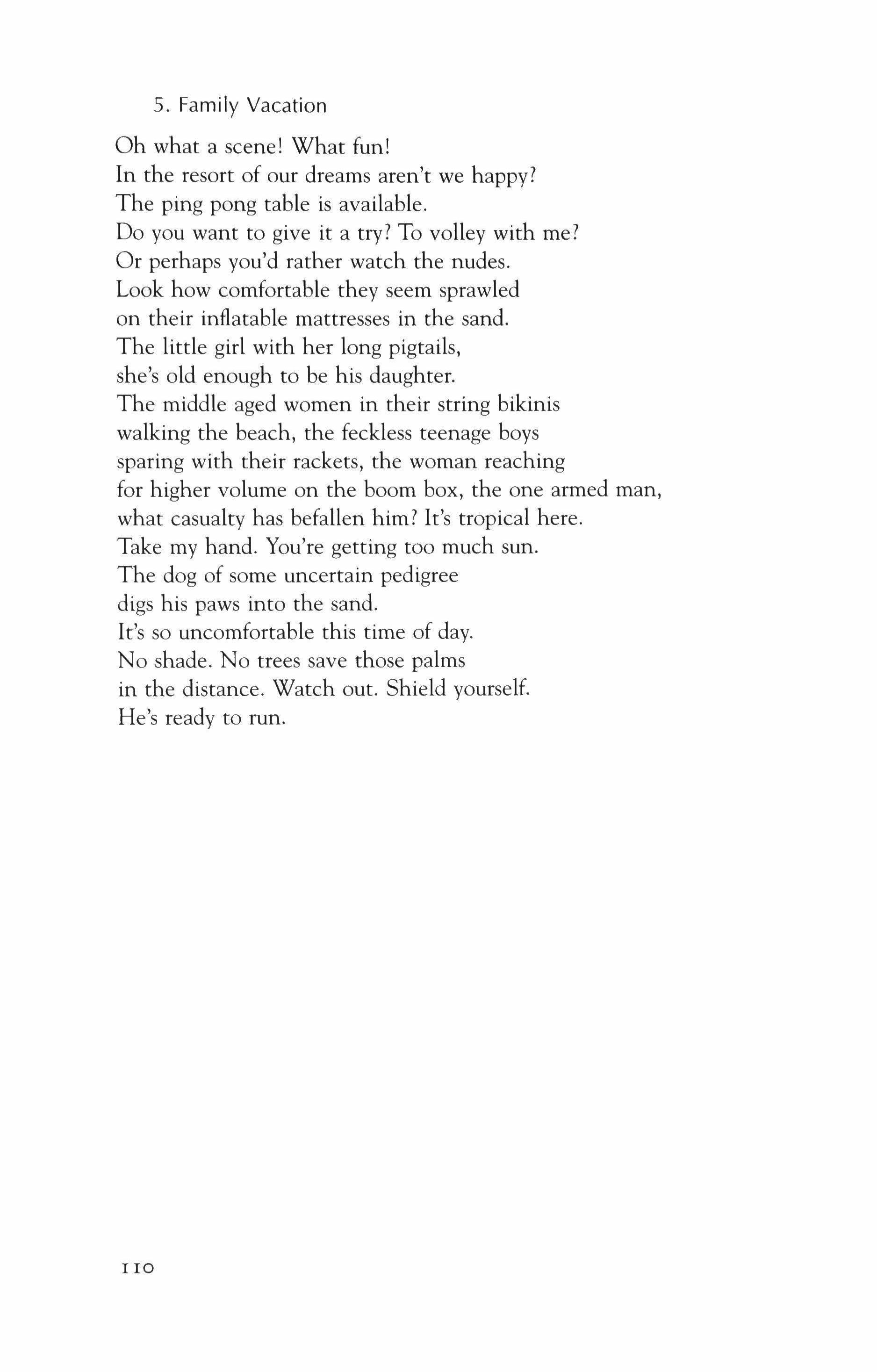
5. Family Vacation
Oh what a scene! What fun!
In the resort of our dreams aren't we happy? The ping pong table is available. Do you want to give it a try? To volley with me? Or perhaps you'd rather watch the nudes. Look how comfortable they seem sprawled on their inflatable mattresses in the sand. The little girl with her long pigtails, she's old enough to be his daughter. The middle aged women in their string bikinis walking the beach, the feckless teenage boys sparing with their rackets, the woman reaching for higher volume on the boom box, the one armed man, what casualty has befallen him? It's tropical here. Take my hand. You're getting too much sun. The dog of some uncertain pedigree digs his paws into the sand. It's so uncomfortable this time of day. No shade. No trees save those palms in the distance. Watch out. Shield yourself. He's ready to run.
110
Mark Doty
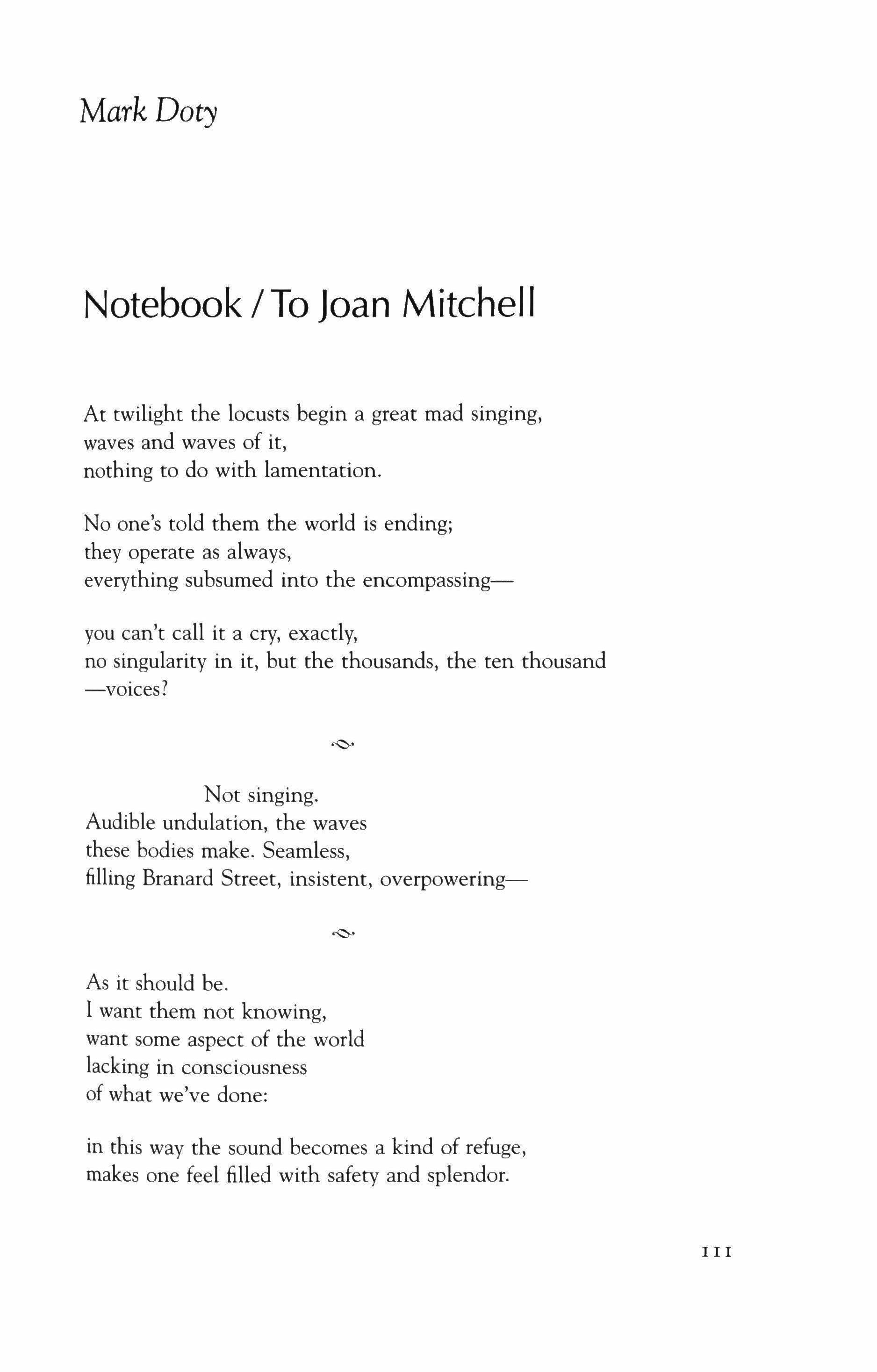
Notebook ITo Joan Mitchell
At twilight the locusts begin a great mad singing, waves and waves of it, nothing to do with lamentation.
No one's told them the world is ending; they operate as always, everything subsumed into the encompassingyou can't call it a cry, exactly, no singularity in it, but the thousands, the ten thousand -voices?
Not singing.
Audible undulation, the waves these bodies make. Seamless, filling Branard Street, insistent, overpowering-
As it should be.
I want them not knowing, want some aspect of the world lacking in consciousness of what we've done:
in this way the sound becomes a kind of refuge, makes one feel filled with safety and splendor.
II I
Or it's more like the sound lifts one up, almost physically; the big sound puts its hands under your arms and elevates you, effortless, huge gyrating momentum pulls one upward with it, the locusts in their collective ululation having become a unified rising motion
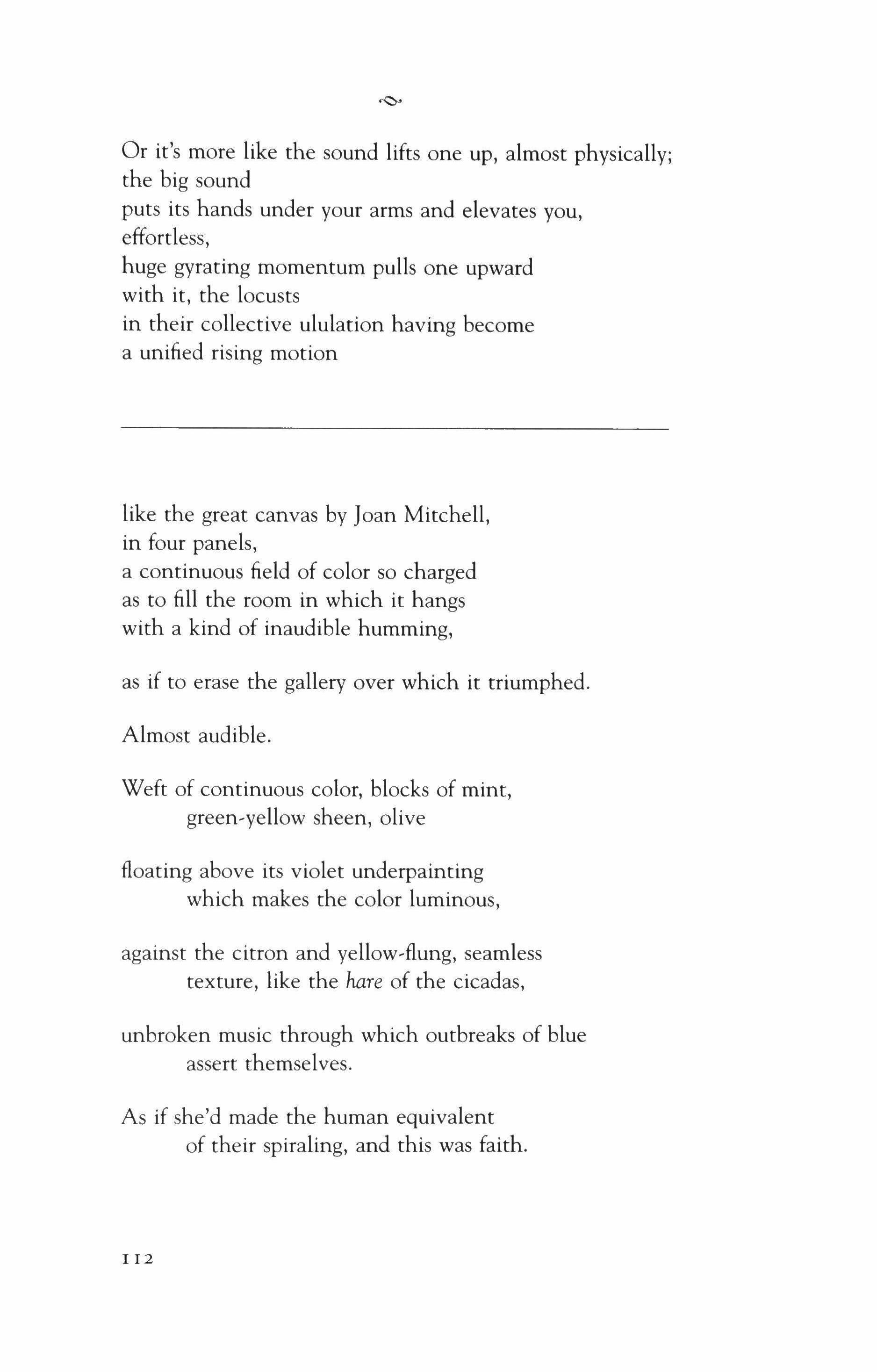
like the great canvas by Joan Mitchell, in four panels, a continuous field of color so charged as to fill the room in which it hangs with a kind of inaudible humming,
as if to erase the gallery over which it triumphed. Almost audible.
Weft of continuous color, blocks of mint, green-yellow sheen, olive
floating above its violet underpainting which makes the color luminous, against the citron and yellow-flung, seamless texture, like the hare of the cicadas, unbroken music through which outbreaks of blue assert themselves.
As if she'd made the human equivalent of their spiraling, and this was faith.
112
Had she made faith, or kept it?
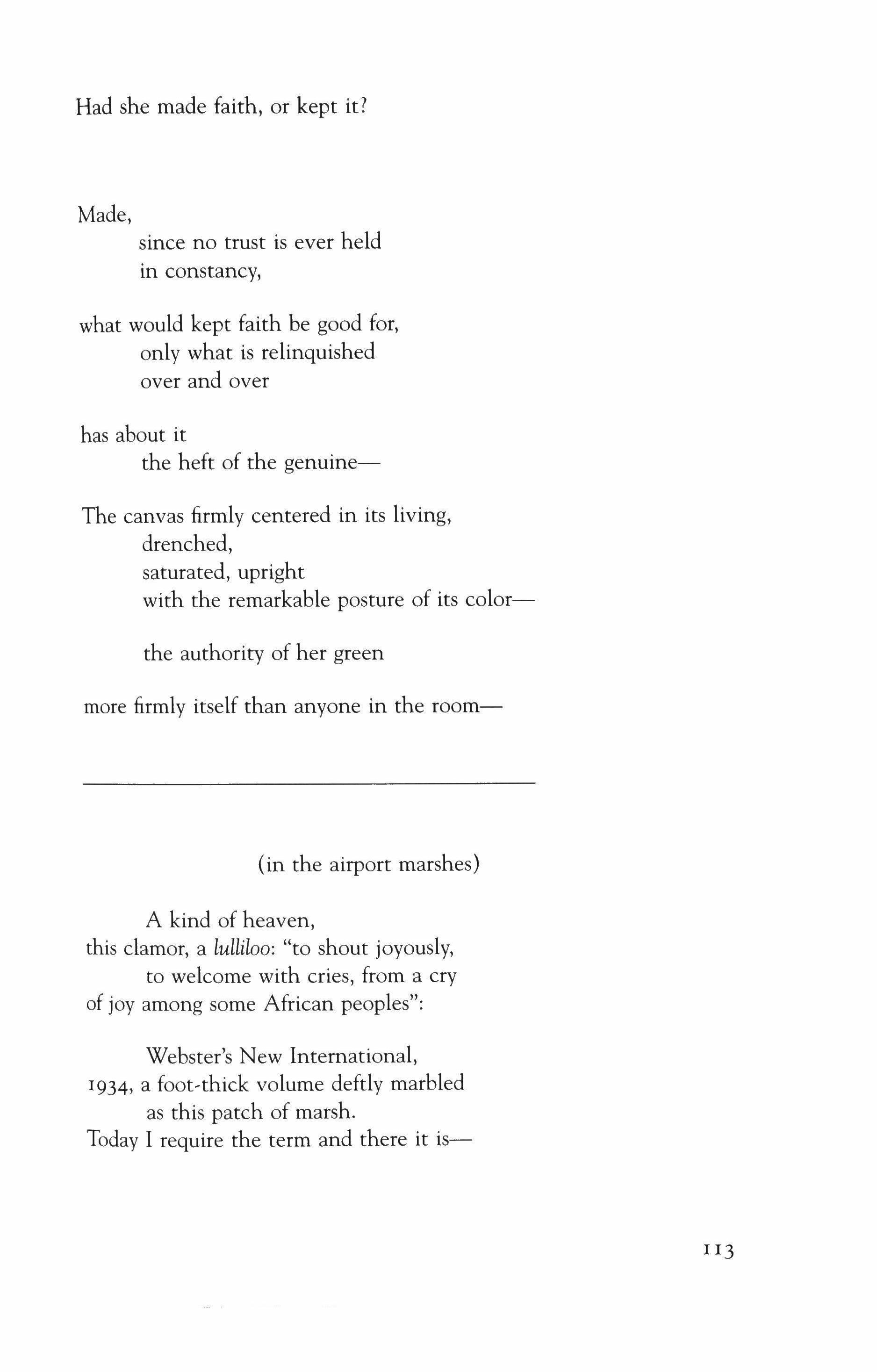
Made, since no trust is ever held in constancy, what would kept faith be good for, only what is relinquished over and over has about it the heft of the genuine-
The canvas firmly centered in its living, drenched, saturated, upright with the remarkable posture of its colorthe authority of her green more firmly itself than anyone in the room-
(in the airport marshes)
A kind of heaven, this clamor, a lulliloo: "to shout joyously, to welcome with cries, from a cry of joy among some African peoples":
Webster's New International, I934, a foot-thick volume deftly marbled as this patch of marsh. Today I require the term and there it is-
II3
these definitions wait to be lived, actual as these frogs, who chorus as if there's no tomorrow, or else they've all the time in the world.
We ruin the rain, they go right on, this year. Hard to imagine the eagerness of a body which pours itself into this-bodies you have
to take on faith, since all they seem to be is chiming Morse belling out long-short over the patched tarmac of the runway. I have never till now needed the word lulliloo. How do you reckon your little music?
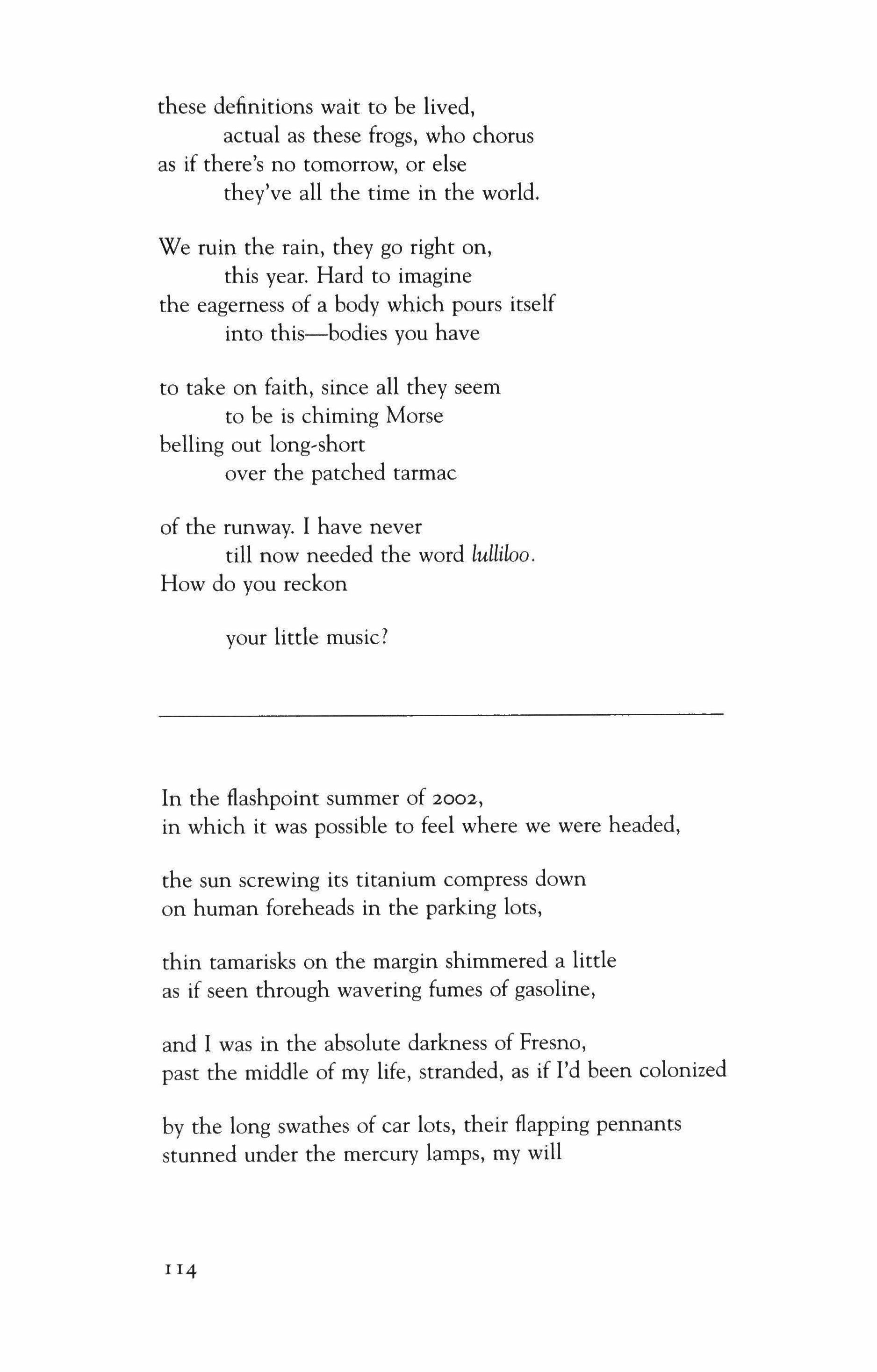
In the flashpoint summer of 2002, in which it was possible to feel where we were headed, the sun screwing its titanium compress down on human foreheads in the parking lots, thin tamarisks on the margin shimmered a little as if seen through wavering fumes of gasoline, and I was in the absolute darkness of Fresno, past the middle of my life, stranded, as if I'd been colonized by the long swathes of car lots, their flapping pennants stunned under the mercury lamps, my will
114
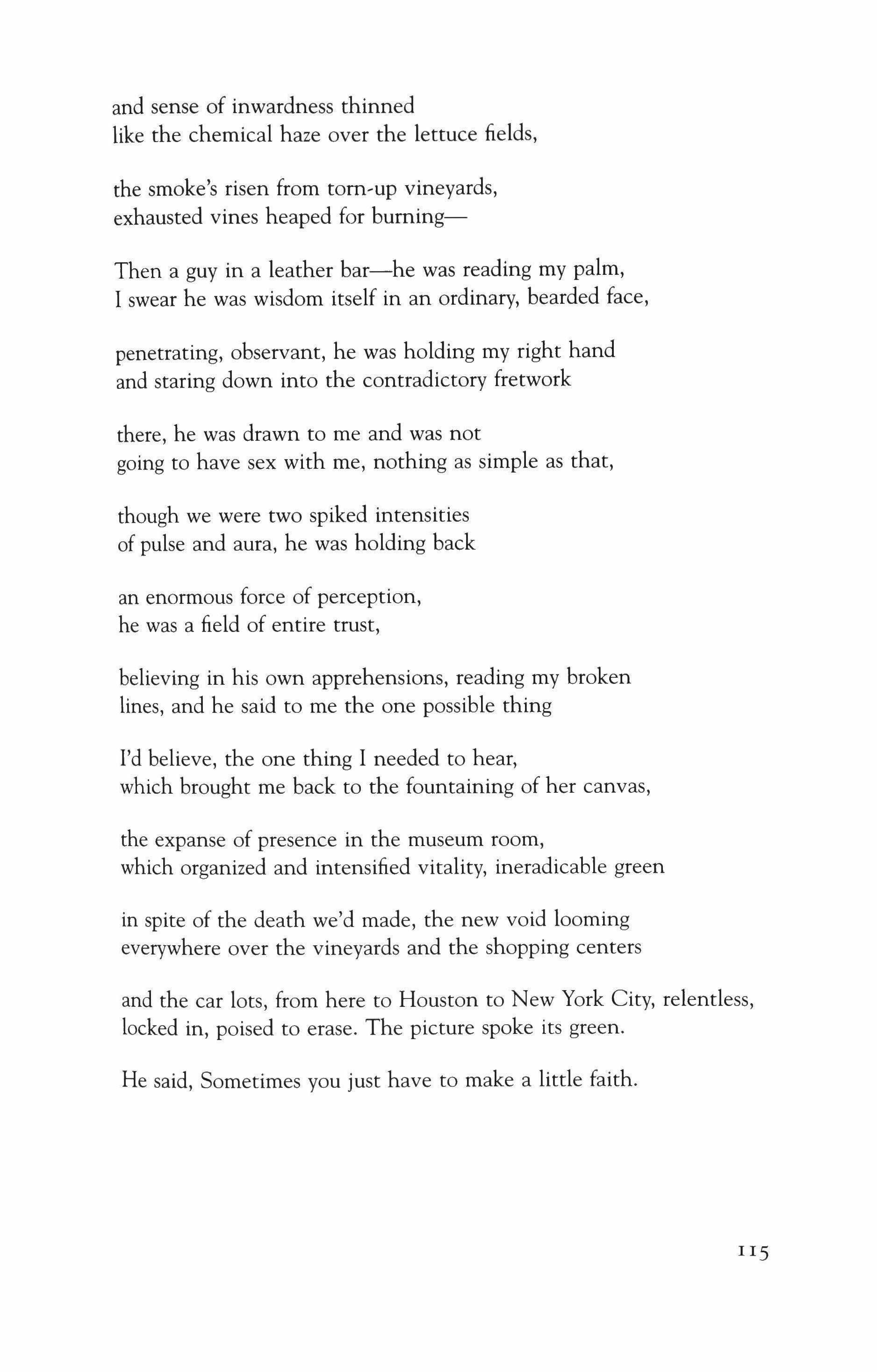
and sense of inwardness thinned like the chemical haze over the lettuce fields, the smoke's risen from torn-up vineyards, exhausted vines heaped for buming-
Then a guy in a leather bar-he was reading my palm, I swear he was wisdom itself in an ordinary, bearded face, penetrating, observant, he was holding my right hand and staring down into the contradictory fretwork there, he was drawn to me and was not going to have sex with me, nothing as simple as that,
though we were two spiked intensities of pulse and aura, he was holding back an enormous force of perception, he was a field of entire trust,
believing in his own apprehensions, reading my broken lines, and he said to me the one possible thing
I'd believe, the one thing I needed to hear, which brought me back to the fountaining of her canvas, the expanse of presence in the museum room, which organized and intensified vitality, ineradicable green in spite of the death we'd made, the new void looming everywhere over the vineyards and the shopping centers and the car lots, from here to Houston to New York City, relentless, locked in, poised to erase. The picture spoke its green.
He said, Sometimes you just have to make a little faith.
lIS

John Weir
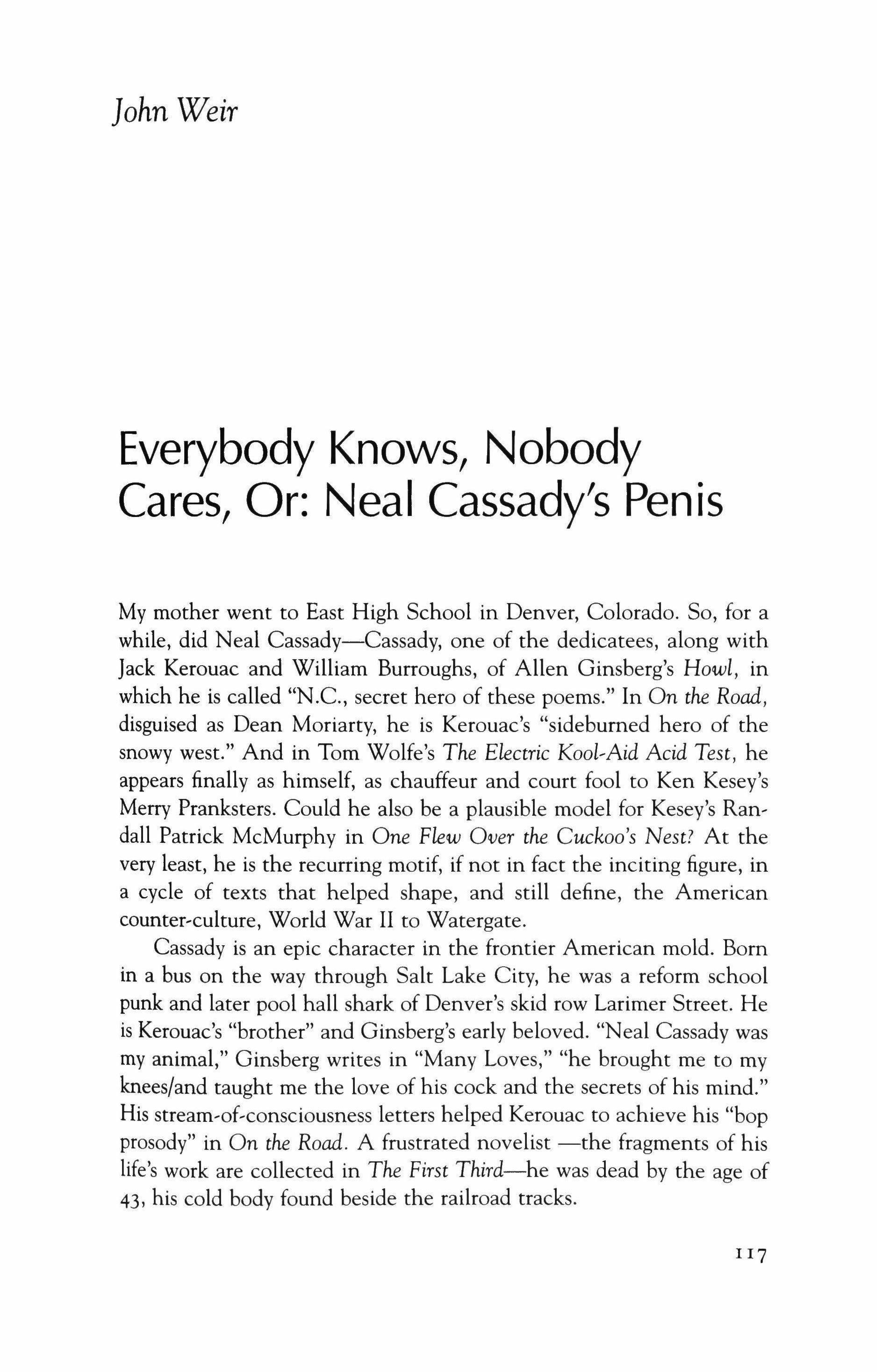
Everybody Knows, Nobody
Cares, Or: Neal Cassady's Penis
My mother went to East High School in Denver, Colorado. So, for a while, did Neal Cassady-Cassady, one of the dedicatees, along with Jack Kerouac and William Burroughs, of Allen Ginsberg's Howl, in which he is called "N.C., secret hero of these poems." In On the Road, disguised as Dean Moriarty, he is Kerouac's "sideburned hero of the snowy west." And in Tom Wolfe's The Electric Kool�Aid Acid Test, he appears finally as himself, as chauffeur and court fool to Ken Kesey's Merry Pranksters. Could he also be a plausible model for Kesey's Randall Patrick McMurphy in One Flew Over the Cuckoo's Nest? At the very least, he is the recurring motif, if not in fact the inciting figure, in a cycle of texts that helped shape, and still define, the American counter-culture, World War II to Watergate.
Cassady is an epic character in the frontier American mold. Born in a bus on the way through Salt Lake City, he was a reform school punk and later pool hall shark of Denver's skid row Larimer Street. He is Kerouac's "brother" and Ginsberg's early beloved. "Neal Cassady was my animal," Ginsberg writes in "Many Loves," "he brought me to my knees/and taught me the love of his cock and the secrets of his mind." His stream-of-consciousness letters helped Kerouac to achieve his "bop prosody" in On the Road. A frustrated novelist -the fragments of his life's work are collected in The First Third-he was dead by the age of 43, his cold body found beside the railroad tracks.
II7
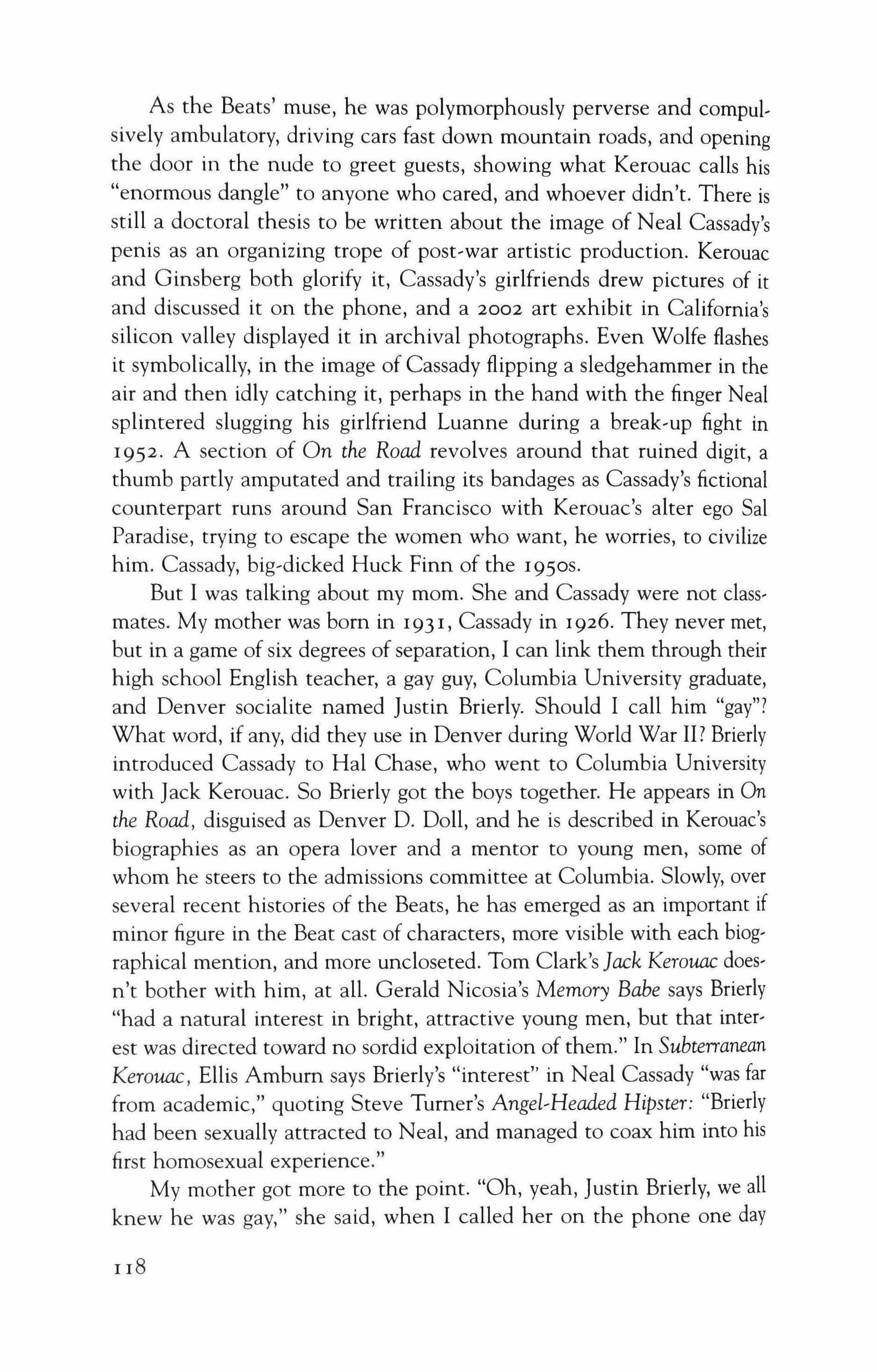
As the Beats' muse, he was polymorphously perverse and compulsively ambulatory, driving cars fast down mountain roads, and opening the door in the nude to greet guests, showing what Kerouac calls his "enormous dangle" to anyone who cared, and whoever didn't. There is still a doctoral thesis to be written about the image of Neal Cassady's penis as an organizing trope of post-war artistic production. Kerouae and Ginsberg both glorify it, Cassady's girlfriends drew pictures of it and discussed it on the phone, and a 2002 art exhibit in California's silicon valley displayed it in archival photographs. Even Wolfe flashes it symbolically, in the image of Cassady flipping a sledgehammer in the air and then idly catching it, perhaps in the hand with the finger Neal splintered slugging his girlfriend Luanne during a break-up fight in 1952. A section of On the Road revolves around that ruined digit, a thumb partly amputated and trailing its bandages as Cassady's fictional counterpart runs around San Francisco with Kerouac's alter ego Sal Paradise, trying to escape the women who want, he worries, to civilize him. Cassady, big-clicked Huck Finn of the 1950S.
But I was talking about my mom. She and Cassady were not classmates. My mother was born in 1931, Cassady in 1926. They never met, but in a game of six degrees of separation, I can link them through their high school English teacher, a gay guy, Columbia University graduate, and Denver socialite named Justin Brierly. Should I call him "gay"! What word, if any, did they use in Denver during World War II? Brierly introduced Cassady to Hal Chase, who went to Columbia University with Jack Kerouac. So Brierly got the boys together. He appears in On the Road, disguised as Denver D. Doll, and he is described in Kerouae's biographies as an opera lover and a mentor to young men, some of whom he steers to the admissions committee at Columbia. Slowly, over several recent histories of the Beats, he has emerged as an important if minor figure in the Beat cast of characters, more visible with each biographical mention, and more uncloseted. Tom Clark's Jack Kerouac doesn't bother with him, at all. Gerald Nicosia's Memory Babe says Brierly "had a natural interest in bright, attractive young men, but that interest was directed toward no sordid exploitation of them." In Subterranean Kerouac, Ellis Amburn says Brierly's "interest" in Neal Cassady "was far from academic," quoting Steve Turner's Angel-Headed Hipster: "Brierly had been sexually attracted to Neal, and managed to coax him into his first homosexual experience."
My mother got more to the point. "Oh, yeah, Justin Brierly, we all knew he was gay," she said, when I called her on the phone one day
IIB
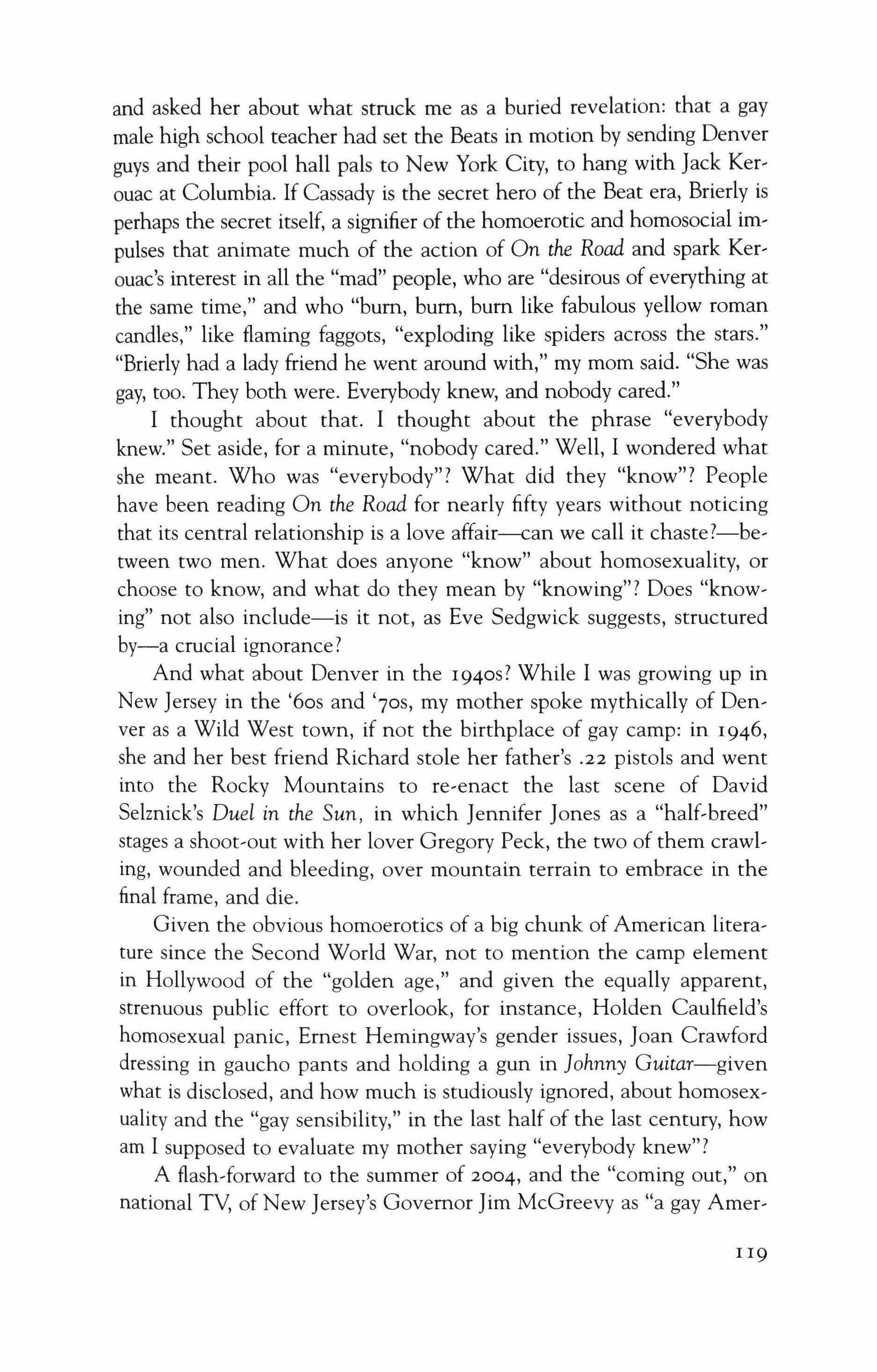
and asked her about what struck me as a buried revelation: that a gay male high school teacher had set the Beats in motion by sending Denver guys and their pool hall pals to New York City, to hang with Jack Kerouac at Columbia. If Cassady is the secret hero of the Beat era, Brierly is perhaps the secret itself, a signifier of the homoerotic and homosocial impulses that animate much of the action of On the Road and spark Kerouac's interest in all the "mad" people, who are "desirous of everything at the same time," and who "bum, bum, bum like fabulous yellow roman candles," like flaming faggots, "exploding like spiders across the stars." "Brierly had a lady friend he went around with," my mom said. "She was gay, too. They both were. Everybody knew, and nobody cared."
I thought about that. I thought about the phrase "everybody knew." Set aside, for a minute, "nobody cared." Well, I wondered what she meant. Who was "everybody"? What did they "know"? People have been reading On the Road for nearly fifty years without noticing that its central relationship is a love affair---can we call it chaste?-between two men. What does anyone "know" about homosexuality, or choose to know, and what do they mean by "knowing"? Does "knowing" not also include-is it not, as Eve Sedgwick suggests, structured by-a crucial ignorance?
And what about Denver in the I 940S? While I was growing up in New Jersey in the '60S and '70S, my mother spoke mythically of Denver as a Wild West town, if not the birthplace of gay camp: in 1946, she and her best friend Richard stole her father's .22 pistols and went into the Rocky Mountains to re-enact the last scene of David Selznick's Duel in the Sun, in which Jennifer Jones as a "half-breed" stages a shoot-out with her lover Gregory Peck, the two of them crawling, wounded and bleeding, over mountain terrain to embrace in the final frame, and die.
Given the obvious homoerotics of a big chunk of American literature since the Second World War, not to mention the camp element in Hollywood of the "golden age," and given the equally apparent, strenuous public effort to overlook, for instance, Holden Caulfield's homosexual panic, Ernest Hemingway's gender issues, Joan Crawford dressing in gaucho pants and holding a gun in Johnny Guitar-given what is disclosed, and how much is studiously ignored, about homosexuality and the "gay sensibility," in the last half of the last century, how am I supposed to evaluate my mother saying "everybody knew"?
A flash-forward to the summer of 2004, and the "coming out," on national TV, of New Jersey's Governor Jim McGreevy as "a gay Arner-
119
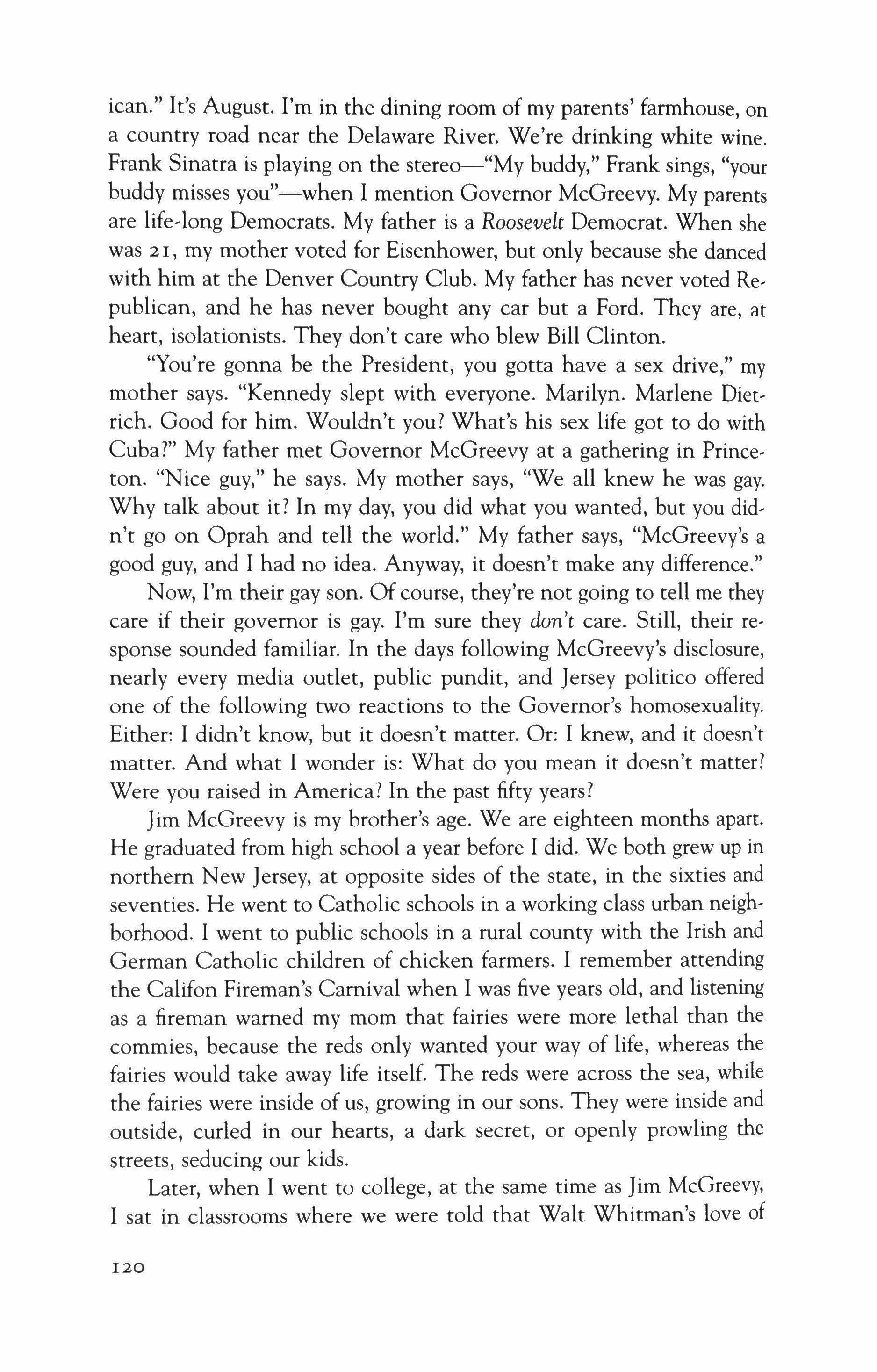
ican." It's August. I'm in the dining room of my parents' farmhouse, on a country road near the Delaware River. We're drinking white wine. Frank Sinatra is playing on the stereo-"My buddy," Frank sings, "your buddy misses you"-when I mention Governor McGreevy. My parents are life-long Democrats. My father is a Roosevelt Democrat. When she was 2 I, my mother voted for Eisenhower, but only because she danced with him at the Denver Country Club. My father has never voted Republican, and he has never bought any car but a Ford. They are, at heart, isolationists. They don't care who blew Bill Clinton.
"You're gonna be the President, you gotta have a sex drive," my mother says. "Kennedy slept with everyone. Marilyn. Marlene Dietrich. Good for him. Wouldn't you? What's his sex life got to do with Cuba?" My father met Governor McGreevy at a gathering in Princeton. "Nice guy," he says. My mother says, "We all knew he was gay. Why talk about it? In my day, you did what you wanted, but you didn't go on Oprah and tell the world." My father says, "McGreevy's a good guy, and I had no idea. Anyway, it doesn't make any difference."
Now, I'm their gay son. Of course, they're not going to tell me they care if their governor is gay. I'm sure they don't care. Still, their response sounded familiar. In the days following McGreevy's disclosure, nearly every media outlet, public pundit, and Jersey politico offered one of the following two reactions to the Governor's homosexuality. Either: I didn't know, but it doesn't matter. Or: I knew, and it doesn't matter. And what I wonder is: What do you mean it doesn't matter? Were you raised in America? In the past fifty years?
Jim McGreevy is my brother's age. We are eighteen months apart. He graduated from high school a year before I did. We both grew up in northern New Jersey, at opposite sides of the state, in the sixties and seventies. He went to Catholic schools in a working class urban neighborhood. I went to public schools in a rural county with the Irish and German Catholic children of chicken farmers. I remember attending the Califon Fireman's Carnival when I was five years old, and listening as a fireman warned my mom that fairies were more lethal than the commies, because the reds only wanted your way of life, whereas the fairies would take away life itself. The reds were across the sea, while the fairies were inside of us, growing in our sons. They were inside and outside, curled in our hearts, a dark secret, or openly prowling the streets, seducing our kids.
Later, when I went to college, at the same time as Jim McGreevy, I sat in classrooms where we were told that Walt Whitman's love of
120
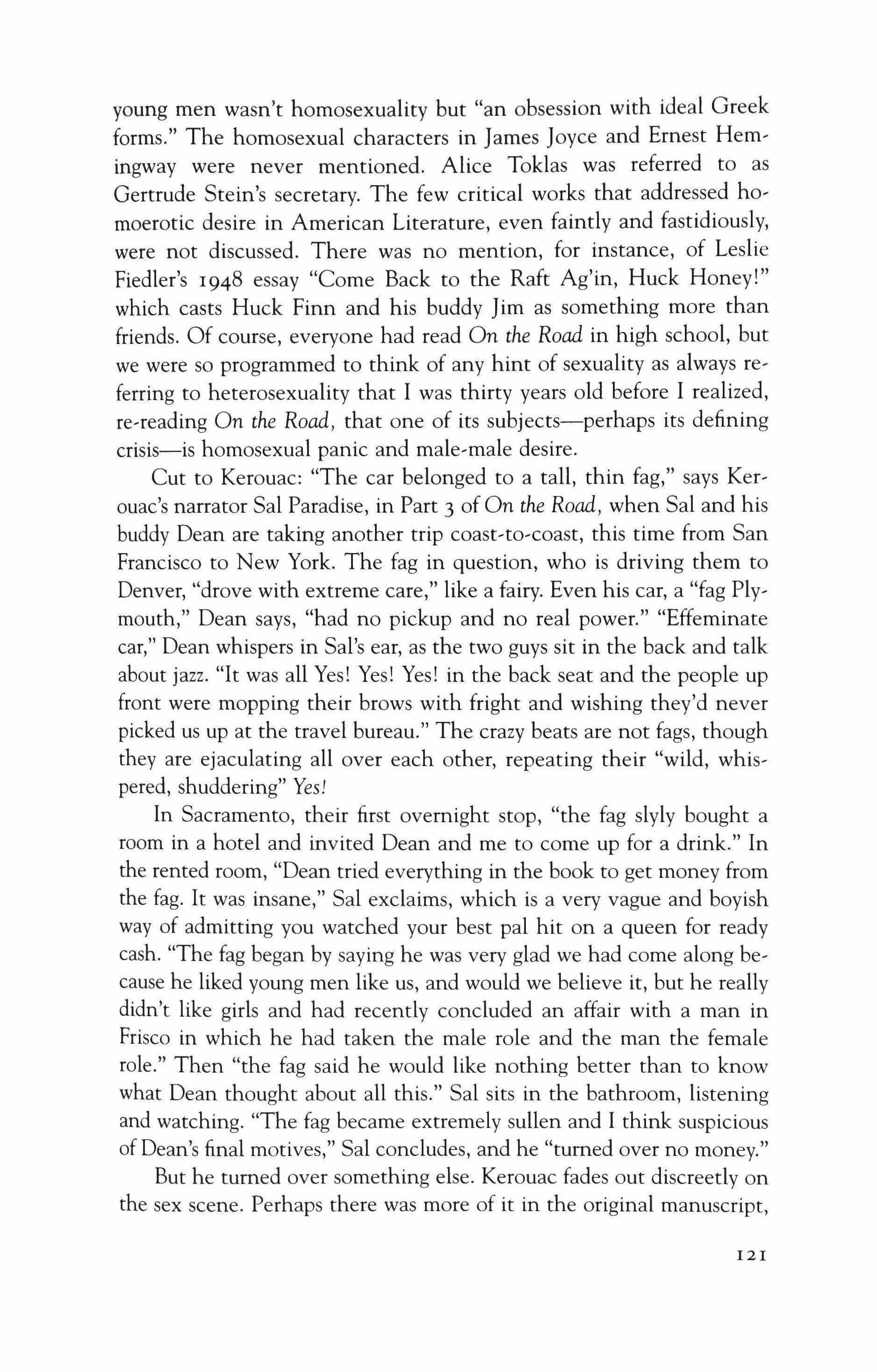
young men wasn't homosexuality but "an obsession with ideal Greek forms." The homosexual characters in James Joyce and Ernest Hemingway were never mentioned. Alice Toklas was referred to as Gertrude Stein's secretary. The few critical works that addressed homoerotic desire in American Literature, even faintly and fastidiously, were not discussed. There was no mention, for instance, of Leslie Fiedler's 1948 essay "Come Back to the Raft Ag'in, Huck Honey!" which casts Huck Finn and his buddy Jim as something more than friends. Of course, everyone had read On the Road in high school, but we were so programmed to think of any hint of sexuality as always referring to heterosexuality that I was thirty years old before I realized, re-reading On the Road, that one of its subjects-perhaps its defining crisis-is homosexual panic and male-male desire.
Cut to Kerouac: "The car belonged to a tall, thin fag," says Kerouac's narrator Sal Paradise, in Part 3 of On the Road, when Sal and his buddy Dean are taking another trip coast-to-coast, this time from San Francisco to New York. The fag in question, who is driving them to Denver, "drove with extreme care," like a fairy. Even his car, a "fag Plymouth," Dean says, "had no pickup and no real power." "Effeminate car," Dean whispers in Sal's ear, as the two guys sit in the back and talk about jazz. "It was all Yes! Yes! Yes! in the back seat and the people up front were mopping their brows with fright and wishing they'd never picked us up at the travel bureau." The crazy beats are not fags, though they are ejaculating all over each other, repeating their "wild, whispered, shuddering" Yes!
In Sacramento, their first overnight stop, "the fag slyly bought a room in a hotel and invited Dean and me to come up for a drink." In the rented room, "Dean tried everything in the book to get money from the fag. It was insane," Sal exclaims, which is a very vague and boyish way of admitting you watched your best pal hit on a queen for ready cash. "The fag began by saying he was very glad we had come along because he liked young men like us, and would we believe it, but he really didn't like girls and had recently concluded an affair with a man in Frisco in which he had taken the male role and the man the female role." Then "the fag said he would like nothing better than to know what Dean thought about all this." Sal sits in the bathroom, listening and watching. "The fag became extremely sullen and I think suspicious of Dean's final motives," Sal concludes, and he "turned over no money." But he turned over something else. Kerouac fades out discreetly on the sex scene. Perhaps there was more of it in the original manuscript,
121

and his editor, Malcolm Cowley, made him cut it. We are left with an image of Sal cracking open the john door to watch Dean try to roll a fag. The next day, the fag leaves them out in Denver, where Sal and Dean, finally alone, have what seems to be a lovers' quarrel. They're in a restaurant. First they wash and pee in the bathroom, where Sal shows off his penis: "Dig this trick," he tells Dean, and then, halfway through pissing, he steps back from one urinal and quickly shifts to another, temporarily cutting off the flow of piss, and letting his dick wave in the open air. Dean tells Sal that he'll wreck his kidneys, doing that, and Sal whines, "I'm no fag like that old fag, you don't have to warn me about my kidneys."
Why is "my" in italics? Is this a suggestion that Dean warned their fag about his kidneys, the night before? What was wrong with the fag's kidneys? Did Sal beat him up? Did he spear him with his enormous dangle? Kerouac doesn't say. Yet he does let us hear Sal insist, rather petulantly, that he himself is not a fag. When they sit down at the restaurant booth and order breakfast, Sal is still sulking. "And I don't want to hear any more of it," he says. Then Dean starts to cry. He runs from the restaurant, leaving his plate of uneaten food, stands outside for five minutes, and has a good sob-so he tells Sal when he walks back to the table, ready to eat.
Their restaurant tiff is an odd little scene that lasts about a page, with the clarifying conflict seemingly left out. Why are they fighting? Dean lectures, Sal snarks, Dean cries, and then they finish their meal. Afterwards, like lovers, they discuss their fight. What was it really about? Listening to Dean, Sal worries silently "about what filth I was discovering in the depths of my own impure psychologies." He frets to himself about "the cracked intestinal twistings in my awful belly." Then he admits to Dean that he can never get close to anyone, and that "I hold things in my hand like pieces of crap and don't know where to put it down."
So there is Sal with a shitty palm thinking about his digestive tract, and apologizing for making Dean cry. What the hell happened in Sacramento?
Well, first off, Sal and Dean are on their honeymoon. Part 3 of On the Road opens with mock nuptials. There is a proposal, followed by a symbolic wedding, and then a honeymoon trip to New York. From there, the couple plans to go to Italy, where they can "dig all the crazy women in Rome, Paris, all those places; we'll sit at sidewalk cafes; we'll live in whorehouses." Because-in order to prove-they are not fags,
122
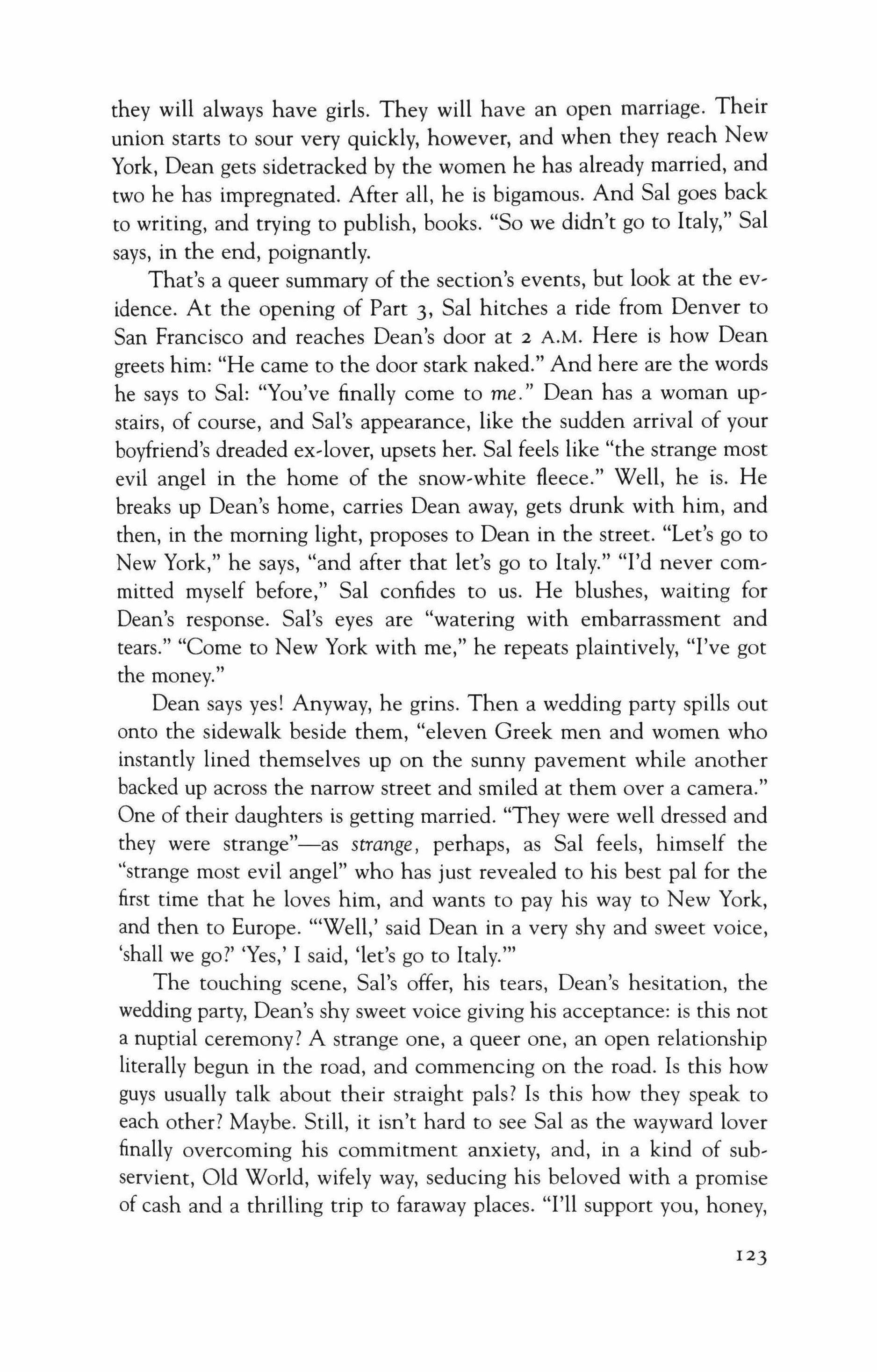
they will always have girls. They will have an open marriage. Their union starts to sour very quickly, however, and when they reach New York, Dean gets sidetracked by the women he has already married, and two he has impregnated. After all, he is bigamous. And Sal goes back to writing, and trying to publish, books. "So we didn't go to Italy," Sal says, in the end, poignantly.
That's a queer summary of the section's events, but look at the evidence. At the opening of Part 3, Sal hitches a ride from Denver to San Francisco and reaches Dean's door at 2 A.M. Here is how Dean greets him: "He came to the door stark naked." And here are the words he says to Sal: "You've finally come to me." Dean has a woman up, stairs, of course, and Sal's appearance, like the sudden arrival of your boyfriend's dreaded ex,lover, upsets her. Sal feels like "the strange most evil angel in the home of the snow-white fleece." Well, he is. He breaks up Dean's home, carries Dean away, gets drunk with him, and then, in the morning light, proposes to Dean in the street. "Let's go to New York," he says, "and after that let's go to Italy." "I'd never com' mitted myself before," Sal confides to us. He blushes, waiting for Dean's response. Sal's eyes are "watering with embarrassment and tears." "Come to New York with me," he repeats plaintively, "I've got the money."
Dean says yes! Anyway, he grins. Then a wedding party spills out onto the sidewalk beside them, "eleven Greek men and women who instantly lined themselves up on the sunny pavement while another backed up across the narrow street and smiled at them over a camera." One of their daughters is getting married. "They were well dressed and they were strange"-as strange, perhaps, as Sal feels, himself the "strange most evil angel" who has just revealed to his best pal for the first time that he loves him, and wants to pay his way to New York, and then to Europe. "'Well,' said Dean in a very shy and sweet voice, 'shall we go?' 'Yes,' I said, 'let's go to Italy.'"
The touching scene, Sal's offer, his tears, Dean's hesitation, the wedding party, Dean's shy sweet voice giving his acceptance: is this not a nuptial ceremony? A strange one, a queer one, an open relationship literally begun in the road, and commencing on the road. Is this how guys usually talk about their straight pals? Is this how they speak to each other? Maybe. Still, it isn't hard to see Sal as the wayward lover finally overcoming his commitment anxiety, and, in a kind of sub, servient, Old World, wifely way, seducing his beloved with a promise of cash and a thrilling trip to faraway places. "I'll support you, honey,
123
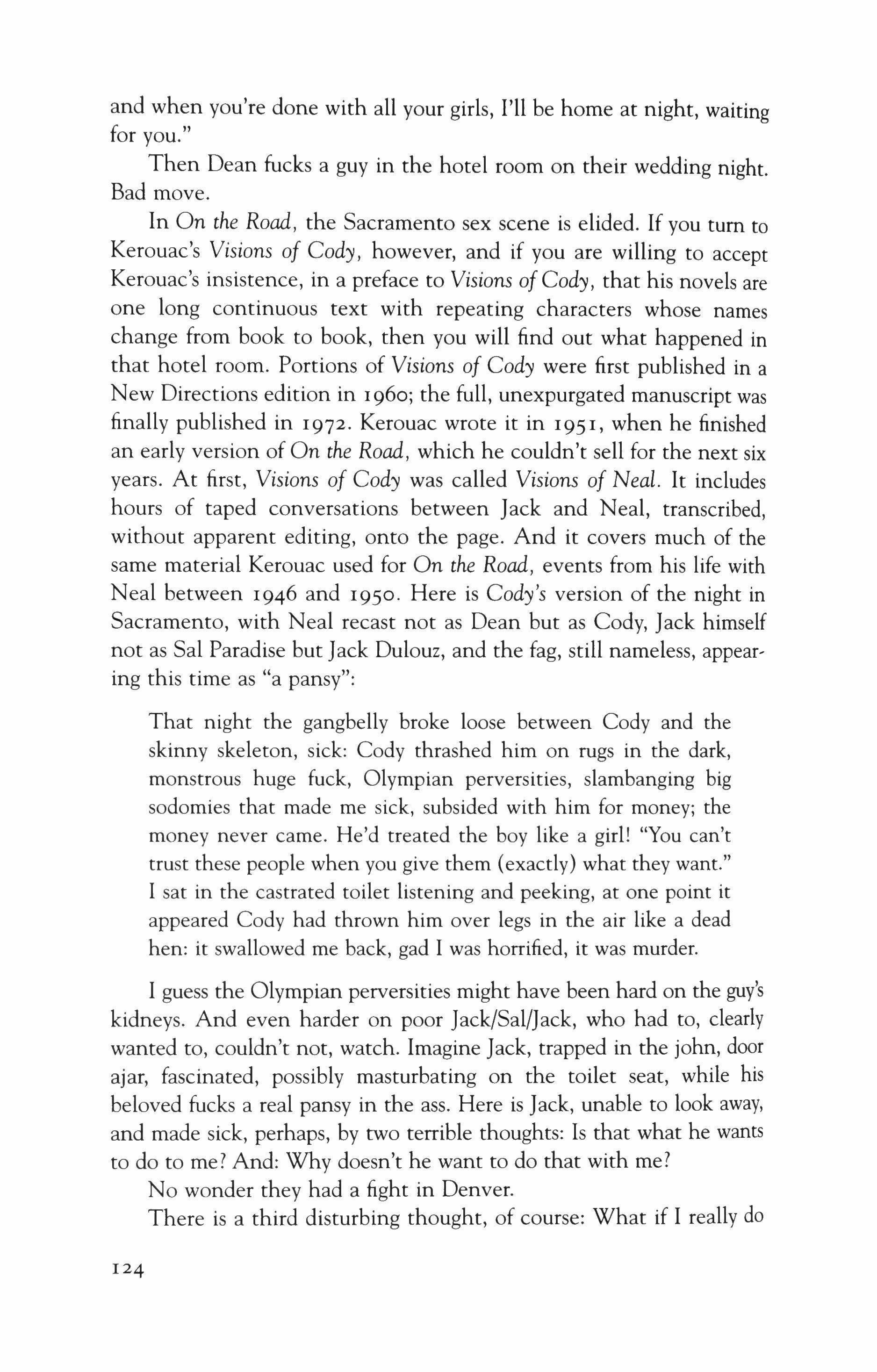
and when you're done with all your girls, I'll be home at night, waiting for you."
Then Dean fucks a guy in the hotel room on their wedding night. Bad move.
In On the Road, the Sacramento sex scene is elided. If you tum to Kerouac's Visions of Cody, however, and if you are willing to accept Kerouac's insistence, in a preface to Visions ofCody, that his novels are one long continuous text with repeating characters whose names change from book to book, then you will find out what happened in that hotel room. Portions of Visions of Cody were first published in a New Directions edition in 1960; the full, unexpurgated manuscript was finally published in 1972. Kerouac wrote it in 1951, when he finished an early version of On the Road, which he couldn't sell for the next six years. At first, Visions of Cody was called Visions of Neal. It includes hours of taped conversations between Jack and Neal, transcribed, without apparent editing, onto the page. And it covers much of the same material Kerouac used for On the Road, events from his life with Neal between 1946 and 1950. Here is Cody's version of the night in Sacramento, with Neal recast not as Dean but as Cody, Jack himself not as Sal Paradise but Jack Dulouz, and the fag, still nameless, appearing this time as "a pansy":
That night the gangbelly broke loose between Cody and the skinny skeleton, sick: Cody thrashed him on rugs in the dark, monstrous huge fuck, Olympian perversities, slambanging big sodomies that made me sick, subsided with him for money; the money never came. He'd treated the boy like a girl! "You can't trust these people when you give them (exactly) what they want."
I sat in the castrated toilet listening and peeking, at one point it appeared Cody had thrown him over legs in the air like a dead hen: it swallowed me back, gad I was horrified, it was murder.
I guess the Olympian perversities might have been hard on the guy's kidneys. And even harder on poor Jack/Sal/Jack, who had to, clearly wanted to, couldn't not, watch. Imagine Jack, trapped in the john, door ajar, fascinated, possibly masturbating on the toilet seat, while his beloved fucks a real pansy in the ass. Here is Jack, unable to look away, and made sick, perhaps, by two terrible thoughts: Is that what he wants to do to me? And: Why doesn't he want to do that with me?
No wonder they had a fight in Denver. There is a third disturbing thought, of course: What if I really do
124

want him to do that to me? Not just want him to want. But rather, quite simply-and, for Kerouac, who has some choice words to say about what "real" homosexuals are like-terrifyingly want. "A real pansy, " he says in Visions of Cody, is someone "with the strange criminal face of a complete nonentity." There is that word "strange," again. In 1954, Kerouac knows how to recognize a homosexual. He is someone whose identifying characteristic lies in his being indeterminate. "You just couldn't tell what he was," Kerouac says, "sadist or masochist and from which end and with whip, dress, or oyster pie, a fetishist hiding in a closet, he must have spent whole afternoons simpering in the bathroom." Who is in the bathroom? Is that what Jack/Sal/Jack is doing in there? Simpering?
So much for what my mother meant by "everybody knew." Certainly Jack knew how to identify a fag, and how to distinguish very carefully between his love for Neal, and a real fag's love for Neal's cock. What everybody knows is that fags are not men, they are not even determinate human beings. Well, this is according to Jack. I suspect that Kerouac's understanding of pansies-panicked and overstated, no doubt, by his fear of his own homosexual longings-is close to what most people believed during World War II, and what they still believe.
Which brings us to my mother's second assertion: "nobody cared." It seems to me that we found out exactly how fervently people care about homosexuals in the fall of 2004, when Arkansas, Georgia, Kentucky, Michigan, Mississippi, Montana, North Dakota, Oklahoma, Ohio, Oregon, and Utah-many of the states Sal Paradise breezes through in his travels on the road-passed amendments to their state constitutions outlawing the marriage of women to women, and men to men. If Neal Cassady's sodomies remain the secret yet simultaneously open text of Kerouac's opus, if Justin Brierly's desire for young men got the beat generation on the road, it is still unclear how this paradox of homosexual invisibility happening at the same time as a presumed, lurking, obvious homosexual threat will be resolved in the America Kerouac traversed and loved, looking for a really great ride, and searching for "Old Dean Moriarty," Neal Cassady's missing, fictional and actual, dad.
125
Mihaela Moscaliuc

Prime Time Apparitions by R. Zamora Linmark.
Brooklyn, NY: Hanging Loose Press, 2005.
If Unmark's first novel, Rolling the R's (NY: Kaya, 1996) left anyone unconvinced that this young Filipino Hawaiian American writer's tongue will never stop spinning stories, Prime Time Apparitions, his first volume of poetry, dispels any doubts. Unmark has lived in Manila, London, Madrid, Honolulu, and San Francisco, absorbed these cities' searing histories in Filipino, Tagalog, Spanish, Pidgin Hawaiian and Pidgin English (as well as their Standard stepsisters), and grafted them in the book's polyphonous (and at times deliberately cacophonous) narratives. In poem after poem, Unmark hopscotches pop-culture, folklore, art, historiography, politics, and gender and cultural theory, limning and crosshatching their imbrications and import to our post-modern identities and daily lives. EI Greco and "Dallas," Hugo Boss and "My Fair Lady," Rilke and "Miss Saigon," President Estrada and Disneyland, Kierkegaard and Madam Tussaud, Tolstoy and Colonel Powell, Carmelite Sisters and Madonna, Saint John of the Cross and Caliban insinuate themselves into the latticework, destabilizing and enriching the narrative with their own fictions and politics. "English as a Sign Language," a list poem, playfully (rnis-) translates American social and cultural markers to reveal the ironies, incongruities, and imperialist impulses that sustain the American landscape. In "Moo," Duke Ellington's "In a Sentimental Mood" segues into Hitchcock's "Dial M for Murder," then into cow-talk, etymology, politics, and racial allegories. There is method in the topical and verbal buoyancy in which the poems often revel. We glimpse it in the scintillating associative thrust,
126

in the ludic, parodic, or subversive language, in each poem's hunger for self-generative intertextuality. Yet its logic remains purposefully obfuscated, for to reveal it would mean to make such stories and their language vulnerable to literary and theoretical ossification. After "perus[ing] the canons"-placed, significantly, "next to the Folios / and Men's Room,"-one speaker delights in his discovery that "literature is nothing more than a Camelot of words built especially / for those in search of the unexpected" ("Valentine's Day").
Cognizant of the gambits of postcolonial discourses, he excoriates the depredation of cultural imperialism while continuing, nonetheless, to find much delectation in the games and comforts of American pop culture and materialism. But his multi-tiered subject position, inside and outside various cultural discourses, permits him to do exactly this. Attempts to negotiate and articulate identity are predicated upon journeys and histories that include but also transgress the personal; in this sense, Unmark's search becomes re-search-s-a process that entails both recuperation and re-examination.
At their weakest, Unmark's "apparitions" create too much white noise to qualify for "prime time." At their best, they hypnotize with the verve of anecdotes, streaming references, quips, dispatches and in' terrogations, all of which sketch an original poetics of inquiry and de, ferment. Unmark might think of himself as "a poet on call" because "poetry only comes when it wants to" ("The Muse This Time"), but his advice, in "First Lessons," assumes a more fitting aesthetic: "Pursue, at' tack, seduce, and yes, like the Marcoses, / steal steal everything and more. Loot, / horde, storm the Palace of Spines and rearrange / Dewey, the canons and the classics of tomorrow / too. Just remember: ( ) steal with the intent to replace." Like Scheherezade, Unmark's speaker doesn't forget his purpose even as he appears to succumb to the pure pleasures of yarning. At the end of his 1001 nights, and in Gulliver's translation (which epilogues the volume), his tongue is in our mouth, endearing and restless.
127
Ryan Black
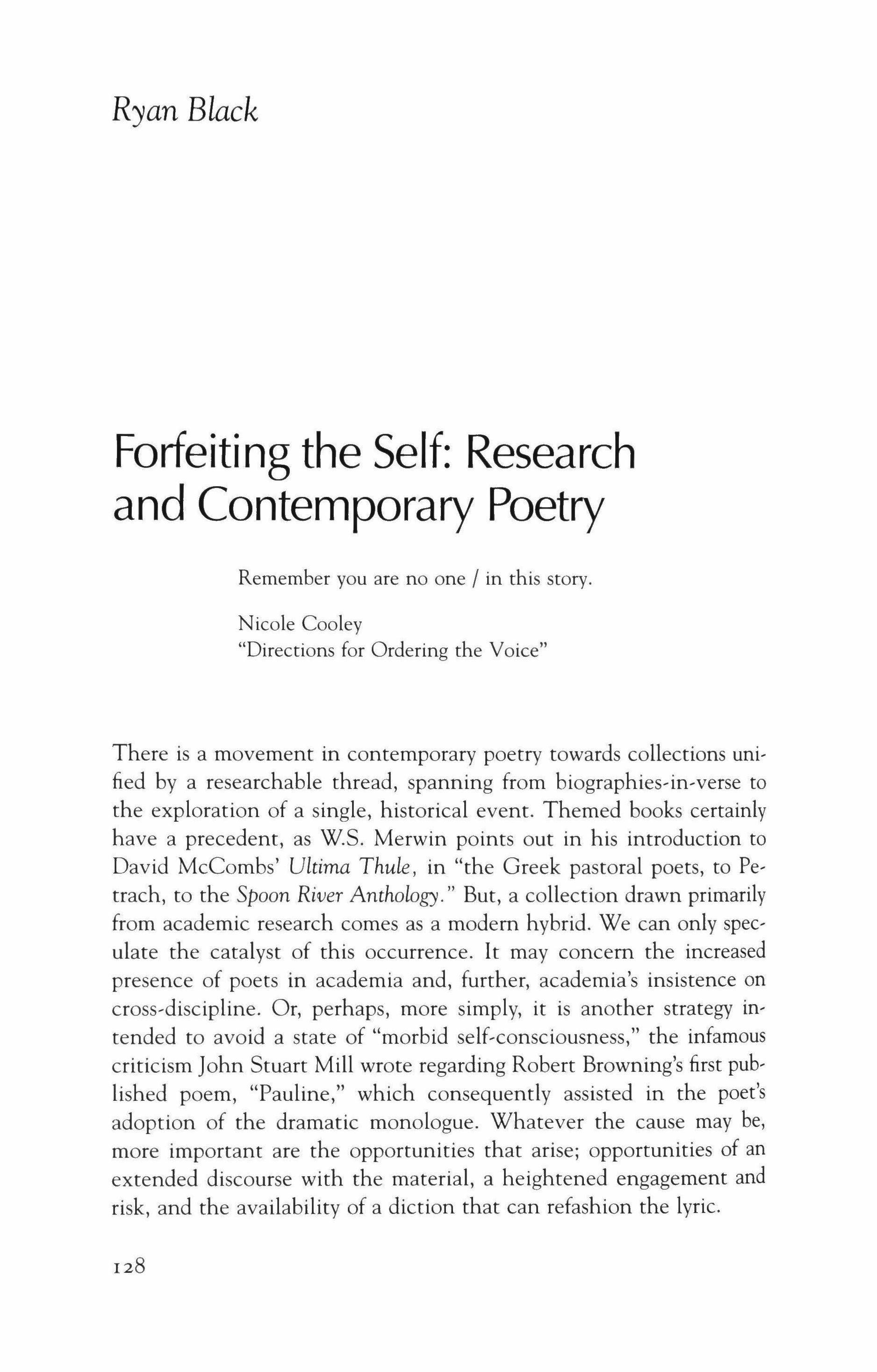
Forfeiting the Self: Research and Contemporary Poetry
Remember you are no one / in this story.
Nicole
Cooley "Directions for Ordering the Voice"
There is a movement in contemporary poetry towards collections unified by a researchable thread, spanning from biographies-in-verse to the exploration of a single, historical event. Themed books certainly have a precedent, as W.S. Merwin points out in his introduction to David McCombs' Ultima Thule, in "the Greek pastoral poets, to Petrach, to the Spoon River Anthology." But, a collection drawn primarily from academic research comes as a modern hybrid. We can only speculate the catalyst of this occurrence. It may concern the increased presence of poets in academia and, further, academia's insistence on cross-discipline. Or, perhaps, more simply, it is another strategy intended to avoid a state of "morbid self-consciousness," the infamous criticism John Stuart Mill wrote regarding Robert Browning's first published poem, "Pauline," which consequently assisted in the poet's adoption of the dramatic monologue. Whatever the cause may be, more important are the opportunities that arise; opportunities of an extended discourse with the material, a heightened engagement and risk, and the availability of a diction that can refashion the lyric.
128
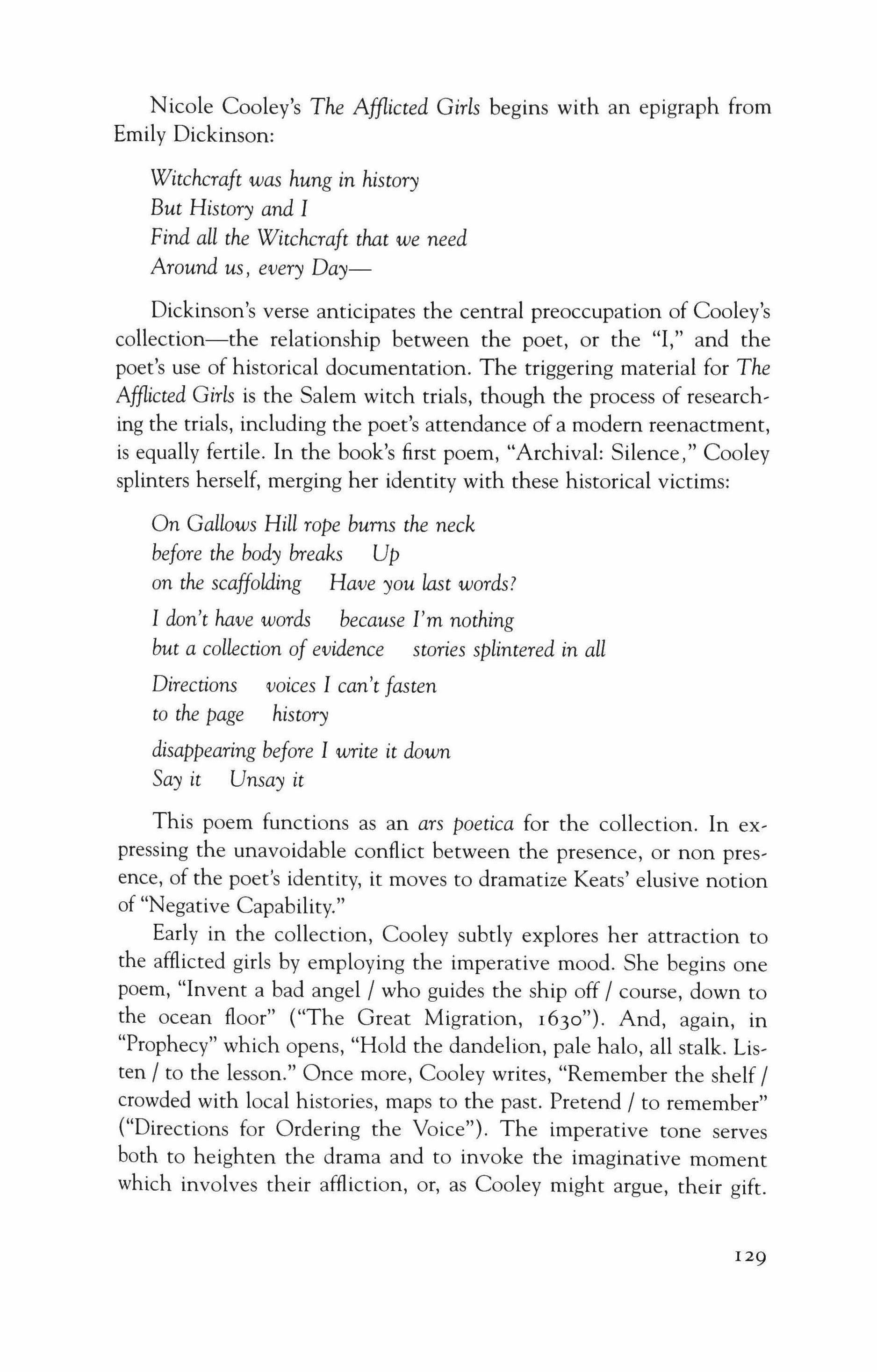
Nicole Cooley's The Afflicted Girls begins with an epigraph from Emily Dickinson:
Witchcraft was hung in history
But History and I
Find all the Witchcraft that we need Around us, every Day-
Dickinson's verse anticipates the central preoccupation of Cooley's collection-the relationship between the poet, or the "1," and the poet's use of historical documentation. The triggering material for The Afflicted Girls is the Salem witch trials, though the process of researching the trials, including the poet's attendance of a modem reenactment, is equally fertile. In the book's first poem, "Archival: Silence," Cooley splinters herself, merging her identity with these historical victims:
On Gallows Hill rope burns the neck before the body breaks Up on the scaffolding Have you last words?
I don't have words because I'm nothing but a collection of evidence stories splintered in all Directions voices I can't fasten to the page history
disappearing before I write it down Say it Unsay it
This poem functions as an ars poetica for the collection. In expressing the unavoidable conflict between the presence, or non presence, of the poet's identity, it moves to dramatize Keats' elusive notion of "Negative Capability."
Early in the collection, Cooley subtly explores her attraction to the afflicted girls by employing the imperative mood. She begins one poem, "Invent a bad angel / who guides the ship off / course, down to the ocean floor" ("The Great Migration, 1630"). And, again, in "Prophecy" which opens, "Hold the dandelion, pale halo, all stalk. Listen / to the lesson." Once more, Cooley writes, "Remember the shelf / crowded with local histories, maps to the past. Pretend / to remember" ("Directions for Ordering the Voice"). The imperative tone serves both to heighten the drama and to invoke the imaginative moment which involves their affliction, or, as Cooley might argue, their gift.
129

We, along with the poet, engage in the metaphysical exercises both prompted and experienced by the afflicted girls. Thus, identification is threefold. Furthermore, the girls possess a sort of second sight "beyond the visible" akin to the visionary consciousness of Romantic poetry.
Still, the poet continues to question her engagement in the material-whether it is her imagination that seizes upon this moment in history, or her personality. Throughout the collection, Cooley is involved in the political and social implications of the trials, yet she continuously calls her research into question though not for accuracy. In one of the numerous instances when historical documentation and the moment of research co-exist, Cooley quotes samples of Ann Putnam's and Sarah Bibber's testimony regarding Giles Corey, a man pressed to death. She then shows herself Xeroxing the testimony: "The copier flattens the page, hammers down identical speech" ("He or His Apparition). In her research, documentation is heading toward duplication, a redundancy. In "The People vs. Bridget Bishop, July 1999," a poem centering on an historical re-enactment of one of the trials, the political preoccupation resurfaces, but more interesting is the absurdity of recreating the scene. Though the facts and events are exact, duplication becomes pop entertainment, a tourist activity. Cooley refuses to resolve the major conflict surrounding The Afflicted Girls, primarily because there can be no such consolation.
Nick Flynn's second collection, Blind Huber, concerns the life's work of the eighteenth century French bee-keeper Francois Huber, "who discovered, or rediscovered, much of what is now known about the honeybee." But Flynn's collection differs from Cooley's in its limited reliance on historical documentation. For Flynn, research is decidedly subservient. He is much more concerned with the recovery and simultaneous appropriation of a poetic tradition-the figurative use of bees and the hive in the fourth book of Virgil's Georgics, resurrected as a convention in medieval verse, and rediscovered in a modem sequence by Sylvia Plath. The historical significance of Huber's work serves as platform for Flynn's revision of this tradition. Gone are Virgil's celebrations of the microcosmic society as an ideal model. Flynn's beehive incessantly dismisses Virgil's insistence of communal comfort "Swarm," a poem that appears early in the collection, announces what will become Flynn's overarching tone
I was born, you begin, & already each word 13°
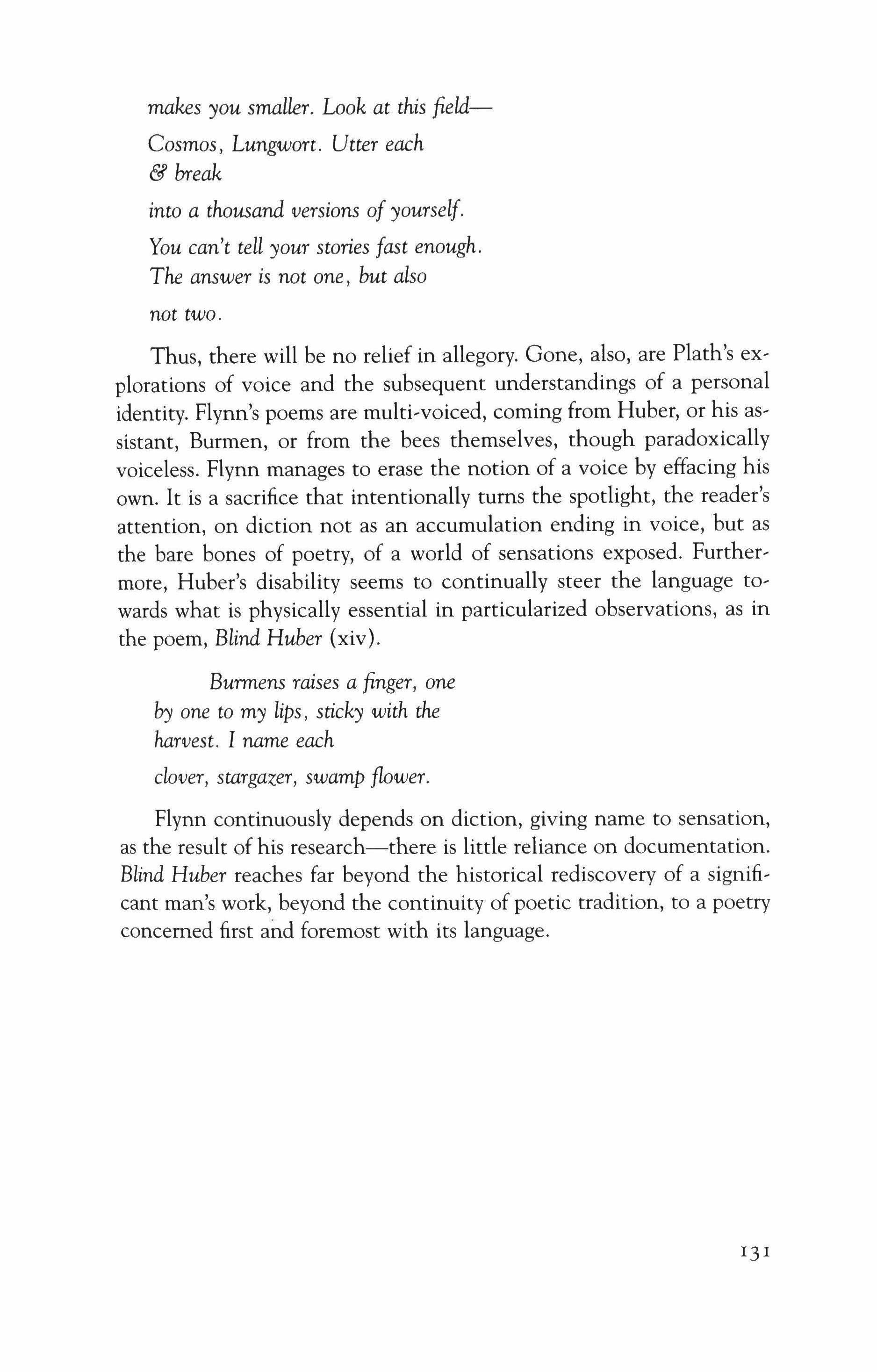
makes you smaller. Look at this fieldCosmos, Lungwort. Utter each & break
into a thousand versions of yourself. You can't tell your stories fast enough. The answer is not one, but also not two.
Thus, there will be no relief in allegory. Gone, also, are Plath's explorations of voice and the subsequent understandings of a personal identity. Flynn's poems are multi-voiced, coming from Huber, or his assistant, Burmen, or from the bees themselves, though paradoxically voiceless. Flynn manages to erase the notion of a voice by effacing his own. It is a sacrifice that intentionally turns the spotlight, the reader's attention, on diction not as an accumulation ending in voice, but as the bare bones of poetry, of a world of sensations exposed. Furthermore, Huber's disability seems to continually steer the language towards what is physically essential in particularized observations, as in the poem, Blind Huber (xiv).
Burmens raises a finger, one by one to my lips, sticky with the harvest. I name each clover, stargazer, swamp flower.
Flynn continuously depends on diction, giving name to sensation, as the result of his research-there is little reliance on documentation. Blind Huber reaches far beyond the historical rediscovery of a significant man's work, beyond the continuity of poetic tradition, to a poetry concerned first and foremost with its language.
I3 I
Kimiko Hahn
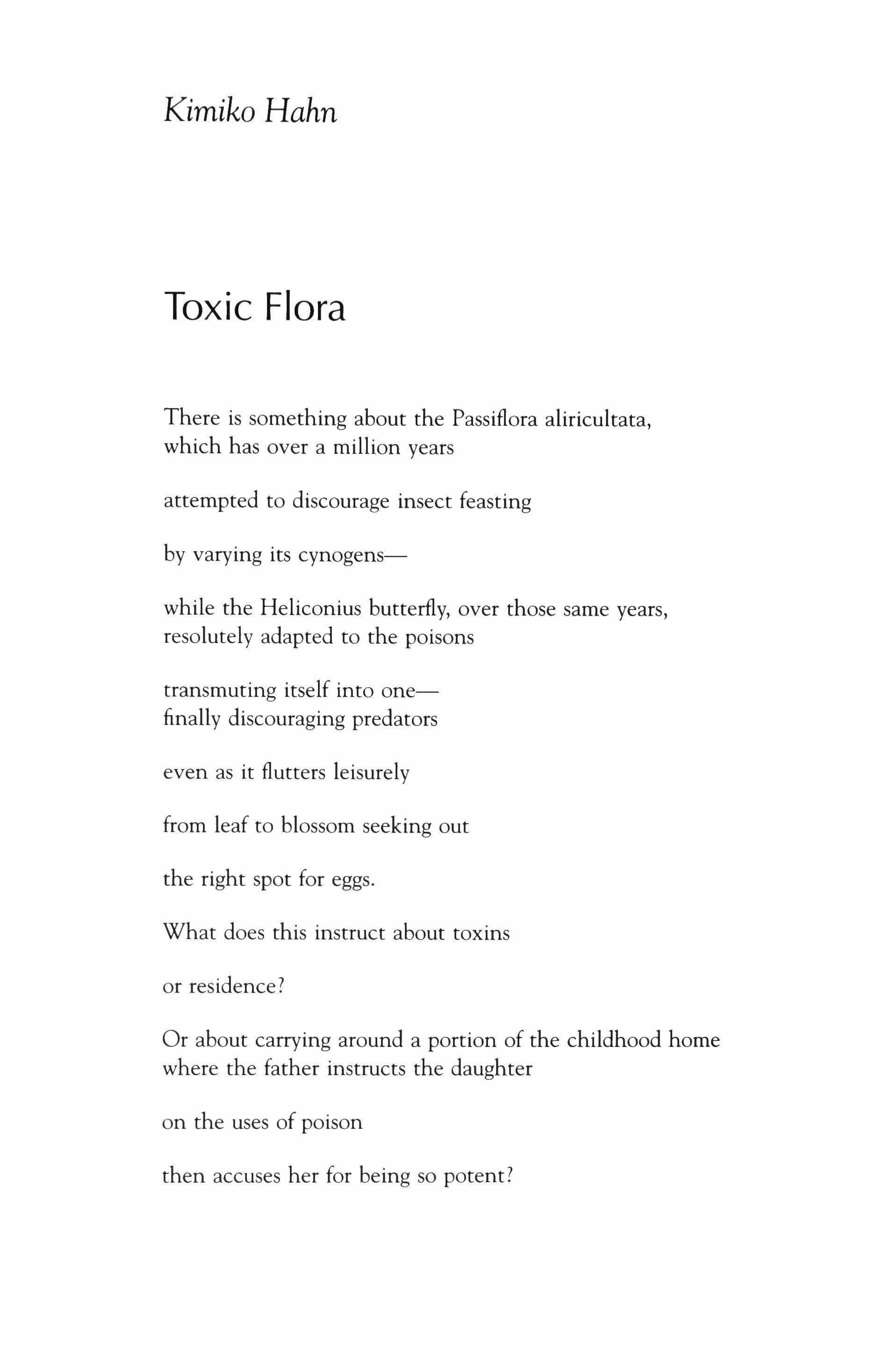
Toxic Flora
There is something about the Passiflora aliricultata, which has over a million years attempted to discourage insect feasting by varying its cynogenswhile the Heliconius butterfly, over those same years, resolutely adapted to the poisons transmuting itself into onefinally discouraging predators even as it flutters leisurely from leaf to blossom seeking out the right spot for eggs.
What does this instruct about toxins or residence?
Or about carrying around a portion of the childhood home where the father instructs the daughter on the uses of poison then accuses her for being so potent?
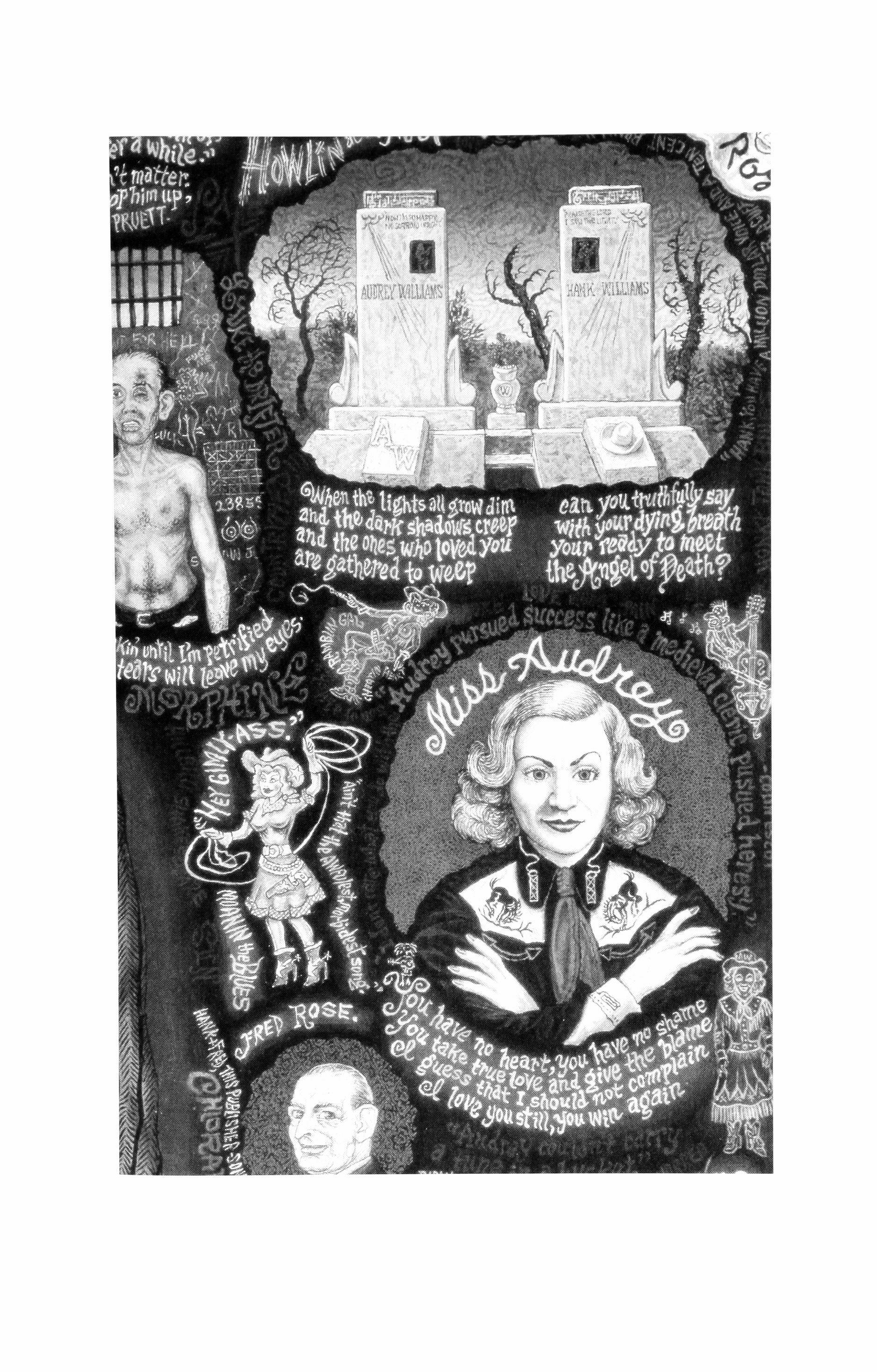

Ai's latest book, Dread, was published by W.W. Norton in 2003. She is a Professor of English at Oklahoma State University.
AI: While I have always read biographies about historical figures when I am writing about them, lately, when writing about my own family, I've had to do a lot of research dealing with Native Americans in Oklahoma and Texas. That has involved searching tribal rolls, census records, cemetery records, and even a list of the dead at the Alamo, as well as talking to older relatives, but unfortunately, with the death of my mother in 2003, anyone who remembers our Native American history has died, so I really have to depend on outside records now. I do know enough about Irish background that I can furnish that part of our story. Since we're multiracial, I have a wealth of material. Don't get me started. I haven't even dealt with the Japanese and my part of that much, yet. Wish me luck.
Meena Alexander was born in India and raised there and in Sudan. She is the author of IUiterate Heart (winner of the 2002 PEN Open Book Award) and Raw Silk, 2004, both published by Triquarterly Books/Northwestern University Press. She is the editor of Indian Love Poems (Knopf/ Everyman's Library, 2005). She is a Distinguished Professor of English at Hunter College and the Graduate Center, CUNY.
ALEXANDER: Often when I write my poems, after the initial images open up in my mind, I have to feast on writings, both poems and prose that help me uncover underground channels, sound and sense fastening onto each other, bit by bit, cutting away at the mass of unknowing which is what my mind so often seems to be, so that some light glows and bums, if only for a very short time, at the end of the task. So some research, intuitive, precise, detailed in my notebooks, is always there. For the poem "Triptych" I read up on the poet Forgugh Ferrokhzad, both her poems and her biography, also the lines which survive in various translations from the great Enheduanna of Ur. I also had to find out details of Frank Stella's "Dove of Tanna" what it was made of, and when. Somehow the concrete task of research often steadies me, allowing me to seek multiple anchors in the given, for this new perilous thing I am making. I say "thing" advisedly for I do think of my poems as made things.
CONTRIBUTORS
134
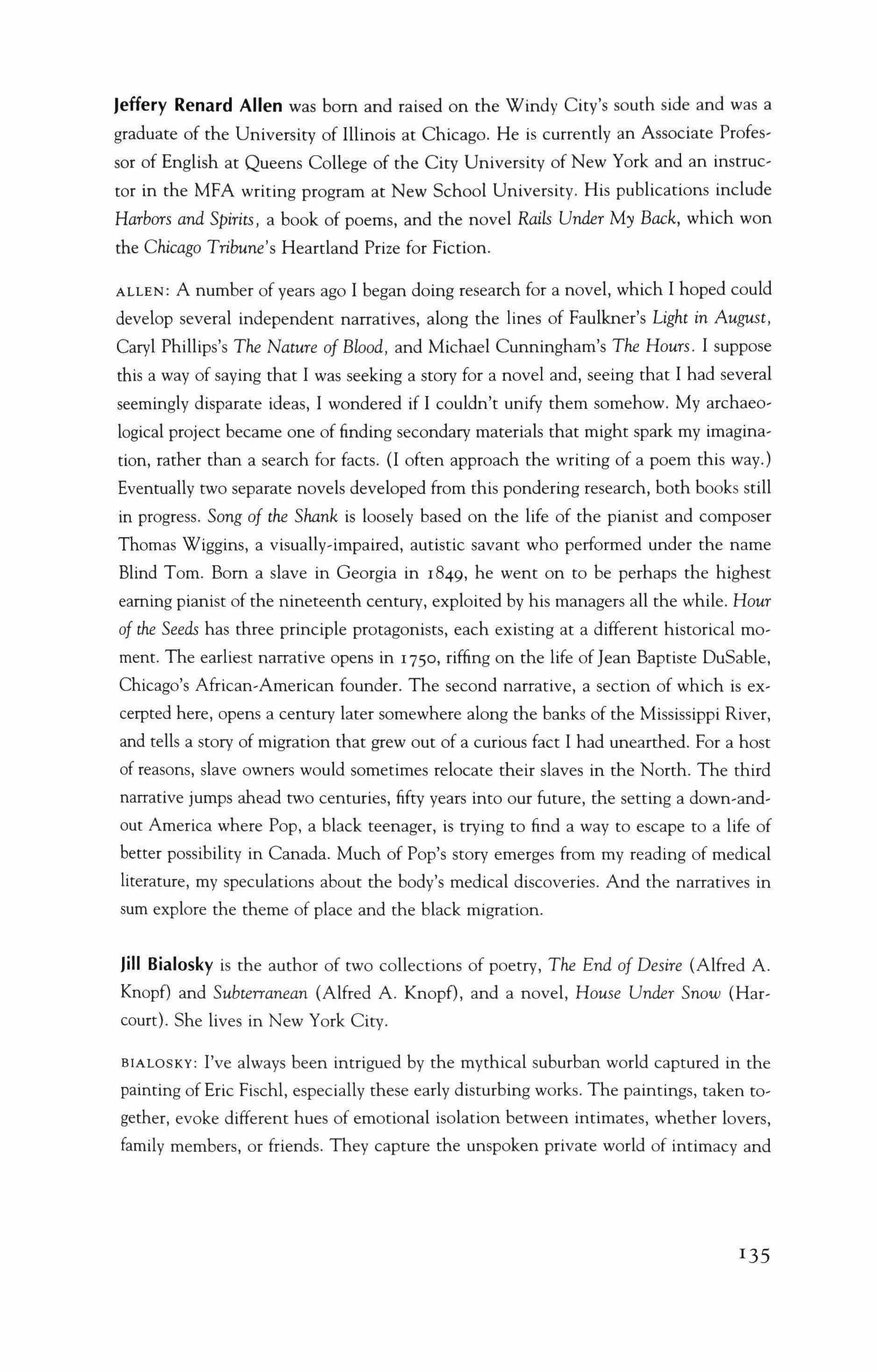
Jeffery Renard Allen was born and raised on the Windy City's south side and was a graduate of the University of Illinois at Chicago. He is currently an Associate Professor of English at Queens College of the City University of New York and an instructor in the MFA writing program at New School University. His publications include Harbors and Spirits, a book of poems, and the novel Rails Under My Back, which won the Chicago Tribune's Heartland Prize for Fiction.
ALLEN: A number of years ago I began doing research for a novel, which I hoped could develop several independent narratives, along the lines of Faulkner's Light in August, Caryl Phillips's The Nature of Blood, and Michael Cunningham's The Hours. I suppose this a way of saying that I was seeking a story for a novel and, seeing that I had several seemingly disparate ideas, I wondered if I couldn't unify them somehow. My archaeological project became one of finding secondary materials that might spark my imagination, rather than a search for facts. (I often approach the writing of a poem this way.)
Eventually two separate novels developed from this pondering research, both books still in progress. Song of the Shank is loosely based on the life of the pianist and composer Thomas Wiggins, a visually-impaired, autistic savant who performed under the name Blind Tom. Born a slave in Georgia in 1849, he went on to be perhaps the highest earning pianist of the nineteenth century, exploited by his managers all the while. Hour of the Seeds has three principle protagonists, each existing at a different historical moment. The earliest narrative opens in 1750, riffing on the life of Jean Baptiste DuSable, Chicago's African-American founder. The second narrative, a section of which is excerpted here, opens a century later somewhere along the banks of the Mississippi River, and tells a story of migration that grew out of a curious fact I had unearthed. For a host of reasons, slave owners would sometimes relocate their slaves in the North. The third narrative jumps ahead two centuries, fifty years into our future, the setting a down-andout America where Pop, a black teenager, is trying to find a way to escape to a life of better possibility in Canada. Much of Pop's story emerges from my reading of medical literature, my speculations about the body's medical discoveries. And the narratives in sum explore the theme of place and the black migration.
Jill Bialosky is the author of two collections of poetry, The End of Desire (Alfred A. Knopf) and Subterranean (Alfred A. Knopf), and a novel, House Under Snow (Harcourt). She lives in New York City.
BIALOSKY: I've always been intrigued by the mythical suburban world captured in the painting of Eric Fischl, especially these early disturbing works. The paintings, taken together, evoke different hues of emotional isolation between intimates, whether lovers, family members, or friends. They capture the unspoken private world of intimacy and 135

evoke a constellation of emotions: repulsion, tenderness, sexuality, longing. As I began to conceive of a series of poems about intimacy and privacy, I thought of those paintings and the figures within the paintings began to blur in my mind forming their own assemblage of experience. I became interested in how the constellation of emotions become lodged within the self and shape our interiority. In the series of poems that make up "Private Spaces," I hoped to bring the emotional world of Fischl's figures to life through words, and using his images as visual landscapes, to explore the inexplicable nature of connection. The poems in this series are inspired by the following paintings by Eric Fischl: "Bad Boy, 1981," "Bayonne, 1985," "86.059 Scarsdale, 1986," "Saturday Night: (The Aftermath Bath) 1980," and "Saigon Minnesota, 1985."
Ryan Black recently received an MFA in poetry from NYU. He teaches literature and creative writing at Queens College/CUNY.
Nicholas Christopher is the author of fourteen books, eight volumes of poetry, most recently, Crossing the Equator: New & Selected Poems, 1972-2004; five novels, including A Trip to the Stars and Franklin Flyer, and a study of film noir and the American city, Somewhere in the Night. He is a Professor in the School of the Arts at Columbia University, and lives in New York City.
CHRISTOPHER: I am writing a long sequence of thirteen-line poems entitled "14 rue Serpentine." The first fourteen poems were published in April 2004 in my most recent book, Crossing the Equator: New & Selected Poems, 1972-2004. I have written forty more of these poems to date, including the seven published here. I am also translating Martial's Epigrams, and began doing so formally after I had begun writing "14 rue Serpentine." Soon enough fragments of my Martial translations began appearing in my own poemswhose narrator also happens to be translating the Epigrams. A number of the poems in my sequence concern themselves with the problems-and delights=of translation: mirroring and metamorphosing, and attempting to connect disparate cultures and sensibilities across space and time. The latter, in the case of Martial, is a span of twenty centuries. "14 rue Serpentine" also takes ancient history as a touchstone, landscapes physical and mental that are still with us, endlessly transformed, and at the same time frozen as they were, in their entirety, remote as the distant planets. Whether epic or lyric, all poetry inevitably insists that the "larger" histories=-of state, society, culture-and one's personal history merge in a place formally defined and imaginatively boundless. When this happens, and we're attuned to it, something like harmony follows.
Joe Coleman's paintings have exhibited at the American Visionary Art Museum, the Hieronymous Bosch Museum, and the Wadsworth Athenaneum; and there have been a number of books and essays on his work, including The Book of Joe, published in 2003. The editor wrote: "Joe Coleman's paintings are unflinching autopsies of the

human condition." To see his paintings, especially with a magnifying glass, is to experience Coleman's own unholy vision as much as it is to examine a particular subject. He researches from an extraordinary amount of material-whether text, music, or object-before he faces a blank board in the small studio off the living room, or, as he calls it, his Odditorium. More images and info: www.JoeColeman.com (KH).
Mark Doty's seventh collection of poems, School of the Arts, is new from HarperCollins. He is also the author of three books of nonfiction prose, and his recent poems and essays have appeared in the Virginia Quarterly Review, the New Yorker, Ploughshares, and elsewhere. He teaches at the University of Houston and lives in New York City.
DOTY: The work of visual artists is crucial to me as a poet, on a number of levels. First there's the sheer joy of it, the physical immediacy of color and shape, the immediately apprehensible fact of a painting. Then there's wordlessness, which is tonic for a writer; to encounter meaning made without recourse to words, to come face-to-face with something that feels informed by consciousness but doesn't speak-that makes me want to write, as if I were compelled to supply language where there isn't any. Then, there's the whole world of discipline, materials, the allure of the studio---that regular, physical practice of art-making. Recently I've written a number of poems, which I've referred to as "notebooks"-they're made of bits, and may include description, meditation, quotation, and essayistic elements. In a long poem about Lucien Freud's work, I've quoted him extensively, and made use ofbits of Whitman and Melville to help me think about what bodies are, in general, and what Freud's work in particular has to say about them. "Notebook/To Joan Mitchell" has to do with a large and extraordinary exuberant canvas of Mitchell's called "Salut Tom" from 1978. It is one of the most magnificent paintings I know, and it's almost useless to look at a reproduction of it, since the picture is nine feet high and twenty-six feet long, and so complex in its handling of color that it defies photography. It has an intensely vibrating, inescapable presence, and as I thought about the painting it seemed to draw other images and bits of perception toward itself, into the field of thinking that became the poem.
Cornelius Eady's latest book of poems, Brutal Imagination (Marian Wood/Putnam, 2001), was a finalist for the 2001 National Book Award. Beginning in the fall of 2005, he will be senior poet at the University of Notre Dame. He is married to the novelist Sarah Micklem.
EADY: I met Joe Wood only once, at the end of an otherwise weary panel somewhere in the late eighties on the nature of "The New Black Aesthetic," a reaction to Trey Ellis's essay of the same title that had appeared in an issue of Callaloo. It was actually a good moment to explore what was happening with many African-American writers becoming more visible in the publishing worlds.
137
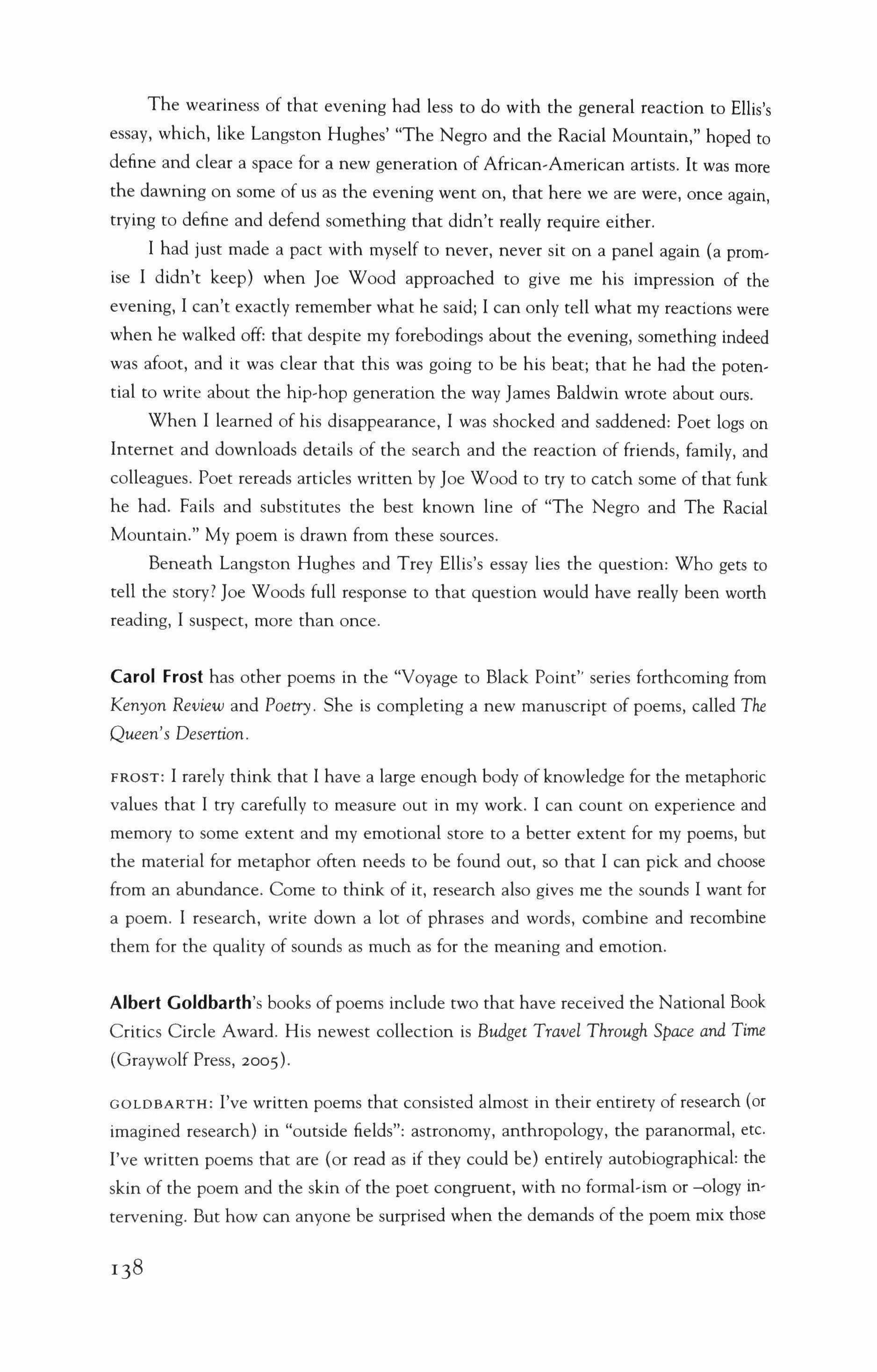
The weariness of that evening had less to do with the general reaction to Ellis's essay, which, like Langston Hughes' "The Negro and the Racial Mountain," hoped to define and clear a space for a new generation of African-American artists. It was more the dawning on some of us as the evening went on, that here we are were, once again, trying to define and defend something that didn't really require either.
I had just made a pact with myself to never, never sit on a panel again (a promise I didn't keep) when Joe Wood approached to give me his impression of the evening, I can't exactly remember what he said; I can only tell what my reactions were when he walked off: that despite my forebodings about the evening, something indeed was afoot, and it was clear that this was going to be his beat; that he had the potential to write about the hip-hop generation the way James Baldwin wrote about ours.
When I learned of his disappearance, I was shocked and saddened: Poet logs on Internet and downloads details of the search and the reaction of friends, family, and colleagues. Poet rereads articles written by Joe Wood to try to catch some of that funk he had. Fails and substitutes the best known line of "The Negro and The Racial Mountain." My poem is drawn from these sources.
Beneath Langston Hughes and Trey Ellis's essay lies the question: Who gets to tell the story? Joe Woods full response to that question would have really been worth reading, I suspect, more than once.
Carol Frost has other poems in the "Voyage to Black Point" series forthcoming from Kenyon Review and Poetry. She is completing a new manuscript of poems, called The Queen's Desertion.
FROST: I rarely think that I have a large enough body of knowledge for the metaphoric values that I try carefully to measure out in my work. I can count on experience and memory to some extent and my emotional store to a better extent for my poems, but the material for metaphor often needs to be found out, so that I can pick and choose from an abundance. Come to think of it, research also gives me the sounds I want for a poem. I research, write down a lot of phrases and words, combine and recombine them for the quality of sounds as much as for the meaning and emotion.
Albert Goldbarth's books of poems include two that have received the National Book Critics Circle Award. His newest collection is Buaget Travel Through Space and Time (Graywolf Press, 2005).
GOLDBARTH: I've written poems that consisted almost in their entirety of research (or imagined research) in "outside fields": astronomy, anthropology, the paranormal, etc. I've written poems that are (or read as if they could be) entirely autobiographical: the skin of the poem and the skin of the poet congruent, with no formal-ism or -ology intervening. But how can anyone be surprised when the demands of the poem mix those
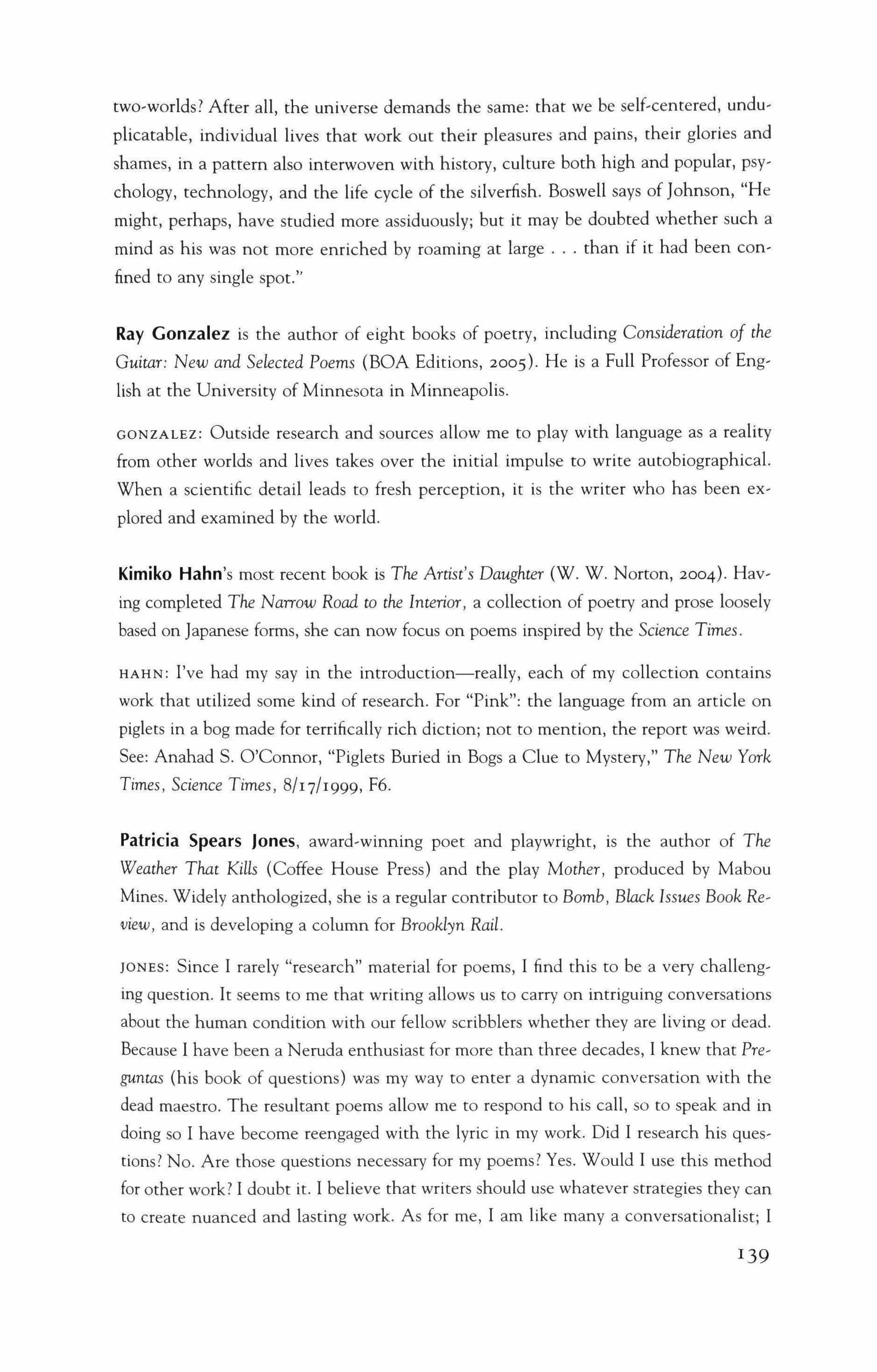
two-worlds? After all, the universe demands the same: that we be self-centered, unduplicatable, individual lives that work out their pleasures and pains, their glories and shames, in a pattern also interwoven with history, culture both high and popular, psychology, technology, and the life cycle of the silverfish. Boswell says of Johnson, "He might, perhaps, have studied more assiduously; but it may be doubted whether such a mind as his was not more enriched by roaming at large than if it had been confined to any single spot."
Ray Gonzalez is the author of eight books of poetry, including Consideration of the Guitar: New and Selected Poems (BOA Editions, 2005). He is a Full Professor of English at the University of Minnesota in Minneapolis.
GONZALEZ: Outside research and sources allow me to play with language as a reality from other worlds and lives takes over the initial impulse to write autobiographical. When a scientific detail leads to fresh perception, it is the writer who has been explored and examined by the world.
Kimiko Hahn's most recent book is The Artist's Daughter (W. W. Norton, 2004). Having completed The Narrow Road to the Interior, a collection of poetry and prose loosely based on Japanese forms, she can now focus on poems inspired by the Science Times.
HAHN: I've had my say in the introduction-really, each of my collection contains work that utilized some kind of research. For "Pink": the language from an article on piglets in a bog made for terrifically rich diction; not to mention, the report was weird. See: Anahad S. O'Connor, "Piglets Buried in Bogs a Clue to Mystery," The New York Times, Science Times, 8/17/1999, F6.
Patricia Spears Jones, award-winning poet and playwright, is the author of The Weather That Kills (Coffee House Press) and the play Mother, produced by Mabou Mines. Widely anthologized, she is a regular contributor to Bomb, Black Issues Book Review, and is developing a column for Brooklyn Rail.
JONES: Since I rarely "research" material for poems, I find this to be a very challenging question. It seems to me that writing allows us to carry on intriguing conversations about the human condition with our fellow scribblers whether they are living or dead. Because I have been a Neruda enthusiast for more than three decades, I knew that Preguntas (his book of questions) was my way to enter a dynamic conversation with the dead maestro. The resultant poems allow me to respond to his call, so to speak and in doing so I have become reengaged with the lyric in my work. Did I research his questions? No. Are those questions necessary for my poems? Yes. Would I use this method for other work? I doubt it. I believe that writers should use whatever strategies they can to create nuanced and lasting work. As for me, I am like many a conversationalist; I
139

listen for the question, the quip, the phrase that will tip my cup in the direction of reply and invention.
Wing Tek lum's collection of poetry, Expounding the Doubleful Points, was published by Bambook Ridge Press in 1987.
LUM: The great Chinese painters could conjure up all manner of landscapes just sitting inside their studios. I on the other hand have likened my inspirational roots to that of a vampire's-stealing others' essences. I was aware of some of the general tragedies of the Nanjing Massacre (the Rape of Nanking) in 1937. But I could never have imagined such specific horrors on my own. What I have written-now some twenty-odd poems on this historical event-is due directly to my appropriation of numerous books I have read on the subject, all in English (though some translated from Chinese or Japanese). My only contribution has been the ability to package the events described into some poetic form.
Mihaela Moscaliuc co-translated Death Searches for You a Second Time by Carmelia Leonte (Red Dragonfly Press, 2003). Her co-translations of contemporary Romanian poetry appear in Arts&Letters, MississiPPi Review, Connecticut Review, and Mid-American Review.
Sarah Micklem worked as a graphic designer for almost twenty years before publishing her first novel, Firethom (Scribner, 2004). She is now writing a sequel.
MICKLEM: I was in search of a subject for a short story, so I assigned myself the exercise of using two unrelated books on my shelves as inspiration. Any two books would do, but I chose Realms of Fantasy: Folk Tales from Gozo, by George Camilleri (Gozo Press, 1981), and The Ancient Engineers, by L. Sprague de Camp. I'd mistaken the first book for a collection of imaginary folk tales from an imaginary place, and was disappointed to learn that Gozo was in the Republic of Malta. But I proceeded on the basis of my mistaken notion to write a fake folk tale set on a nonexistent island. Some of the real tales from Gozo struck me as pointless, and I thought I could aspire to that myself so much easier than a story with a satisfactory beginning, middle, and end. The Ancient Engineers contributed the captive horologists of the epigraph and information about early timekeeping. I did further research to give my inventions a ballast of fact. I found an account by William of Rubrick, a Franciscan monk, of his visit to the Great Khan in 1253 (not Genghis Khan himself, but one of his successors). William had unflattering things to say about soothsayers. I've written several tales of the Isle of Abigomas; it turns out to be a nice place to visit.
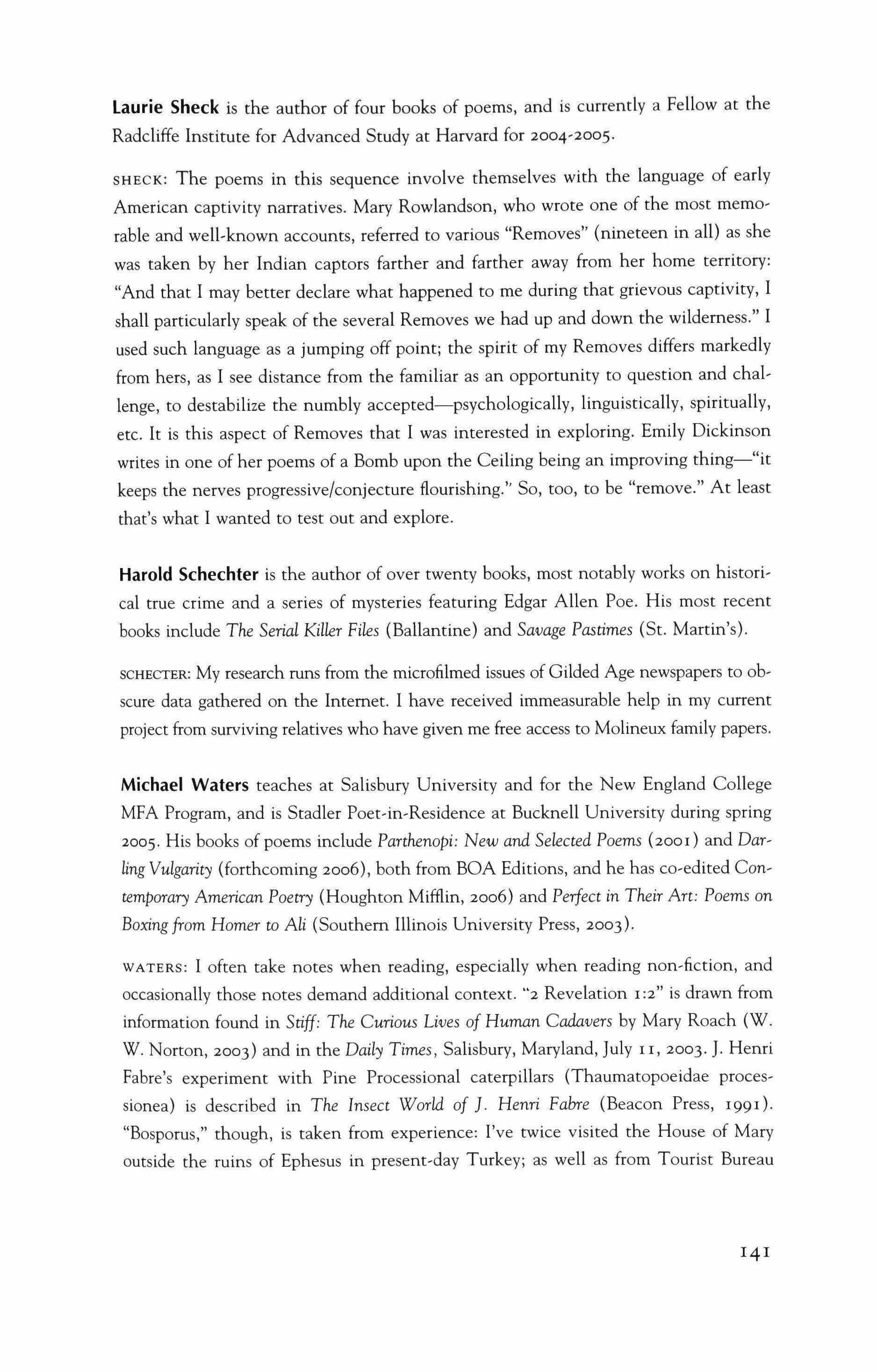
Laurie Sheck is the author of four books of poems, and is currently a Fellow at the Radcliffe Institute for Advanced Study at Harvard for 2004-:20°5.
SHECK: The poems in this sequence involve themselves with the language of early American captivity narratives. Mary Rowlandson, who wrote one of the most memo' rable and well-known accounts, referred to various "Removes" (nineteen in all) as she was taken by her Indian captors farther and farther away from her home territory: "And that I may better declare what happened to me during that grievous captivity, I shall particularly speak of the several Removes we had up and down the wilderness." I used such language as a jumping off point; the spirit of my Removes differs markedly from hers, as I see distance from the familiar as an opportunity to question and challenge, to destabilize the numbly accepted-psychologically, linguistically, spiritually, etc. It is this aspect of Removes that I was interested in exploring. Emily Dickinson writes in one of her poems of a Bomb upon the Ceiling being an improving thing-"it keeps the nerves progressive/conjecture flourishing." So, too, to be "remove." At least that's what I wanted to test out and explore.
Harold Schechter is the author of over twenty books, most notably works on historical true crime and a series of mysteries featuring Edgar Allen Poe. His most recent books include The Serial Killer Files (Ballantine) and Savage Pastimes (St. Martin's).
SCHECTER: My research runs from the microfilmed issues of Gilded Age newspapers to obscure data gathered on the Internet. I have received immeasurable help in my current project from surviving relatives who have given me free access to Molineux family papers.
Michael Waters teaches at Salisbury University and for the New England College MFA Program, and is Stadler Poet-in-Residence at Bucknell University during spring 2005. His books of poems include Parthenopi: New and Selected Poems (2001) and Dar, ling Vulgarity (forthcoming 2006), both from BOA Editions, and he has co'edited Con, temporary American Poetry (Houghton Mifflin, 2006) and Perfect in Their Art: Poems on Boxingfrom Homer to Ali (Southern Illinois University Press, 2003).
WATERS: I often take notes when reading, especially when reading non,fiction, and occasionally those notes demand additional context. "2 Revelation I :2" is drawn from information found in Stiff: The Curious Lives of Human Cadavers by Mary Roach (W. W. Norton, 2003) and in the Daily Times, Salisbury, Maryland, July II, 2003. J. Henri Fabre's experiment with Pine Processional caterpillars (Thaumatopoeidae processionea) is described in The Insect World of J. Henri Fabre (Beacon Press, 1991). "Bosporus," though, is taken from experience: I've twice visited the House of Mary outside the ruins of Ephesus in present'day Turkey; as well as from Tourist Bureau

brochures and travel guides. Legend insists that John brought Mary to Ephesus after the crucifixion, and that angels delivered her house to its present site.
John Weir teaches English and Creative Writing at Queens College/CUNY. He is the author of the novel The Irreversible Decline of Eddie Socket, and his new novel, What I Did Wrong, will be published next year by Viking.
WEIR: Over the past twenty-five years, I have kept a running (though only intermittently documented) tally, and analysis, of the appearance of "queer" characters in twentieth-century American literature, particularly in the novel since World War II. I am still figuring out what the aspect of the "sexual transgressor" lends to the American novel, and what these gay boys, silly billys, tough girls, jazz musicians, fey dentists, dubious houseboys, and cigar-chomping Hungarian women are meant to add, in terms of realism, in particular to novels by writers like Jack Kerouac, as well as John Cheever, Mary McCarthy, Norman Mailer, Flannery O'Connor, James Baldwin, John Updike, J. D. Salinger, and Joan Didion.
Subscriptions
Three issues per year. Individuals: one year $24; two years $44; life $600. Institutions: one year $36; two years $68. Overseas: $5 per year additional. Price of back issues varies. Sample copies $5. Address correspondence and subscriptions to TriQuarterly, Northwestern University, 629 Noyes St., Evanston, IL 60208-4210. Phone (847) 491-7614.
Submissions
The editors invite submissions of fiction, poetry and literary essays, which must be postmarked between October I and March 31; manuscripts postmarked between April I and September 30 will not be read. No manuscripts will be returned unless accompanied by a stamped, self-addressed envelope. All manuscripts accepted for publication become the property of TriQuarterly, unless otherwise indicated.
Reprints
Reprints of issues 1-17 of TriQuarterly are available in full format from Kraus Reprint Company, Route 100, Millwood, NY 10546, and all issues in microfilm from University Microfilms International, 300 North Zeeb Road, Ann Arbor, MI 48106.
Indexing
TriQuarterly is indexed in the Humanities Index (H. W. Wilson Co.), the American Humanities Index (Whitson Publishing Co.), Historical Abstracts, MLA, EBSCO Publishing (Peabody, MA) and Information Access Co. (Foster City, CA).
Distributors
Our national distributors to retail trade are Ingram Periodicals (La Vergne, TN); B. DeBoer (Nutley, NJ); Ubiquity (Brooklyn, NY); Armadillo (Los Angeles, CA).
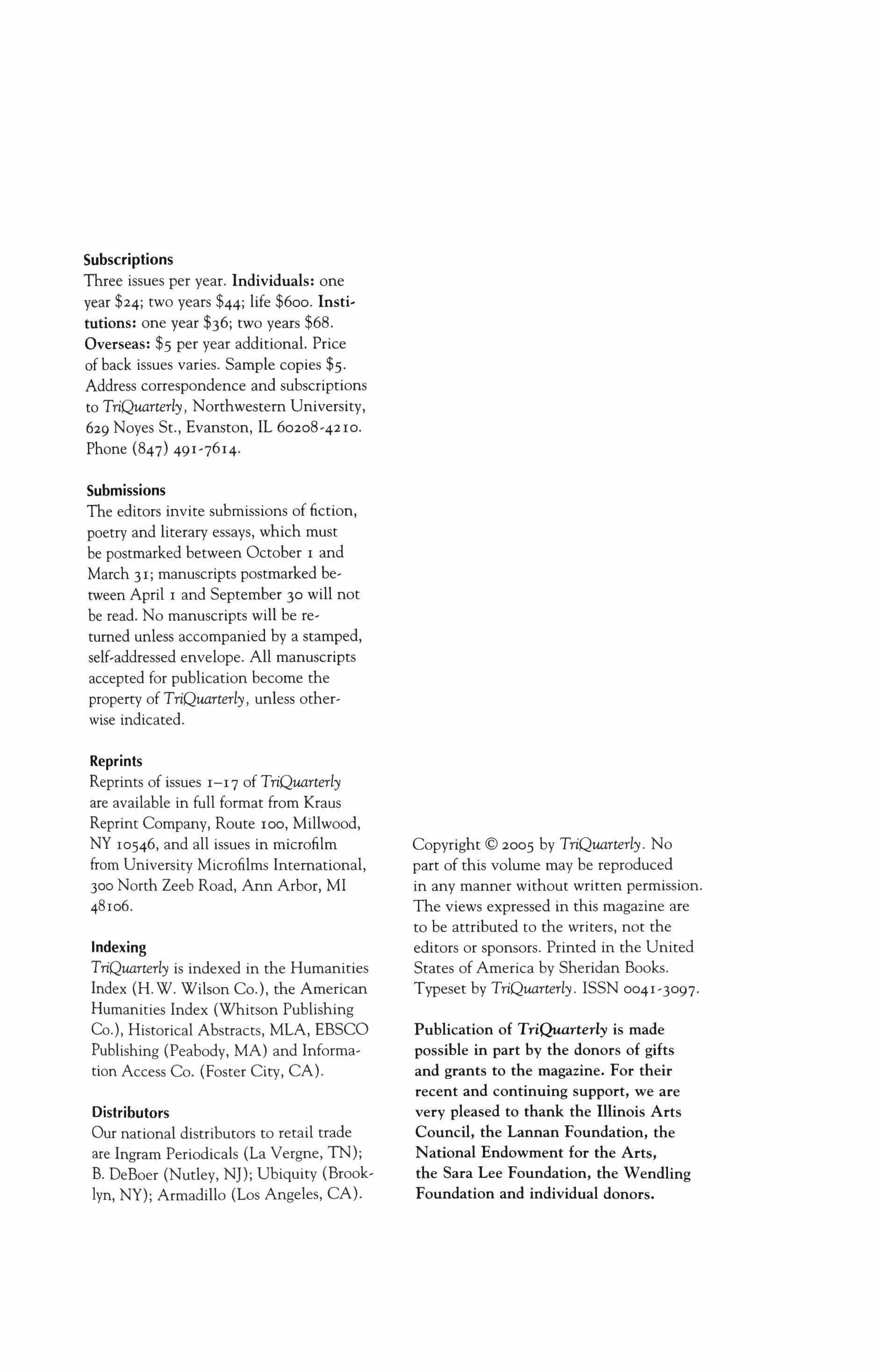
Copyright © 2005 by TriQuarterly. No part of this volume may be reproduced in any manner without written permission. The views expressed in this magazine are to be attributed to the writers, not the editors or sponsors. Printed in the United States of America by Sheridan Books. Typeset by TriQuarterly. ISSN 0041-3097.
Publication of TriQuarterly is made possible in part by the donors of gifts and grants to the magazine. For their recent and continuing support, we are very pleased to thank the Illinois Arts Council, the Lannan Foundation, the National Endowment for the Arts, the Sara Lee Foundation, the Wendling Foundation and individual donors.
MICHIGAN QUARTERLY REVIEW
announces a special two-volume issue
Fall 2005 and Winter 2006
THE DOCUMENTARY IMAGINATION
edited byTom Fricke and Keith Taylor
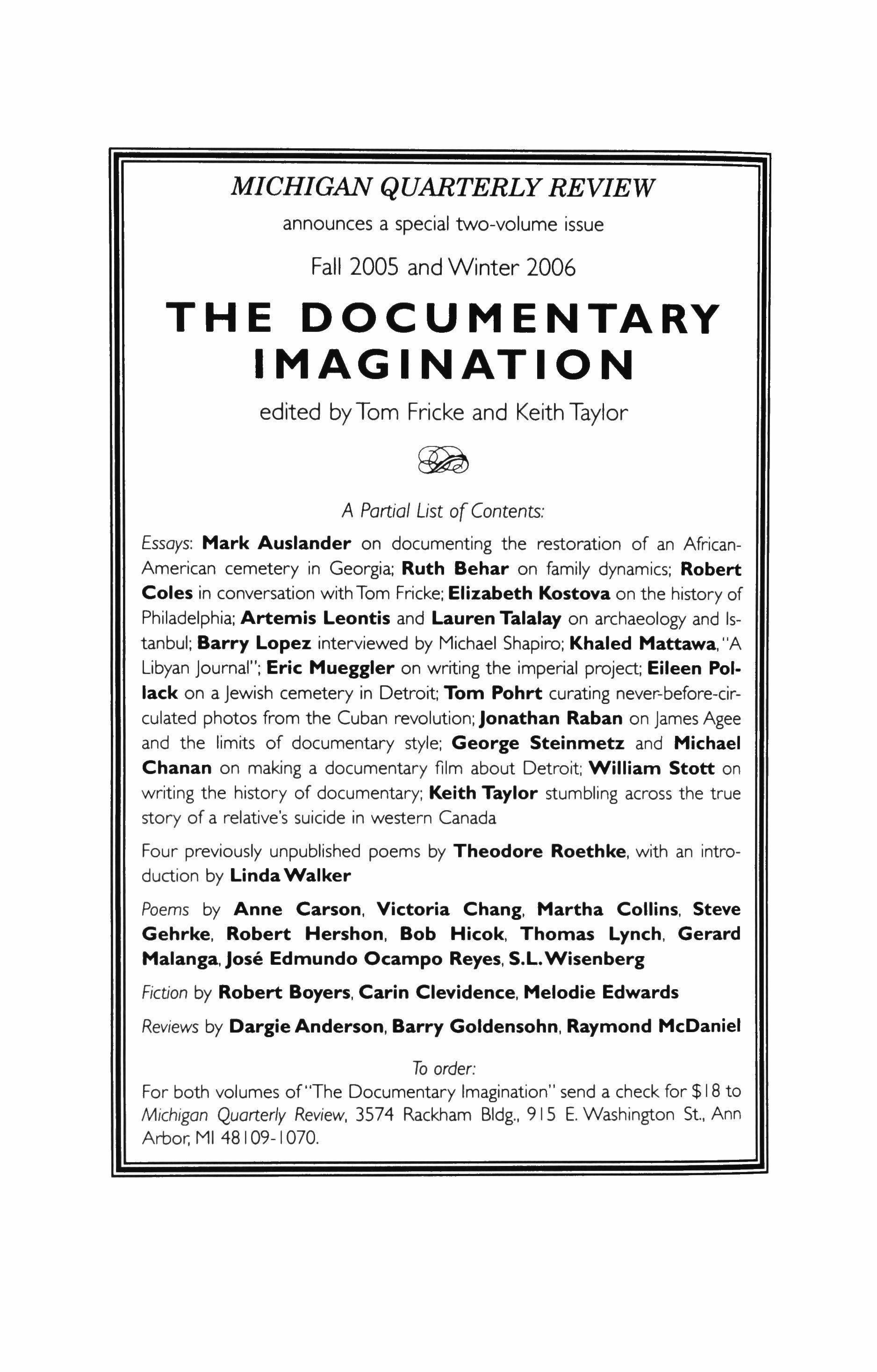
A Partial List ofContents:
Essays: Mark Auslander on documenting the restoration of an AfricanAmerican cemetery in Georgia; Ruth Behar on family dynamics; Robert Coles in conversation with Tom Fricke; Elizabeth Kostova on the history of Philadelphia; Artemis Leontis and Lauren Talalay on archaeology and Istanbul; Barry Lopez interviewed by Michael Shapiro; Khaled Mattawa, "A Libyan Journal"; Eric Mueggler on writing the imperial project; Eileen Pollack on a Jewish cemetery in Detroit; Tom Pohrt curating never-before-circulated photos from the Cuban revolution; Jonathan Raban on James Agee and the limits of documentary style; George Steinmetz and Michael Chanan on making a documentary film about Detroit; William Stott on writing the history of documentary; Keith Taylor stumbling across the true story of a relative's suicide in western Canada
Four previously unpublished poems by Theodore Roethke, with an introduction by Linda Walker
Poems by Anne Carson, Victoria Chang, Martha Collins, Steve Gehrke, Robert Hershon, Bob Hicok, Thomas Lynch, Gerard Malanga, Jose Edmundo Ocampo Reyes, S.L.Wisenberg
Fiction by Robert Boyers, Carin Clevidence, Melodie Edwards
Reviews by Dargie Anderson, Barry Goldensohn, Raymond McDaniel
To order:
For both volumes of"The Documentary Imagination" send a check for $18 to Michigan Quarterly Review, 3574 Rackham Bldg., 915 E. Washington St., Ann Arbor; MI 48109-1070.

SUBMISSION GUIDELINES
$1,500 honorarium and book publication. Manuscripts accepted from 1 October 2005 through the postmark deadline of 17 January 2006. The winner will be announced in May 2006.
The winning book-length collection of poems will be published by the Center for Literary Publishing in the fall of 2006. There is a $25 reading fee, which includes a one-year subscription to Colorado Review. Make checks payable to Colorado Review. VISNMastercard also accepted (include card number, expiration date, and name as it appears on the card).
This year's final judge is Lyn Hejinian. Students of the judge (current & former) are not eligible to compete, nor are current Colorado State University employees & students or alumni. Manuscripts may consist of poems that have been previously published, but the collection as a whole must be unpublished. Manuscripts must be securely bound with binder clips. There is no minimum or maximum number of pages; most manuscripts, however, are between 40 and 100 pages.
• Do not send originals: manuscripts will be returned. Do not supply postage for the return of your manuscript as manuscripts cannot be returned.
• Please enclose a self-addressed stamped envelope for contest results and a self-addressed stamped postcard for notification of the manuscript's safe arrival. No e-mail submissions accepted. Include two title 'pages: top page with manuscript title and author name, address, and phone number; and second page with manuscript title only. Your name should not appear anywhere else in the manuscript.
• Send your manuscript to:
Colorado Prize for Poetry Center for Literary Publishing Department of English Colorado State University Fort Collins, CO 80523
Questions? Please call us at (970) 491-5449, send an e-mail to creview@colostate.edu, or visit our website at http:// coloradoreview.colostate.edu
Washington and Lee University
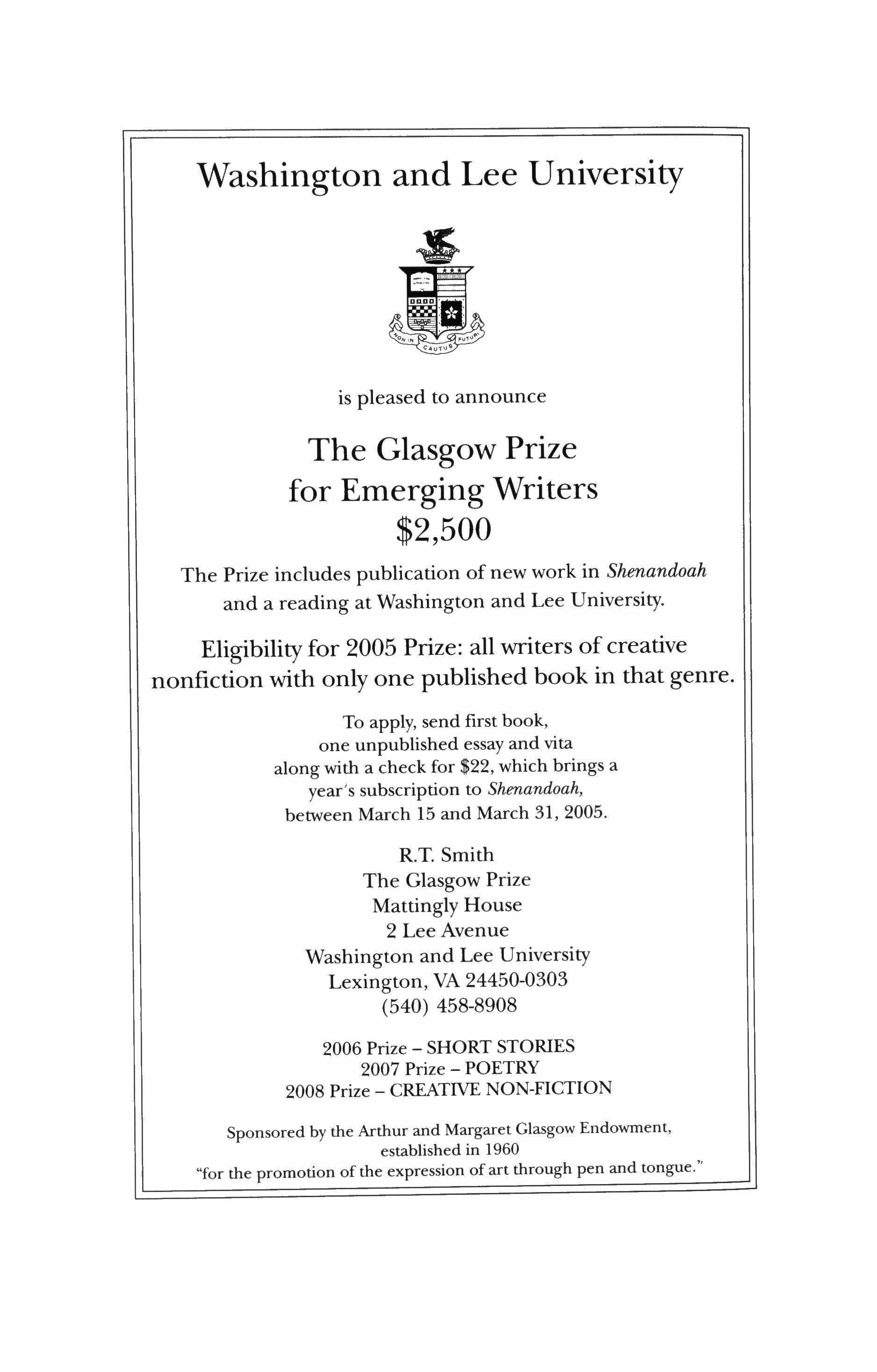
is pleased to announce
The Glasgow Prize for Emerging Writers
$2,500
The Prize includes publication of new work in Shenandoah and a reading at Washington and Lee University.
Eligibility for 2005 Prize: all writers of creative nonfiction with only one published book in that genre.
To apply, send first book, one unpublished essay and vita along with a check for $22, which brings a year's subscription to Shenandoah, between March 15 and March 31, 2005.
R.T. Smith
The Glasgow Prize Mattingly House 2 Lee Avenue Washington and Lee University Lexington, VA 24450-0303 (540) 458-8908
2006 Prize - SHORT STORIES
2007 Prize - POETRY
2008 Prize - CREATIVE NON-FICTION
Sponsored by the Arthur and Margaret Glasgow Endowment, established in 1960 "for the promotion of the expression of art through pen and tongue."
Can you believe the holidays are coming up so quickly?

Order your gift subscriptions now and relax during the holidays. What could be easier? No traffic, no lines in the store, no pulling out the wrapping paper and rummaging for scissors and tape-and you'll have the satisfaction ofgiving a quality gift for a very reasonable price. �
/
We'll send an embossed gift card early inDecember to let your-friends and loved ones know that you'vegiven'them a gift for each season=excellent fiction, poetry, essays;reviews, and visual art that repeatedly delight. -:;::<1'
U'e tUe � tute-� 94t�pn� $20ead,
.I � f \. �( eatt 1-100-542-3411 or visit www.uga.edu/garev/giftsubs THE GEORGIAREV1EW The University ofGeorgia. Athens, GA 30602-9009
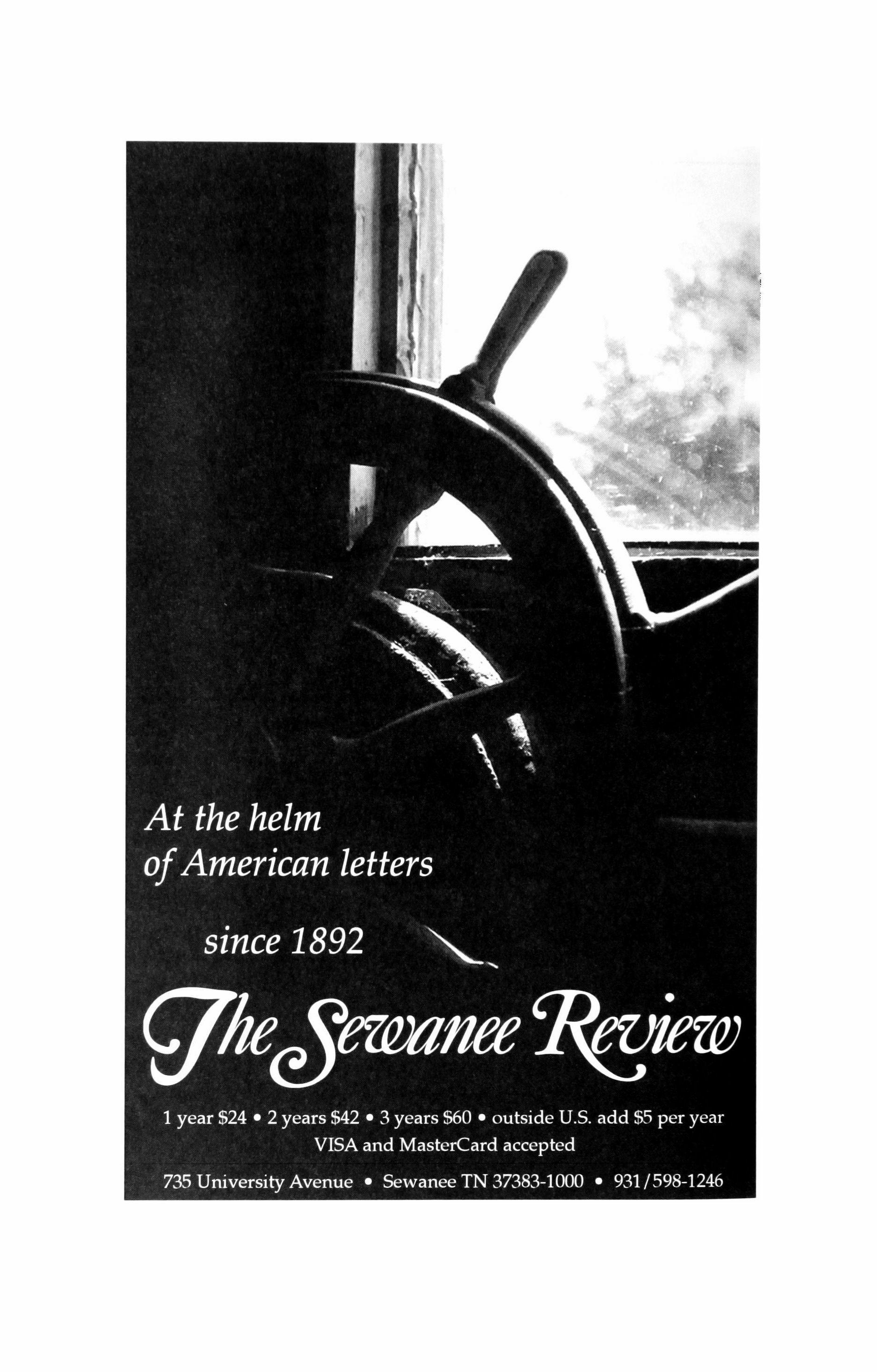

"New England Review continues to uphold its reputation for publishing extraordinary, enduring work," says a review from Ncwl'ages.corn. Recent issues include new fiction by Janet Kauffman, Aurelie Sheehan, Robert Lopez, and Christopher Sorrentino; poetry from Lucia Perillo, William Logan, Sam Witt, and Sarah Murphy; A. J. Sherman on varieties of intellectual dishonesty; Steven G. Kellman on the life of novelist Henry Roth; Gary Adelman on the world of Beckett's old age; plus n c w translations of poems by Federico Garda Lorca and Charles Cros.
NER offers a sustained level of achievement and J rJnge of rc.idiug experiences unparalleled by any contemporary literary magazine. Over the course of this coming year we'll feature .1 rJnge of nonfiction-v-an autobiographical essay by Thomas Mann, J sustained look at pioneering filmmaker Marjorie Keller, some thoughts on Candide by Michael Wood, and more-along with an intriguing arrJY of new fiction and poetry by both established and emerging writers.
Subscribe for just $25 a year and find out for yourself what has sustained and distinguished NER since its founding in 1978.
Subscriptions (4- issues): $25 individuals, $4-0 institutions single issues $S, double issue $12
New England Review Middlebury College, Middlebury, VT 05753 (Soo) 4-50-957I Visit our website at www.go.middlebuI1'.edu/nereview
NIEIR
NF.w E�GLAND RbVlEW
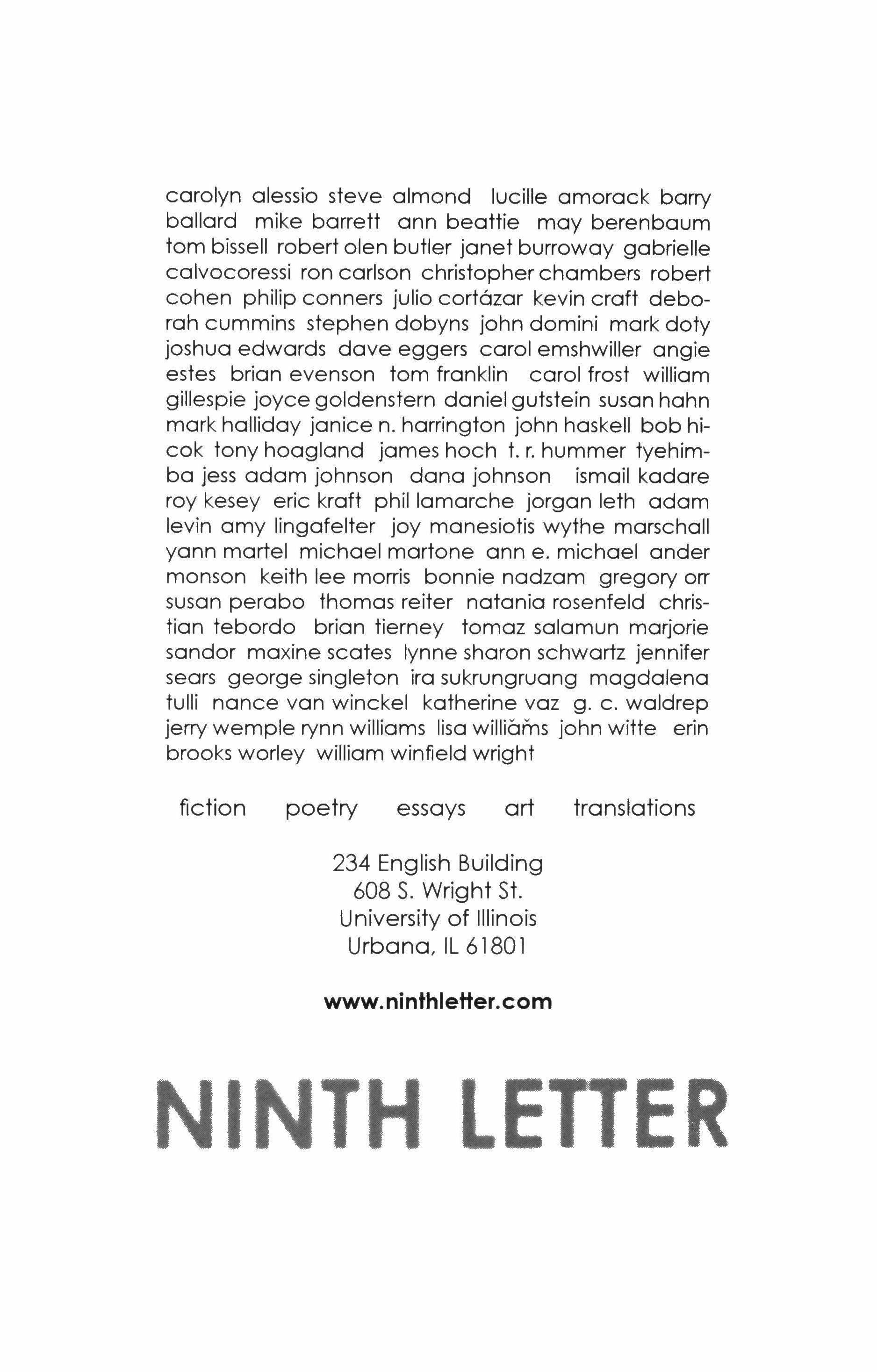
carolyn alessio steve almond lucille amorack barry ballard mike barrett ann beattie may berenbaum tom bissell robert olen butler janet burroway gabrielle calvocoressi ron carlson christopher chambers robert cohen philip conners julio cort6zar kevin craft deborah cummins stephen dobyns john domini mark doty joshua edwards dave eggers carol emshwiller angie estes brian evenson tom franklin carol frost william gillespie joyce goldenstern daniel gutstein susan hahn mark halliday janice n. harrington john haskell bob hicok tony hoagland james hoch t. r. hummer tyehimba jess adam johnson dana johnson ismail kadare roy kesey eric kraft phil lamarche jorgan leth adam levin amy lingafelter joy manesiotis wythe marschall yann martel michael martone ann e. michael ander monson keith lee morris bonnie nadzam gregory orr susan perabo thomas reiter natania rosenfeld christian tebordo brian tierney tomaz salamun marjorie sandor maxine scates lynne sharon schwartz jennifer sears george singleton ira sukrungruang magdalena tulli nance van winckel katherine vaz g. c. waldrep jerry wemple rynn williams lisa williams john witte erin brooks worley william winfield wright
fiction poetry essays art translations
234 English Building
608 S. Wright St. University of Illinois Urbana, IL 61801
www.ninthletter.com
NINTH LETTER
Coming October 2005 from Ontario Review Press
A unique literary publishing event:
RICHARD BURGIN'S
The Identity Club: New and Selected Stories and Songs
featuring 20 of his best stories and 20 of his best songs together in a single book for the first time.
Praise for Richard Burgin's fidion:
"One of America's most distindive storyteliers J can think of no one else of his generation who reports the contemporary war between the sexes with more devastating wit and accuracy.1/
rhe 'hiladelphia Inquirer
"A writer at once elegant and disturbing, Burgin is among our finest artists of love at tts most desperate and his well-crafted stories have won four Pushcart Prizes."
rhe Chicago Tribune
"Richard Burgin'stales capture the strangeness of a world that is simu�aneou�yfrightening and reassuring and in the contemporary American short story nothing quite resembles his singular voice."
rhe Boston Globe
5- 1/2 x 8- 1/2, 330 pp $24.95 hardback CD included
Distributed by W.W. Norton
Available at bookstores or order from Ontario Review Press Tel: 609-737-7497 Fax: 609-737-2695 or from W.W. Norton at 800-233-4830

"Burgin has given expression to a chorus of ahenated voices too haunting to be easilyforgotten."
The New York Times Book Review
praise for Richard Burgin's music: ""Frank� these are the freshest, most surprising love songs of my generation."
David Shapiro
"I've listened careful� to Richard Burgin'sskilKul, melancho� and contagious songs. His songs are the real thing."
Ned Rorem
"Richard Burgin is a strikingly gifted song wrtter and composer. Certain of his songs are cries from the heart that lodge powerfully in the listener like the memory of our most heart rending experiences."
Joyce Carol Oates

New Plays from Chicago
Including profiles of the theatres that produced them
With a Foreword by Rebecca Gilman
EXCLUSIVE SPONSOR: SARA LEE FOUNDATION
These eight plays, all developed at Chicago Dramatists, are representative of the rich and diverse works that receive support through all stages of growth at "The Playwrights' Theatre.
Arrangement for Two Violas by Susan Lieberman
Drawing War by Brett Neveu
The End of the Tour by Joel Drake Johnson
Heat by Marsha Estell
Taking Care by Mia McCullough
The Liquid Moon by John Green
The Face of Emmett TIll by David Barr III and Mamie Till Mobley
Vintage Red and the Dust of the Road by Robert
AVAILABLE ONLY online at www.chlcagodlarnatlst5 org or by calling 312·633·0630.
Koon

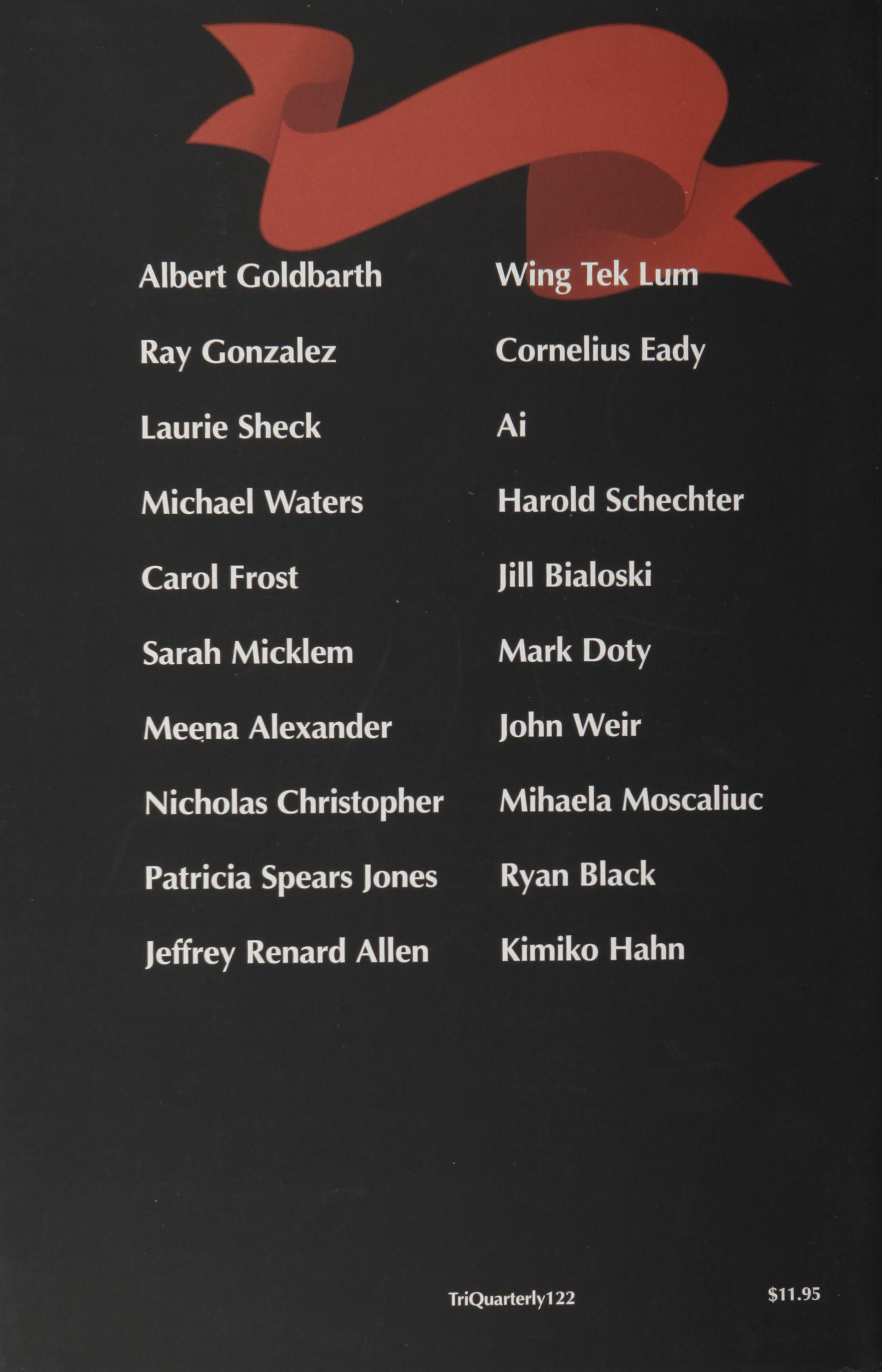
Albert Goldbarth Wing Tek Lum
Ray Gonzalez Cornelius Eady
Laurie Sheck Ai
Michael Waters Harold Schechter
Carol Frost Jill Bialoski
Sarah Micklem Mark Doty
Meena Alexander John Weir
Nicholas Christopher Mihaela Moscaliuc
Patricia Spears Jones Ryan Black
Jeffrey Renard Allen Kimiko Hahn
TriQuarterly122 $11.95










 Kimiko Hahn
Kimiko Hahn
















































































































































